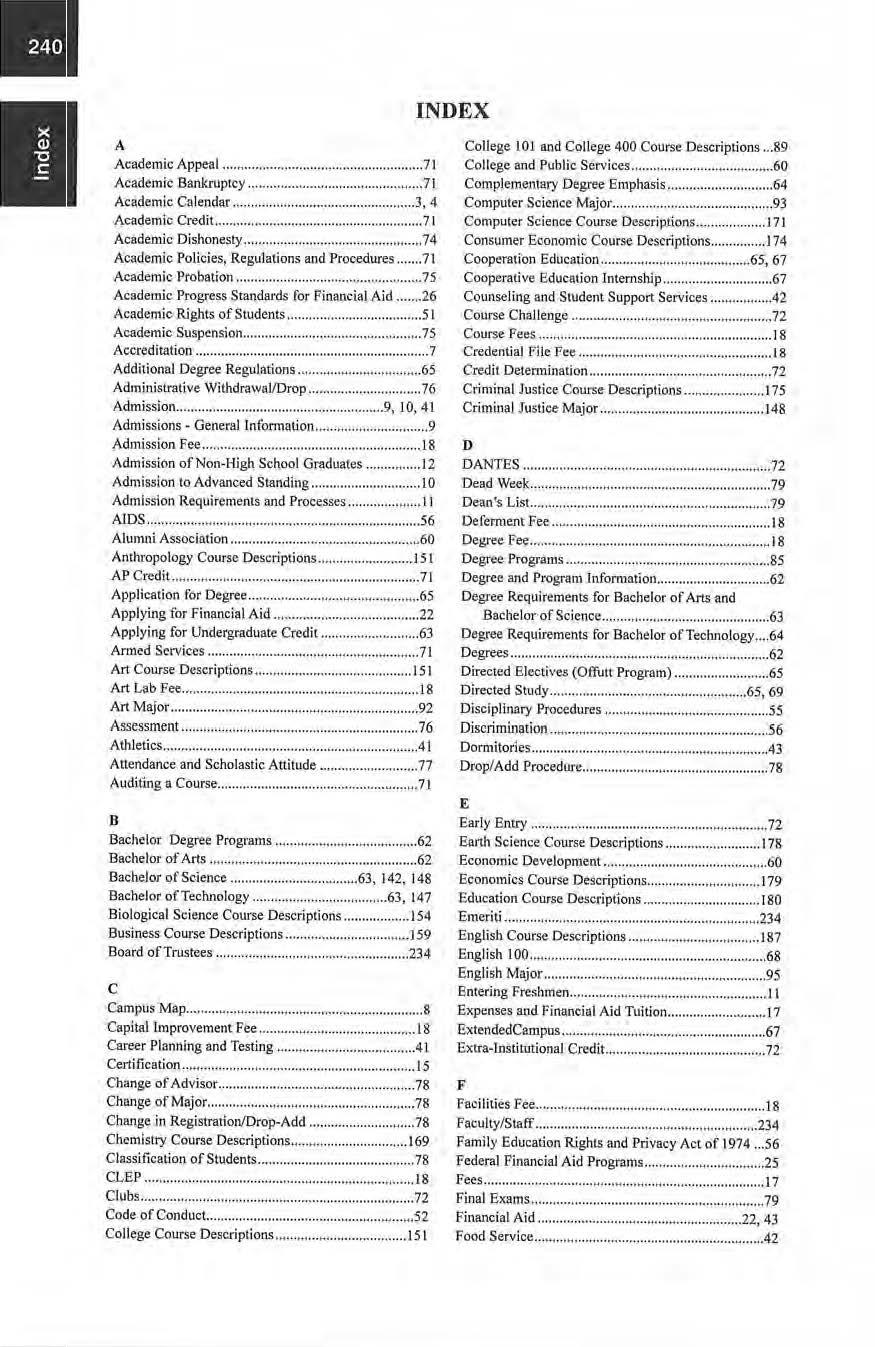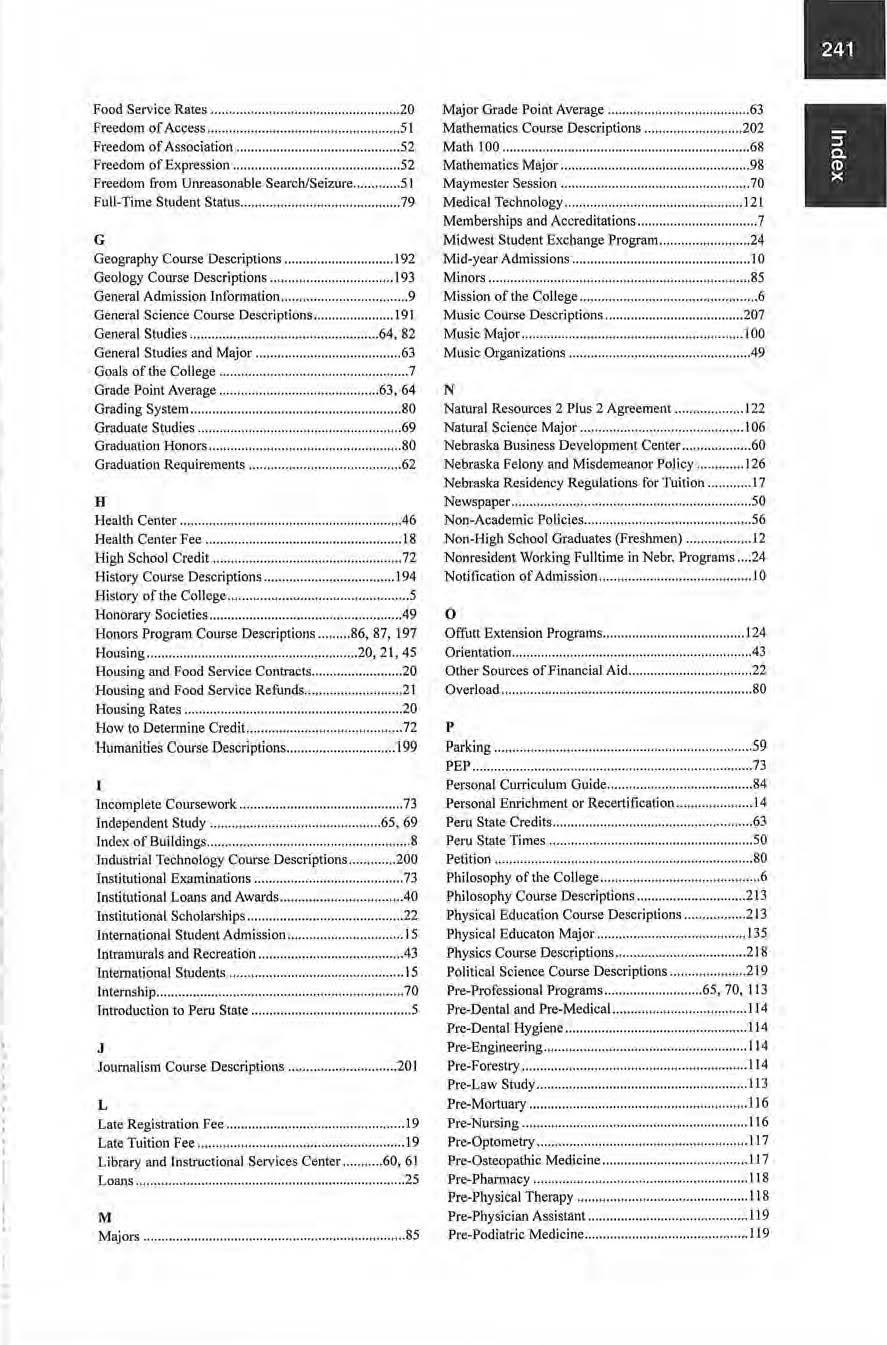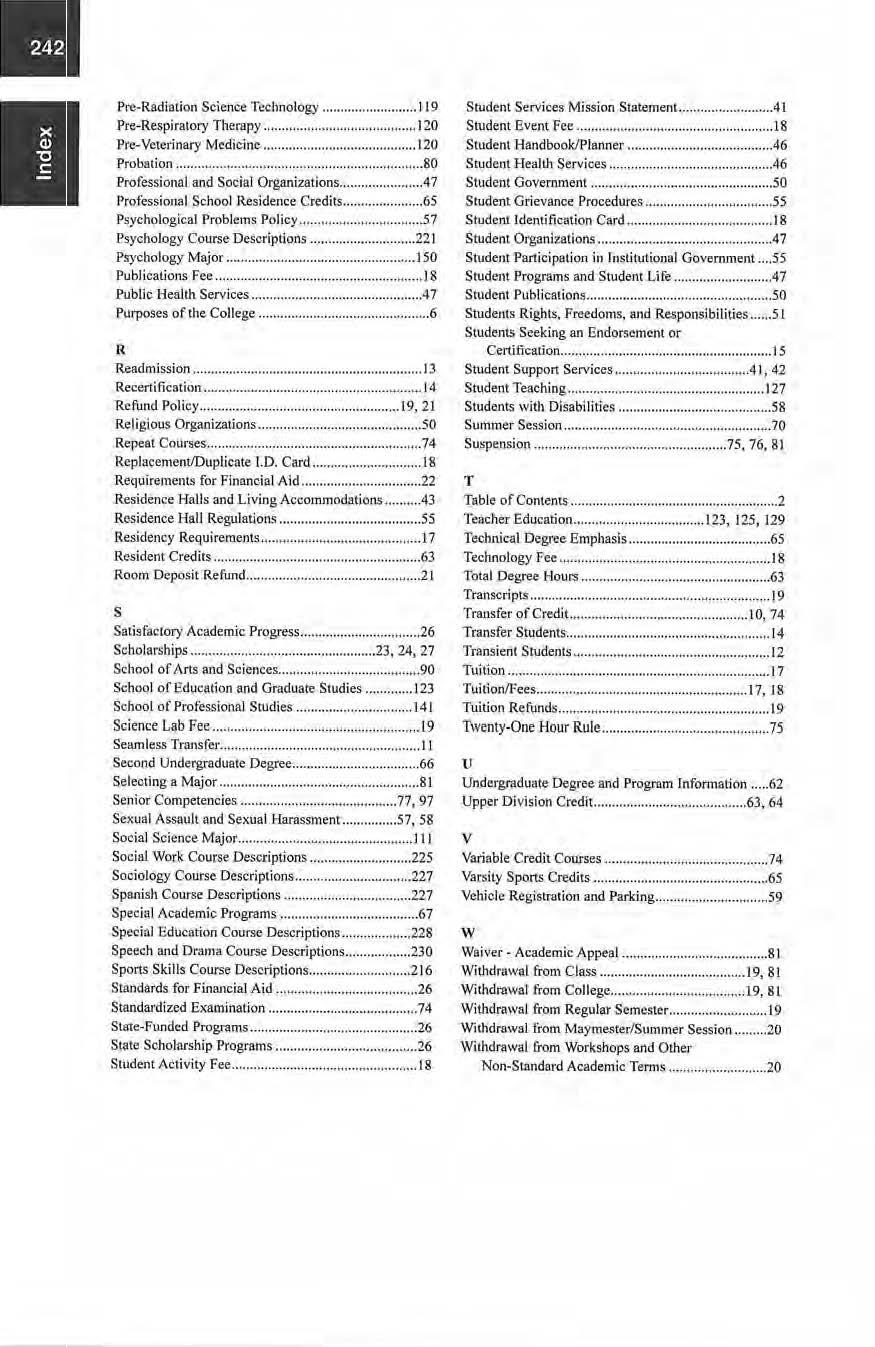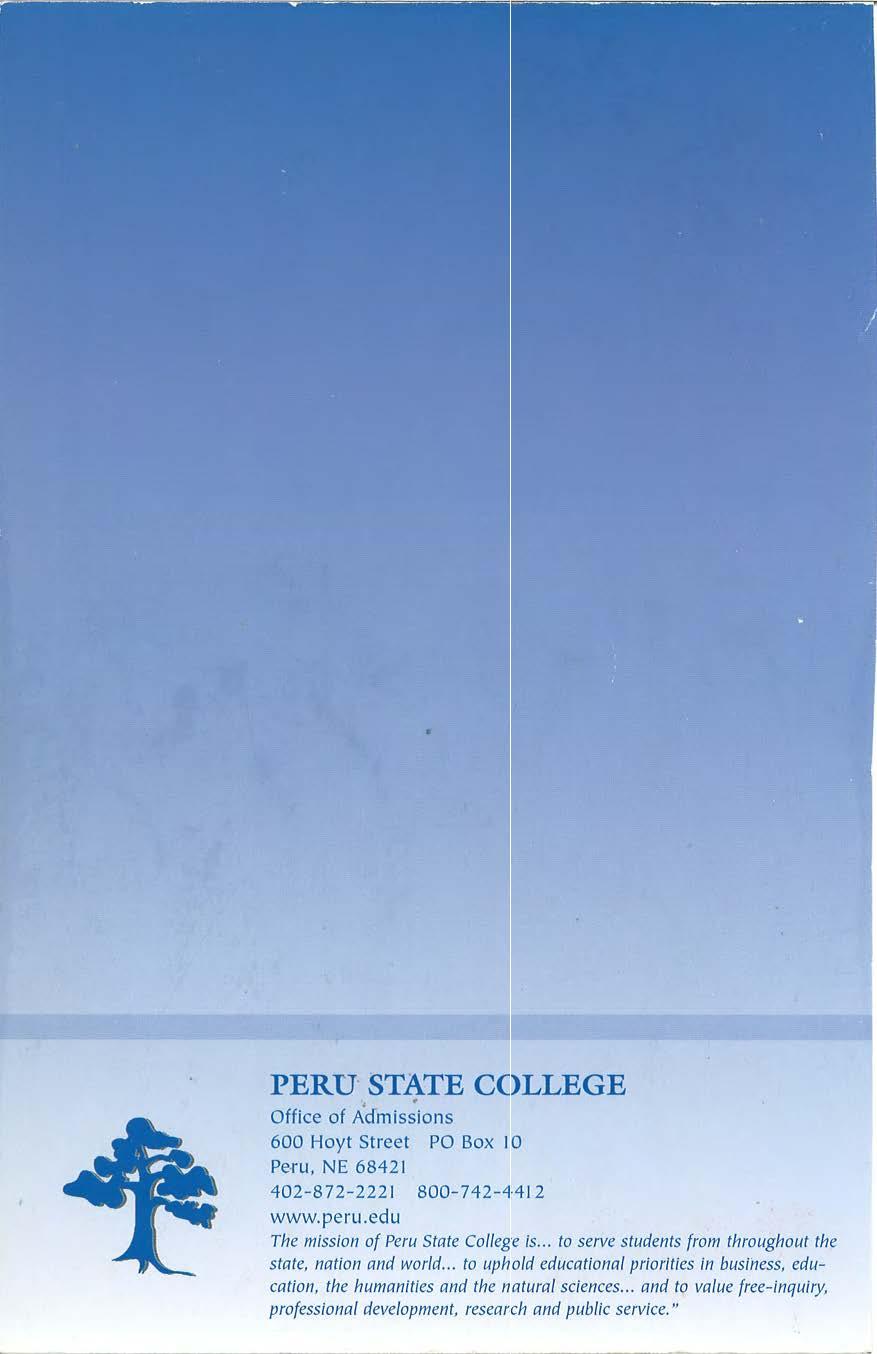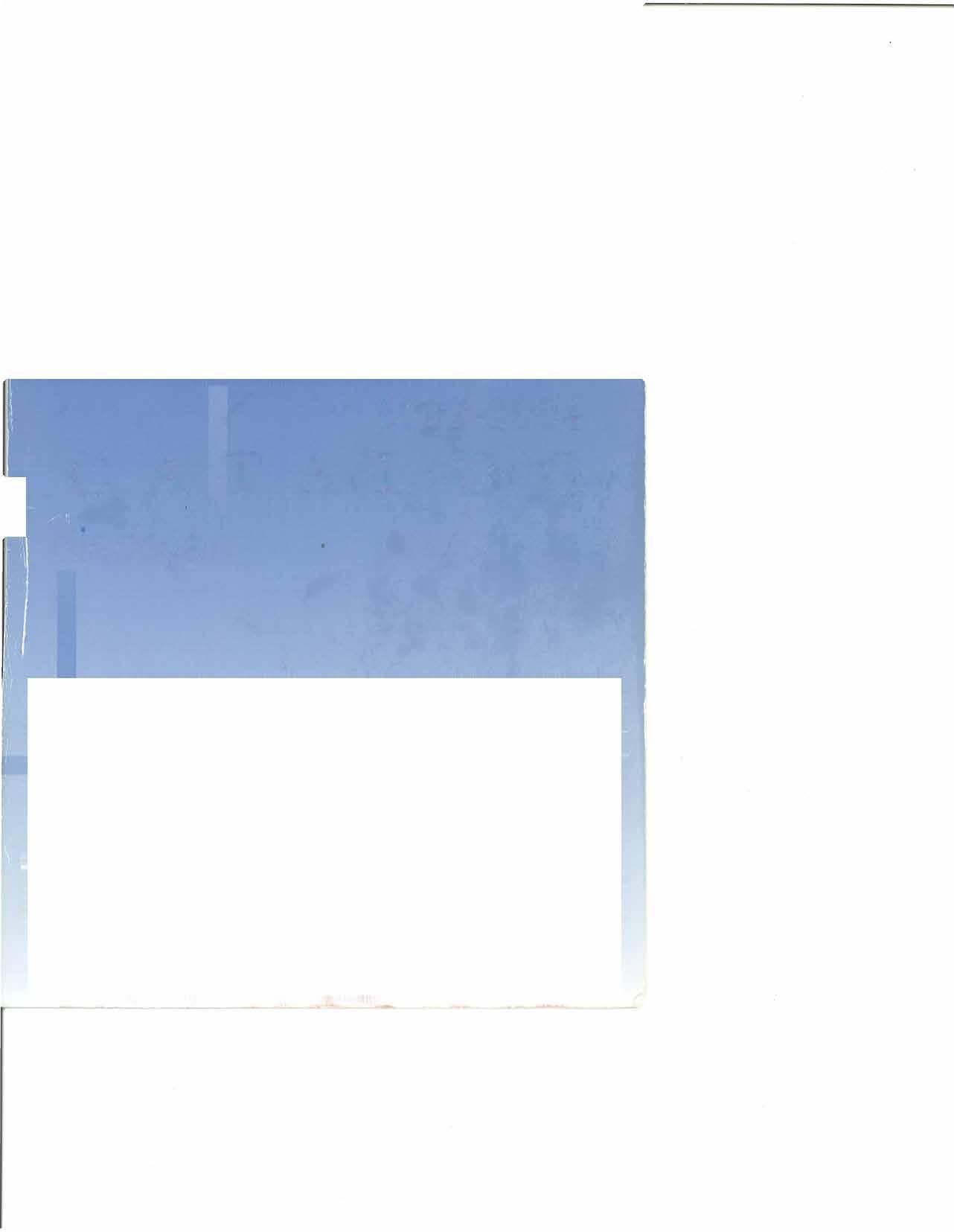






Dear Peru Stater, College catalogs are interesting publications. On the one hand, they can be as important a document as you will ever open; they lay out the path to your college education, and can be the source of answers to innumerable questions.
On the other hand, this is not the kind of book you'll cw-I up witl1 in front of a fireplace on. a quiet evening. This is a reference guide, one that you will almost ce1tainly find yourself comin•g back to often. Keep it nearby and become familiar with it.
The time, energy and commitment that you dedicate to your educational career at Peru State College is, quite likely, the greatest investment you'll ever make. The more you put into it, the more you will gain from it. Remember, too, that it's mot the "who's" and "what's" and "when's" that you learn from PSC that will serve you in the years to come. It is the "bow" that will serve you best - the process of exploration and discove1y, of learning how to be a good student, that will be with you the rest of your li fe .
By choosing Peru State College to provide yom h igher education needs, you have made one of the most important decisions of your life. We look fo1ward to a wonderful partnership.

Information about student retentio n and completio n as required by the Higher E duc ati on Amei1dments of 1976 is available through tbe Office of S tudent Services.
No person attending Pe ru State College sha ll , on the grounds o f ra ce, co lor, nationa l origin, handicap, or gender, be excluded from parti cipation in , be denied of, or be s ubjected to discrimination W1der any program or activity receiving federal financial assistance. Inquiries regarding the se matters sho uld be directed to the Vice President for Administration and Finance.
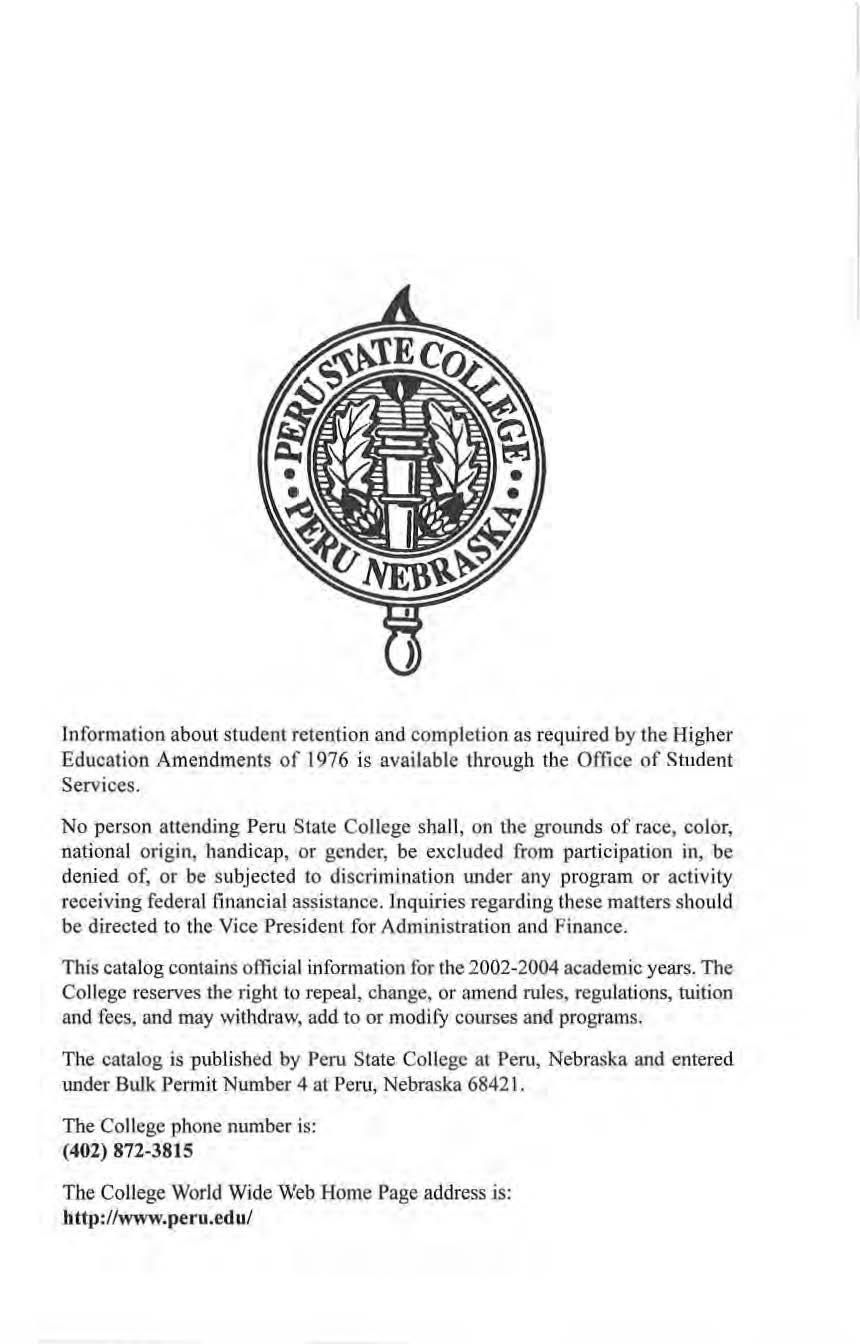
This catalog contains offic ia l informati on for the 2 002- 2004 academic years. The Co ll ege reserve s the right to repeal, cha nge, or amend rules, regu lations, tuition and fees, and may withdraw, add to or modify courses and programs.
The cata log is -publish ed by Peru State College at Peru, Nebraska and entered under Bulk Penn it Number 4 at Peru, Nebraska 6842 1.
The College phone number is: ( 402 ) 872- 3815
The College World Wide Web Home Page address is: http://www.p eru .ed u/
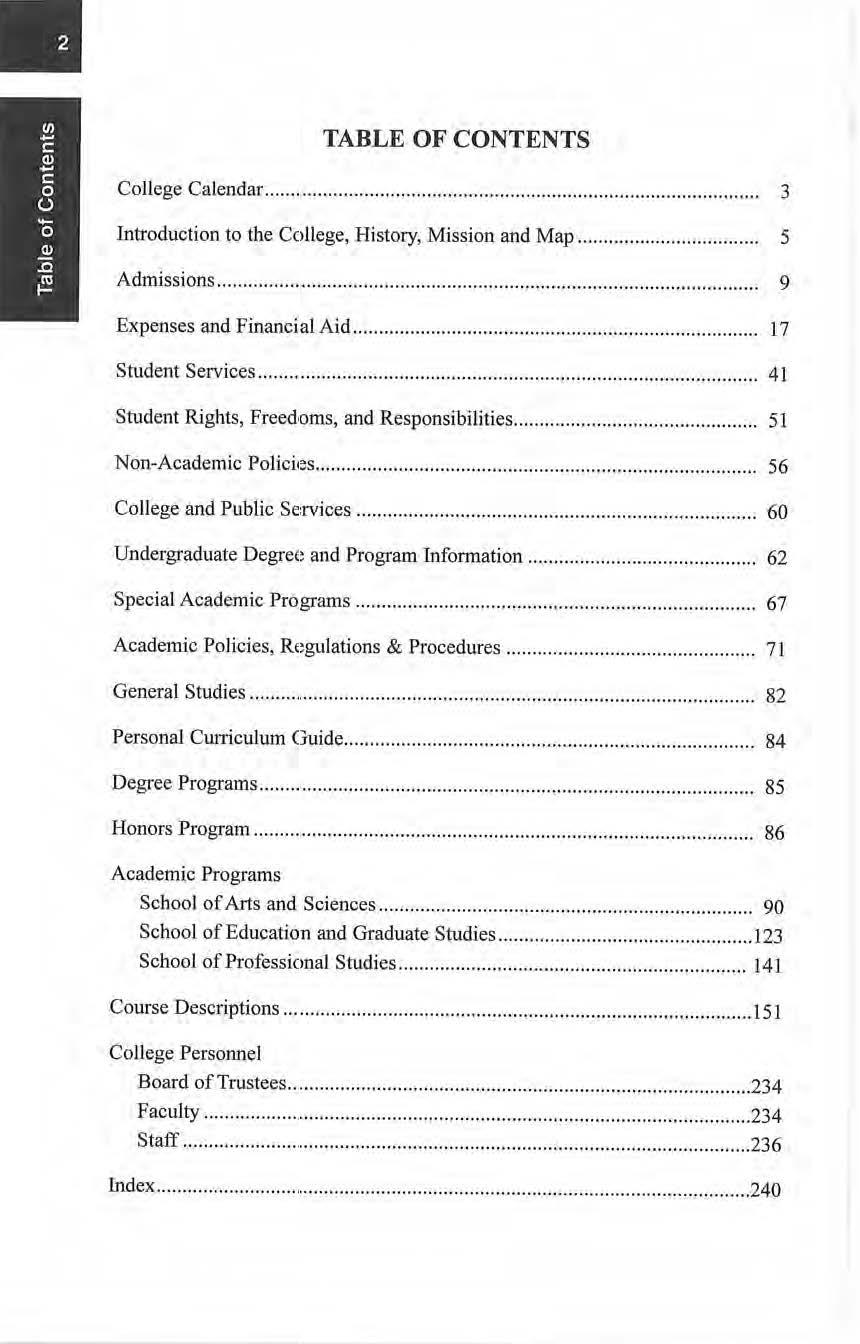

Fee Payment (late fees after this date)
Faculty Orientation
Freshman Welcome aud Orientation
Registration (late registration afler this date)
Day & evening classe$ begin
Applications for Non-Resident Scholi1r due
Last day to drop/add regular semester courses
Labor Day Holiday ( no classes - offo:es closed)
C lasses resume
Student teacher appllcattons due for Sipring 2003
Applications for May Graduation due
Homecoming
Mid-Term ends
Mld-Tem1 Break (no classes - offices open - classes dismissed following the final class meeting on October 18)
Classes resume
Last day to withdraw from regular seunester courses with a W
Preregistration for Spring Semester
Fall Break (no classes - offices closed-Thurs and Fri only)
Classes re.<1umc
Last day of regular semester classes
Last Acadcmic/lnstructional Day
Final Exam Week
Semester ends
Fee Payment (late fees after this date.)
1i1esday, Friday, Salurday-SundaJ\ N[ondny, Monday, Monday, Friday, Monday. Tuesday. Friday, Tuesday. Saturday, Friday. Monday -Tuesday, Wedn esday, Friday. 1i1esday-Thursday, Wednesday-Friday, Monday, Friday, Monday, n,esday-Friday Friday,
Registration (late registration after this date) Day & evening classes begin
Last day to Drop/add regular semes~:r courses
Sn1dent teacher applications due for F all 2003 Summer Session and Maymesler preregistration
Applications for December graduMidn d ue
Mid-Term ends
Mid-Tenn Break (no classes - oflke:i open - classes dismissed following the final class meeting March 7)
Classes resume
Last day to withdraw from regular semester courses with a W
Preregistmt1on for Fall Se mester
Applications for End of Summer graduation due Spring Breuk (no classes - offices cl,ased)
Classes res'ume
Las t day of regular semester classes
Last Academic/Instructional Day
Final Exam Week Commencement
Registration
Classes begin
Tuition and fee payment
August 16
August 23
August 24-2 5
August 26
August26
August 26
August 30
September 2
September 3
September 6
October 1
October 12
October 18
Octob<>r 21-22
Octobe-r 23
October25
November 1'2-14
November 27-29
Oecember2
December 13
December 16
December 17-20
December 20
Friday. ,'vfonda;1 Monday. Friday, Friday, Monday-Friday, Saturday. h'iday, Monday-Friday, Monday. Friday, 1\1esday-Thursday, foesday. Monday, 1i1esday, Friday. Monday, 1i1esday-Fr ida_11 Saturday,
Last day of registration or change of registration
Last day to withdraw ti'om First Summer Session with a W
Independence Day Holiday (no c los,;es - offices closed)
Fitst Five Week Session ends
Second Five Week Session begins
Last day to -withdraw from Second Summer Session with a W
Second Five Week Session ends
January 3
January 13
January 13
Jaou;iry 13
January 24
f'ebniary 24-28
March I
March 7
March 10-14
March 17
March 21
March 25-27
April I
April 21
April22
Moy2
May5
May 6-9
May 10
Monday, Tuesday, 1l1esd<Jy-Thm sday, Wedn esday.
Tuesday, Fridc,y. Thursday. Monday, Monday Thursday,
June 2
June 3
June-3·S
June4
June 17
July 4
July 3
July 7
July 21
Augu!l17
Pee Payment (late fees after 1h1s date)
F'aculty Orienratiou
Freshn1a11 Welcome & Orienta tion
Registration (late registration ~,fter th is date)
Day & Evening classes begin
Last day to drop/ add regular srnncstcr cla~ses
Labor Day Holiday (no classes. - offices closed)
Classes resume
Student teacher applications due for Spring 2004
Applications fot May Graduat ion due
Mid-Term ends
Mid-Term Break (no classes - offices open - class~s dismissed following the final class meetTng on October 17)
Classes resume
Lasr day to withdraw from reg,~lar s~mester co urses with a W
'Preregistration for Spr in g Sem1:s1cr
fall Break (no classes- oA,ces, closed-Thurs and Fri only)
Classes resume
Last day of regular semesler cl:asses
Last Academ ic/lnstnrctional Day
Final Exam Week
Semester ends
Fee Payment ( late fcies after this date)
Wednesday, Ftid(IJ', S(ltt1rday-Si1nday. M(lnday, Monday. Friday
Monday. Tuesdqy, Frida;\
Wednesday, Frtd(IJ', Monday-Tuesday, Wedmmltiy, Friday, Tuesday-ilrursday, Wednesday-Frid(ly, Monday, Frida);
Monday, T11esday-PridaJ1
Friday,
Registration (late registration a •fler 1his date)
Day & evening classes begin
Last day to drop/add regular semester courses
St udent teacher app lications due for Fall 2004

~nee Session preregistratio,n
AgpJica tions for December graduation due
Mid-Term ends
Mid-Tenn Break (no clas~es - offices open - classes dismissed) following the final class meeting March 5)
Classes resume
Lnst dny to witbdra,v from regu Jar semester courses with a W
Preregistra tion for Fa ll Semester icaf nd.ofSummewaduation due Spring Break (110 classes - offices closed)
Ciasws resume
Last day of regular seme~1er classes
Lost Academic/ Jns1ructional Dny
Pinal Exam Week Commencemenc
Registration
Cla;;ses begin
August 15
August 22
Augusl 23-24
Augusf 25
August 25
August 29
Septe11Jber l
September2
September 5
October I
October 17
October 20-21
Octoher 22
October 24
November I 1-13
November 26-28
Dcccr11ber I
Oeccmber 12
December 15
December 16-19
December 19
Friday, M()nday. Monday. Fl'idCIJ>, friday, Manda;i.Fricicg( M®Jnv
Friday.
Mond") ~Friday. Mo nday, Friday, Tliesday- Tlmrsda
Thursday. Afonday, 7i1esday, Friday, Monday. Tuwtlay-Frlday, SarurdaJi
Last day of registration or change ofregistration
Tuition and fee paymen t
Last day to withdraw from First Summer Session co urs~s with a W
Independence Day Holiday (no classes - offices closed)
f'irsr Five Weck Session e.nds
Second Five Week Sess ion begjn.s
Last day to withdraw Ii-om Second Summer Sess ion Courses with a W
Second Five Week Session ends
Monday, Tuesda;1
Wednesday, Tue.,day-T/,11rsd"Ji
Th11r;daJ1 Mo11da;i
Wednesday. Monda)\
Wed11esday, T/111rsdoy,
.January 2
January 12
January 12
January 16
January 23
Mnrdt l-5 M(9rcb I
March 5
March 8-12
March 15
March 19
Aprll 1 Apri l 12
April 13
April 30
May3
May 4-7
May8
June7
June 8
June 9
June 8-l 0
June 24
Ju ly 5
July 7
July 12
July 21
Augusr 12
Peru State Co llege was founded in 1867 as Nebraska ' s first college and was the third teacher education institutio11 established west of the Missouri River. For more than a century, fuousands of yow1g people have crossed the Campus of a Thousand Oaks to become teachers and leaders in Nebraska aod throughout the nation.
The people of Nebraska have made the facilities of the College available to students at a minimum personal cost. The taxpayers oftbe state bear the major portion of the cost of educating the College's students.

Peru State admits all graduates of accredited Nebraska high schools and qualified out-of-state and international students. 1he philosophy of the College is that each person is ent itled to the opportunity to succeed at the collegiate level. All who have the ability and the willingness to work will have an excellent chance to succeed at Peru S tate.
The College believes in academic excellence, in opportunities for personal growth, and in student self-detennination consistent with the principles of a democratic society Administrative intent is to involve students in the decisions which affect them . The College's educational experience is designed to enable studerrts to learn, to equip themselves for meaningful careers, and to be productive members of society. Peru State students have the opportunity to know their instructors well and to be working partners with the staff and other students. Living and working with others offers many opportunities for fi.ieudship, growth, and personal development.
The College's faculty and staff are here to serve you. We welcome the oppor tunity to assist you in realizing your personal , educational, and career objectives.
In 1867, the same year that Nebraska became a state, the new state 's legislature established a training school for teachers at Peru. The school actua!Jy began on December 2, 1865, when its predecessor, Mount Vernon College, was organized by a group ofearly settlers who resolved to place the school under the "care and management of the Methodist Episcopal Church."
Colonel T.J. M~jors, a leade:r during the Civil War and a state legislator, p roposed that the school be made into a state university. Although the offer was rejected, the state legislature on June: 20, 1867 did accept the school as a "normal school" several months before the state university was established. For the next 38 years, the Peru school was the onJ1y teacher education institution in the state.
As Nebraska's populat ion increased, the legislatw:e extended th e norma l schools from two-year to fow--year institutions and authorized them to grant the degrees of Bachelor of Arts in Education. Bachelor of Science in Education, and Bachelor of Fine Arts in Education. At the same time, the name of the school was changed from State Normal School to State Teachers College In l963, Peru's name was changed to Peru State Colli~ge. When the United States entered World War 11, the
College trained officers for the am1ed forces. The first of an eventual 500 men in the Navy's V-12 program arrived on campus July I, 1943. The College operated an accelerated program for both civ il ian students and naval trainees. In 1949, the legisla1ure authorized the Nebraska Stat e Colleges to confer the Bachelor of Arts degree. The Bachelor of Science degree was authorized in 1965. Emerging from its role as a single-purpose teachers college, the College is now a regionally accredited state college offering a wide variety of programs to meet the changing needs of southeast Nebraska and beyond
Peru State College is committed to the belief that all persons are endowed with potential which. if devefoped, will benefit bo1h the individual and society. Each person who is exposed 1to the influences of the College is encouraged to develop his or her potential as well as to understand and appreciate the contributions of others.
Individual development can be accomp li shed through fonna l study and exposure to a variety of experien,:.:es both on and off campus. This growth is the result of the reasonable mastery of knowledge, acqu isition of certain skills and techniques , appreciation and tmderstanding of areas beyond narrow persona l interests, and meaningful religious and social experiences.

Peru State College serves tile community through education, research, and public service programs. Our mission is to exce l as a comprehensive liberal arts college that e ncourages stude nt learning with educational prioriti es in bacca laureate and graduate teacher education, as well as undergraduate progr-ams in business, the humanities, and the sciences. We va lue free-inquiry, professional development, research enhancing our educational role, and public service related to and supportive of instruction. ]Peru State College serves s t udents from throughout the state, nation, and world but retains a special commitment to serve the residents and needs of Southeast Nebraska.
The Purposes of Peru State College support the accomplishment of the mi ssion and are derived from the specific responsibilities assigned to the institution by the Nebraska State College System Board of Trustees and the Nebraska Coordinating Comm ission for Postsecondary Education. These purposes are to:
• Provide an affo rdable and accessible quality education through highquality teaching and emphasis on student learning to the citizens in th e assigned service region.
• Provide its graduates with a so lid foundation for continued li fe-long learning through a strong general education program.
• Provide quality baccalaureate degrees in selected academic fields, with emphasis on teacher education, business, and selected disciplines in the arts and sciences.
• Provide a quality grad1uate program leading to a master's degree in education

• Contribute to the development of the -fie lds ofknowledge and teaching in the disciplines represemted in the College programs.
• Contribute to the economic and social/cultural development of the service region.
The Goals of Peru State College are to instill in our students:
• effective communication skills ;
• computer and information literacy;
• independent critical thought and intellectual capacity for change;
• preparation to assume social and civic leadership roles;
• the ability to pursue intellectually, ethically, aesthetically, and physically rewarding lives.
Peru State College is accrediited by the Higher Learning Commission of the North Central Association of Collleges and Schools and has continuing accreditation with probation by the National Council for Accreditation of Teacher E ducat ion. Full membership is main tained in the American Association of Colleges for Teacher Education and the American Council on Education. The College also is a charter member of the Nelbraska Counci l on Teacher Education.
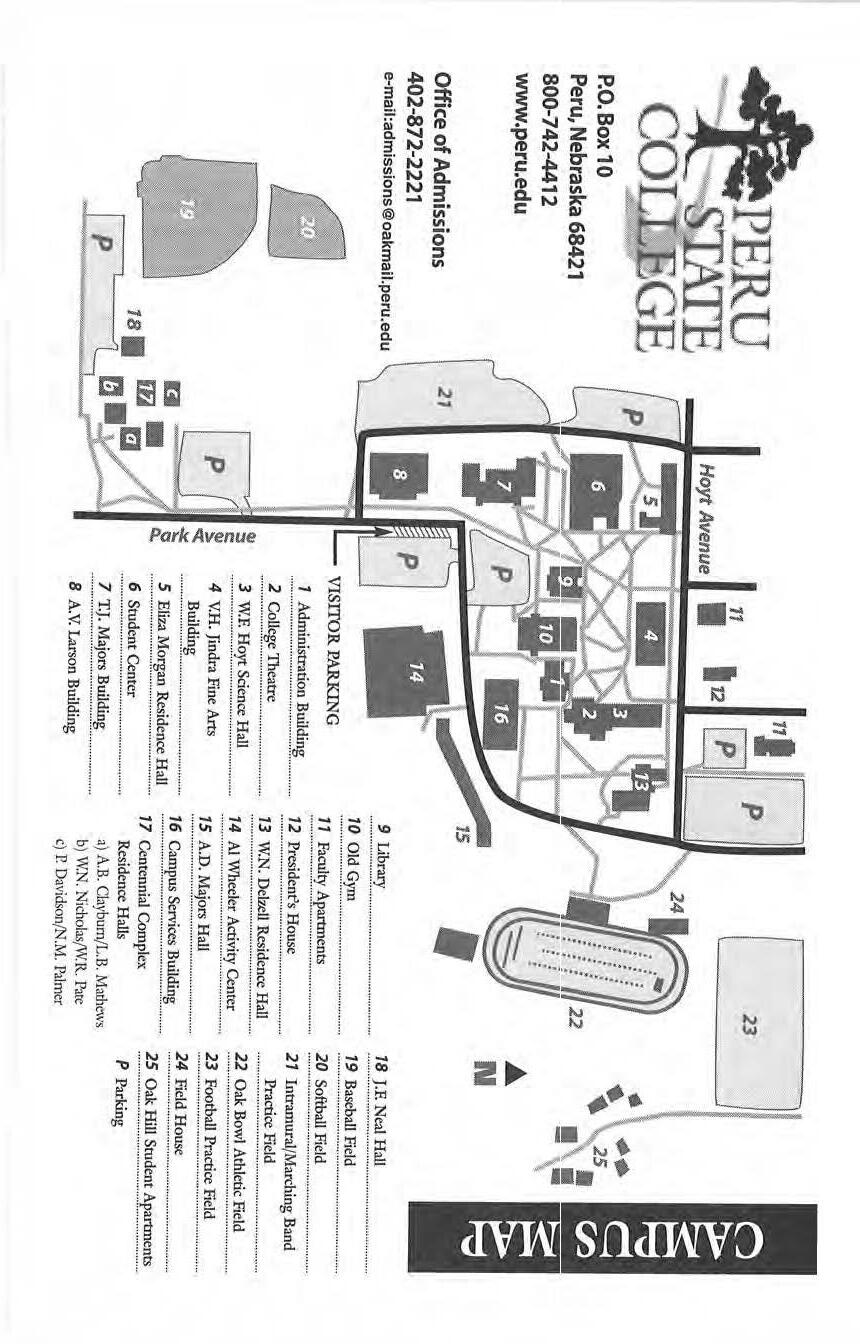
The Office of Adm i ss ions at Peru State Co ll ege welcomes inquiries a nd applic ations from all individuals who wish to pursue th ei r educational and vocationa l goals.
Peru State Co ll ege js com mitt ed to the policy and p ractice that a ll persons have equa l opportunity and access to programs w ithout discrimination on the basis of race, colo r, national o ri gin, marital st1:1tus, gende r, age, religion o r di sabi lity
The Office of Admiss i ons p rovides th e foll owing tips for s tudents considerin g enrollment at Peru State Co Uege:
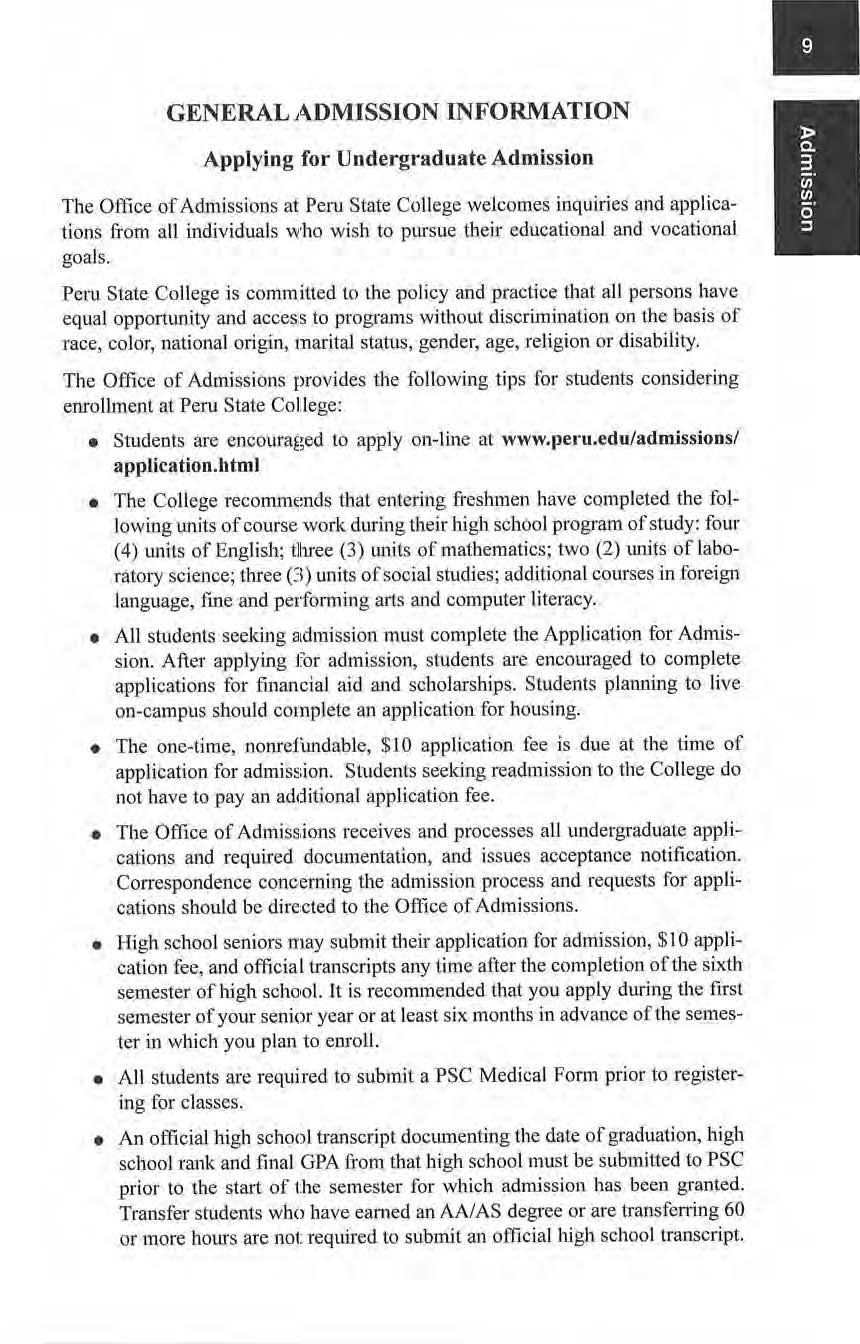
• Students are encouraged to apply on-line a t www.pern.edu/admJssioos/ application.html
• The Coll ege recommends th at enterin g freshmen have comp leted t h e following units of course work during their high schoo l program of study: fou r (4) units of Engl ish; tllu·ee (3) w1its of mathematics; two (2) muts oflaboratory science; three (3) units of social sturues; add it io nal courses in foreign language, fine and performing arts and comput er lit eracy.
• All students seeking a1dmission must comp le te the Application for Admission. After applying for a dmission, students are encouraged to compl ete app lications for fmanc ia l aid a nd scho larsh ips. Student s planning to li ve on-campus shou ld complete an appli cation for housing.
• The one-time, nonrefund abl e, $10 application fee is due at the time of appli cat ion fo r admiss ion. Stude nt s seeking readmi ssjon to the Coll ege do not have to pay an additional application fee.
• The Office of Admi ss,ion s receives and processes all undergraduate applications a nd required documentation , and i ssues acceptance notification. Conespondence conc etn in g the ad mi ssion process an d requests for applications should be directed to the Office of Adm iss ions.
• High sc hoo l seniors may s ubmit their appli cation for admiss ion, $ 10 appl ication fee, and offici a l transcr ipts a ny time afier the completion of the sixth semester of hig h school. It is r ecomm ended that you apply during the first semester of your se nior year or at least six months in a dv ance of t h e semester in whi ch you plan to em·oll.
• All students are r equired to subm it a PSC Medica l Form prior to registering for classes.
• An official high school transcript documenting the date of graduat i o n, hi gh school rank a nd fina l GPA from that high schoo l mus t be submitted to P SC p ri or to the start of the se m ester for wh ic h admission has been grante d. T ransfer students who have eamed an AA/AS degree or are transfen in g 60 or more hours a r e n ot required to subnut an official high schoo l transcript.
• When taking the ACT or SAT, use Peru State College's test codes to have scores sent directly to the PSC Office ofAdmissions. The PSC test codes are ACT - 2470/SAT - 6468. This is a requirement for all studen ts under the age of 21.
• All mate1ials s ubmitted as a part of the app lication process become the property of Peru State Co llege.

• Phone the Office~ of Admissions at (800) 742-4412 if you have questio ns about the applicat ion process
Adm iss ion may be invalidated if granted on the basis of false information willfully submitted or if the disclos ure of facts required in the application process are intentionally co ncealed or omitted.
Applicants will receive a letter notifying them of their admission s tatu.s when al l documentation necessary for an admis si on decision has been submitted to the Office of Admissions.
Students who co mpl ete high sc bool at mi d-year may enter Peru State at the beginning of the s pring semeste r. Transfer students will find th e transit ion to Peru State College at tt1id-y1!ar m inimally disrupt ive to their educational plans.
Advanced s tanding is a status beyon d the minimum for admissi on to the College. It is attained by preseni~ing work compl eted at another college or by demon strating profici ency in a field that removes certain prerequis ites. The removal of prerequis ites may be with or without credit.
After the stud ent has been admitted, the Student Records Office completes an official evaluation (Progress Sb eet) to identify the appljcability of previou s work to tbe student's expressed major and degree program. Transfer students who already have a significant amount of credit h oms toward their major w ill also have their transc ripts re,viewed by th e appropriate Academic Dean.
A maximum of 95 semester ct·edit h ours from a regionally accredited four-year college or university an d exira-inst itutional sources may be appl ied toward the minimum 125 semester .hours required for a Bachelor's degree. Of these 95 semester hours, a maximwn o lf 66 semester credit hours may be from a commuoity/vocational/technical college or other extra-i11stitutional sources. To be considered for poss ible tran sfer. courses must have been completed with a grade of"C" or hi gher
Students who seek admission and are accepted while on probation from their last college ate p laced on probation and are s ubj ect to all Peru Sta te College polic ies of probation
Students who have been suspe nded fro m another college will not be considered for admission until the period of suspension at their previous institution has expired and th e facts of t he dismissaJ are provided.
Students who discontinue their attendan ce at Peru State Co llege and then attend anoth er college or unive rsity before seekin g readmission are classified as a transfe r student.
T ransfer st ud ents who have earned an Associate of Arts (AA) or an A ssociate of Sc ie nce (AS) d egree from an accredited institution meet all PSC genera l education requi reme nt s and enter PSC w ith junior class stand in g (or if less than 6 0 h ours, with all h o urs transferred). Certai n majors may have additional gen eral ed ucation course requirements that will need to be completed.
T ransfer s tudents rrom an accred ited institution who have comp leted courses equival ent to Peru State Co llege 's General S tudies courses meet the College's generaJ education require ments in that area. R em ed ial or developmental courses are excl uded.
Fresh me n
Freshmen are students who have not previousl y atten ded co llege. Freshmen applicants wh o have g raduated from an accredited high school in Nebraska wi ll be admitted to Peru State College. Freshman applicants who are wider the age of 21 are requ ired to take the ACT or the SAT prior to attend ing.

Freshmen applicants who have graduated fro m an accredited high school outside Nebraska mu st h ave ach ieved a 2 .0 cu mul ative GPA (on a 4.0 scale) in high schoo l and have a minimum scor e of 14 011 the ACT or 560 on the SAT to be admitted.
The Hig h Schoo l E quivalency Certificate, a lso known as the General Education D eve lopment dip loma, will be accepted in li eu of a high school diploma.
Application P rocess:
l. Subm it a completed Application for Admission and t he n onrefund ab le, $10 application fee to the Office of Admissions.
2. Request to have your h igh school records office mail an official transcript to the Office o f Admissions. U pon graduation fro m your high schoo l, we require a final h igh sch oot transcript that includes your date of graduati on, cumulative GPA and c lass r ank.
3. Have the results of your American Co ll ege Test (ACT) or Scholasti c Aptitud e Test (SAT) se nt to the PSC Office of Admissions. Thi s can be done by indicating Peru State College when you take the test or by contact ing the appropriate testing agency. P e ru State College's testing codes are ACT -
2470 and SAT - 6468. First time freshmen w ho have reached the age of 21 prior to the first day of classes are exempt from this requirement but may be required to complete a college placement exam that will be used in the advising process.
4. Submit the Peru S tate College Medical Fonn. This form will be mailed to students after they s ubmit an application for admission
The information from thi s form is used to provide the heal.th center s taff with history, which can be used, should medical treatment become necessary. Proof of immunization is required p1ior to registration for classes at PSC.
Peru State College requires verification of high school graduation prior to enrolling a student as a degree-seeking student. For students with a non-traditional or home school education, the College accepts the successful completion of the General Education Development (GED) test in lieu of a fmmal bigh school diploma.

Application Process;
l. Submit a completed Application for Adm:ission and the nonrefundable, $10 application fee to the Office of Adnussiollls
2. Request to have an official copy of GED scores (proof of high school graduation) sent directly from the testing center to the Office of Admissions. I n order for the GED score to be official, stllldents must either be 18 years of age or their high school class m\ist have gra duated.
3. Have the results of your American College Test (ACT) or Scholastic Aptitude Test (SAT) sent to the PSC Office of Admissions. This can be done by indicating Peru State College when you !take the test or by contacting the appropriate testing agency. Peru State College's testing codes are ACT247 0 and SAT - 6468. First time freshme1n who have reach ed the age of21 prior to the first day of classes are exempt from this requirement but may be required to complete a college placement exam that will be used in the advising process.
4. Submit the Peru State CoJlege Medical Fiorm. This form will be mailed to students after they subnut an application for admission. The information from this fonn is used to provide tJ1e medical staff with history, which can be used, should medical treatment become nece ss ary. Proof of immuni zation is required prior to registration for cl;3sses at PSC.
Transfer students not on cunent academic suspension from their previous -instin1tion are eligible for admission to Peru State College. Transfer students interested in attending PSC should submit their completed application materials to the Office of Admissions six months prior to their desired date of enrollment.
When deemed appropriate, the Director of Admissions may admit a transfer student with less than a 2.0 cumulative GPA. Students with less than a 2.0 will be admitted on a probationary basis. Jn addition to the application for admission and application fee, applicants for probationary admission must:
• submit a letter desc ri bing their plan of action for academic success at PSC;
• ifrequesled, schedule a personal i nterview with the Vice President of Academic Affairs;
• take no more that 14 semester hours in the first tenn of attendance;
• be assigned to an undeclared academic advisor for at least the first semester.
Transfer student applicants with Less than a 2.0 transfer GPA who do not agree to these conditions will be denied admission.
If admitted, the student must comp lete at least six hours and earn a semester GPA of 2.0 or better to continue attendance and to be eligible to declare a major. Transfer students admitted on probation will be suspended if during the first semester at Peru State Co ll ege their GPA is less lhan a 2.0.
Application Process:
I. Submit a completed Application for Admission and the non refundable, $ I 0 application fee to the Office of Admissions.
2. Request to have ofticial transcripts from all post-secondary institutions attended sent to the Office of Admissions (transcripts submitted by the student are not official and will not be used for final admission or for evaluation of transfer credit). The transcript s hould show work attempted and comp leted for all tenns attended up to that point. The student must also request that the institution send an official copy of the final transcript after the current tenn is completed,

3. Students who have not completed an Associate's Degree or have not completed 60 transferable hours must also submit an official copy of their high school transcript.
4. Submit the Peru State Medical Form. T his form will be maiJed to the student after he/she submits an application for admission. The information from this form is used to provide lhe medical staff with history, which can be used, should medical treatment become oecessary. Proof of immunization is required prior to registration for classes at PSC.
Rea
Readmission is for students who have previously attended PSC , but have interrupted their enrolJment. Al I undergraduate students who previously attended Pern State College and withdrew or discontinued their studies for a semester or more (summer session exc luded), and all post-graduates seeking an addit ional academic program, must app ly to the Office of Admissions for readmission. Students suspended for academic or disciplinary reasons must also reapply.
Students who discontinue attendance at Peru State College and attend another college or university are considered transfer students and must satisfy the transfer student requirements for readmission.
Students are readmitted for the semester or summer term they wish, provided they left the College in good standing. Students who interrupted their studies and who were on academic probation will be readmitted on probation and provided they are in good standing with the College.
Students who a re academically suspended wiJI not be considered for readmission for two semesters. Previously suspended studen ts who are readmitted will be pennanently dismjssed if suspended a second time.
Readmitted students may graduate under the same cata log in effect at the time of their first admission, provided they graduate within seven (7) years of their initial enro llm ent to Peru State Co ll ege. If the student took classes from another institution prior to being readmitted, the student is considered a transfer student and will be guided by the current College catalog.
App lication Process:
I Submit a completed Application for Admission.
2. If you have atte nded any post-seco ndary institutions since leaving PSC, request to have official transcripts sent to the Office of Admissions. For a transcript to be considered official, it must bear a school seal and be sent directly to the Office of Admissions.
Students not pursuing a degree program may take classes at PSC after completion of an application. H oweve r, previous academic transcripts and standardized test scores are not required. S tudents taking classes as a non- degree-seeking studen t ca nnot recei ve fin a ncia l aid.
Ap plicati on Process:
l. Submit a completed Application for Admission and the nonrefundable, $10 app l ication fee to the Office of Admissions.
Transient students are taking credits at PSC to complete a degree at a previous institution. Transient stu dents may take classes at PSC after completion of an application and proof of good standing at the previous i nst itution
App lication Process:
I . Subm it a compl eted Application for Admi ssi on and the nonrefundable, $ 10 application fee to t he Office of Admissions.
2. Submit the Peru State College Medical Form. The infonnation from this form is used to provide the medical staff with history, which can be used, should medical treatment become necessary. P roof of immunizatio n is required prior to registration for classes at PSC
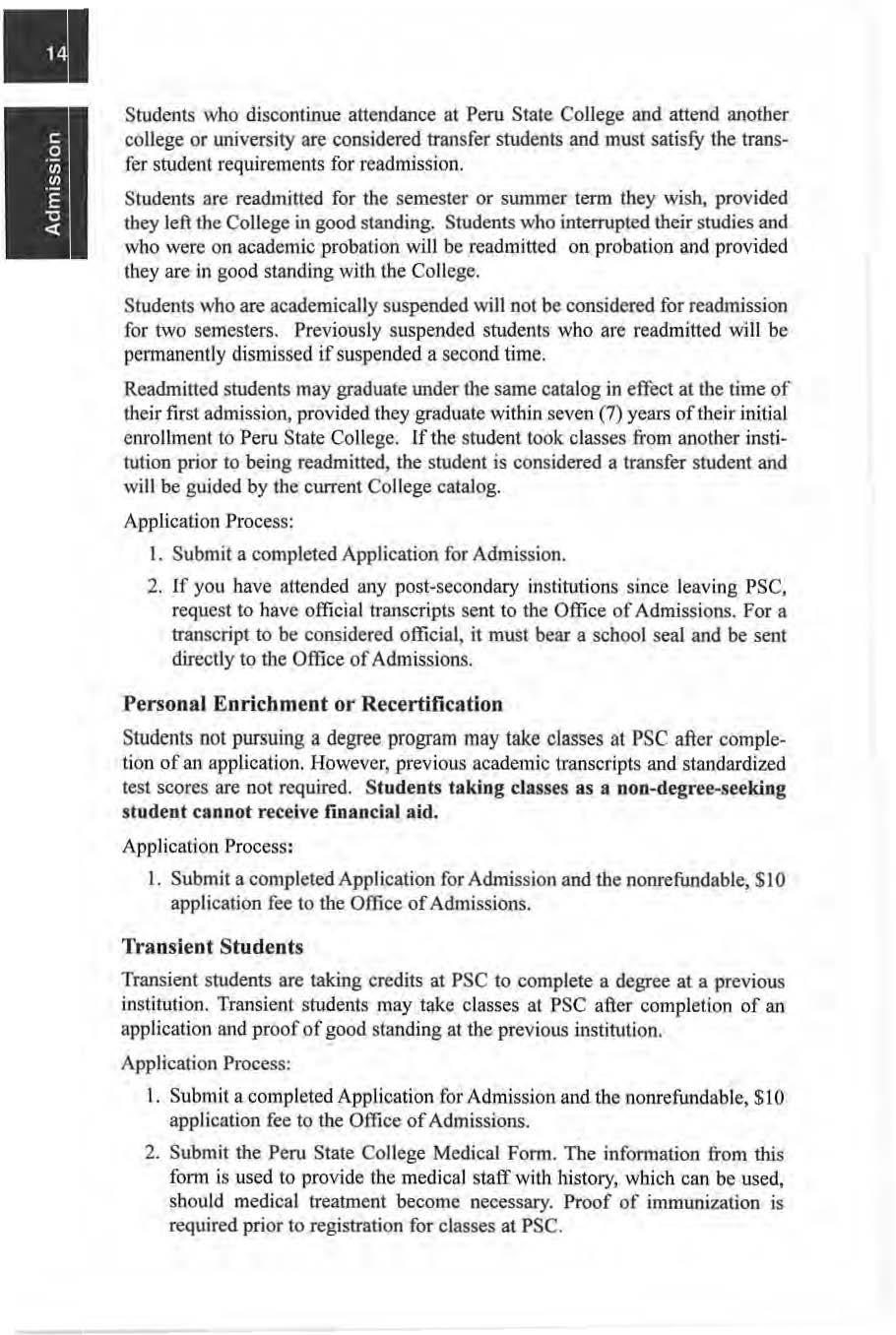
1 Submit a completed App l ication for Admission and the nonrefundable, $10 application fee to the Office of Admissions.
2. Request to have officia l transcripts from all post-secondary inst1tutions attended sent to the Office of Admissions (trdllscripts submitted by the st11dent are not officia l and will not be used for final admiss ion or for evaluation of transfer credit). The transcript shouJd show work attempted and completed for all terms attended up to that point. The s tudent must also request that the institution send an official copy of the final lranscdpt after the current term is comp leted.
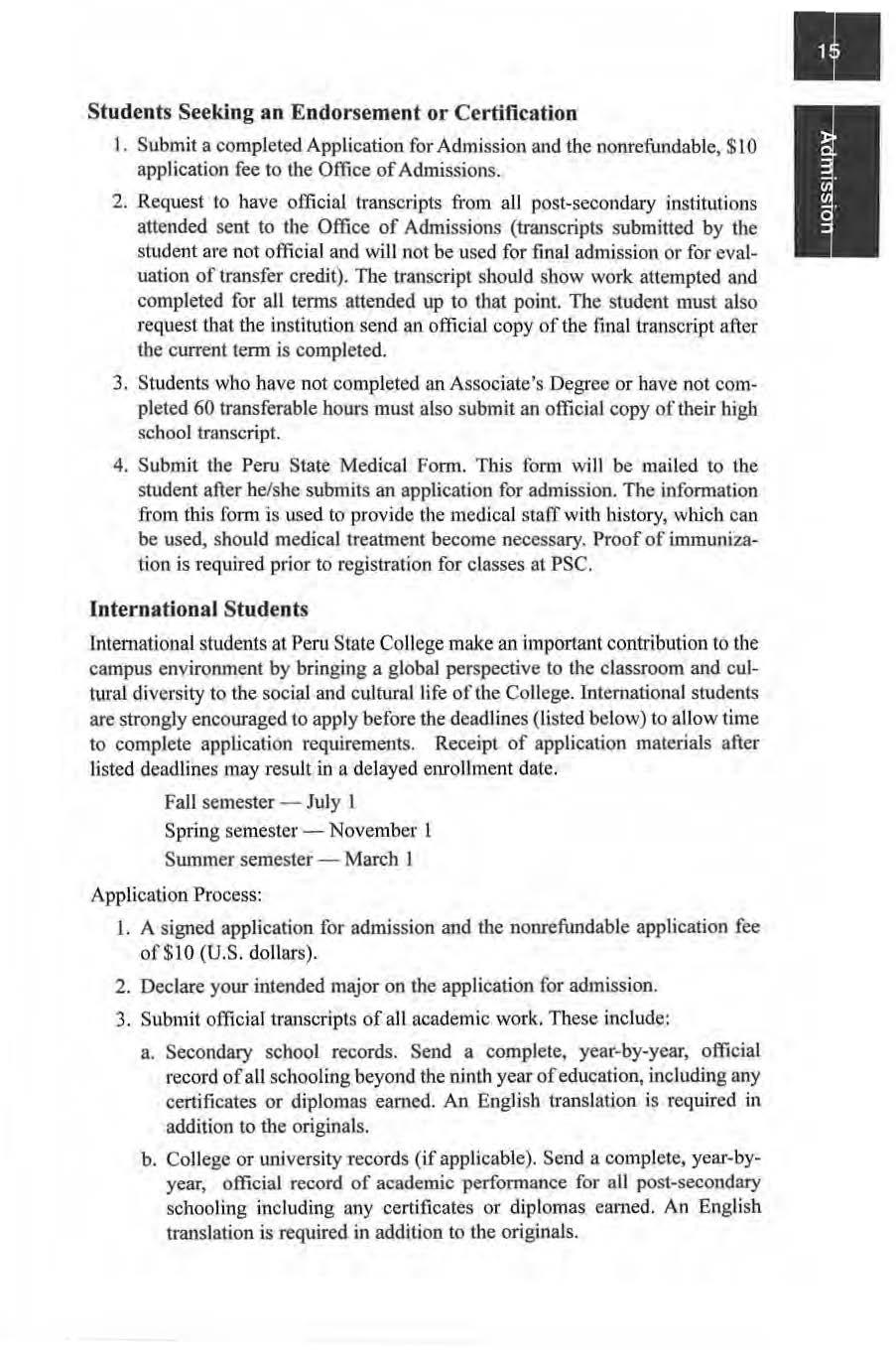
3. Students who have not completed an Associate's Degree or have not completed 60 transferable hours must a lso submit an officiaJ copy of their high school transcript.
4. Subm it the Peru State Medical Form . This form will be mailed to the student after he/she submits an applicatjon for adm i ssion. The information from this form is used to provide the medical Slaff with history, which can be used, s hould medical treatment become necessary. Proof of immunization is required prior to registration for classes al PSC.
Internationa l students at Peru State Co ll ege make an important contribution to the campus environment by bringin g a global perspective to the classroom and c ulturaJ diversity to the social and cultural life orthe College. International students are strongly encouraged to apply before the deadlines (listed below) to allow time to complete application requirements. Receipt of application materials after listed deadlines may result in a delayed enrollment date.
Fall semester - July t
Spri ng seme ster - November 1
Summer semester - March I
Appl ication Process:
l. A signed application for admission and the nonrefundable application fee of$10 (U.S. dollars).
2. Declare yo ur intended major on the app li cation fo r admission.
3. Submit officia l tra11Scrip ts of all academic work. These include:
a. Secondary school records. Send a complete, year-by-year, official record of all schoo lin g beyond the ninth year of education, including any certificates or diplomas earned. An Engl i sh translation is required in addition to the originals.
b. College or university record s (if applicable). Send a comp l ete, year- byyear, official record of academic performance for all post-secondary schooling including any certificates or diplomas eamed. An English translation is required in addition to the origina ls.
Note that for admission to PSC, average marks during schooli ng and o n fo,al examinations mu s t be a minimum 2 .0 grade point average in the PSC gra ding syste m. In the PS C grading system, A i s 4.0, B is 3.0. C is 2.0, D is l .O and F is 0 .0.
International st udents may n eed to send their tran script s to an international credentials evaluation serv i ce for eva luation. The stud ents will be 11ot ifi e d by the Office of Admissions if this is ne cess ary a nd will be sent a li s t of a ge ncies that perfonn thi s service The cost wi ll d epend upon th e type and complexity of the eva luat i on a nd is the responsibility of the s tudent.
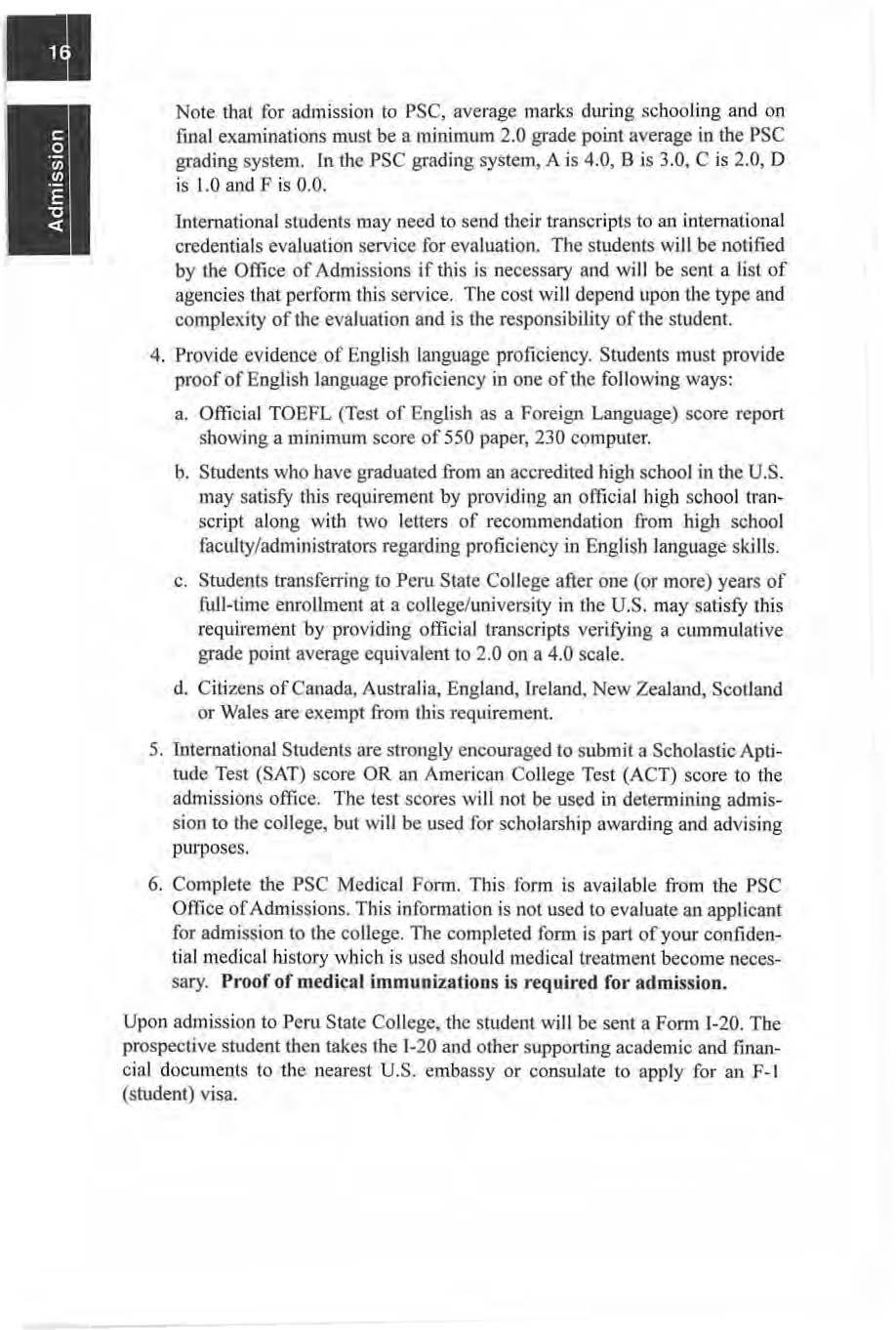
4. Pro v ide ev idence of English language pro fi c iency Students mus t provide proof of E ngli sh language proficie ncy in one of th e following ways:
a. Officia l TOEFL (Test of Engli sh as a Fo reign Language) score r epo rt s howing a min imum score of 550 paper, 230 co mputer.
b. Stud e nts w h o have graduated from an accredited hi gh schoo l in the U S. may sa ti sfy th is r equirem en t by providing an o fficial high school transc ript a long with two letters of recom mendation from h ig h schoo l fac ulty/ad mini strators regarding proficiency in English lang uage ski lls.
c. Stude nts transfe rring to Peru Slate Co ll ege after o n e (or more) yea rs of full-time enrollment a t a college/univ ers ity in the U.S. may satisfy thi s require ment by providin g official transcripts verifyin g a c ummulati ve grade point average eq ui valent t o 2.0 on a 4 .0 sca le.
d C iti ze ns of Canada, Aus tra li a, England, Tre land. New Zealand, Scotl a nd o r W ales are exempt from this requi r eme nt.
5. International Students a re strong ly enco uraged to s ubmi t a Scholastic Ap titud e Te st (SAT ) sco re O R an American Co llege Test (ACT) sco re to the admissions office Th e test scores will not be used in detennining admission to the coll ege, but wi ll be used fo r sc holarship awarding and advi s ing purposes.
6. Complete the P SC M ed ic al Fonn. This form is availabl e from the PSC Office of Admissions. This in fo m1ati o n is not used to eva luate a n app licant for ad mi ss i o n t o the college. The completed form is part of your confid e ntial medical his tory which is used shou ld medical treatment bec o me n ecessary. Proof of med i ca l immunizations is req uired for ad miss ion .
Upon a dmi ss ion to Peru S tate Co ll ege, the student will be sent a Fonn I- 20. The p rospe ctive student then takes the 1-20 and o ther s upp orting academic and financ ial d ocuments to the nearest U.S. embassy or co nsul a te to apply fo r an F-1 (student) visa.
The expenses for attending P eru State College are set by the Board of Trustees of the Nebraska State Co ll eges and Peru State The College reser ves the right to change its tuition, fees, and othe.r charges at any time. Addit.ionaJ expenses for books and supplies, travel and personal ite m s will vary for individual students. Tuition rates for 2 00] -2002 are be low.
Nebras ka reside11cy for tuition purposes is determin ed in accordance w ith Nebraska statutes and the polic ies of the Boar d of Trustees . Residency status i s based upon evidence provided in a student's application for admission and related documents. The Office of Admissions classifies all new students.
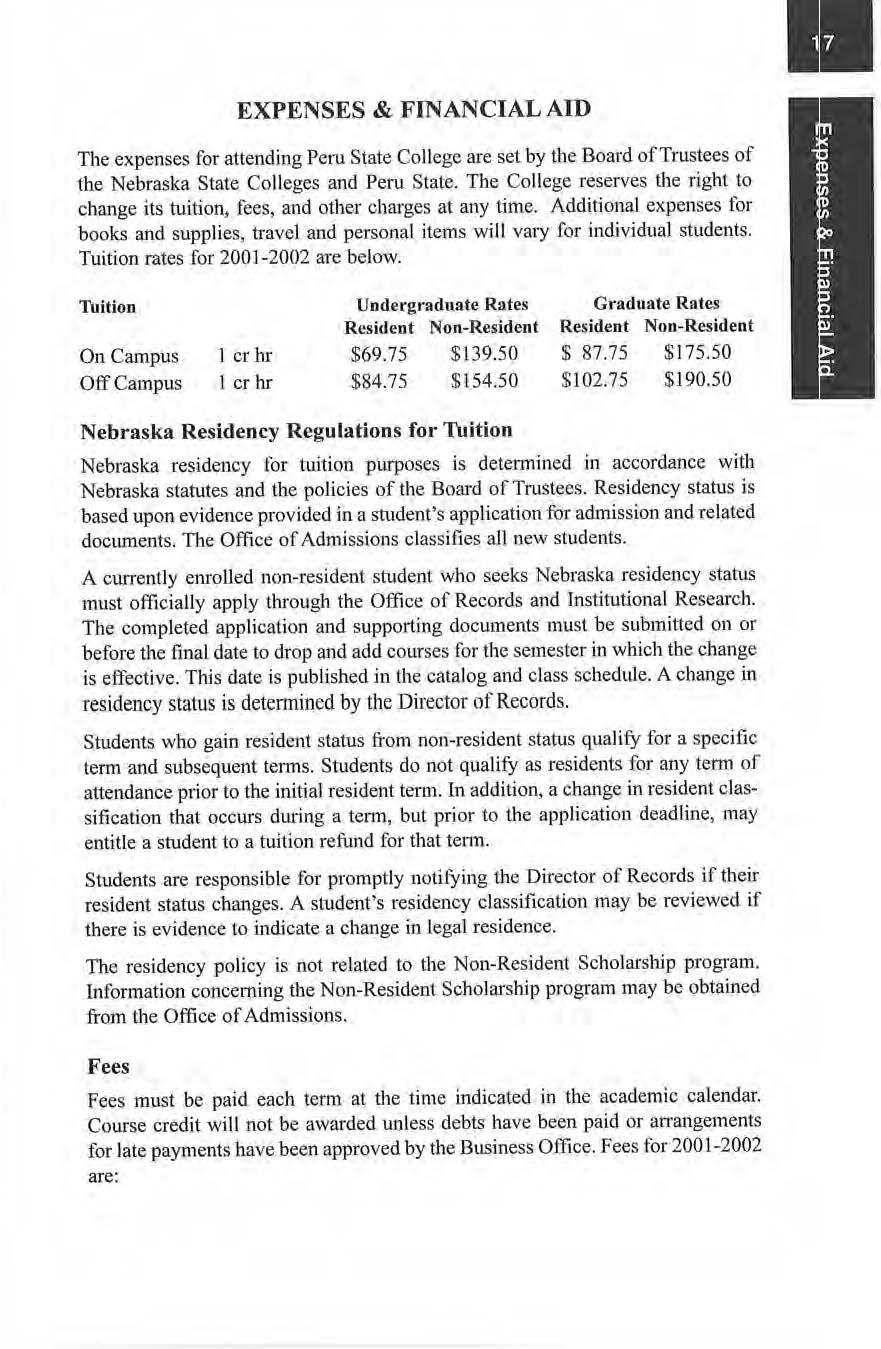
A cun-ent ly emolled non-res ident student w ho seeks Nebraska residency status must officia lly apply through the Office of Records and Institutional Re search. The completed application and supporting documents must be submitted on or before the final date to drop and add courses fo r the semester in which the change is effect ive. This date i s pub li shed in the catalog and class sc hedule. A change in res idency status is detenn ined by the Director of Reco rds.
Students who gain res id en t s tatus from non-resident status qualify for a specific term and subsequ ent te1ms. Students do not qualify as resid ents for any term of attendance pr ior to the initi al re sident term. In addi t ion, a change in resident classification that occurs during a tem1, but prior to th e application deadline, may enti tl e a student to a tuiti on refund for that tenn.
Students are respons ibl e for promptly notifying th e Director of Records if their resident status changes. A student's res idency classificati on may be reviewed if there is evi d e nce to indicate a change in legal residence.
T he residency po licy is not related to the Non-Resident Schol arship program. Information conce rnin g the No n-Resident Scholarship program may be obtained :froJn the Office of Admissions.
Fees must be paid each term at the t im e indicated in the academic calendar. Course credit wi ll not be awarded unless debts have been paid or anangemen ts for late payments have been approved by the Business Office. Fees for 20 0 L-2002 are:
Technology Fee (Fall, Spring, Maymester and Summer Sessions)
I+ hOlu·s
Facilities Fee (Fall. Spring, Maymester and Summer Sessions)
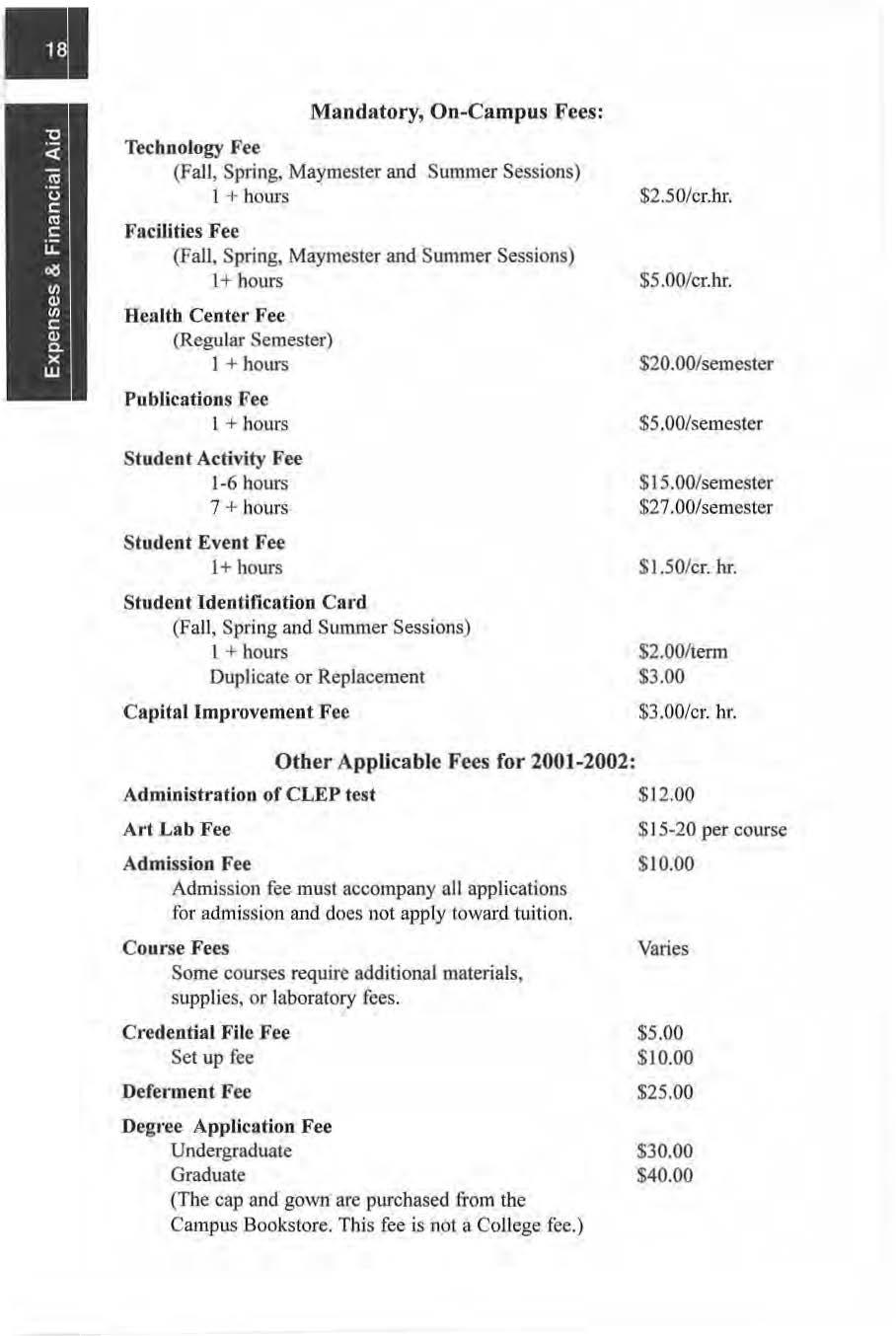
1+ hours
Health Center Fee (R egu lar Semester)
I + hours
Publications Fee
I + hou rs
S tud ent Activity Fee
1-6 hours
7 + h ours
St ud e nt Event Fee
l+ hours
S tudent Identification C ard (Fall , Spr in g a nd Summe r Sess ions)
1 + hours
Duplicate o r Repl acement
Ca pital Improvement Fe e
Art Lab Fee
Admission Fee
Admiss ion fee must accompany all application s fo r adm ission and does not apply toward tuition.
Cours e Fees
So me cou rses require additi onal materials , supplie s, or la bora to ry fees.
Credential File Fee
Set up fee
Deferment Fee
Deg ree Applicatio n Fee
Undergraduate Graduate
$2.50/cr.hr
00/semeste r
.00/sem
5.00/semester
hr.
$
$10.00 Varies $5.00 $10.00 $25. 00 $3 0.00 $40.00
Late Registration Fee
Due on all registration s compl eted between the end of regular e nro llment and up to one week after the regular enro llm ent period is ended.
Late Tuition Fee
Due on all accounts not p aid in full by due date un less other arrangements have been approved by the Business Offic e. Students with seriously past due accounts may be admi11istratively withdrawn from school.
Tuition, fees and deposits are refimded in accordance with Coll ege policies and the Departm ent of Educ ation Calculation Guidelines for refunds. R efund distribution is governed by federal guide lin es.
1\1ition and fee refunds are granted for a reductio n in semester credit hours thro ugh the final date to drop/add regular semester courses as indicated in th e catalog. The final date to withdraw from class during the s ummer sess ion is a proportional period of time.
Students who have reg istered and then wish to drop all courses after the semester sta1 t date must offic iall y withdraw to zero credits. A studen t may do so in the office of the Vice President of Student Serv ices and Enrollment Management. Fai lure to i nitiate the withdrawal process in a timel y manner will result in ''F'' grades.

FEDERAL AID - Withdrawal from Co llege can reduce your Federa l Aid Eligibility. Within 30 days of your w ithd rawal, a Retum to T itle IV Funds (R2T4) calculation will be compl eted and you will be notified of the change in tl1e amount of Federal Financial Aid applied to your account.
, INSTITUTIONAL AID & CHARGES - I nstrtutional Aid, Tuition Charges, Fees and Hous in g Cha rges will be reduced based on the schedule Hsted be low. ( Thi s includes all scholarships, waivers and s upplemental grants not includ ed in the R2T4 Calculation. ) Board Ch arges wi ll be adjusted accord ing to the official date of withdrawal.
OUTSIDE SC HOLARSHIPS - Outsid e scho l arships will be adjusted according t o the schedule below unl ess donor instructions indi c ate othe1wise.
PLEASE NOTE: The combination of these calculations may result in a balance due to the college, an outs ide donor and/or the federal government.
Withdraw Sch ed ule
Regular Se mes te r
First and Second Week
Third and Fourth Week
Fourth thru Eighth Weeks
After the Eighth Week
Maymester/Sum mer Sessio n
First Week
Second Week
Third Week
After the Th ird Week
Workshops and Other No n-Sta ndard Acad e mic Terms
Refunds for workshops and other non-standard terms will be proportional based on the time period of the workshop and in compliance w ith Department of Education Calculation Guidelines for refunds. There will be no refunds after 50 percent of the workshop's or nonstandard term's contact hours. Refimd specifics for non-standard workshops and exceptions are detennined by the Business Office Manager.
Housing and Food Service contracts a re academic year annual contracts. Room reservations require a deposit of$ I 00 and must accompany the housing application. Completion of a contract is required prior to occupying a room. The deposit is refi.mdable if the student comp let es his/her contract, withdraws for approved reasons, or t here are no damages to the facility. Students have the opportu ni ty to change meal plans until the last day of drop/add. Students may appeal to be released fi-om a meal plan by fonnally appealing to the Director of Residential Life by the date in tne Student Handbook/Planner. Food Service an d housing rates for 2001-2002 are below. Rates subject to change. Call the PSC Admissions Oflice for current rates.

Fo od Service Ra tes (meal p lans avai lable Monday-Sunday)
7 meals (apartment tenants only) $477.00/semcster
10 meals
$891.00/semester
IS meals $943.00/semester
Delzell and Morgan Halls (per semester)
Private Room (if space available)
Sem i-private Room
$ 1,432.50/semester
$955.00/semester
Cen tennial Complex (per semester)
Pri vate Room (if space available)
Sem i-private Room
Oak Hill Apartments (partially furnished)
One-bedroom Unit
Two-bedroom Unit
$ 1620.00/semester
$ l 080.00/semester
$244.00/rnonth
$293.00/month
Both the one-bedroom unit and the two-bedroom units in Oak Hill include water, gas and cable, but not e lectricity or telephone. Utilities are taxed and subject to a monthly surcharge based on utility cost.
Nicholas Hall Apartments (furnished with utilities included)
One-bedroom Unit
Two-bedroom Unit
$351.00/month
$415.00/month
Nicholas apartment rent in cludes all utilities, cable, telephone and internet.
Pate Apartments
One -be droom (1 person)
One-bedroom (2 persons)
Two-bedroom (2 persons)
Two-bedroom (3 persons)
Two-bedroom (4 persons)
$2,3 00/semester
$1,800/semester
$2,300/semester
$1,800/semest er
$1,800/semester
Meal plan is included in rent (see 7 meal plan rate above for va lue). Rent is charged p er person and inc ludes all utilitie s, cable, telephone, and internet. Contract for academic year or three month summer term required . Summer rates available upon request.
Housing D e posit
Housing a nd Food Service Refunds
$100.00
Students who withd raw from schoo l or whose housing contract is canceled may receive prorated refunds of their housing and food serv ice fees Refunds for housi ng follow the same Tefund sched ul e established fo r tuition and fees. Refunds for meals are prorated on the number of days in the semester and the date of approved cance llation of the contr act. Contract cance llation fo r violations of the studen t code of conduct will n ot rece ive refunds fo r housing. Meal refunds wi II fo llow prorated schedule.

Room deposit wi ll be refunded if:
1. All terms of the contract are comp leted.
2. There is no damage or unusual ,vear-and-tear to the facil ity
3. Th e student checks out of his/her room properly and returns a ll keys.
4 . The fac ility is left clean.
Financia l aid is availab le to mos t students planning to attend Peru State College . Financial aid consists of scholarships, grants, federal work study, and loans. At Peru State College, aid is awarded to students based on qualifications and/or financial need. Tn order to be awarded need-based Title IV Federal F inancia l Aid, a student must complete a federal needs analysis fonn. The needs analysis measures a family's ability to pay, not the willingness to pay, for a postsecondary education. For priority consideration , t be preferred filing date for the Free AppHcation for Federal Student Aid (FAFSA) i s March I. The ptiority deadline for institutional scho larships is Pebruary l. Questions regarding applicatious or eligibility should be directed to t he Financ ial Aid Office.
New freshmen and students transferring to Peru Sta te Co llege who wish to apply for financial aid should:
1. Comp lete the app lication process through the Adm is s ions Office.
2. Financial Aid Transc1ipts (FAT) may be needed if the student is a mid-year transfer.
PLEASE NOTE: A student must be admitted as a degree-seeking studen t to Peru State College in order to receive federal financial aid. (See requirements under Admissions.)
In addition. all s tudents who wish to apply for federal financial aid should;
1. Complete the Free Application for Federal Student Aid (FAFSA). Peru's Title LV code is 002559. This appl ication must be filed annually. Financ ial aid is based upon fmancial need and is reviewed an nua lly.
2. A student interested in obtaining federal work study must comp lete and retl1ro an application to the Financial Aid Office for consideration. This application is available from the Financial Aid Office. Federal Work Study f-tmds are limited and are awarded to students with need-based eligibility. See the Financial Aid Office for the priority filing deadline.

Financial aid awards are dete1mined based on an academic year. Amounts are credited equa lly per tern1 of enrollment to the student 's bill. At the end of each tenu of enro llment, the Financial Aid Office will review the records of students to determine if they are maintaining necessary e ligibility requirements for aid awarded to them. Athletic and divisional scholarships will be reviewed by departments. Satisfactory Academic Progress will be reviewed by the Vice President of Academic Affairs and the Financial Aid Office. Peru State College i s not required to replace scholarships los t with other types of financial aid.
Further information about, or an app lication for, a ll scholarships may be ob tained by contacting the Pent State College Admissions Office.
Board of Trustees Schol arshi p (see note at end of section)
The Board of Trustees of the Nebraska State Colleges provides full tuition scholarships for current graduates of Nebraska high schools who have demonstrated outstanding academic achievement. The recipient must be a Nebraska resident, have a tninimum ACT composite of25 or SAT of 1130, and graduate from a Nebraska high school. One letter of recommendation is required. The scholarships are renewable to cover eight academic semesters. Undergraduate recipients of Otis academic scholarship are required to take a minimum of one Honors course during their first year of attendance. The st11dent must ma intain a 3.25 GPA to retain the scholarship. The application deadline is January I 5.
Presidential Scholarshi p (see note at end of section)
The Presidentia l Scholarship is a two-year scholarship available to current graduates of Nebraska high schools (first-time freshmen). The recipient must be a Nebraska resident, have a minimum ACT composite of 22, and graduate in the upper one-third of their high school class. Recipients of this academic scholarship are required to take a minimum of one Honors course during their first year of attendance. Application for this scholarship must be made with the Admissions Office.

The Davidson Scholarship is available to out-of-s tate graduating high school seniors. The rec ipient must be a first-time freshman, live out of the state of Nebraska, have a minimum ACT composite of 20, and submit one letter of recommendation. This is a $400 scholarship for one academic year. Application for this scholarship must be made with tbe Admissi ons Office.
The Leadership Scholarship is available to graduating high school seniors who have held a leadership role in high school clubs and organizations, and plan to continue that leadership at Peru State College. The recipient m u st also have a mini mttm ACT composi te of 18 and submit one letter of recommendation. This scholarshi p is renewab le for the second year. Application for this scholarship must be made with the Admissions Office.
This is a two-year scholarship awarded to a transfer student with at least 30 hours of college credit with a cumulative GPAof2.5.
This scholarship is available to community col lege graduates who have a cumulative GPA of3 .5 and are a member of the Phi Theta Kappa Society. It pays one-half of in-state tuition for up to 64 hours.
Special Activity Tuition Scholarships are awarded to students enrolled full time who possess special abilities in ait, music, and cheerleading based upon a review of their portfolio, performance, or aud it ion. These scholarships are awarded in the form of waivers. Rec ipients are expected to participate in the
program for which the award is given. Appl icants shou ld contact the appropriate department head to indicate inLerest in a scholarship. Amounts vary and may be renewable based upon the program coordinator's reconm,endat ion.
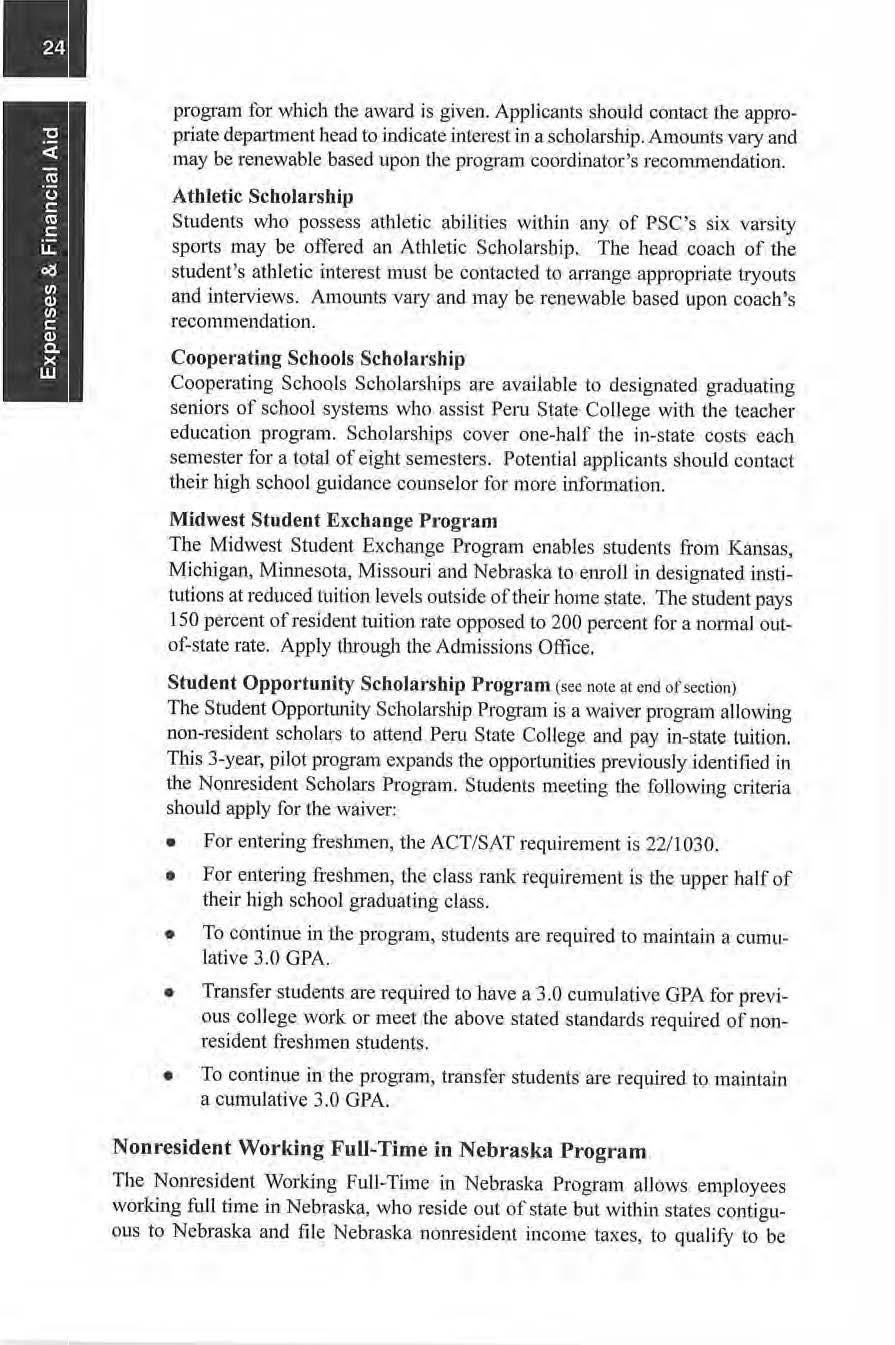
A thl etic Sc hol a rshi p
Students who possess athlet ic abilities within any of PSC's six varsity sports may be offered an Athletic Scho larship. The head coach of the student's athletic interest must be contacted to an-ange appropriate tryouts and interviews. Amo Lmts vary and may be renewable based upon coach 's recommendation.
C ooperating Sch ool s Sc ho la rs hi p
Cooperating Schoo ls Scho larships are available to designated graduating seniors of school systems who assist Peru State College with the teacher education -program. Scholarships cover one-ha l f the in-state costs each semester f01· a totaJ of eight semesters. Potential applican ts should contact the ir high school guidance counselor for more infonnation.
Mi dwest S tud ent Exc ha nge Program
The Midwest Student Exchange Program enables students from Kansas, M ichigan, Minnesota, Misso uri and Nebr aska to enroll in designated ins titutions at reduced tuition levels outside of their home state. The student pays 150 percent ofresident tuition rate opposed to 200 perce nt for a nonnal outof-state rate. Apply tbrough the Admissions Office.
S tud e nt Oppor tuni ty Sc holars hip Program (see note iit eod of sect ion)
The Student Opportunity Scholarship Program is a waiver program allowing non-resident scho lars to attend Peru State College ahd pay in-state tuition, This 3-year, pilot program expands the opportunities previously identified in the Nonresident Scholars Program. Students meeting the fol l ow ing criteria sh ould apply for t h e waiver:
• For entering freshmen , the ACT/SAT req u irement is 22/1030
• For entering :freshmen, t he class rank requirement i s the upper ha lf of their high school graduating class
• To continue in the program, students are required to majn1ain a cumulative 3.0 GPA.
• Transfer s tudents are required to have a 3.0 cumu lative GPA for p revious college work or meet the above stated standards required of nonresident freshmen students.
• To continue in the program, transfer students are required to maintain a cumul ative 3.0 G PA.
The Nonresident Working Full -Tim e in Nebraska Program allows employees working full time in Nebraska, who reside out of state but within states contiguous to Nebraska and file Nebraska nonresident income taxes, to qua lify to be
charged in-state tuition rates. The legal dependents of these employees are also eligible for this program. Students requesting res ident student tuition status unde1· this policy need to provide Lhe Office of Student Services with evidence of cmTent full-time employment in the State of Nebraska and evidence of filing Nebraska income tax forms for the most recent tax year. Eligibility fo r th e resident tuition under this program is subject to review each tenn and will continue only as long as the required criteria are satisfied.
NOTE: Students who earn Presidential, Board of Trustee, or Non-Resident Scholarships must enroll in at least one Honors course during their first year at Peru State College. After their- first year, students who continue to recei ve one of the preceding scholarships and who meet the Honors Program eligibi lity requirement - by maintaining a 3 .0 cumulative grade point average - must take a t leas t one Honors course each year until they either fulfil l the 15 credit hour requirement to graduate from the Honors Program or complete their General Stud ies course requirements.
A student must complete the Free Appl ication for Federal Student Aid (FAFSA) in order to be considered for federal financial aid. See the Financial Aid Office for the priority filing deadline.
The results of information submitted to the Department of Education ( res ulls of the Free Appli cat ion for Federal Student Aid - FAFSA) determine Pell Grant eligibility.
Federal Suppleme ntal Educational Opportunity Grant (FS.EOG)
These grants are awarded to students with exceptional financial need. The student must be a recipient of a Federal Fell Grant.
Federal Work St udy (FWS)
Federal work study is a need-based program. The intent of work study is to allow a student an opportunity to pay for a portion of their education by working. A student can work a maximum of20 hours per week and during periods of vacation 40nours per week. Jobs are usually on campus and are vital to tbe efficient operation of the college.

These are low interest, lon g-term Joans made to students showing financial need and who are in good standing. The loans range from $500 to $4000 per academic year.
Loans included in this program consist of Federal Subsidized and Unsubsidized Stafford Loans and federal PLUS Loans. These are Jong-term loans made available to students and/or their parents. Loan ainounts vary depending on grade level.
State Scbolarsb.ip Award Program (SSAP)
This assistance is awarded to students demonstrating substantial need. Recipients must be U.S. citizens enrolled at an eligible Nebraska institution of h igher education.
Scholarship Assistance Program (SAP)
The recipient must demonstrate substantial need and be a Nebraska resident enrolled at an eligible Nebraska institution of higher education.
According to federal regulations, Peru State College is required to monitor standards of satisfactory ac11demic progress for students receiving Federal Title IV funding. Federal aid includes: Federa l Pell Grant, Federal SEOO Grant, Federal Perkin s Loan, Federal Stafford Loan, .Federal Parent Loan, and Federal Work Study.

Students who are receiving federal aid, as we ll as campus-based aid, arerequfred to maintain satisfactory academic progress in order to continue to be eligible to receive aid.
1. PROCEDURES - At the end of each term, the academic records of all financial aid recipients are reviewed to determine if each student met the satisfactory academic progress requirements.
2. SATISFACTORY ACADEMIC PROGRESS - All financial aid recipients must maintain a cumulative grade point average of2 0 or higher to continue to be eligible for aid
Student enrollment levels are determined according to the following guidelines.
All
aid recipients mus t complete a minimum number of credit hours each term as follows:
Only hours that are passed (grades of A, B, C, D , CR) will be counted as hours completed. Grades of I, W, F and NCR will not be considered as hours completed.
3. MAXIMUM TIME FRAME - A student pursu i ng an undergraduate degree at Peru State Co ll ege m ay receive Titl e IV aid for 11p to a ma.-ximum of 188 attempted credit hours or until obtai n ing a bachelor's degree, whichever comes first.
4. PROB ATI ON - Any student wh o does not meet the sat isfactory academ ic progress req uirements as out li ned in #2 w ill be placed on "financial aid probation'' for the following tenn. The student wi ll be eligible to receive aid during the probationary term . However, the student must meet all of the satisfactmy academic progress requireme nts at the end of the probationary tenn to contin ue to be eligible fo r financial aid.
5. SUSPENSION - lf the student does not meet a ll the satisfactory academic progress requirements at the end of the probationary term, the student will be placed on "financial aid suspension.'' Students who are on suspension are not e l igib le to receive any financial aid. This facludes grants, loans, work study, and institutional scholarships.
6. REINSTAT EMENT - A student can regain eligibility for financial aid by enrolling for at l east six credit hours at bis/her o--.vn expense and achieving a cumul ati ve grade point average of at least 2.0 and completing the min imum number of hours outlined in #2. To be rei1istated, a stude11t m ust submit a written r equest for re i nstatement to the Financial Aid Office and a copy of his/her grade reporl to demonstrate compliance witb the satisfactory academic progress requirements.
7. APPEALS - If a student w hose financ ia l aid has been suspended feels he/she experienced significant extenuating circumstances which affected his/her abi li ty to meet the satisfactory academjc progress req uirements, he/she should submit a written appeal to the Financial Aid Office within two weeks of the date of fhe suspension letter. Documentati on of a r1y extenu ating circumst ances should be attached to the appeal. The Appeals Committee wi ll review the appea l and determine whether the student's financial aid e l igibi l ity sh oul d be reinstated.
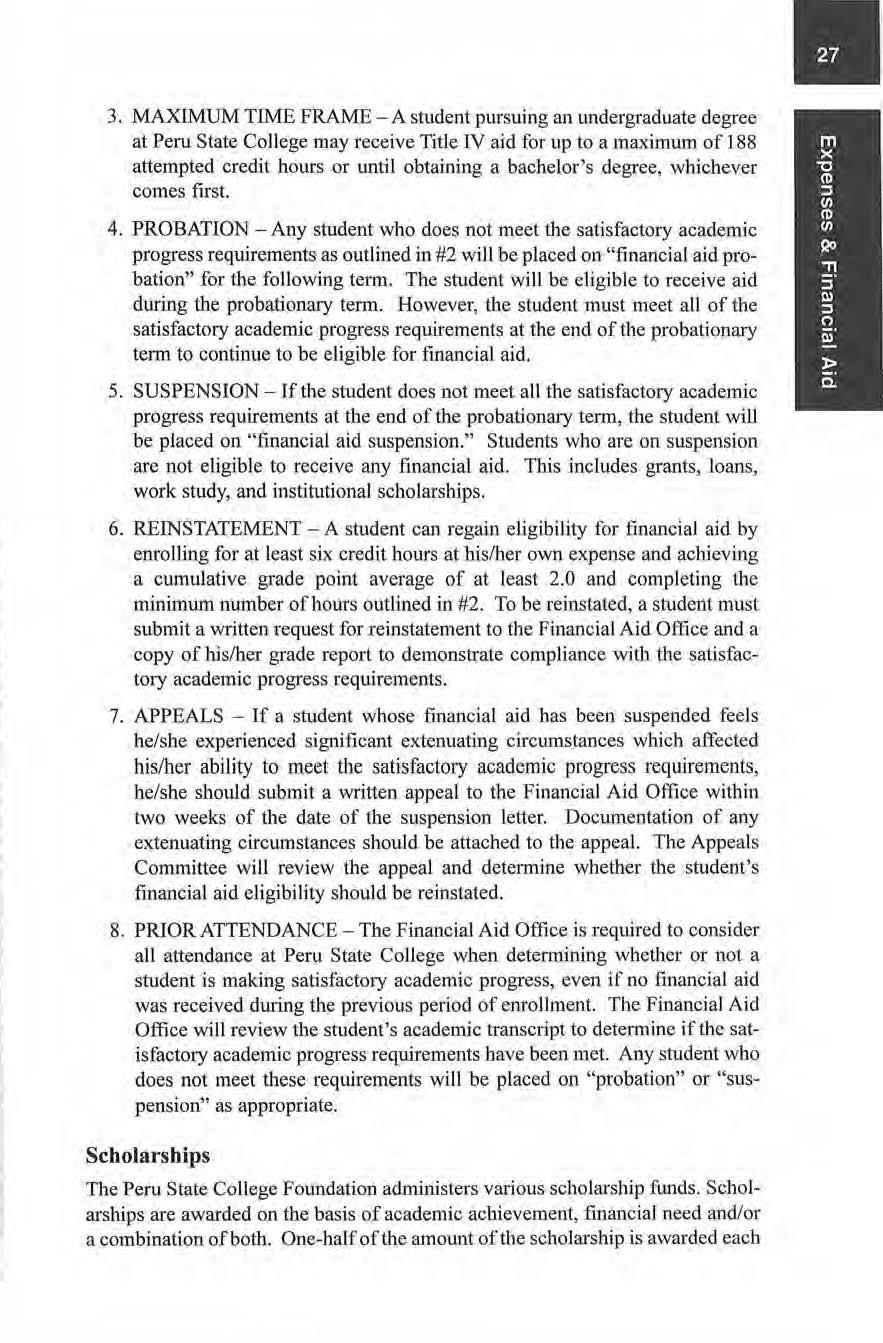
8. PRIOR ATTENDANCE - The Financial Aid Office is required to consider all attendance at Peru State College when detenuining whether or not a student is making satisfactory academic progress, even if no financia l aid was received during the previous period of enrollment. The Financial Aid Office will review the st udent's academic transcript to determ ine if the satisfactory academic progress requirements have been met. A ny student w l10 does no t meet these requi rements wi ll be placed on "probation" or "suspension" as appropriate.
The Peru State Co llege Foundation administers various scholarship funds. Scholarships are awarded on the basis of academic achievement, financia l need and/or a combination of both . One-half of the amount of the scho l arship is awarded each
semester. Scholarships and othe r financial aid are avai lable to deserving fulJtime students because of the generous contributions of alumni, friends, co1porations and foundations.
The Peru State College Foundation was organized in Jw1e, 1955 and incorporated as a non-profit cor poration fo r edu cati onal and charitabl e purposes in May, 1962. Further infonnation aboul, or an application for, all scho larsh ips may be obtained by contacting the Peru State Co ll ege Adm iss io ns Office.
L aurine Anderson Tri Beta Scholarship
The recipient oftJ.li s scbolarsllip is se lecte d by the Sc hoo l of Atts and Sciences and must be a Biology major and m ember of Tri Beta. The scholarsh i p was estab li shed by Laurine Anderson, class of 1928, who was a charter member of the Pem Chapter of Tri Beta.
Marian A nderson Scholars hip
This scho lars hip is awarded to an incoming female freshman AfricanAmerican student.
C harles Andrews Memorial Scho larship
This fund was estabushed as a memorial to Charles Andrews, a 1914 graduate of the CoJJege. The scholarship is awarded to an in com ing freshman who shows academic promise and may be renewed depending on th e student's grade point average.
Bath Family Memorial Scholars hip

This scholarship was establ i s hed in 1967 by Mrs. Minnie Bath in memory of her husband John and her two sons, Edward J. and R obert L. Bath. It is awarded for academ ic achi evement.
Merle ''Hoot" Bauer Memorial Scbolanbip
This scholarship i s awarded to an incoming freshman, with preference to Tecumse h, Holdrege, N011h Platte or Bertrand gradu ates, who will be on the basketbaJJ team Mr. Bauer, a 1950 gradua te, was an outstanding varsi ty basketball player. The rec ip ien t will be selected by the Athletic D epartment.
E. C. and Mae Miller Beck Scholarsh ip
This scholarsh ip was established by Dr. and Mrs B eck i n 1967 for an Engli sh major w it h ath letic ability.
Bl ue Devil/W hite Ange l Forever Sch olarship
Sid Brown, a 1959 grad of PSC, contacted former Blue Dev il and White Angel members to establish this scholarship. This scho larship is awarded to a male o r female ad1lete.
A lbert Brady S cholarship
E s tablished by the Peru State Co ll ege Letterman ' s C lub and the friends of Albert Brady, the scholarship is awarded to a Biology major with ath letic ability. The r e cip ient will be selected by the Athletic Department/School of Arts a nd Sciences.
George V. aod Iva Seid B rown Scholarship
This scholarship was provided by Sid Brown, a 1959 graduate of Peru State College, in memory ofbis parents. The scholarship is available to Nebraska residents with a 3 .0 or higher GPA.
Esther Delzell Brownell Memorial Scholarship
Mrs. Brownell 's family established this scholarship in her memory. It is awarded to a deserving student. An interest in dramatic activities is encouraged.
An n Buman S cholars hip
This scholarship was established by Mrs. Buman and is available to Pawnee County students who meet certain criteria.
Pearl Morga n Butler Memorial Scholarship
The scholarsh ip provides for tuition as the fund allows. It was established by Joy Elmer Morgan in memory of his sister who attended the College in 1905.
Campu s of a Thousand Oaks Sc holarship
This scholarship is awarded for academic excellence and/or potential. Funds in this pooled accow1t have been provided by the Alma Ashley Estate, L illian Barnes and Alice Wamack Scholarship, C lass of J 939, Jess A. Harris Scholarship Fund, Harold and Alice Grnsh Johnson, and the E .A. Larson Scholarship Fund.

Roy C hamberlain Scholarship
The Roy Chamberlain Scholarship was provided by Mrs. Chamberlain in memory of her husband Roy, a 1927 alwnnus of P eru State College Any full-time male student is eligible to apply.
R a lph and Maxine C hate lain Scholarship
Tb.is scholarship was established by the sons of Ralph and Maxine Chatelain who were graduates of Peru State College and l ong time educators in Nemaha County. The scholarship will be awarded to jwuors or seniors in teacher education with a preference for residence in Nemaha Cmmty, Neb.
C.C. and Erma Wilson Choyce Scholarship
This scholarship was established by Mr. and Mrs. C.C. Choyce to recognize academic achievemen t. Mr. Choyoe attended the College in 1919, and Mrs Choyce graduated in 1920.
A .B. C1ayburn Memorial Aw ard
This award is granted each year to a junior in teacher education majoring in the Social Sciences who has displayed the qualities of outstanding citizenship, progress, and potential. The recipient will be s elected by the School of Arts and Sciences .
Family and friends have establi shed the Clements Band Scholarship in appreciat ion of Mr. Clements' efforts to establish a band at Pem Prep. The award is for an in com in g freshman w ho wi ll participate in band activities. The select ion will be made tlu·ough the audition process conducted by t he School of Arts and Sciences. Mr. C lements was a member of the College faculty from 1926 to 1953.
C rabtree Memorial Scholarship
Dr. Eun.ice Crabtree established this scholarship in l982 i n memory o f her father, Dr. James Crabtree, and her brothel~ James Wilson Crabtree, who died in infancy. Dr. Crabtree served as President of Peru State College from 1904-1910 and was the founder of the Nat ional Educational Association. The scholarship is awarded for academ ic achievement.
Ada Crooker Memorial Scholarship
This scholarship was estab li shed in the memory ofA d a Crooker who taught business at Auburn Hi gh School. The recipient must be a woman graduate of Aubum High School majoring in Business at the College. The recipient wilJ be selected by Auburn Hi g h Schoo l.
Hobart Davidson Scholarship
The brother of long-time women's Physical Edu cation instructor Phyllis Dav id son, funded several scholarships to be awarded to both traditiona l and non-traditional students , including some scholarships spec ified for out-ofstate stude nts. Phyllis Davidson served Peru State College from l 929 until I 957 . Hobart Davidson was an attorney in Oklahoma.
Phy llis Davidson Memorial Scholarship
T his scholarship was established by Dr. Lois Chri stensen, a 1948 alumna, in the memory of Phyllis Davidson who served Pent State from 1929 to 1957 as a professor of women's Physical Education . Jt is awarded to a woman majoring in Physical Ed ttcation . The recipient wi ll be selected by the Athletic Department.
Elizabeth Aldrich Dougherty Scholarship
E lizabeth Dougherty was a 192 1 graduate of PSC. Thi s scholarship was established by her chi ldren and is designated fo r a junior or senior majoring in Education Students li v ing in Nemaha, Richardson, Johnson, Pawnee or Otoe counties in Nebraska are eligible for this scho larshi p. Selection will be made by the School of Education and Graduate Studies.
Helen Naeve Douglas Music Scholarship
This scholarship is provided annually by Judson Douglas in memory of his mother. The award is given to a freshman who is a talented musician majoring in Music Education. Preference will be given to Johnson., Otoe or Nemaha county residents. The recipi ent will be selected by the School of Arts and Sciences.
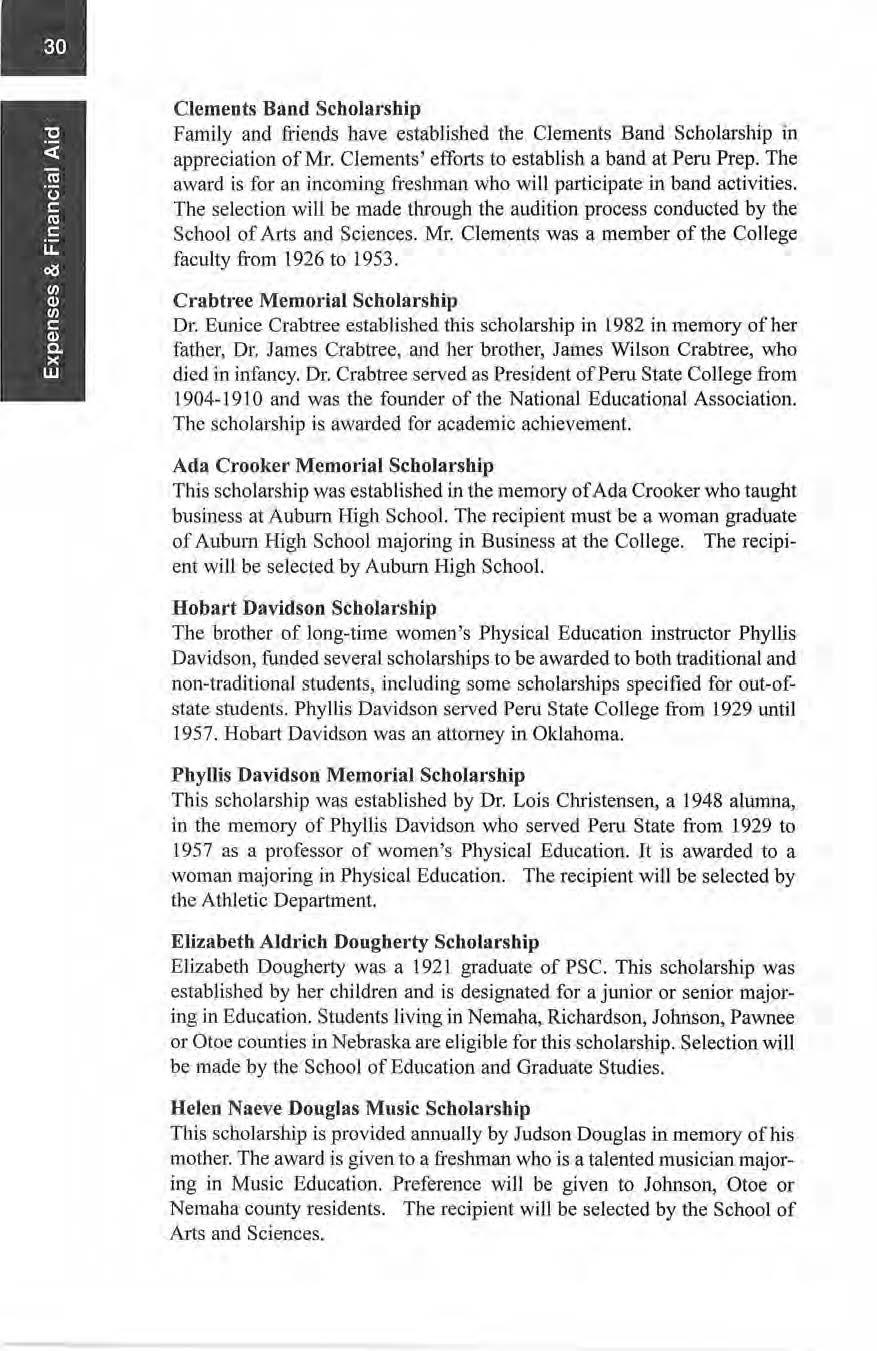
Mac Dunning Industrial Arts Award
Thi s is an annual cash grant given to an outstanding student in TndustriaJ Technology and Education. The recipient will be selected by the School of Professional Studies.
Lura Hend1·ichs Eichler Scholarship
This award is presented annually to a student who has demonstrated ability, aptitude and interest in kindergarten education. The School of Education and Graduate Studies se lects the recipient.
Loure Saltzman F iroved Scholarship
Mrs. Firoved, a 1916 graduate of the College, served many years as secretary to the college president. This scholarship, established by her children, is de s igned for a student majoring in Business.
Elsie I. Fisher Memorial Scholarship
This scholarship was established in memory of E lsi e I. Fisher, a graduate, who taught for 39 years in the Omaha school system. It is awarded to students in Art Education.
Dr. Richal'd Flynn and Senator Floyd Vrtiska Academic Scholarsh ip
This scho1arship was established by friends of Dt. Richard F lynn and Senator Floyd Vrti ska and is available to incoming freshman students who reside in the first legislative district and graduate in the upper one-fourth of their class.
Esther Co le Franklin Memorial Scholarship
Dr. FrankJin was a 1920 graduate of the College who was recognized as a distinguished alumna in 1977. This scholarship was established in her memory and i s awarded 10 an outstanding student.
Glen and Verda Frary Scholarsh ip
Glen and Verda Hauptman Frary were both 1927 graduates of Peru State who devoted their careers to educa11ng youth. This scholarship is to be awarded to a sophomore or junior Education major.
Emma Anne Hart Fuller Scholarship
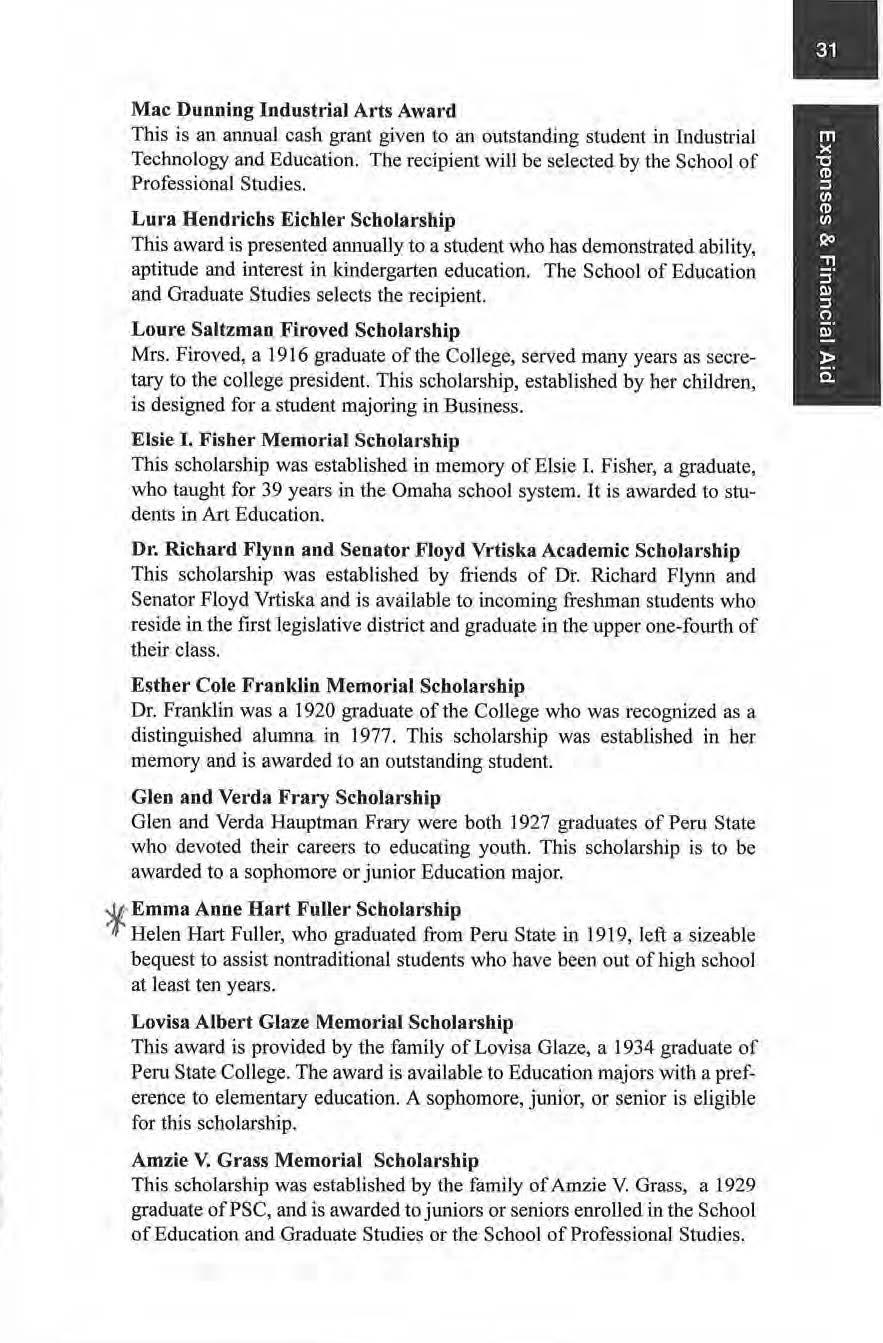
'1' Helen Hatt Fuller, who graduated from Pe ru State in 1919, left a sizeable bequest to assist nontraditional students who have been out of high school at least ten years.
Lovisa Albert Glaze Memorial Sc holarship
This award is provided by the family ofLovisa Glaze, a 1934 graduate of Peru State College. The award is available to Education majors with a preference to elementary education. A sophomore, junlor, or senior is eligible for this scholarship,
Amzie V. Grass Memorial Scholarship
This scholarship was established by the family of Amzie V. Grass, a 1929 graduate of PSC , and is awarded to juniors or seniors enrolled in the School of Education and Graduate Studies or the School of Professional Studies.
Chris Haddad Memo ria l Scholarshi p
Established by friends and family, this scholarship is awarded to a Business student, with preference to someone from Seward County. Chris Haddad was a 1989 graduate and was an admissions counselor at Pent State College.
Helen Parker Hanika Sc hol ars hip
Helen Parker Hanika was a 1917 PSC graduate This scholarship is for an incoming freshman who has graduate d from a Richardson County (NE) high sch ool.
C lifford Harding S ocial Science Schol ars hip
This scholarship is availab le to sophomores, juniors, and seniors who are majoring in Social Sc iences. Applications for this award are availabJe from the Schoo l of Arts and Sciences. Clifford Harding was a 1944 graduate of PSC.
Benjamin Harr iso n Memorial Scholars hip
The family of B enjamin Hall'ison, Class of 1907, established th.is memorial to provide scho larships to worthy Peru State students.
Wa l ter and Lillian Hal'rison Memo ri al Sc hola rs hip
This scholarship was established by Carlos l Ian-ison in honor of his parents. The award is given to freshmen students from Mills, Fremont or Page counties in lowa.
A rn old and Berth a H ilterman Scholars hip
This scholarship was established by Charles Masopust in memory of his sister and her husband. It is presented to a deserving Pern State student.
Lena Huff Memorial Scholarship
This scholarship is awarded for scholas tic excellence in the memory of Lena Huff, a 1909 graduate of the College.
Harry and Mary Hutchinson Me m oria l Scholars hip
This scholarship is provided by Charles Masopust in memory of the parents of hi s sister-in-law, Hollis. It is to be given to an outstanding sophomore or junior who has excellent potential to be an outstanding teache,. The recipient should demonstrate campus leadership and a need for financial assistance.
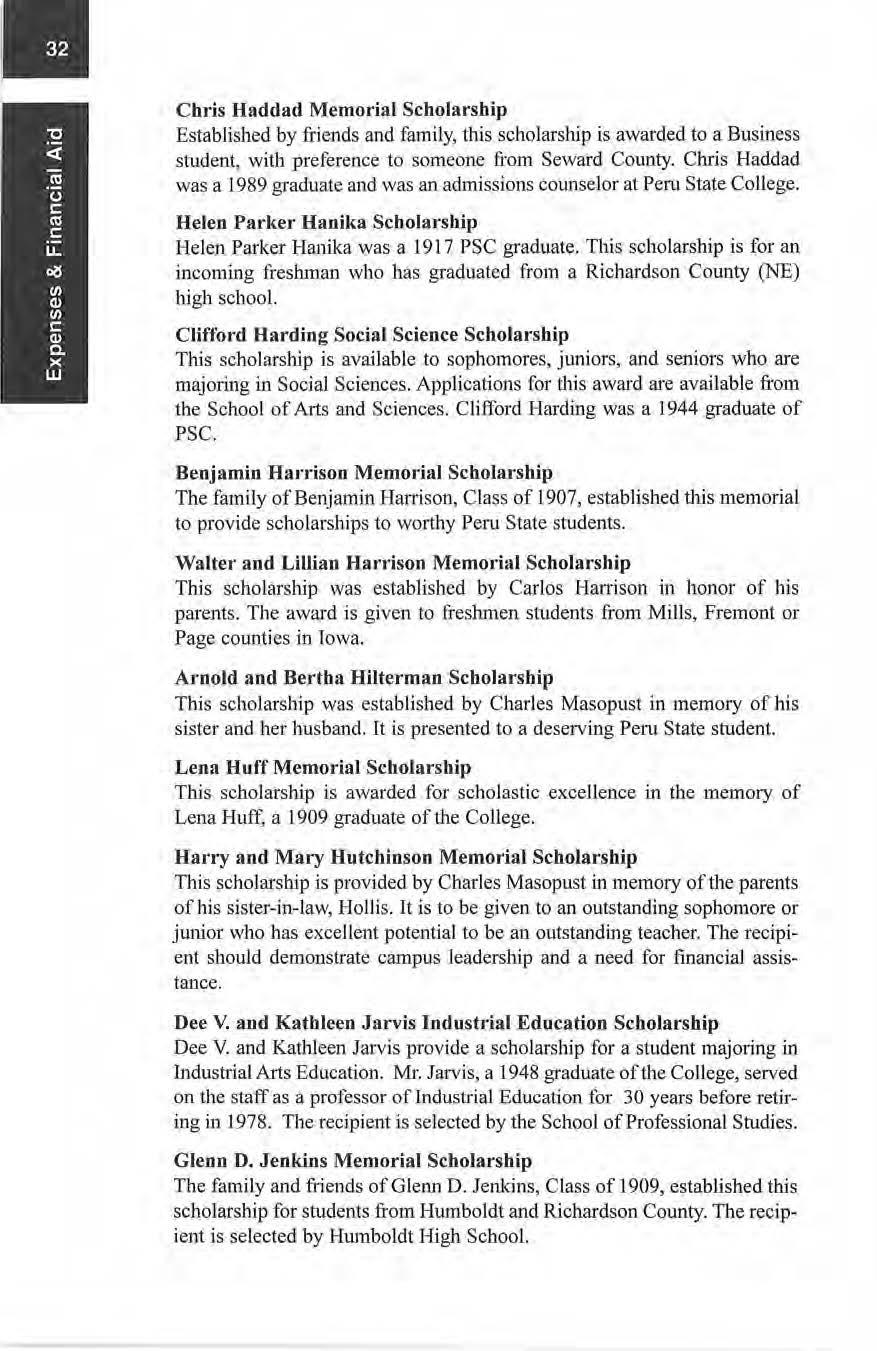
Dee V. and Kath leen Jarvis lndush·ial Ed ucation Schola rship
Dee V. and Kathleen Jarvis provide a scholars hip for a student majoring in Industrial Arts Education. Mr. Jarvis, a 1948 grad uate of the College, served on the staff as a professor of Industrial Education for 30 years before retiring in 1978. The recipient is se lected by the School of Professional Studies.
Glenn D. JenkiIJs Memorial Scholars hip
The fa mil y and friends of Glenn D. Jenkins, C la ss of 1909, established this scholarship for students from Humboldt and Richardson County. The recipient is selected by Hwnboldt High School.
Victor H. Jindra Memorial Scholarship
This scholars hjp for s tudents in Music was establis hed 6-om the estate of Victor H. Jindu. a professor of Music at the College from 1923 to 1961. The recipient i s se lected by the School ofArts and Scie nce s.
Pearl A. Kenton Language Arts Award
This award is presented annually to an outstanding studen t m~joring in Language Arts. The recipient is selected by the Schoo l of Arts and Sci• ences.
C oretta Scott King Scholarsbjp
These scholarships a re provided annually by an anonymous donor. Th ey are awarded to African-American female freshmen stud ents who are not athletes.
Georgia KJasek Ed ucation Scholarship

Georgia was a 1950 graduate of Peru State Co ll ege. Th.is scho larship was estab lish ed in her memory by her family and is avai lab le to upperclass st11dents who ar e majoring in Education .
P aul aod Lillian Landolt Scholarship
This scholarship is in memory of Pau l Lando lt , a 1933 grad uate of P eru S tate College, and his wife. Paul was a long-time teach e r and spent his early years in Peru The schol arshi p is avai lable to s tud ents in Business Educ ation or Sci ence.
A. V. and Wilhelmina Larson Memorial Industrial A rts Award
This award is presented to a sophomore s tud ent who demonstrates promise as a teacher oflndus trial Teclu1o logy. The redpient is se lected by the Schoo l of Profess ional Studies.
Loew Family Scholarshlp
Nonna Loew, a 1966 graduate of PS C , establi s h ed this scholars hip in honor of the Loew Family. lt is awarded to students from rural southeast Nebraska who have co mp leted their freshman year in e lem entary, business or specia l education. They must have participated in at l east one campus activity.
Dr. William Longley Memorial Scholarship
T hi s scholarship was established by Mrs. Pat Longl ey at the time of the death of Dr. Lo ngley. The scholarship is availab le to scien ce majors in their sophomore, juni or or seni or year.
Arthur R. Majors Memorial S cholarship
Thi s scholarsh ip was es tab l ished in memory of Arthur R. M ajors, a 1926 graduate of Peru State, who was an active educator for 43 years. Mr. Majors was a strong supporter of the Co!Jege and the Peru State College F oundation. The scholars hip is awarded to a st udent m~joring in Nattu·al Science.
Charles Masopust Sc holal'Sbip
This scholarship was donated by Charles Masopust. Although he never attended Peru State, Mr. Masopust developed an interest in the College through his brother Joe, a supporter of the College and Peru resident. This award is given to a deserving student who may not qualify for other scholarship funds based on outstanding academic accomplishments, but who demonstrates personal qualities that are a credit to the College and student body and who distinguishes himself/herself through involvement in co-cmricular activit ies.
Holli.s Hutchinson Masopust Memorial Scholarship
This scholarship, established in 1986, was donated by Charles Masopust in memory of bis sister-in-law, a 1933 graduate of Peru State College. The award is to be given to an outstanding sophomore or junior student who has participated above and beyond average in math and science and to whom this award will make a difference in achieving his/her education.
Joe Masopust Memoria l Sc holarship
This scholarshjp was estabJished in 1986 and is donated by Charles Masopust in memory of his brother, a friend and benefactor of Peru State College. The scholarship is to be given to the outstanding sophomore or junior student who has contributed the most to Peru State College in nonscho lastic activities (not sports), has good scholastic potential ljlld to who m this assistance will make a difference in achieving the student ' s education.
John and F rancis Schima Masopust Scholarship
This scholarship was donated by Charles Masopust in memory of his parents and is awarded to a student who knows the value of hard work.
L.B. and Ruth Mathews Memorial Scholarship
This scholastic award is made in the memory of Mr. and Mrs. L.B. Mathews. Mr. Mathews was a Professor of Physics and Principal of the Pern Prep School from 1927 to 1961. Mrs. Mathews was a faculty member at the College from 1943 to 1960.
D1: Paul A. Maxwell Memorial Scholarship
This scho larship was established by Dr. John Maxwell, a 1946 alum, in honor of his father who was a professor at PSC. Students majoring in educat ion are eligible for this scholarship.
Jack McIntire Scholarship
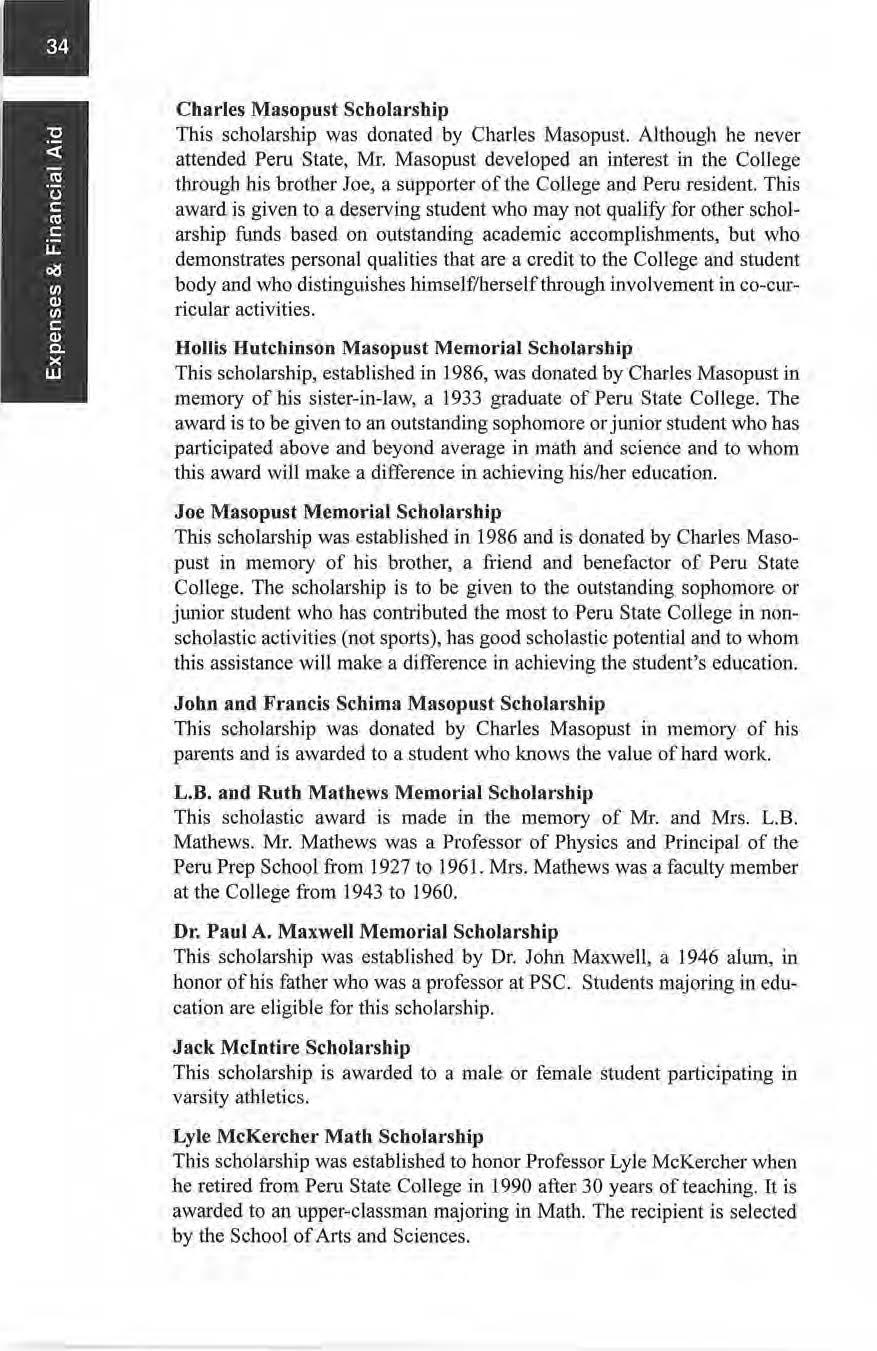
This scholarship is awarded to a male or female student participating in varsity athletics .
Lyle McKercher Math Scholarship
This scholarship was established to honor Professor Lyle McKercher when he retired from Pern State College in 1990 after 30 years of teaching. It is awarded to an upper-classman majoring in Math. The recipient is selected by the School of Arts and Sciences.
This scholarship was established by family and friends of Hanford Miller, a fonner Science professor at PSC. The award is g iven to a junior or senior science major and is selected by the School of Arts and Sciences.
Tins award was established by Mason Miller in memory of his wife who received her two year degree in 1940. The award is available to an incoming freshman from Pawnee County who has a minimum GPA of 2 5. The award is renewable.
Dr. Joy Elmer Morgan Memorial Scholarsh ip
This scholarship was provided by the estate of Dr. Morgan, a 1912 graduate of Peru State Co llege and long time Secretary of the National Education Association. The award is to be given to outstanding students preparing to become teachers.
Evalyn Booth Newton was a student at P eru State College in 1925 and 1926. She was a music and English teacher and supervised studen t teachers at PSC from 1956 to 1958. This sch olarship is available to E1,gli sh Education majors with sophomore, junior, or senior status who have a 3.0 or higher GPA. The award is selected by the English Depa11ment.
Among Peru State College's most prestigious scholarships are the Omaha World-Hei•ald Schol arships, funded by tbe World-Herald Foundation. This scholarship provides full tuition scholarships for current graduates of Nebraska high schools who have demonstrated outstanding academic achievement The recipient must be a Nebraska resident, have a minimum ACT composition of25 or SAT of 1100, and g raduate from a Nebraska high school. One letter of recommendation is required. The scholarships are renewable to cover eight academic semesters. Undergraduate recipients of this academ ic scholarship are required to take a minimum of one Honors course during their first year of attendance. The student must maintain a 3.25 GPA to retain the scholarship.

This scholarship is awarded to a Business Education student in the memory of Nona Pa lmer, a 1910 gradua,te, who served as a professor of Business from 1915 to 1960. The recipient is selected by the Schoo) of Professional Studies.
This scholarship is given by the Pankonins in memory of William B. and Myrtle F. Metcalf. The award is available to any United States student with a 3.0 o r higher GPA.
La r ry G. Pappas Science Scholars hip
Larry Pappas was a s c ience teacher at P SC . This schol arship was established by fami ly a n d friends at th e time of his death . The scholarsh ip is ava il able to mcomi11g fres hmen who p l an to m ajor in B iology.
H. Dal e Park and Evely n M . Park Scholarship Fund
A 1934 gradu ate, M rs. Park e stab l ished this sch o larsh i p to be awarded to at l east two junio r or senior Elementary Edu cation majors
Mr. and Mrs. W.R. Pate S cholars hip
The fami ly of M r. and Mrs. W.R . .Pate p rovide thi s scholars hip to stude nts of high academic achievement. Mr. Pate served as P residen t of the Co ll ege fro m 1923 to 1946.
Elaine G e rdes Pratt S cholars hip
A studen t of non -trad iti onal age from Nemaha County in Nebraska is to be the Tecipient of t he Elaine Ge rd es Pratt Scholarship The sch o la rs hip was establish ed by he r hu sb and , Charles Pratt , a 1967 P SC graduate, i n memory of his wife, a 1964 a lwn n a who was extreme ly active i n co ll ege affairs.
Dal e Priest S cholars hip F und
This sch olarsh ip is avai lable to needy s tudents with a 2 5 GPA.
Ern est J.. Rawson Memorial Industral Education Scholarship
This scho larshi p was establishe d by t he fa mil y of E rnes t J. Rawson , C lass of 1939. Mr. Rawson taugh t Indu stri al Ed ucat ion 111 hi g h sch ool a nd co ll ege b efore reti ring i n th e late 1970s. The recip ie nt is selecte d by the Schoo l of P rofessiona l Studi es
G e orge and Rosin e Rath Scholarship
This sch o la rship was estab lished by Otto R a th, son of George and R osine, a n d a 1951 graduate of P e ni State Co llege The scholarship is avail able to s t udents m ajoring in Englis h, language, history or pre- med .
L eRoy and Nancy Redfern Sc holars hip
LeR oy and Nancy Re dfern, who graduat ed from P eru Sta te Co ll ege in 1940 and 1941 , h ave estab li sh ed t his sch o larship fo r s tudents w h o are m ajoring in his tory or poli tical science.
Wayne and Adele P e nte rman Reed Scholarship

This scho lar s h ip was establi shed by Mrs. Ree d in memory of h er husband w h o ser ved as Peru State Co ll ege Presi de nt i n l 950. I t is a w arded to an upperclassman majori ng in Education .
n ·oy Rippen M emoria.1 Scholarship
Troy Rippe11 was a popul ar student on campus and participated in many activi ties. At the time of hi s death, a scho la rs h ip fund was estab li she d by fam ily and fri e,nds. T his sc ho la rs h ip is awa rded to a stude nt majoring in Blls iness. The recipi ent is sel ected by th e Sch oo l of Professional Stud ies ,
A.B. R itchie of Aubwti, a J 927 graduate, estab li shed a scholarship to be given to a men's basketball player who is a southeast Nebraska resident. The rec ipient is selected by the Athletic D epartment.
Clarence L. and Mildred Russell Memorial Scholarship
This scholarship was established in memory of the Russe ll s . Mr. Russell was a 1917 graduate of Peru Stat e College, and th e Russells were long time suppo1ters of the College. Th e recipient of the scho larsh ip is to be in the Industrial Technology program and is selected by the faulty of the Schoo l ofProfessional Studies.

Lester and Esth e r Russell Sc holars hip F und
This scho larship was establish ed by family and friends at the time of Dr. Russell ' s retirement from Peru St ate Co llege in 1995. The scho larship is awarded to a student in the Industria l Technology program and is selected by the facul ty of the Schoo l of Professional Stud ies.
Ruth M . Russell Schol arship Fund
This fund was created by family and friends of Mrs. Russell, a l ong time P e.ru resident, in honor of her 100th birthday. Students e l igible for this scho larship s hall have graduated in the upper one-thh·d of their high schoo l class. The scho larship shal l a l ternate each year between stud ents stu dying in the Arts/Humanities and Science.
Vince Sa b ati nelli Memorial Scholarship
This schol ars hip is awarded to a deserving ath .lete i n the memory of Vincent Sabatinelli, a fonner member of the P eru State football team, who gave his life in the service of his country in Vietnam . The recipient is selected by the Athletic D epartment.
George Schottenhamel Schol arship
T hi s scholarship is in memmy of George Schottenhamel , Professor of Social Sciences at the College fi:om 1957 to 1987. It is awarded t o a sn,dent study in g History, Soc ia l Sci ence or Fine Arts . The recipient is se lect ed by the School of Arts and Sciences.
Ber nice Shackelford Scholarsh ip Fund
Bernice Jacka Shacke lford was a 1941 graduate of Pe ru State Co ll ege where she majored in Education. S he taught in various schools in Nebraska with 37 years at Filley as a teacher and librarian. This scholarship w ill be availabl e to deserving stud ents.
Ken Sims Ind ustrial Arts Scholarshi p
This m e m orial scholarship was established by Mr. Situs' wife L inda Both graduated from Peru State College in 1964. It i s awarded to a student majoring in Industrial Technology The rec ip i e nt i s selected by the School of Professiona l Studies faculty.
Beatrice Spohn was a 1929 two-yem· graduate of P SC. The scholars hip is for an incoming freshman fro m Weeping Water or Sutton, Nebraska H igh Schoo l, and is ren ewab l e.
G.
G. Ho lt ''Pop" Steck ser ved as Pro fessor of Music at Peru State from 1928 t o 1943. The scho larship is award ed to a music student with preference for vocal mus i c. The recipient is selected by the School of Arts and Sciences.
Oliver Stevenson Memorial Scholarship
M rs. Oliver Stevenson, a friend of t h e College, established this sch o larsh ip in memory of her husband. The schol arship is awarded to students who have demonstrated academic exce llence.
BiU
Thi s award is presented to a Nebraska r esident student in good standing w ho has participated in interco llegiate sports at P eru State College. Th e Bill Ty11on Memorial Scholarship fond was established by Mrs. Jeanne Rhinehart Tynon, a 1965 graduate, in m e mory of her busband, a l 964 graduate of Peru Stat e, who was active in athletics at th e co llege. J eanne Tynon passed away in 1986 and t h e name of the scholarship has been changed in memory of J ea1me, also.
Maude
This scholarship was est ablished by her children and gra ndchildren. It is awarded to a full-time student living in Pawnee City or Pawnee County, w ho wi ll be pursuing a degree in Education.
The rec ipient of this scho larship is selected by the Schoo l of Education and Graduate Stud ies for academic excellence, dedication to the teaching profess ion, and an aptih1de for teaching. ft was established in the memory of Evan Van Zant, Professor of Ed ucation, from 1961 to 1980.
This scho lars hip was estab li shed by the Vrtiskas and i s avaHable t o juniors or seniors from the counties of P awnee, Ri chardson, Nemaha and Johnson in Nebraska .
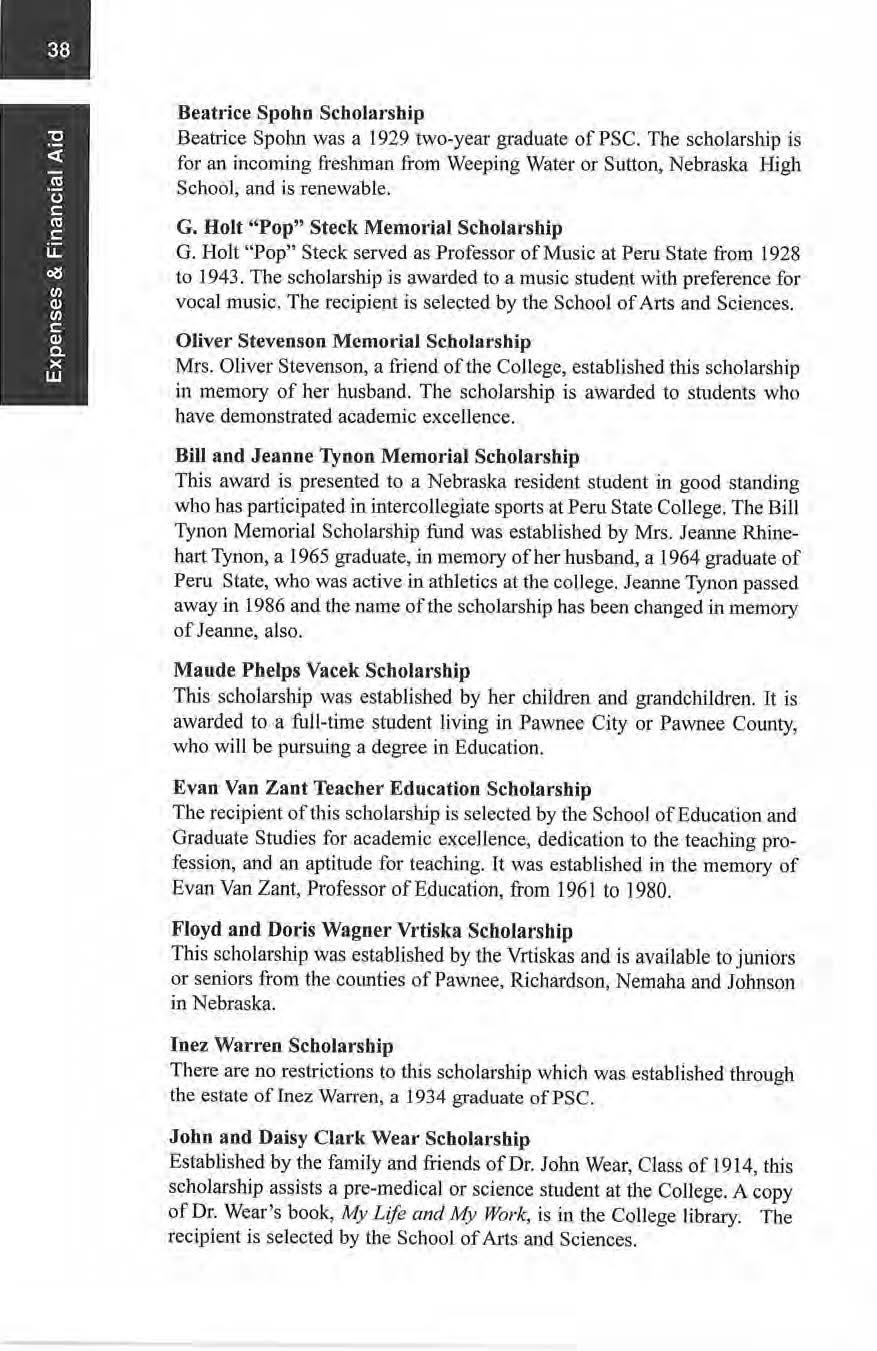
T here are no restrictions to this scho l a rship w hi c h was establ is hed thmugh the estate of Inez Warre n, a 1934 graduat e of PSC.
Establ i shed by the family and friends ofDr. John Wear, Class of 1914, this sch o larship assists a pre-medical or science student at the College. A copy of Dr. Wear 's book, !vfy Life and My Work, is in the College library. The rec ipient is selected by the School of Arts aud Sciences.
Bereniece McHirron Weigand Scbolal'ship
The recipient oft:his scholarship is to be a woman majodng 10 Education at Peru State. Established by B ereniece Weigand Woodworth, this scholarship is in memory of her mother, a 1906 P eru State graduate. Bereniece M. Weigand was t he wife of Charles Weigand, for whom another scholarship has been established.
Charles Weigand Memorial Scholarship

This scholarship was established in 1956 by the Class of 1906 in memoiy of Charles Weigand, a member of the class. The schol arship is awarded to a rising sen ior.
Lisa Jo Weis Scholarship
The Lisa Jo Weis Scholarship is awarded to a freshman volleyball player who i s not recruited, who has not been recruited for any other sport, and who would be primarily a sette r. The recipient is sele.cted by the Athletic Department.
Al Wheeler Scbolanbip
Funds for this scholarship have been provided by Fran Wheeler Kendrick , son Dr. Al Wheeler, Jr., and friends of the Jong-time coach and athletic administrator who served Peru State from 1938 to 1965. The recipient is to be a male majoring in Physical Education, who participates in intercollegiate athletics, with preference g iven to a footbaU player. The recipient is selected by the Athletic D epartment.
Paul V. and Margaret Thomas Wilcox Scholarship
TI1is scholarship was established by Mrs. Wilcox Paul and Margaret were students at PSC in the early l 920 's. Paul was active in sports while a student on campus and is credited with giving Peru State the nickname of Bobcats. There are no restrictions for this scholarsh ip.
Harold E. Willey Memorial Scholarship
Mr. Willey, who was a fanner near Mead, is memorialized in this endowment. Scholarships are awarded to students who are children of farm or ranch families or their employees, and who are of sophomore rank or above, with a 3.0 average. They must be residents of Nebraska
Gilbert and Mary Ruth Wilson Leadership Scholarship
This scholarship has bee11 established by fam ily and friend s of the Wilsons. The scholarship is available to an incoming freshman with a B or higher GPA who has shown leadership qualities in his/ber churoh or community.
Jack D. and Eula M. Wolken ScJ1olarshlp
No restrictions. Amount of scholarship should be sufficient to pay the majority of tuition for one year.
William Henry Wortman Memorial Scholarship
This scho larship is awarded to minority students with a preference being given to Native Americans. Tt was established by the family and friends o f William Henry Wortman.

Aubu rn Sta te Bank and Carson Nati on a l Bank Scholarship
This scholarshil) is avai lable to students from Auburn/Peru, Johnson-Brock or Southeast Consolidated High Schoo ls . The scholarship is for a student participating in football and is selected by the football coach and Athletic Department
Livermore Loan F und
The Livermore Loan Fund was established by Sheridan Livennore, a 1932 graduate of Perl.I Stale College. Application fotms are ava il able at the Pent State College Foundation Office.
Dianne E. Morrison L ukas Sc ho)a )'sh ip
Dianne E. Lukas was a 1968 graduate of Peru State Coll ege. H er husband, Steven, has established a scholarship in memory of Dianne. The scho larship is available to women majoring in elementary education and who are Nebraska residents.
Helen E. Co le Pollard Founders Award
An award presented in the spri n g to tbe senior who has demonstrated loyalty and service to the College.
B. E. Swenson, Jr., Athletic Awa rd
This award was established in l925 by Bert E. and Stella Swenson in memory of their son, B. E., Jr., and their parents who made possible their early education at Peru. Juniors and seniors are eligib le for the award based on ge11eral character and personality, scho larship, school loyalty, and athletics. A student may win the award only once. The rec ipie nts, one male and one female, are selected by the Athletic Department.
Zelm a R. Wonderly Award
This annual award is prese.nted to an outstandi n g second grade student teacher. The recipient is selected by tbe School of Education and Grad uate Studies.
The mission of Student Services is to provide an environment that supports the development of the student as a whole person. Education of the whole student encompasses academic training as well as social, spiritual, cultural, physical and emotional development. Student Services encow-ages students to be active participant s in the formation and attaiim1ent of their educational process to clarify values, to solve problems and to di scover, apply and integrate knowledge.

The Office of Admissions assists all prospective sh1dents with t11eir admission and transition to Peru State Co ll ege Students interested in attending PSC should contact the office for informat ion regarding the application process.
The activities of the Office of Admissions include the following:
• High school and community college outreach programs.
• Processing of applications for admission and all supporting documentation.
• Sponsorship of campus programs s uch as Open Houses , New Student Orientation, Campus Tours and Co unselor Day.
• Sh1dent Ambassador program - student tour guides.
• Response to all prospective students' requests for information.
• Administration of the College 's sch olarship program.
• International student advisement and documentation services.
• Residency classificatio n for new students - determination and documentation of in-state residency.
Pem State College is a member of the National Association of Intercollegiate Athletics (NAIA) . The CoUege has six athletic programs and a cheerleading squad. Teams are fielded in football , volleyball, men's and women's basketball, baseball, and softba ll. The athletic teams compete against aU divisions of schools in the NAlA and NCAA. P eru State's football team is a member of the Centrai States Football League and the other athletic teams are members of the Midlands Co ll egiate Athletic Conference.
The Bobcat teams have all experienced success in recent years with national recognition in the top twenty rankings or berths to the national tournaments. The success exhibited by the teams has not been confined to the playing arena, as several student-athletes have earned national academic honors.
Career Plannin g and Testing offers stud ents caree r planning and testing assistance. Individual assistance, a resource library, computer technology and equip-
ment, employment directories, employment search magazines, and major newspapers are available to students who are in need of assistance. The resource library contains various information on graduate schools, scholarships, career choices, job open.ings, company/employer literature via computer programs, videos, audios, and printed materials.
The office administers and has study b0oks for the following tests: PP ST, CLEP, and MAT. The office has registration and study materials for GMAT, ORE, and LSAT.
Students sometimes feel the need to seek assistance in dealing with issues whether they are personal, vocational, educational, or social. A list of area counseling services is maintained in the Office.s of the Vice President for Student Services, Enrollment Management and Residence Life. Staff members will help detennine potential need and wo rk with students to a1Tange the appropriate counseling services or referrals.
The Peru State College Student Support Services Program is a combinatio111 of academic and social suppmt services t11at enhances student learning, ongoing retention to the College, and graduation success for qualified students. Qualifications include status as a U.S. Citizen or ability to meet federa l financia l aid requirements, exhi bjt a need for academic assistance, and are e ither: ftrst generation (neither parent bas a college degree), low income background, and/or a parson with diagnosed disability.
Students must apply and be accepted into the Student Support Services Program. For more information, please inquire at the offices located on 3rd fl oor of T. J. Majors Hal l.

Services include tutoring, peer advisjng, academic monitoring and support, study groups, study skills assistance, and cultura l enrichment activities. The Student Support Services Program is an effective outreach program to retain students in college. The best part of the S t udent Support Servi ces Program is the cama• raderie felt by being a part of a great group of students and caring professionals.
The Student Center also serves as the main dining facility. The tnaiu dining area is open seven days a week for meal service to st11dents, faculty, staff and guests. All meals are designed with variety, nutrition and good taste in mind.
There are currently two meal plans from which students m ay choose:
The meal plans:
(a) 10 Meal Plan provides any ( I 0) meals, seven days a week.
(b) 15 Meal Plan provides any (15) meals, seven days a week.
A seven (7) meal plan is provided as part of the rent payment for people leasing apartments.
A Bonus Points plan is available tl1rougb the Business Office. The plan allows students, faculty, and staff to use their JD card as a "debit card".
Meal plan changes may be made up to the last officia l day to drop/add classes.
The ''Bob 1nn" is also located in th e Student Center and offers gri ll items, deli sandwiches, pizza, coffee and cold drinks.
Referio the brochure provided by the dining service contractor for specific meal and service infonnation.

The Co ll ege provides a variety of ways for students with limited resources to meet educationa l costs. An extensive program of Federal and State grants, scho larships, loans, and jobs are available to students w i th financial need. A Free Applfcation for Federal Aid must be completed and .filed. The U.S. Department of Education will determine the student's need and eligibility. (See Expenses and Financial Aid sectibn in this catalog for thrther information.)
The intramw·al program a ll ows participants to join teams or compete individually in meets, leagues and tournaments according to specific schedules. This competition involves prearranged facilities, equipment, supervisio n , officials and usually recognition through awards and publicity.
Intramural activities are offered each semester. Otl1er recreational opportunities for students include use of the we(ght room, pool , and the Al Wheeler Actjvity Center. Activities are added to the program as the needs and interests indicate, depending largely on the participation of the students.
The College conducts several o rientation sessions designed to address the special concerns of incoming students. Each session acquaints stud ents (and their parents) with the College and with campus life. The goal of the orientation program is to have the student leave campus that day being knowledgeable about college li fe, academically advised, and registered. New Student Weekend is the first weekend prior to class each Fall semester. The weekend is structured to acquaint students with their new campus and to a variety of skills that will belp them be successful both academically and socially. Attendance partially fulfills the requirements for College JO I. (College l Ol is a graduation require ment.)
All requests for in fonnation about living accommod ations should be directed to the Office of Residence Life. The schedule ofroom and board rates for tJ1e ciu..-ent
year is listed in the Expeuses and Financial Aid sectioh of the catalog Actua l room and board rates a.re available through the Office of Residence Life and/or the Business Office. Room and board rates are subject to change.
Living in a residence hall exposes students to a wonderful new environment; it is a living-learning environment that strives to assist students with their academic and personal development.
There are many advantages to living in lhe residence halls, with the most obv ious being their proximity to tbe College's educational and recreational facilities. The library, laboratories, music practice rooms, worto-ooms, a nd campus recreational centers are only a short walk from any residence hall.
While residence hall living affords students considerable freedom, paraprofessional staff members supervise and assist students with educat ional and social programs, augmenting the academic program. TI1ese programs provide assistance that may be needed to adjust to college lite.
Pe.ru State ofters a variety of alternative living accommodations Th ere are separate residence halls for men and women as well as co-educationa l halls. Each residence hall has its own visitation policies and unique physical layout. Students are responsible for supplying their own linen and bedding including pillows and mattress pads. Residents are welcome lo bring other personal items from home such as computers, radios, stereos, etc. Hot plates, microwave ovens, and air conditioners are not permitted. Each hall is equipped with kitchen facilities, microwave ovens, washers and dryers, and recreational equipment such as pool and ping-p ong tables. Also, computer labs are located in each ball for student use. Hours of operation vary between halls.
The residence hall and/or food contracts are for the full academic year. Students should understand that tl1e contract is a financially bindfog agreement that obligates them for rental rates for tbe academi c year. Contracts will be voided only for the following documentable reasons: unforeseen financiaJ hardship, medjcal, withdrawa l from college, graduation, transfer, or marriage (approptiate verification is required). The last day to make changes to the food contract coincides with the last day to drop/add. A cancellation fee will be imposed on students eligible to live off campus if written notice of contract cancellation is received postmarked after August 1S for Fal I sem ester strut or January 3 for Spring semester. Students must appeal to break all contrncts midyear to be eligible to live off campus.

To be a student at Peru State College all unmarried students must live in co11ege residence halls for at least two years; however, this requirement shall not apply to !hose unde rgraduates who meet one or more of the following:
l. bave Jived on campus for two years prior to the last official day to regi ster for tlJe Fall semester.
2. are 21 years of age or older on or before the last official day to register for the Fall semester,
3. are residing a( home with their parent(s) or legal guardian(s),
4. are veterans who qualify for veterans benefits by vi1tue- of active setVice in the armed for ces, or
5 are enrolled in eight ctedits or less per semester.
Thi s requirement is a condition of enrollment whlch must be met throughout the academic school year.
Appeals of the housing requirement must be received in writing postmarked no later than May 31 for the upcom in g academic year. Students should consider their appeal to be denied UJ1til written approval has been received from the housing office.
All unmarried students living in a residence hall must part icipate in a meal program w h ile enrolled in c l asses at Pe ru State Co llege.
A co-educational residence hall complex was opened in 1967 to commemer rate P e.ru State's fast one hundred years of service. The Centennial Comp lex consists of three groups oftwo residence bails each, which house sophomores , jw1iors, senio rs and graduate students. Second semester freshm e11 may req_uest pennission to l ive at the Comp lex if t hey have a 3.0 GPA or higher. D avidson/Palmer Hall and C layburn/Mathews Hall are co-educational. Nicholas houses both single and married/family students. Pate houses sing le tradit ional age students in double and single occupancy apartments. Mathews Hall houses PSC's Freshman Experience Students. For more information con cerning t hi s project, contact the Resi dence Life office

The living areas in the Complex are set up suite-styl e . Each suite is comprised of two or three bedrooms, a living room and a bath The suites are carp eted, furnished and air conditioned; each bedroom has two built-in desks, study lig h ts, bookcases, a dresser, twin-bunkable beds and a double closet with ample storage. For the convenience of resident s there are computer/study suites with IBM-compatible com put ers and printers. The student room s are equipped for Internet and telephone access . Cable TV, includ ing HBO, is also provided in each bedroom.
Delzell Hall
Gothi c-styl ed Delzell Hall houses approximately 150 men. The- spacious Great Room is furn ished with sofas, chairs, study tables and a fireplace. A TV room/game room is located on the lower level. The re are four floors of rooms an-anged as combinati on sleep ing and study rooms with each room housing two students A built-in, combination dresser and desk, bookcase, bulletin board, twin-bunkable beds, and draperies are furnished to each student.
To add ition to a shared walk-in c l oset, lavatory, and medicine cabinet, each stude nt is provided with an individual bui l t-in wardrobe. There is a large
sbower room of ceramic tile and marble located on each floor. Delzell Hall also has a computer/study room for the convenience of its residents. Computer access to the Internet and telephone service are provided in each room. Cab le TV, including HBO, is also provjded in e ach room.
Located in the northwest comer of the campu , Eliza Morgan Hall was opened in 1929. The building house 167 wome11 in rooms situated on four floors. There are two large furnished lounges located on the first floor and the basement for student use. Room are double occupancy and furnished with two twin-bw1kab le beds, two desks, a dresser and window coverings. In addition, each resident shares with her roommate a closet and sink area. Each .floor has cwiently located bathrooms and shower areas .
Morgan Hall has study rooms s ituate d on each floor and a computer room on the first floor for the convenience of its residents. Computer access to the Jntemet is provided in each room as well as te lephone service. Cable TV, including HBO, is also provided in each room.
Campus apartments are available to students who have families or are older than traditional college age. Preference is given to married tudents who may or may not have children. There are one aod two bedroom uruts available in N ichol as Hall and Oak Hill. Each unit is furnished with a stove and refrigerator. Apartments are lease d on a renewable yearly basis . A deposit is required and is refundable at the end of the lease agreement provided the property is left in good condition. Rent is due the first of the month and is payable in the College Business Office
Inquiries about married/ family housing may be made at the office of Resident Life ,
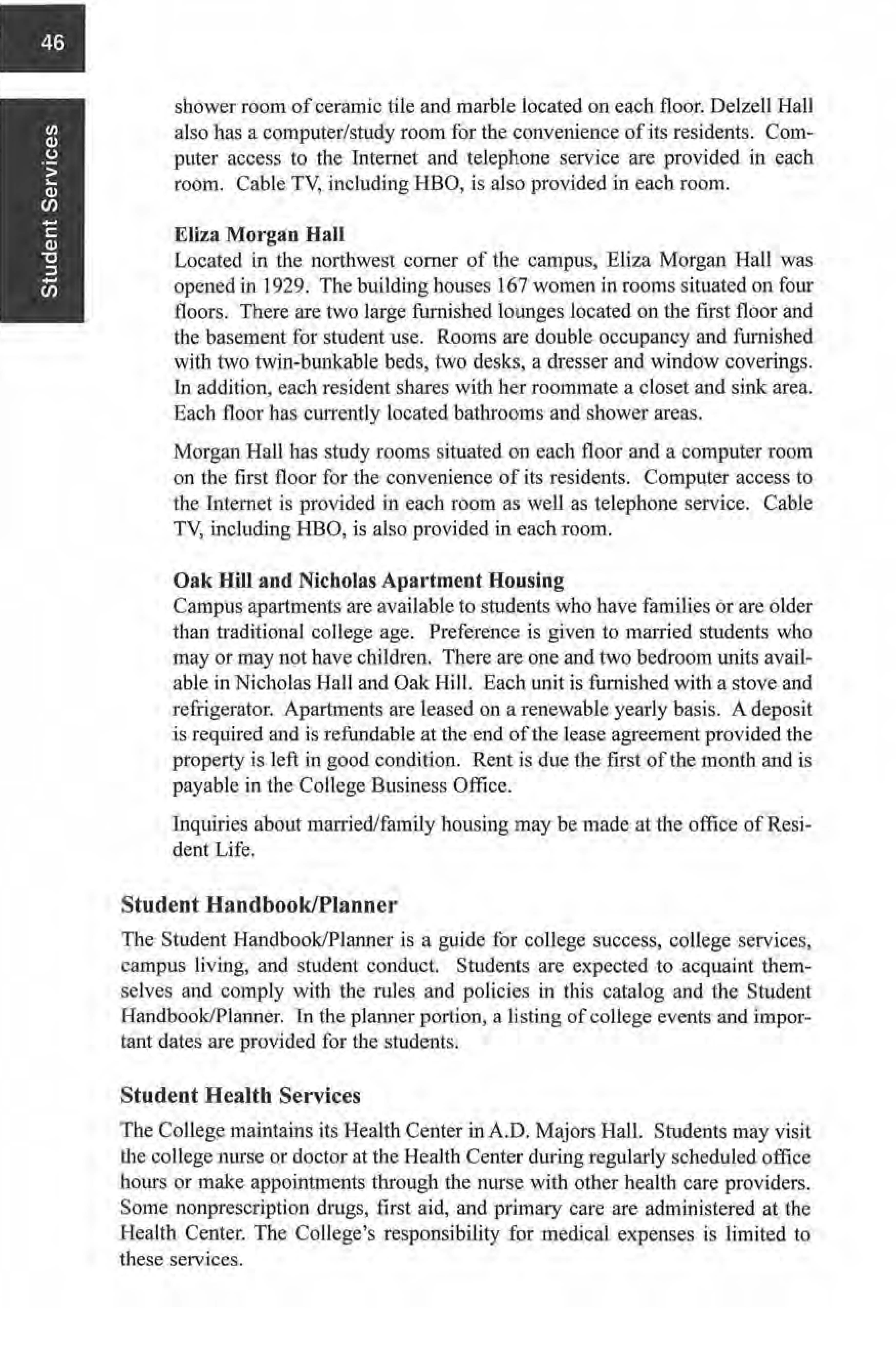
The Student Handbook/Planner is a guid for college succe s, college services, cam pus living, and s tudent conduct. Students are expect d to acquaint themse lv es and comply with tbe rules and policies in this cata log and the Student Handbook/P lanner. In the planner portion , a listing of college events and important date s are provided for the students.
he College maintains its Health Center in A.O. Majors Hall. Students may visit tl1e college nurse or doctor at the Health enter during regularly scheduled offic e bow· or mak e appointments through the nurse with other health care provider
Some nonprescription drugs , fir t aid, and primary care are administered at t h e Health Center. The College's responsibility for medical expenses is limited to these services.
It is recommended that students have health insurance. The College does not insure students for health care. Students who wish to participate in intercollegiate athletics must be certified each season as physically fit by a physician and provide insurance information before begi1ming their sport.
The College provides space at the Health Center for two medical clinics for the benefit of the community alld the College.
Fam il y Planning Cli ni c provides pap smears, testing for sexually transmitted infection s (i nclu d ing HfY) and pregnancy, and counseling on family planning. This cli nic is held monthly.
Nemaha County Health D epartment holds a Well Chi l d Clinic severa l times each month, which is available to a ny cl1ild regardles s of residence or income.
Peru State Co llege provides opportunities for students to grow o utside the classroo m setting.
Stu dents have the opportunity to become an integral part of campus activities through Studen t Senate, the student governing body of the campus. Student Senators provide a link between the college faculty. admini stration and the stud ent body by serving on many college conunittees. The student representative to the Nebraska State College Board of Trustees also reports regularly to the Student Senate. The Stud ent Senate is an elected body representative of the student community.
Students may also elect to be involved in Campus Activities Board (CAB), a vo lun teer stud ent organization that provides campus educationa l, social, cultural, and Tecreational programs. CAB afters individuals opportunities to select, develop, and present quaJity programming. Throughout the year CAB sponsors a wide variety of activities including professional artists, dances, picnics, non-traditional student programming, low-budget activities, ethnic cu ltural events, Women's History Month , Homecoming, and Spring Fling activities.
Students also have the opporttmity to become involved in other organizations on campus. Participation in tJ1ese organizations and programs provides students an oppo1iuni ty to develop leadership and social ski ll s.

Students at Peru State may participate in a wide variety of student organizations for their personal , social, academic, or professional benefit.
For further information collceming any organizations, contact Student Services.
Art Guild is a student organiza ti on for art majors and students interested in art. Art Guild offers a fonun for discussion coucemi.ng art and is dedicated to the a dvancem ent of the Fi n e Arts and the artistic growth of its members
Co mputer C lub is open lo all PSC st ude n ts who wish to enhance their knmvledge of computers, compute r app lica tion s , the Internet, and otber computer-related topics lnterested members bave t he opportunity to gain experier1ce by doing cons ulting wor k for business and i nd us try.
Bio logy C l ub provides educat iona l and professional act ivities fo r stude nts inte reste d in the bio logica l sciences.
English C lub promotes the mastery of written e>.'Pression. encourages worthwhi l e reading, and foste rs fe ll owship among st udents spec ia li z ing in English or literature.
Honors Club is o pe n to s tudents wi thin the Honors P rogram an d provides a forum for in teraction and d iscussi on .
Jnternati ooal Re adi ng Association (IRA) is a professi ona l organization of indi v idu a l s con cerned with the improvement of rea ding.
Journali s m C lub is the social and extracurricu lar gui ld of The Peru State Times.
Multicultural Cl ub i s open to students, faculty, staff, and co mmunity . It meets to ce le brate djversity, increase cultural awareness and hav e fun.
Organization for the Enhancement of All Abilities (O EAA) i s an indepe ndent stud ent orga ni zation dedicated to the idea that our s imilariti es outweigh our differences ,
People Accepting Differe nces (PA O) is a Peru State College organization whose purpose is prov ide support a nd unity to people of a ll sexual orientations and increase awareness of differences on the campu s and in the surrounding community.
Peru Student Education Association (PS.EA) is for potential teachers and is affiliated with the Nebraska Sta te Education Associa tion a nd the NationaJ Education Assoc iation. I ts activities are devoted to th e improvement of e du cation.

Phi Beta La mbda (PBL) i s a state and nati onal business fraternity Peru State's chapt er, Epsi lon Tau, is open to a ll students interested in business.
Photography C lub is open to th ose wanting lo share their interest in photography. It is an opportunity to Jearn more about th is li fetime ski l l. Beginn er to advanced photographers are we lcome.
Psychology/Soci ology/C ri minal Justice C lub is a professiona l stu dent organizatio n fo r all P sycho logy, Soc io logy ,tnd Cr iminal J ustice majors. The focus is campus acti vities, public service and servi ce learning activiti es a nd professional development activi tie s in all areas of th e m ajor
Alph a Chi is the College's national honorary scholarship society. 1t recognizes academic sc holarship, good reputation, and character. The society's members are selected from the top ten percent of the junior and senior classes.

Beta Beta Beta is the College's professional honorary biology fraternity open to junior and senior biology students, Canrudates for membership must have above-average grades and plan to continue the study of biology.
Kappa De lta Pi is a national honorary education fratemity open to sophomores who rank in the upper quartile of the ir class and who s how evidence of a continued interest in education.
l.'hi Alpha Theta is a n ation al honorary history society open to students with more than twelve hours of history and high scholastic standing.
Sigma Tau Delta is a national honorary English fraternity for students who demonstrate an interest in literat11re and creative writing and who are above average in scholarship. The chapter assists the English Club in publis hing Sifting Sands.
Coll ege Band Program is divided into the Concert Band, Jazz Band and fn strumenta l Ensemble.
Concert Choir is open to aU students with previous choral experience, This group presents two on-campus conce1·ts per semester and makes an annual tour of area high schools. The group performs music from diverse musical periods including some major works. With previous choral experience you can s imply sign up for Music 102. You d o not need to be a music major to participate in any of the choirs or to a uditi on for voca l music scholarships.
Madrigal Singers are open to a ll students by audition in the fall. This vocal ensemble performs unaccompanied music from the 16th century and presents a fully costumed Clu·istmas dinner in the faJI. ln addition the Madrigal Singers perfonn at other campus conceits and on the annual choir tour of area high sc hool s.
Misty Blues Show C hoir is open to a ll students by audition in the fa H.
Misty Blues presents popular and Broadway musical selections in a choreographed show s tyle. Misty Blues pe rfonn at the High School Show C hoir Festival , a t a ]) on- campus choir concerts and on the annual choir tour of area high schools. T he group does additional concerts on and off campu s.
Student M . E.N.C. i s a chapter of the Music Educators Nation al Conference, open to all students interested in music. The club ann ually sponsors instrumental and vocal clinics as well as other musical productions.
Campus Crusade for Christ is a college campus ministry for all denominations or faith backgrounds. It provides students the opportunity to enhance fheir relationship with Jesus Chri st and each other.
FeUowsh ip of Christian Athletes (FCA) is a national organization that is o_pen to all atl1letes and anyone interested in athldics. The goal of the FCA is to present the challenge and adventure of receiving Jes us Christ and serving him in their relationships and in the fellowship of the church.
Camp us Ministries/United Ministry of H igher Education is a multidenominational fe ll owship whose purpose is to share in C hristian directed socia l and biblical activities. Out cale nd ar is tilled with activities both on and off campus where we share Christ's love, mature in faith, and enjoy our years of coUege study. Campus Ministries is sponsored by the U nit ed Ministries in Hi gh er E ducation comprised of the following denomination s: Disciples of Christ, United Methodist Church , Presbyterian C hurch and C lu·istian Chmch.
The Student Senate focuses on the interests and opinions of the students in regard to the opera tion of the College. The Senate consists of a 24-member panel (l isted below) , elected by the student body, to serve along with a Board ofTrustee Representative (appointed by the Nebraska Governor) and the Student Body President. The Senate has voting members on the Pres ident 's Council, Library Committee, Scholarship Committee and Teacher E ducation Comm ittee.
The Student Senate positions inclt1de: president, vice president., ten seuators-atlarge, two commuter representati ves, two nontraditional representatives , two representatives from the freshman class, and one representative from each occupied residence hall. These include Morgan. Delzell, Claybum/Mathews, Nicholas/Pate, Davidson/Palmer a11d Oak Hill.

Residential Hall Co un cils are representative counci ls selected by the members of each residence hall. Thes e goveniing bodies recommend solutions to student issues, plan educational and social activities for hall residents, and recommend building improvements.
Th e Peru Stale Times is the official co ll ege n ewspaper. It is published during the school year under the s upervision of an academic advisor. Student contributions are wel comed.
Sifting Sands is a magazine of student w1iting that is published in the spring by the Eng)isb Club and Sigma Tau Delta

The role of Peru State College is to encourage people of all ages to develop their skills and talents, according to individual abilities and interests, so that co llectively they contribute to the continuum of democracy. College policies, procedures, and regulations are fom1ulated to guarantee each student's freedom to learn and to protect the co nstitutional rights of others.
The concept of righ ts and freedoms, no matter how basic or widely accepted, carries with it corTesponding responsibilities. Students, as well as other members of the co ll ege community, enjoy the same constitutional and civil rights guaranteed all citizens: at the same time, they are subject to the laws of the nation, the State of Nebraska, the local comtnwlity and the College. All members of the college community have a strong responsibil ity to protect and maintain an academic climate io which the freedom to learn can be enjoyed by all. To this end, certain basic regulations and policies have been developed to govern the behavior of students and employees as members of the college community.
Violations of student conduct regulations will be handl ed through the Office of the Vice President for Student Services/Enrollment Management. Vi o lation s of federal, state, and/or loca l laws make a student subject to civil and/or cr imina l action in addition to disciplinary action by the College. Eac h student is respo nsible for knowing and complying with PS C policies, procedures and deadlines. Policies and regulations may be found in the College Catalog , the Student Handbook/Planner, and in the Student Services Office.
The College has the responsibility of providing a program of qua lily education i11 keeping with its financial resources. Students have protection throug h campusdesigned procedure s against prejudiced or capricious academic evaluation. Student performance shall be evaluated solely on an academic basis, not on opinions or conduct in matters unrelated to academic standards. Students are responsible for the proper completion of their academic program , for familiarity with all requirements of the College Catalog, and for maintaining an acceptable grade point average for degree requirements. Students have the right to be informed at th e beginning of each term of the nature of the course, course expectations, eva luation standards, and the grading system.
Students shall be free from unreasonable search and/or seizure regarding their person and their personal property. The College reserves the right to sea1·ch C ollege property regarding personal safety in co mpliance with College policies.
Within the limits of its resources, J'eru State College s hall be open to alJ app licants who are qualified accord ing to cunent adtn iss ion requirements. P e ru Sta te
College does not discriminate on the basis of race, creed, color, national origin, mental or physical disabilities, age, sex, or sexual orientation i11 any of its policies, practices, or procedures. This includes, but is not limited to, admissions. employm ent, financial a id , and educationa l services, programs, an<l activities.
Students are free to associate and promote 1J1eir common interests. They have the right to seek, thro ugh official procedures, the establishment of organizations as long as they are not in conflict with the educational purposes of the Co llege. Students have the right to affi li ate with officially recognized campus organizations of their choice, with in the membership requirements of those organ izati ons.
The rights of free speech a nd peaceable assemb ly are f-tmdamental to the democratic process. The Coll ege supports the rights of s tudents of the Coll ege com1mmity lo express their views and opinions on actions or ideas, to associate freely with others, and to assemb le peacefully.
Whether expressing themselves as individuals or in organ ized groups, members of the Co ll ege community are expected to condu ct themselves responsibly, according to law, and to respect the basic educational goals of the College. Accordingly, the College insists that free expression not vio late the rights of others. Disruption of the educational processes and funcUons of the Co llege, violation of law, and fighting words would constitute such violation of the Student Code of Conduct, for example.
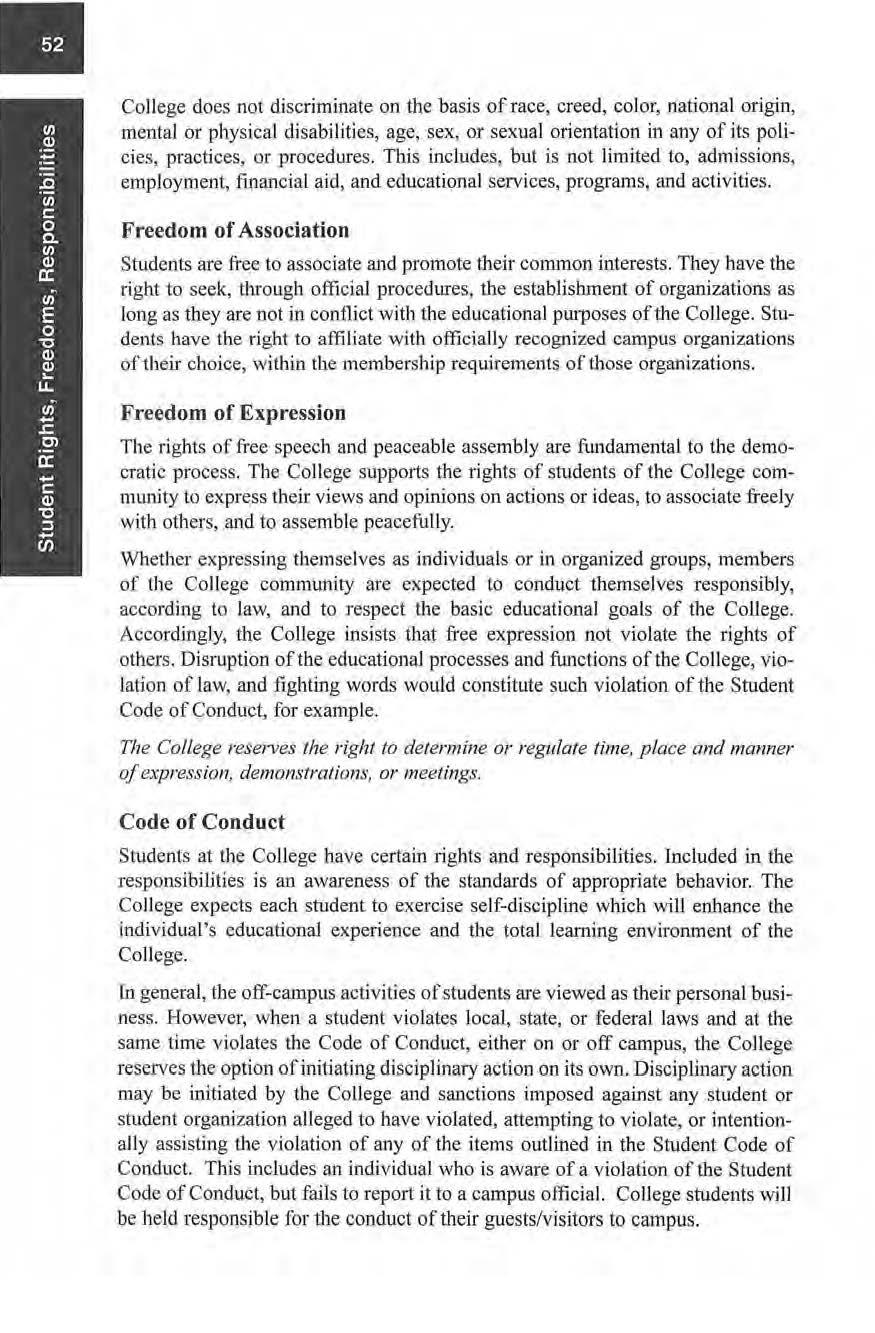
The College reserves the right to determine or regulate time, place and manner of expression, demonstrations, or meetings.
Students at the College have certain rights and responsibilities. lncluded in the responsibilities is an awareness of the standards of appropriate behavior. The College expects each student to exercise se lf-disc iplin e which will enhance the individual's educationaJ experience and the tota l learning environmen t of the Co ll ege.
Lo general, tbe off-carnp11s activities ofstudents are viewed as their personal business. However, when a student violates locaJ, state, or federa l laws and at the same time violates the Code of Cond uct, either on or off campus, the College reserves the option of initi ating disciplinary action on its own. Disciplinary action may be initialed by the Co ll ege and sanctions im posed against any student or student organ ization alleged to have violated, attempting to violate, or intentionally assisting the violation of any of the items outlined in the Student Code of Conduct. This includes an individual who is aware of a violation of the Student Code of Conduct, but fails to report it to a campus official. College students will be h eld responsible fo r the conduct of their guests/visitors to campus.
1 Participation in a demonstration on the campus which materially and substantfally disrupts or obstructs the normal operations, activities or functions of the College, including unauthori zed occupation of College premi ses;
2. Any act of academic dishonesty (see the Academic D ishonesty section of the College Catalog);
3. Providing fal se or mh;leading information for Co ll ege records or student identification cards, forging signatures o r othecwise altering official College docwnents;
4. Mjsuse of comp uters or computing resources;
5. Unlawful or unauthorized possession, use, d istr ibuti on, d i spensing, delivery, sa le or consumption of any alcoholi c beverage on Co llege prope11)' including possession of empty containers;
6. Unlawful or unauthorized possession, distribution, delivery, dispensing, manufacture or sal e of any drug; or being unlawfully under the influence of any drug on College properly; inclw.lt:s urug paraphernalia;
7. Phy s ically abusing o r threatening to physicalJy abuse any person;
8. a. Sexua l assau lt or any other uninvited behavior of a sex ually explicit nature;
b. Harassing another inruvidual either verbally or through stalking or other threatening actions;
9. Conduct wmch is unreasonably dangerotts to the health or safety of other persons or oneself;
10. T h eft o r attempted theft of any property;
11. Damaging or attempting to damage property of the College or of another ind i vidual;
12. Using or possessing bombs, exp l osives, incendiary devices, or fireworks;
13. Setting or attempting to set a ny fire on the campus or o n the premises of ai1y student housil1g unit, excep t in fireplaces or other faci liti es designated for fires ;
14. F ailing to report or false l y reporting a fire or any other extremely dangerous condition when known or recognized o n the campus o r on the premises of any studen t housing unit;
15. Possessing or selling firearms, ammunition, other dangerous weapons, or d angerous chemicals o n the campus or on the premises of any student hou sing unit. Weapons used for hunting a nd other legitimate sport may be stored in an area designated by the College; the ch eckin g in and o ut of weapon s from the designated storage area must be accomplished in accordance with procedures estab lished by t he College and pub l ished in the Residence Life Handbook;

16. Obstructing or failing to comply witb the directions of a law enforcement officer, emergency personnel, or College official in the perfo,mance of his or her duty on the College campus, on the premises of any student housing unit or at any activity or event sponsored by the College or an organization ;
17. llldividuals or student organizations shall neither engage in nor condone any form ofbazing , Hazing may inc lude but not be limited to:
a) any action taken or situation intentionally created to subject another person to mental or pby ical discomfort., embarrassment, risk or ridicule;
b) verbal or phy ical harassment or abuse;
c) encouragement facilitation or participation in public stunts, morally degrading or humiliating behavior or games, or
ct) the physical marking of tuden , e.g. branding, tattooing or other disfigt1rement.
Consent of tbe victim of th.e hazing will not constitute a defense to an allegation of misconduct for hazing ;
18 Committing any unlawful act of indecent exposure or public indecency;
19. Participating in any gambling activity in v iolation of the laws of the State of Nebraska or of the United States;
20. Unauthorized u se of any College property, facilities, equ.ipmenl or material s;
2 l. Possessing, producing , manufacturing or having manufactured without proper authorization, any key or unlocking device for use on any oUege facility or lock; includes the use of another person's key(s) without authorization oftbe College or a College representative;
22. Serious traffic violations on the campus, including operating any vehicle while intoxicated, speeding, reckless endangerment, or reckless driving;
23. Vio lation of any student housing unit policy, mle or regulation where posted or out lined in the residence life handbook, or provided by notice at an official hall or floor meeting conducted by a College official;
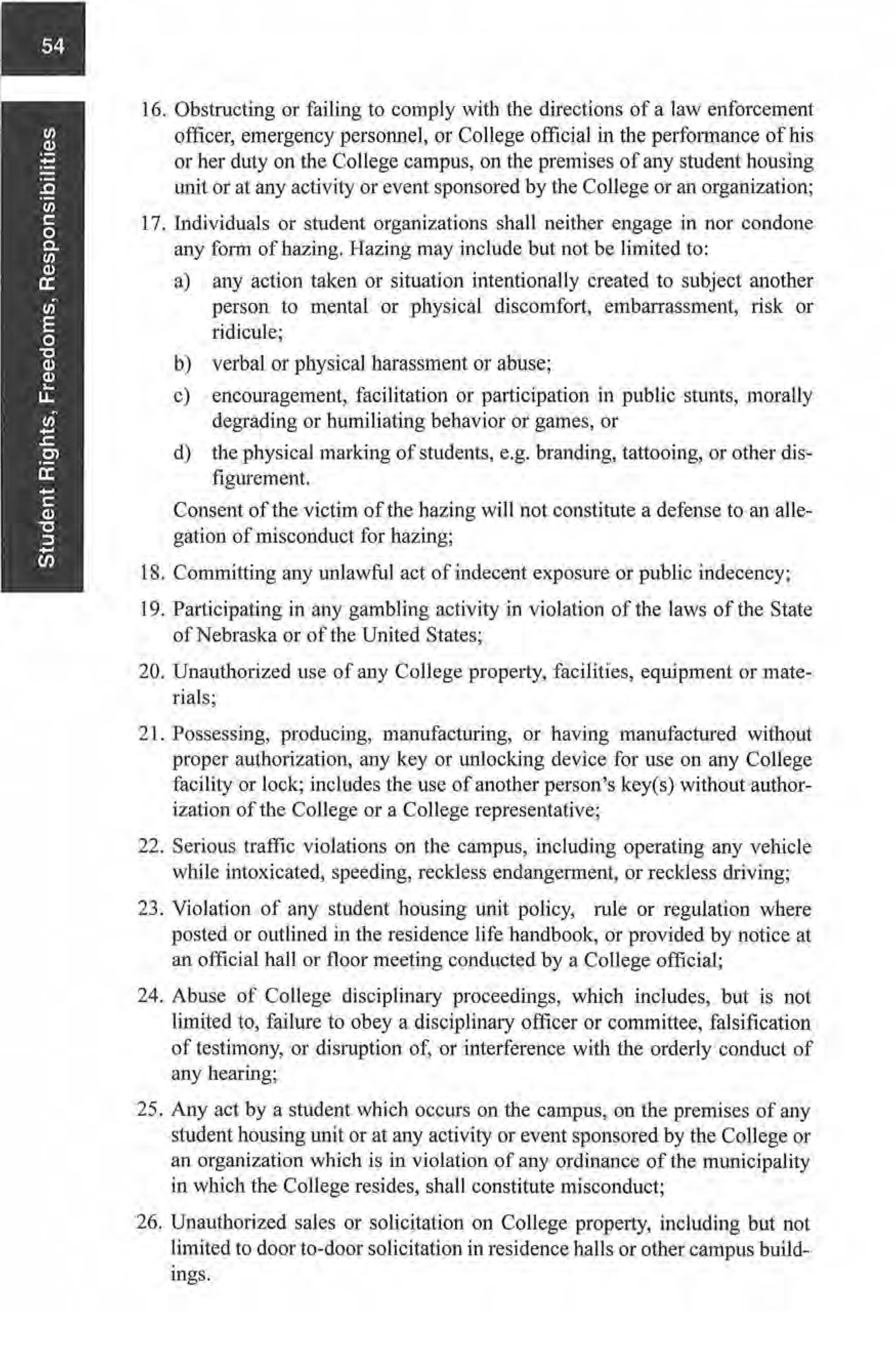
24. Abu e of College disciplinary proceedings, which includes, but is not limited to, failure to obey a disciplinary officer or committee , falsification of Cestimony, ot di s ruption of1 -or interference with the orderly conduct of any hearing;
25. Any act by a student which occurs on the cainpus , ou the premises of any student housing unit or at any activity or event spon ored by the College oi• an organization which is in violation of any ordinance of the municipality in which the College resides , shall constitute misconduct;
2 6 . Unauthorized ales or solicitation on College property, including but not limited to door to-dom· solicitation in residence halls or other campus buildmgs.
Disciplinary procedures may be found in the Student Handbook/Planner.
Students shall be free, individually and collectively, to express their views on issues of institutional policy and on matters of general interest to the sh1dent body. The student body shall have clearly-defined means to participate in the formulation and application of institutional policy affecting academic and student affairs.

Residence hall regulations may be found in the Student Handbook/Planner and in the Residence Life Handbook.
Student g ri evance procedures may be found in the Student Handbook/Pla1m er.
The purpose of this policy is to establish a plan which will be followed il1 the event any student, employee, or othe r school contact has contracted AI DS (Acquired Immune Deficiency Syndrome), or has been diagnosed by a phys i cian as being infected with the H LV virus (Human [mmunodeficiency Virus).
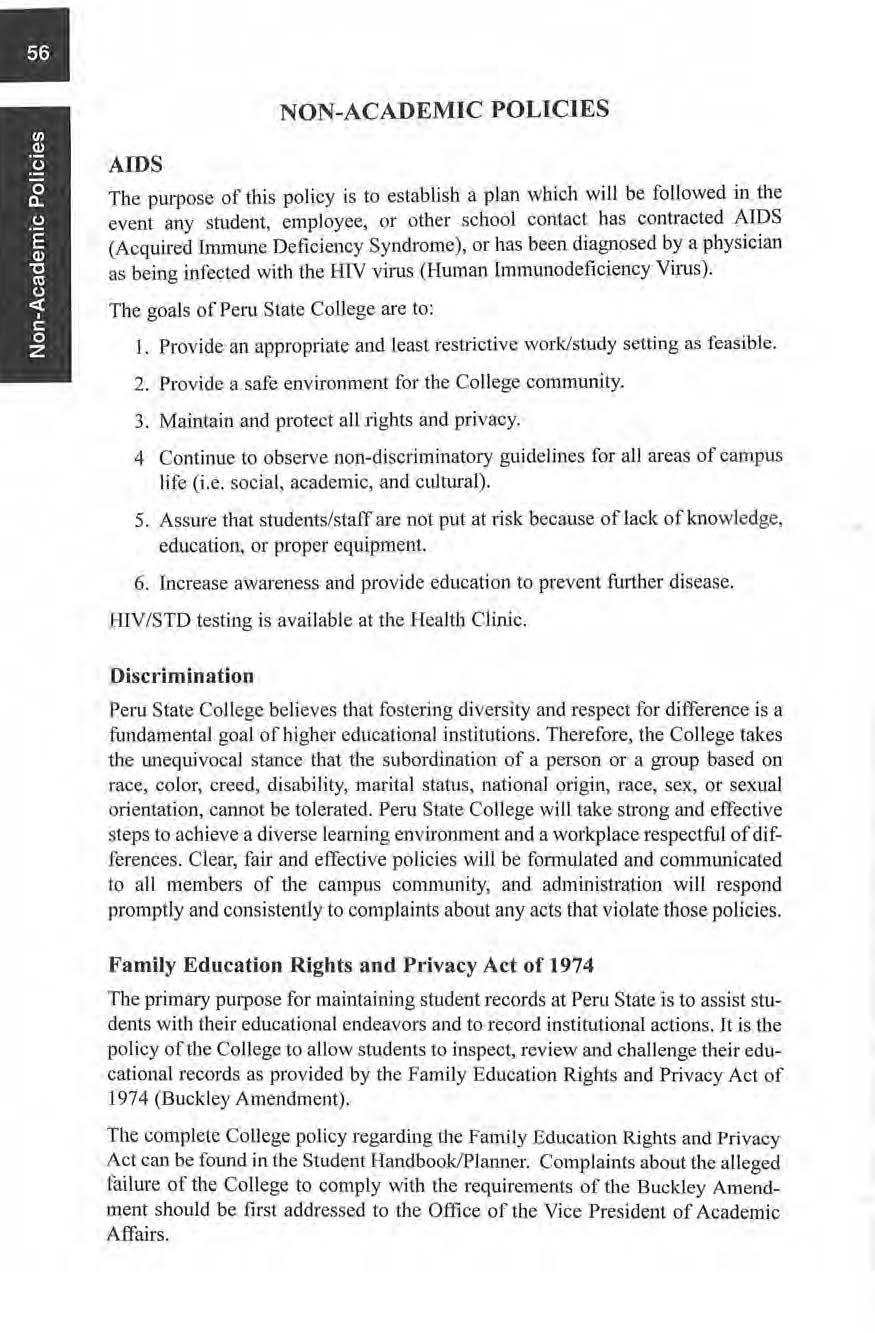
The goals of Peru State College are to:
1. Provide an appropriate and least resttictive work/study setting as feasible.
2. Provide a safe environment for the College community.
3. Maintain and protect all Yights and privacy.
4 Continue to observe non-discriminatory guidelines for all areas of campus life (i.e social, academic, and cultural).
5. Assure that students/stalr' are not put at risk because of l ack of kno w l ed ge, education. or proper equipment.
6. Increase awareness and provide education to p!'event further disease
BJV/STD testing is available at the Health Clinic.
Peru State College belleves that fostering diversity and respect for difference is a fundamental goal of higher educational institutions. Therefore, the College Cakes the unequivocal s tance that the subordination of a person or a group based on race, color, c-reed , disability, marital status, national origin, race, sex, or sexual orientation, cannot be tolerated. Peru State College will take strong and effective s teps to achieve a diverse learning environment and a workplace respectful of differences Clear, fair and effective policies will be formulated and communicated to all members of the campus community, and administration will respond promptly and consistently to comp laints about any acts that viola1e those policies.
The primary putpose for maintaining ,5tudeut records at Peru State is to assist students with their educational endeavors and to record institutional actions. Jt is the policy oftbe College to allow students to inspect, review and challenge their edtlcational records as provided by the Family Education Rights and Privacy Act of 1974 (Buck ley Amendment).
The l:0mplelc College po licy regarding u,e Fam il y Education Rights and Privacy Act can be found in the Studen t Handbook/Planner. Complaints about the alleged failure of the College to comply with the requirements of tl1e Buckley Amendment should be first addressed to the Office of the Vice President of Academic Affairs.
Students experiencing p s ychological problems whose behavior is detenni·ned by college officials to prevent them from participating at a minimal level i n academic pursuits or is disruptive to oampiis life may be involuntarily withdrawn from the College. A student will be subject to involuntary administrative withdrawal from the College, or from College housing, if it is determined, by clear and convincing evidence, that the stude11t is suffering from a mental disorder (as defined by the current American Psychiatric Association Diagnostic Manual, DSM-IV), and, as a resuJt of the mental disorder:
a) engages, or threatens to engage, in behavior which poses a danger of causing physical hann to self or others, or;
b) engages , or threatens to engage, in behavior which wouJd cause significant property damage, or directly and substantially impede the lawful activities of others.
Prior to an involuntary administrative withdrawal being considered, the Vice President for Student Services/Enrollment Manageme11t will review the student's record and behavior. If such a student is in counseling either with an agency outside the College, at the time of the disruptive bel1avior, appropriate releases of information as requested by the College will be reqwred. Should such a student not be in counseling with any counselor, they will be required to submit to a psychological eva luati on and agree to provide the College with a release of infonnation regarding this evaluation. Prior to fuial action being taken by the Vice President for Student Se1vices/Enrollment Management with respect to an involtmtaiy administrative withdrawal , the student being considered for such action will be afforded the opportunity, if they so desire, ofa hearing before the administrative official who will be making a final decision in the case.

Application for readmission to the college after withdrawal for behavioral factors re lating to a psychological condition requires evaluation by counselors designated by the College and final approval by the Vice President for Student Services/Enrollment Management.
The College is concerned about the safety and well-being of its students and staff and will promote awareness of sexual harassment, rape, acquaintance rape, and other sexual offenses through educational programs, workshops, counseling and printed materials.
Sexual assault or harassment are violations of the Student Code of Conduct and the Board of Trustees policy concerning employees, and are prohibi ted. All allegations of sexual assauJt and/or harassment should be made in a timely manner directly to the Vice President for Student Services/Enrollment Management. All allegations wi ll be investigated thoroughly and wiU require detailed accounts of the incident(s). The investigation wi ll be as confidential as possible. lo cases of sexual assault tbe victim will be encouraged to immediately contact the proper legal and medical authorlties in order to preserve evidence and prove criminal sexual assault.
Allegations of sexual assault or sexual harassment wlll result in a disciplinary and/or grievaJ1ce procedure as outlined in the Student Handbook/Planner. The results of disciplinary and/or grievance hearings evolving from allegations of sexual assault or sexual harassment will be made known to both the plaintiff and accused wi thin forty-eight (48) hours after the conclusion of the hearing. The physical violation of one person by another is deemed as most serious, and all appropriate campus and legal sanctions will be brought to bear on all guilty persons.
Sexual harassment is defined as unsolicited nonreciprocal behavior by an employee or student who is in a position to control another's status and who uses the power or authority of that position to cause the emp loyee or student to submit to sexual activity, or to fear that he or she would be punished for the refusal to submit. Sexual harassment also includes any employee or student conduct of a sexual nature unreasonably interfering with a student's educational perfonnance or status by creating an intimidating, hostile, or offensive educational environment. Sexual harassment may consist of a variety of behaviors by an employee or student including, but not limited to, subt le pressures for sexual activity, inappropriate touching, inappropriate private language, demand for sexual favors, and physical assault.
The Rehabilitation Act of 1973 (publi c law 93-112) section 504, provides that "no otl1erwise qualified disabled individual in the United States ... shall solely by reason disabled, be ex.eluded from the participation in, be denied the benefits oC or be subjected to discrimination under any program or activity receivi n g federal financial assi stance."
Peru State College provides support services for all students with a d iagnosed disab ili ty. Students with disabiljties, including learning disabilities, attention deficit disorder, physical and/or psychological disorders, are encouraged to visit first with the Vice President for Student Services/Enrollment Management. Any students requesting special accommodations will be asked to provide a documented diagnosis of his/her disability by a qualified professional. This diagnosis must include a list of appropriate accommodations that will assist the Co ll ege in ensuring that the student is not discriminated against on the basis of their disability.
All students are encouraged to self-disclose their disabilities and needs to their professors. The student should inform his/her instructors of his/her special needs. Students can receive support and assistance with self-disclosure through various campus supp011 offices. Support services for students with disabilities include special tutoring, academic and personal counseling, academic and classroom accommodations, and refenals to other offices to ensure sh1dent success.
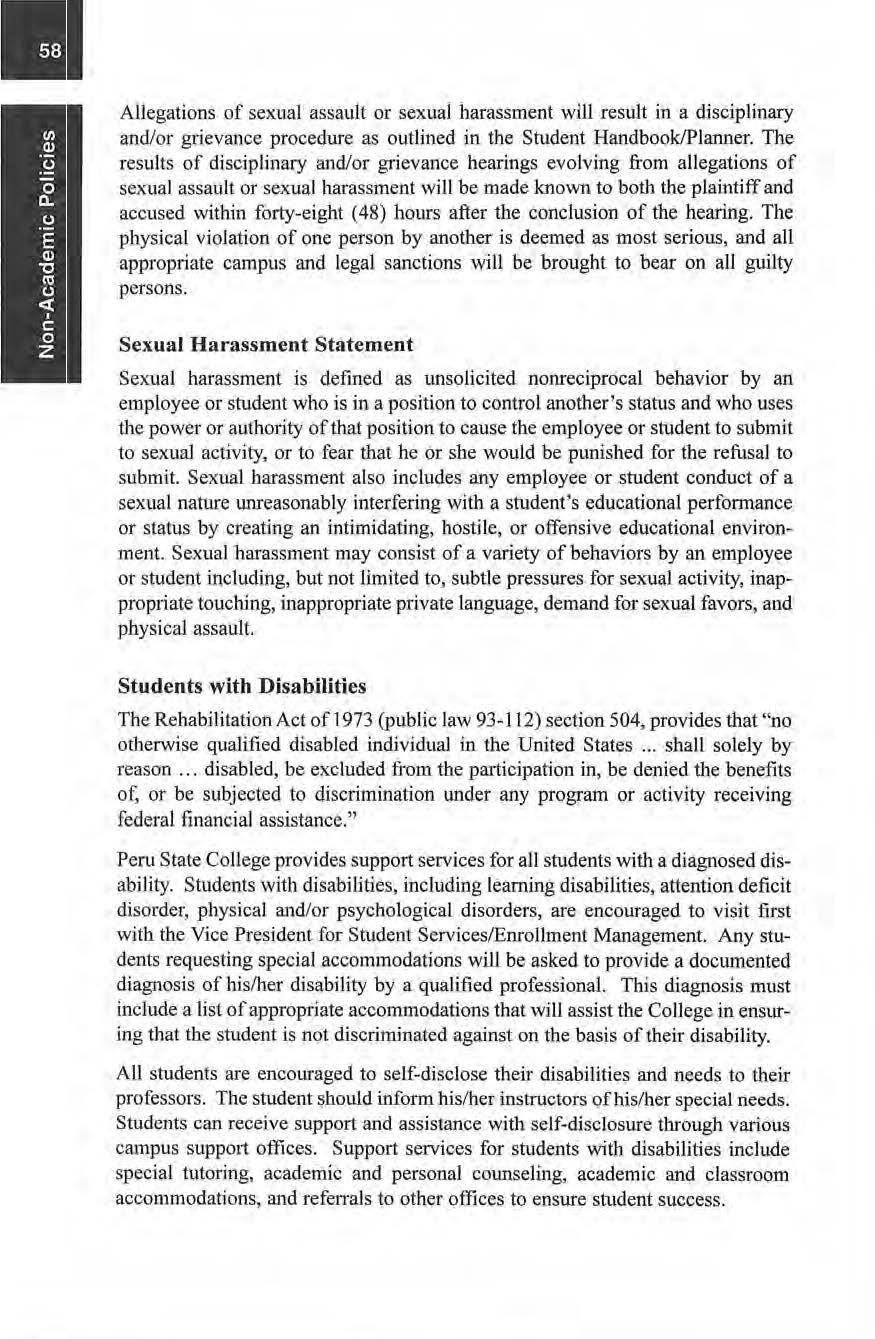
The goal of disability services on the Peru State College campus is to provide an equal access learning environment to help ensure the academic success of all students. All questions regarding services for students with disabilities should be directed to the Office of the Vice Pres ident for Student Services/Enrollment Management.
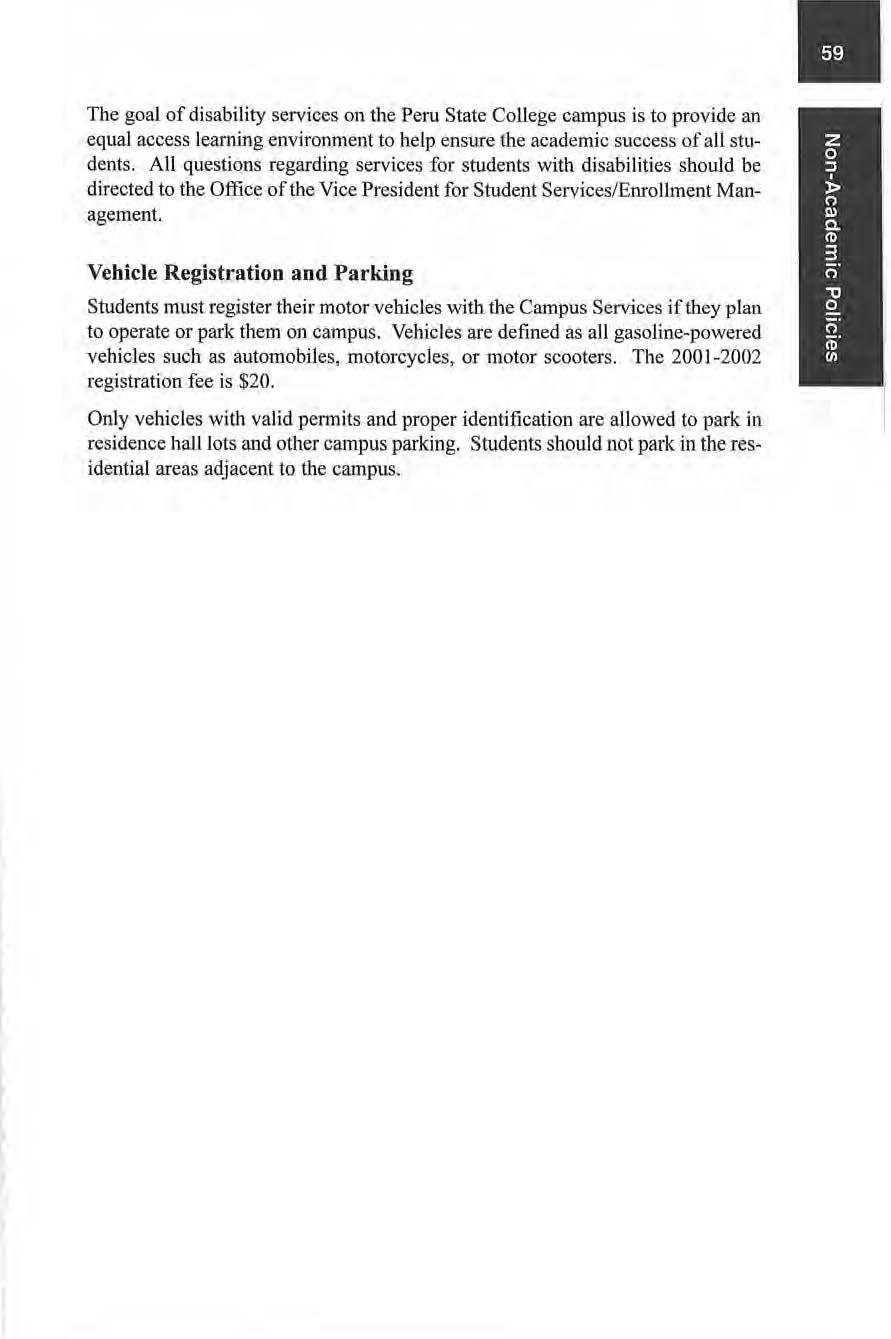
Students must register their motor vehicles with the Campus Services if they plan to operate or park them on campus. Vehicles are defined as all gasoline-powered vehicles such as automobiles, motorcycles, or motor scooters. The 200 1-2002 registration fee is $20.
Only vehicles with valid permits and proper identification are allowed to park in residence hall lots and other campus parking. Students should not park in the residential areas adjacent to the campus.
Pern State College provides economic development services to communities in southeast Nebraska. Community service activities of the Economic Development Program include short courses and workshops, assistance to communities in strategic planning, site evaluation, marketing, business retention, and other aspects of development as reqi1ested by communities and deve lopm ent agencies. In addition, the College's Economic Development Program serves as a li aison between state a nd regional development agencies and community development groups within the service area.
The Nebraska Business Development Center on the College campus provides free con sulting to businesses or persons wanting to start a business Clients may be assisted with management, financial projections, marketing, writing business plan s. loan packaging, or other conc,ems. The NBDC is funded by !he U .S. Small Business Administration, the State of Nebraska, and the College. The Peru State CoJlege office is one of eight basi c service centers located throughout Nebraska.
All grad uates of Peru State College, as well as former stude nts, fac ulty and staff who request it, are considered members of the Peru State College Alumni Association. There are no annual dues or fees.
Active chapters include Lincoln (01·ganized in 1955), Omaha (1955), Rocky Mountain (1957, includes Colorado, Wyoming, western Kansas, and western Nebraska), Northern Cal iforni a ( 1958) and Al·izona ( 1995), foactive chapters include Kansas City (I 995), South em California ( 1961 ), the local Thousand Oaks chapter ( 1973), and the East Coast chapter (1988, includes Maine to North Carol ina along eastern seaboard).
PSC alumni activities are based in the A.V. Larson Building. Current mailing lists of graduates, many former students, and some fom1er faculty a r e maintained there, as are collec tions of yearbooks, photos, publications and othe r memorabilia.
The Peru Stater , the College's officiaJ alumni news letter, is distributed at no cost to alumni and others on the current mailing list. Tbe College e nc ourages submission of items for inclusion in this publication.

ln 2003, the .Peru State College Library moves its 115,000 volumes, periodicals and media collections to spacious state-of-the art quarters where it will continue to provide access to electronic and print infonnation resources. Professional library staff members assist students with meeting infonnation literacy competency stan-
<lards throughout their degree program. Use http://www,lJeru.edu/library to access library resources . Electron ic resources include a shared cata log with the three Nebraska State Colleges, general and subjec t-sp ecific full-text books, journals, national and international newspapers, and the capability to search other library catalogs worldwide. Interlibrary loan and other delivery services are available for students and faculty with additional information needs. S pecial collections include the original manuscripts of authors Marion Marsh Brown, E .P. Conk.le, Ruth Crone, and Louise Mears, Pern State College and regional history.
The Instructional Services Center houses a large variety of audio-visual equipment and materials. The Center's satellite dish and television studio provide a wide range of educationa l and r ecreational opportunibes for students and community.

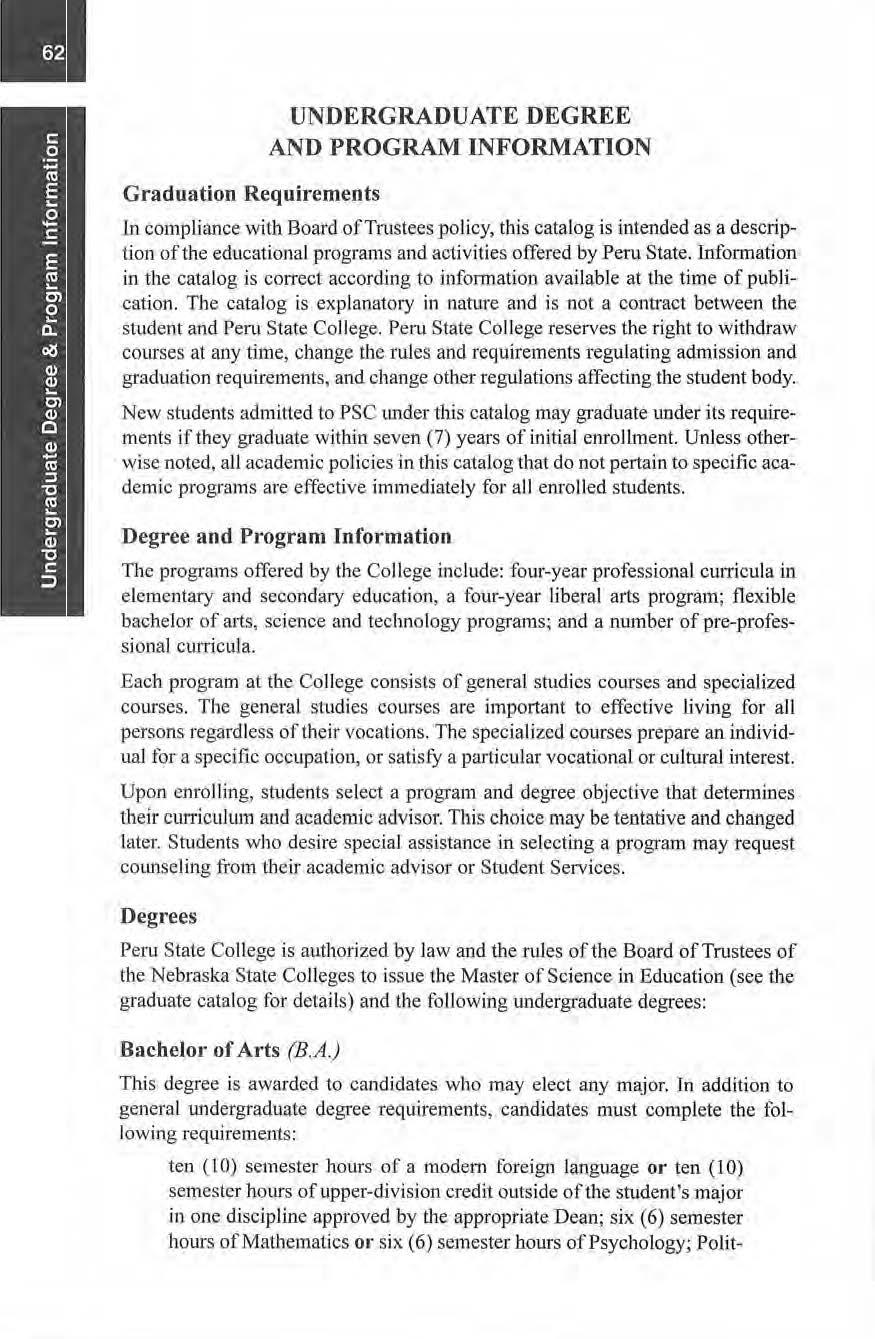
In compliance with Board of Trustees po l icy, th is catalog is intended as a description of t he ed ucationa l program s and activi ties offered by Peru State. Informati on in the catalog is correct according to informat i on avai lab le at t he time of publication The catalog is exp lanatory in nature and is not a contract bet ween the st11den t and Pern Sta te Co ll ege. Peru State Co l lege rese rves the right to w ithdraw courses at any time, change the rules and requirements regulating admission and graduation requirements, and change other regulations affecting the student body. New students admitted to PS C under this catalog may grad1mte under its requirements i f they graduate within seven (7) years of ini tial enrollment. Unless otherwise noted, all academic policies in this cata log that do not pertain to specific academ ic programs are effective immediately for a ll emolled students.
Th e programs offered by the Co llege include: fo ur-year professional cutTicu la in e lementary and secoTJdary educatio n, a four-year Uberal arts program; flexible bachelor of arts, science and technology programs; and a number of pre-professional curricula.
Each program at the Co ll ege consists of general s tud ies courses and special ized courses. The gen eral st udi es courses are important to effective living for all persons regardless of their vocatio ns . The spec ia li ze d courses prepare an individual for a specific occupation, or satisfy a particular voca ti onal or cul tural interest.
Upon enro ll ing, students se lect a program and degree objective that detem1ines their curr iculum and academic advisor. This c hoice may be tentative and changed later. Students who desire s pecial assistance in selecting a program may request co LLnseling from th e ir academic advisor or Student Serv i ces.
Peru State College is authorized by Jaw and the rules of the Board of Trustees of the Nebraska State Co ll eges to issue th e Master of Science in Educat ion (see the graduate catalog for deta il s) an d the following undergraduate degrees:
Thi s degree is awarded to candidates who may e lect any majo,. In a ddi1i on to genera l undergraduate degree requfrements, candidates must comp lete the follow ing requirements:
ten (10) semes ter hours of a modem foreign lan guage 01· ten (10) semester hours of upper-division cred it outs ide of the student 's major in one discipline approved by the appr opriate Dean; s ix (6) semester hours of Mathematics or si x (6) semester hours of Psychology; Poli t-
ical Science 20 l, nine (9) semester hours from History 113, 114,201, 202, or SocioJogy 201 , and all requirements of a Bachelor of Science degree.
Bachelor of Science (B.S.)
This degree is awarded to candidates who elect any major. Candidates m ust complete the required General Studies Program and all requirements of a major area of concentration. Adctitional hours are selected to enable the student to complete the 125 credit hours required for graduation.
Bachelor of Technology (B. T.)
This degree is awarded to candidates whose complemen tary area of emphasis is Management, and who transfer from other institutions after having completed a technical associate degree program or equivalent.

The following are the minimum requirements for the B.A. & B.S. degrees:
Total Hours
Degree candidates must earn a minimum of 12 5 semester credit hours.
Upper Divi.sion C redit
Degree candidates must earn at least 40 semester hours of upper division credit (300 and 400 level courses).
Grade Point Average
A minimum, cumulative grade point average of 2.5 is required for all degrees in teacher education; the minimum cumulative average for other degrees is 2 .0.
General Studies and Major
Degree candidates must complete the general studies program , a major (teacher education candidates must complete one field endorsement or one subject endorsement), and courses in support of their educational objective.
Major Grade Point Average
A minimum cumulative grade point average of2.0 'is required for all courses listed or selected to fulfill the major hour requirements . No grade lower than a "C" may be used to fulfill cmu-se requirements in an academic major.
Peru State Credits
A minimum of30 semester hours must be earned from P em State College.
Resident Cred its
A minimum of24 of the last 30 semester hours mus! be earned in residenee. This requirement may be waived in cases where any of the requited resident credit is earned at another Nebraska State College or where official cooperative agreements with other institutions exist. Extens ion, extended learning, and off-campus courses conducted by Peru State are considered resident credits.
The Bachelor of Technology degree is designed for transfer students who have an associate degree or its equivalent in a technica.1 major. The degree is .flexible enough to accommodate the transfer student who meets the folJowing minimum requirements:
P rere quis ites
Degree candidates must have a tecbn ical assoc iate degree from a regionally -accredited institution or its equivalent. Students who have comp leted techn ical programs of less than two years will be required to take addition al technica l coursework th at is equivalent to an assoc iate degree program. The additional work may be taken at a community college or other applicab le institution, but must be apptoved by the Dean of Professional Studies at Peru State College.
Tota l Hou rs
Degree candidates must earn a minimum of 125 semester credi t hours A minimum of30 semester hours must be Peru State College instruction . A minimum of 59 semester hours are lo be completed through accredited ins titut ions authorized to grant a bacca la ureate or higher degree. Exceptions : I) Basic or recruit mi l itary training may be used to sat isfy the general studies requirement of Health & Hygiene/PE Activities; and 2) a maximum of 30 hours of CLEP subject examinations are acceptab le.
Uppe1· Divi s ion Cre dit
Degree candidates must earn at least 20 sem ester hotl!S of upper division credit (300 and 400 level courses).

Gra de P oi nt Average
A minimum, cwnulative grade point average of 2.0 is required for all coursework completed at Pem State.
Gene ra l Stud ies
Th irty semester credit hours are required. Al least three (3) hours m ust be se lected from each area listed below and no more than n ine (9) hours of t h e total can be in any on e area. Courses se lected m.ust be exc l usive of t hose completed for the area of emphasis:
E nglish Composition ; Mathem atics/ Science/Computer Sc ience (including Math 340); Speech; Literature/Fine Arts (Ali, Theater, Music); Socia l and Behavioral Science; Health and Hygiene/P.B. Activit ies.
C omp l e me nt ary Emph asis
A minimum of30 semester credit hours in business courses is req uired with a min imum cumu lative grade point average of 2.0. No grade lower than a "C" for a ll courses taken at Peru State College or transfer wo rk may be used to fulfi ll course requirements wi thin the area.
Sixty-six semester hours of credit from the technical associate degree are the maximum applicable toward the 125 hours required for the Bachelm of Technology degree.
Additional hours are selected from general studies courses beyond the required 30 semester hours, courses supportive of the techn i ca l or compl ementary emphasis, or others in consultation witb an advisor.
In addition to the above degree requirements , the following regulations apply to Peru State bachelor degrnes:
Pre-Professiona l Programs Residence Credits
Pre-professional students who bave successfully completed t hree years in a specifically approved program may transfer to an accredited professional school during their fourth year and qualify for a bachelor ' s degree provided they meet all other grad1.1ation requirements.
A maximum of fow· (4) credit hours of P.E. 190 Varsity Sports is allowed toward a degree. PE 190 may not meet General Studjes requirements.
l ndependent Study
A maximum of six (6) hours of Independent Study is a llowed toward a degree (see page 68).
Directed Study
A maximum of eight (8) l1ours or two (2) courses of Directed Study is allowed toward a degree (see page 67).
Cooperative Education
A maximum of 12 hours of Cooperative Ed uc ation internship credit is allowed toward a degree. Primarily, the h ours eamed are noted as general electives. 1n certain majors, there are some limitations placed on the number of hours that may be applied to that major (see page 66).

Peru State Co ll ege has three graduation dates: December, May and August (end of summ er). Degree candidates, upon beginning their next to last semester must complete a degree application through the Director of Records and Institutional Research.
December Graduates - Students who expect to graduate in December should apply for graduation by March l.
May Graduates - Students who expect to graduate in May should apply for graduation by October 1 of the preceding year.
August Graduates - Students who expect to graduate at the end of summer shou ld apply for graduation by April L. If August graduates elect to participate in the preceding May graduation ceremony, they need to apply by the same date as the May graduates.
Students are expected to have completed all degree requirements on or before the planned date of graduation. December graduates receive a statement of degree completion. Diplomas are presented at the subsequent May graduation. August graduates may participate in May Commencement prior to or following the actual completion.

Students appl y for only one undergraduate degree. If, because of certain specific academic programs, it appears the student can qualify for more than one degree, the student must determine the degree for which he/she will app ly.
An additional undergraduate degree may be obtained by comp leting at least 30 semester hours of credit beyond the total hours recorded when qualifying for the previous baccalaureate degree. All prescribed requirements fo r the degree must be successfully completed.
Individuals will fo llo w the academic requirements of the co ll ege catalog in effect at the time of their readmission to pursue the additional degree.
Extended Cam p us
Credit courses are offered to communities in the Peru State College 18-county service area. Communities included are: Auburn, Beatrice, Bellevue, Cook, D orchester, Elkhorn, Falls City, Friend, Johnson, Lincoln, Louisville, Malcolm, Millard, Mi lford, Murray, Ne braska C i ty, Omaha, Palmyra, Papillion/LaVista, Pawnee City, Plattsmouth, Ralston, Stella, Sterl ing, Syracuse, Tecumseh, and York.

Peru State College offers a variety of programs and services to m ee t the educational needs of the College's service area through Leaming Centers, Distance Learning_, [nternet instruction and collaborative efforts with other institutions of higher education to provide new and creative educational opportunities for students of the extended campus. A range of programs is availab le from credit degree programs (undergr_aduate and graduate), extended learoLng courses for professional re licensure , certificate programs, and non-credit courses.
Learning Centers are located in Fall s C ity, Linco ln, LaVista/Omaha, and Offutt AFB.
Falls City
Regular aud accelerated evening courses are offered to the large commuter population in the area.
LaVista/Omaha
Graduate courses leading to a degree program for Master of Scienc e in Education are offered at a variety of times.
Li nco ln
Evening courses leading to a Bachelor of Technology degree in Management are available. Courses leading to a Bachelor of Science degree in Criminal Justice are also available.
Offutt Afr Force Base
lo cooperation with the Offutt Air Force Base Education Oflice, Peru State offers accelerated evening courses to both military and civilian students leading to a bachelor's degree in elementary education, teacher certificat ion/ endmsement in elementary and secondary education, and the Bachelor of Technology degree in Management.
The Cooperative Education Internship Program provides students w i th the opportunity to explore the field of work or gain valuable work expei"ience while earning academic credit in all majors. The maximum number of hours allowed for graduation is 12. Employment occurs in positions which are relevant to a stu dent 's
major or career interest. The program is available to all students including oticampus and non-tradi tiona l students. A flexible registration schedule allows students to emoll tlu·ough the middle of each semester. To help fac ilitate a mutually beneficial work experience for the student, each placement is approved and monitored by the department head of a student's major.
First-year students who have completed 15 credit hours and are in good academic standing are eligibl e to enro ll for exploratory or major-related Cooperative E ducation Intemship experiences at the 200 leve l. Students may take oue to four hours at this level on a cred it-no credi t basis. Stud ents wh o have compl eted 45 c redit hours and are in good academic standing are eligible to enroll for major or career re lated Cooperative Education lntemship experiences at the 400 level. Stude nts may take from one to twelve hours at this level and \yjll receive an academic letter grade.
Transfer students must complete 15 hours of coursework at Peni State College before they are e li g ible to enroll in an internship. All students must have a permission form signed by the respective department head before enro lling.
This one-hour course is designed to teach job search techniques and an educational approach for professional development. It is open to all majors. See the Office of Student Services.
Elements of Composition (English l 00) and E lemen ts of Algebra (Math 100) are designed to assist students in reaching their educational objectives. These courses focus on the areas that most oft-en affect student success: composition, mathematjc s, and reading.
English 100 and Math I00 are each three c redit hours and ea rn students institutional credit; however, neither course fulfills a General Studies requirement for either composition or mathematics.
Placement in Eng li s h l 00 and Math 100 is currently determined by d1e Computer Placement Test (CPT), or other designated institutional eva luation which is required of all students entering Peru State Colle ge with fewer d1an 30 hours of college work and ACT scores lower than 18 in reading, 18 in sentence composition, and 18 in mathematics.
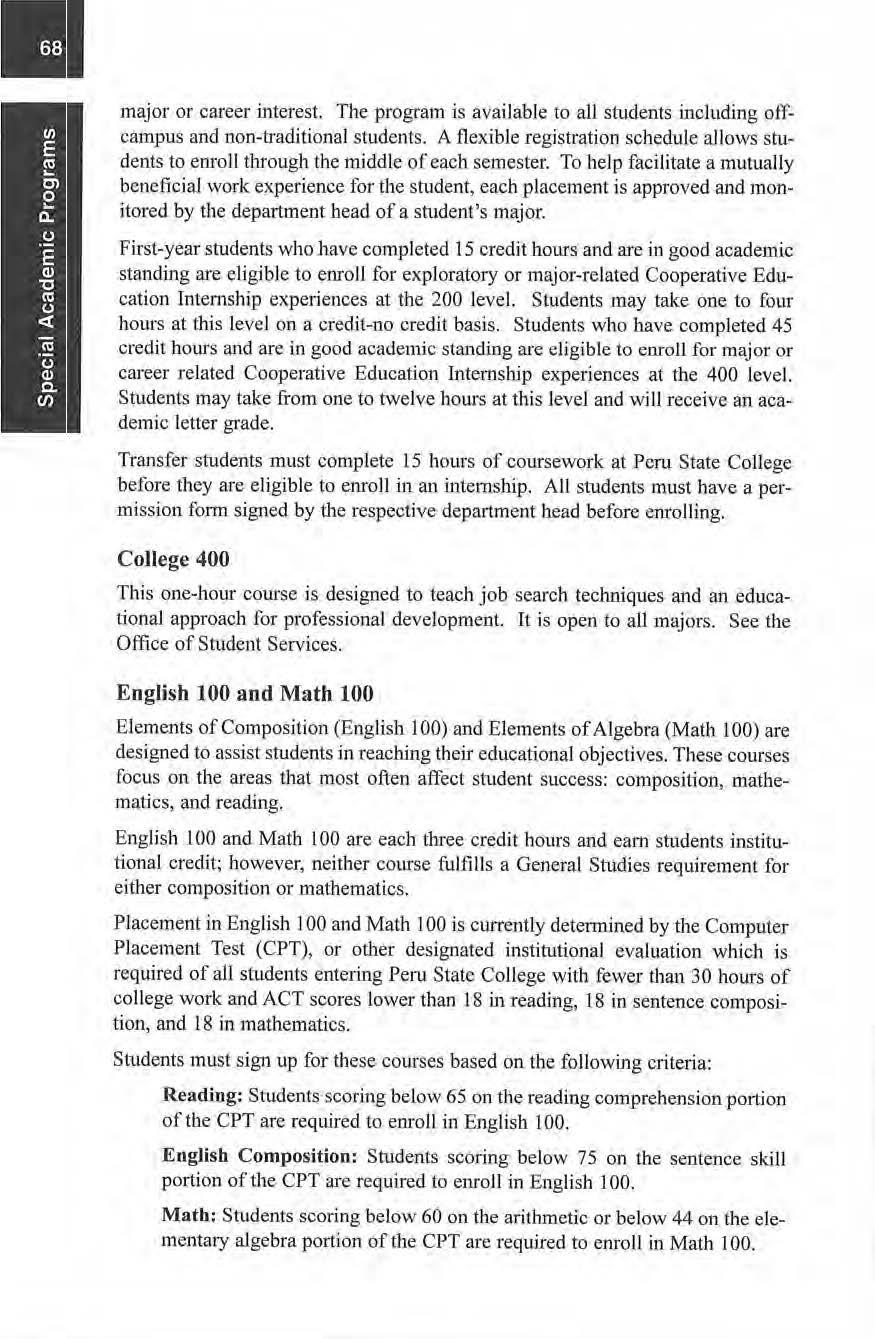
St11dents must si gn up for these courses based on the following criteria:
Read iug: Students scoring below 65 on the reading comprehension portion of tbe CPT are required to enroll in E n glish JOO.
English Composition: Students scoring below 75 on the sentence skill portion of d1e CPT are required to enroll in English 100.
Math: Students scoring below 60 on tl1e arithmetic or below 44 on the ele111enta1y algebra portion of the CPT are required to enroll in Math 100.
Those students required to take either English I 00 and/or Math 100 must pass the course(s) to enroll in mathematics and composition General Studies courses. Students failing to pass either of these courses will be meet with the Vice President of Academic Affairs to discuss further academic options.

A Directed Study (Subject 297 or 497) may be taken (with approval of the instructor and the appropriate Dean) as a course substitution when a student bas been unable to meet a course requirement in the nonnal manner and can demonstrate a need to take the course via Directed Study to graduate. In a Directed Study, the student must meet the same requirements as in the original course. Directed Study is availab le in nearly every sµbject area and is nW11bered either 297 or 497. To be eligible to take a Directed Study, a student should have completed a minimum of 90 semester hours (senior standing) and be within two semesters of graduating.
The following adclitional regulations apply to Directed Study:
1. Only two courses of Directed Study (a maximum of eight (8) semester hours) may apply toward meeting graduation requirements.
2. No more than one (I} D irected Study may be taken in a given semester.
3. If a student does not meet the eligibility requiremen1s but can demonstrate a need to take a Directed Study, the appropriate Dean will make the final decision on approval to register.
4. The student must meet with the instructor at least once each week.
S. A Directed Study Form must be completed and submitted to the appropriate Dean and the Director of Records and Institutional Research when registering for the class.
Peru State College offers a Master of Science in Education degree program for teachers in elementary and secondary classrooms. It is a program designed i11 response to the assessed needs of teachers. The program features emphasis on the improvement of classroom teaching, the use of technology in teaching, and the strengthening of the foundations of educational practice. Further information may be secured by contacting the School of Education/Graduate Studies.
An Independent Study is a carefully organized learning activity with specific objectives and methods of evaluation devel oped in consultation with a faculty member. Courses are numbered 499. To be eligible to take an Independent Study, a student must have completed 60 semester hours Gu:nior standing) and be capable of doing independent research, work and study. The following additional regulations apply to lndependent Study courses:
l. No more than six (6) semester homs oflndependent Study may be counted toward meeting graduation requirements.
2. No more than one Independent Study (a maxirmun of three hours) may be taken in a given semester.
3. The student must communicate with the ins tructor at least once each week.
4. An Independent Study Fmm must be completed and submitted to the appropriate Dean of the School and the Director of Records and Institutional Research when registering for the course.
5. A copy of the Independent Study final project should be submitted to the appropriate Dean of the School as well as the instructor for departmental archives.

The entrance requirements of most professional schools require programs of general studies which vary only slightly from one profess ion to another. These programs usually require two years or more of study. Since such ,vork is also required in the professional curriculum of teachers, Peru State's general studies program meets the pre-professional needs of prospective doctors, dentists, pharmacists, optometrists, nurses, veterinarians, lawyers, engineers, agiiculturists, foresters, morticians, journalists, and others. Students following a pre-professional program are m:ged to check the cata logs of professional schools so that specific entrance requirements can be met at Peru State.
Peru State and the College of Agricultural Science and Natural Resources at the University of Nebraska-Linco ln cooperate to ofter a transfer program. Unde r the terms ofthis agreement, students may complete a specified gro up of courses at Peru State and then transfer to the University's College of Agriculture and Natural Resources. A listing of these courses can be found at the end of the section of Pre-Professional Programs in this catalog.
Pre-professional students who have successfully completed three years in a specifically approved program may transfer to an accredited professional schoo l dming their fourth year and qualify for a bachelor's degree provided they meet all other graduation requirements.
The College typically offe rs a Su mmer Session beginning in early May and running th.rough early August. A limited number of courses are offered during one three-week and two five 0 week sessions as well as workshop formats of one to three weeks
Any request for waiver or exception to the policies and regulations stated in the catalog should be submitted as a written petition to the Office of the Vice President of Academic Affairs. Consideration is given to the petition by the Faculty Senate, and a written response is sent to the petitioning student. Petitions should clearly and specifically state the grounds for the request.
A student may remove up to two complete semesters of work from his/her cumulative grade point average and degree considerations by petitioning for approval to the Office of Vice President of Academic Affairs. To qualify, a student must have completed either 15 consecutive Peru State College semester hours of credit with a minimum 3.0 term grade point average or 30 consecutive hours with a minimum 2.5 term grade point average at Peru State College following the semester(s) the student wishes to remove.
To declare a semester bankrupt, all courses taken during that semester are voided (both credit hours and grades). The bankrupt semester is removed from consideration for cumulative grade point average pmposes and the bankrupt credit is not used for degree requirements. The semester listing of courses and grades, however, remains on the academic transcript.
(S ee How to Determine Credit.)
(See Standardized Examinations.)
Veterans of the anned forces who are honorably discharged and current active duty personnel will generally be granted credit for their military experience in accordance with the recommendations of the American Council on Education. Air Force records should be obtained from the Community College of the Air Force. Army records should be obtained from the Army/ American Council on Ed ucati on Registry Transcript System (AARTS).

Registration to audit a course implies no credit. The student pays the regular tuition a nd fee charges but .i s not required to write tests, examinations, and/or papers. No grade is.given in audited courses nor can credit be g i ven at a later date. Enrollment is on a space-available basis.
(See Standardized Examinations .)
Course C ha ll enge
(See Institutional Exams.)
(See Standardized Examinations.)
In hJgh schools with which Peru State has a formal early entry agreement, the principal decides which students are qual ified to take college courses. Other restrictions may also apply; contact I.he Office of Extended Leaming fm details.
Any high school student approved to register for a college credit course will have the appropriate information entered on a college transcript.
Students may earn co ll ege credit for some experiences and accomp lishments attained outside of the nonnal coll ege setting. Credit may be granted through standardized examination programs or the credit recommendations of the Guide to the Evaluation of Educational Experiences in tile Anned Services and The National Guide to Educational Credit for Training Programs.
The College ' s general policy for awarding credit for extra-institutional learning ls:
1. On ly individuals who have not participated in similar scheduled coursework are eligible to receive extra-instituti onal credit.
2. Extra-institutional credits are considered transfer credits and are subject to the same policies as other transfer credits.
3. A maximum of 66 semester credit hours earned through extra-institutional validation may be applied to the 125 semester hour minimum required for a bachelor's degree, tmless otherwise specified,
4. Credit examinations may be earned only once in a single subject. A similar subject test in another testing program will not earn additional credits.
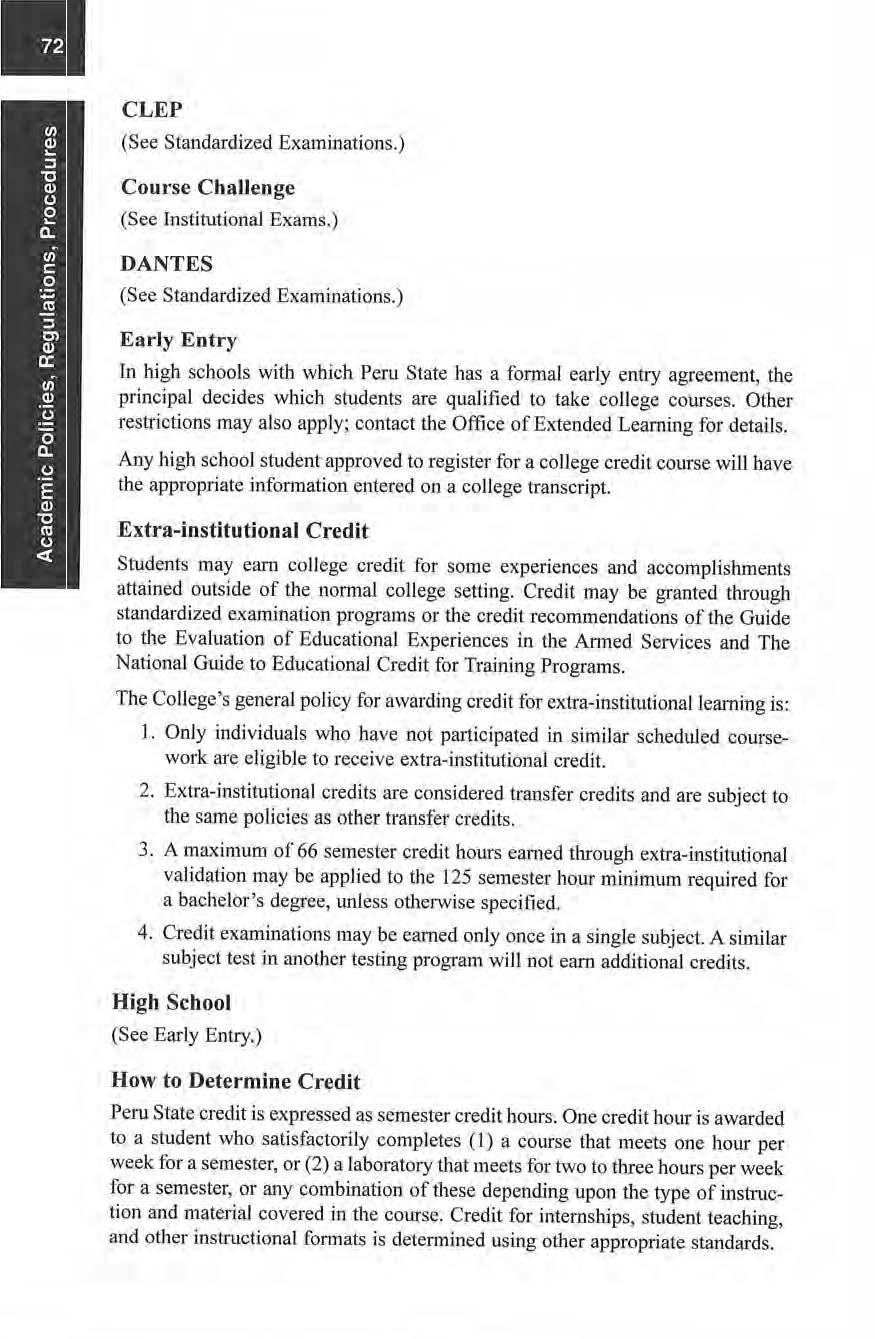
(See Early Entry.)
Peru State credit is expressed as semester credi t hours . One credit hour is awarded to a student who satisfactorily completes (1) a course that meets one hour per week fur a semester, or (2) a laboratory that meets for two to three hours per week for a semester, or any combination of these depending upon the type of instruction and material covered in the course. Credit for internsliips, student teaching, and other instructional fon11ats is determined using other appropriate standards.
To designate a student's work in a course as incomplete at the end of a term , instructors record the incomplete grade([). Stude nts may receive this grade only when serious illness, hardship, death in th e immediate fami ly, or military service during the semester in wh ich they are registered prevents the m from co mpleting course requireme11ts. In addition, to receive an incomplete, a student must have completed a majority of the course's major requirements.
Unless extenuating circumstances d ictate otherwise, students must initiate requests for an incomplete by tilling out an I ncomplete Grade Completion Contract , which requires the s igJ1ature of the student, faculty and Dean.
The Incomplete Grade Comp letion Contract cites the reason(s) for the incomplete and details the specific ob ligations the st11dent must m eet to change the incomplete to a letter grade. ff students agree to complete -required work ptior to the normal deadline for making up an incomplete - the end of the subsequent semester - this date must appear in the contract Th e dean, the instructor, and the stude nt receive s igned copies of the Incompl ete Grade Comp letion Contract.
Even if the student does not at1end Peru State Co ll ege, al l incomplete co urse work must be finished by the end of the subsequent semester. Unless Faculty Senate appr oves an extension, and if tl1e student does not fulfill contract obligations in the allotted time, the incomplete g rad e automatically becomes an F.
Students who have filed an appl ication for graduation are not eligib le for a grade of Incomplete.
Students, due to experi ence and/or persoual improvement, may qualify for credil in lower division courses through the procedure of an interview and a written exami nation prov ided the examination is made availab le by the respective academic schools. The student must, through an interview, satisfy a faculty committee that he/she has had a formal or infom1 al experience i n which the course content may have been met before the stud ent will be given a written compreh ens ive examinat ion.

The amount of cred it to be allowed; the co urse for wh ich subst itution , if any, is made; and the particular graduation requirements which may be satisfied will be detennined by the Dean of the appropriate School and will be subject to aU general graduation requirements . The student must reg ister for the course and pay the tuition charges b efore wri ting the examination. The letter grade received is recorded o n the student's transcript. This pro cess i s also known as "Cou-rse Chall enge."
(See Standardized Examinations.)
Students may and are urged to repeat courses in which they have performed poorly. The initial co urse title and grade are not removed from the s tt1dent 's permanent re co rd. The higJ1er grade is used to determine the new grade point average. There m ay also be occas ions when students repeat a course for review oh an audit basis without a change of grade.

It is the student's r espons ibil ity to report all repeated courses when registering fo r courses. Tuition and fees are paid for repeated courses, but additional credit hours are not earned ,
Students may earn credit through several standarclized examination programs Cred i ts earned from t he CLEP subject exam only (College Level Examination Program), DANTES (Defense Activity Nontraditi onal Education Suppmt), PEP (Proficiency Examination Program), and APP (Advanced Placement Program) can sa tisfy certain Pem State degree requirements. Students shoul d contact the Office of Career Pl anning and Testing for specific information about the Col lege's regulations and p rocedures for ihe standard ized CLEP examinations. The 66 hour maximum for extra-institutiona l credit inc l udes standardized examination s
Pem State College considers all cou rses comp leted with a grade of"C" or better at other accredited col leges and universities , provided they are reported on the official transcript of each previous ly attended institution and in credit hours. Courses completed at the pre-college or remedial leve l are not considered for transfer. This policy a lso app li es to Peru State College s tudents who earn credits on an interim basis at another co llege, provided they have the pr ior approval of the Dean of the appropriate School/Director of Record s. T h e required forms for reporting transfer creclits are available at the Director of Records and In stitutiona l Researc h Office.
The credit ho urs to b e earned and the coursework to be completed are determined at the time of registra tion. Students do not have the op ti on of reducing or increasing cred it hours or comsework after the free drop/add p eriod at the beginn ing of the tenn.
Academi c integrity is a basic principle that requires the student to take credit only for ideas and efforts that are his /her own. Cheating is de fined as the submission of materials in assignments, exams, o r other academic work that is based on sources prohibited by the facuJty member. Cheating shall include, but is not limited to, situations in which a s tudent:
1. Refers dtrrin g an academic evaluation to material so urces not authorized by the faculty member.
2. Util izes devices during an academic eva luation that are not authorized by the faculty member.
3. Provid es assistan ce to another student or receives assistance from another student during an academic eva luation in a manner not authorized by the faculty member.
4. Presents as his/her own t h e ideas or words of another person without customary and proper acknowledgment of sources.
5. Knowingly petmits his/her words to be s ubmitted by another person without the faculty member's pennission.
6. Acts as a substitute or uti lizes a substitute in any acadentic evaluat ion.
7. Fabricates data in support of laboratory or field work.
8. Po ssesses, buys, sell s, obtains, o r w,es a copy of any materials intended to be used as an instrument of academic evaluation in advance of its administration.
9. Alters grade records of his/her own or another student wo rk in a course or a component of a course.
In addition to any adverse academic action that may result from engaging in academically dishonest behavior, the College specifically reserves the right to address and sanction the conduct invo lved through the d iscipl inary pr ocedures o utlin ed in this catalo g. Academic actions are rev iewabl e under the Academic A ppeals Policy contained in this catalog.

Students with a c umul ative grade point average of 1.00- l.99 at the close of a semeste r, regardless of t he number of attempted h ours , are p laced on academic probatio n. Probationary students must agree to th e provisions of an Academic Probation Contract that may include the fo llowing: lhnited enro llm ent (9- 12 hours); adv isor meetings; and one o r more mandatory cow·ses. Probationary students must obtain a minimum 2.0 average for each successive semester of attendance (continued probation) until the required cumul ative grade point average of 2.0 o r higher has been ach i eved. Failure to meet the above condition will result in acadentic suspens ion (see below). Academ ic suspension is generally for two semesters.
Students who h ave attempted 21 credit hours or less (excl udin g transfer record) and have a cumulative grade point average below 1.00 at the close ofa semester are placed on academic probation and may continue attendance under the ~bove requirements prov id ed the following additional requi re ments have been sattsfied.
The student must meet with a designated Probation Advisor to develop a personal plan for improvement. The student must agree to the provisions of an Academic Probation Contract that may include the following: limited enrollment (9-12 hours) ; advisor meetings; and one or more mandatory courses. (See chrut below)
Students who have attempted 22 semester hours or more, excluding tran sfe r record, and have a cumulative grade point average below 1.00 al the end of a semester are suspend e d. Academ ic s uspens i o n is generally for two semesters . A socond academic s uspension is generally a final suspension. Suspended students may not take Peru State Co llege courses dw-ing the period of suspension. (See chart below.)
her
* Unless the student has attempted 21 hours or less (excluding transfer hours) , in which case the status is probation , See ''2 1 Hour Rule," above.
** Unless se mester G.P.A. is 2.00 or higher, in which case the status is con tinu ed probation.

Students who do not meet the prerequisites of a cow-se as stated in the current catalog and who have not rece ived instructor pe1mission to enroll may be administratively dropped from the course. Students wb o are so identified after registering for a course will be notified within the drop/add period by the appropriate Dean of the Schoo l that they do no t meet the prerequisites and should institute the procedures for dropping the course. Students who do not drop will be notified by the Dean of the School that they are being withdrawn. The Dean of the School will notify the Director of Records/Institutional Research to have the student dropped , Such notification will be approved by the Vice Presiden t of Academic Affairs.
All Peru State students participate .in outcomes assessment activities that determine whether specific learning goa ls ha ve been achieved.
To assess whether senior s tud e nts have mastered the content, methodology, and liberal arts bas e of their discipline, each graduating senior must successfully complete the discipline's senior competency. Senfor competencies for each major are n oted in the major's sectio n of the cata log and bel ow:
Art ART 400 Senior Exhibition
Business Administration BUS 495 Business Policy
Bachelor of Technology BUS 496 Organizational Leadership
Computer Science cscr 408 Senior Project
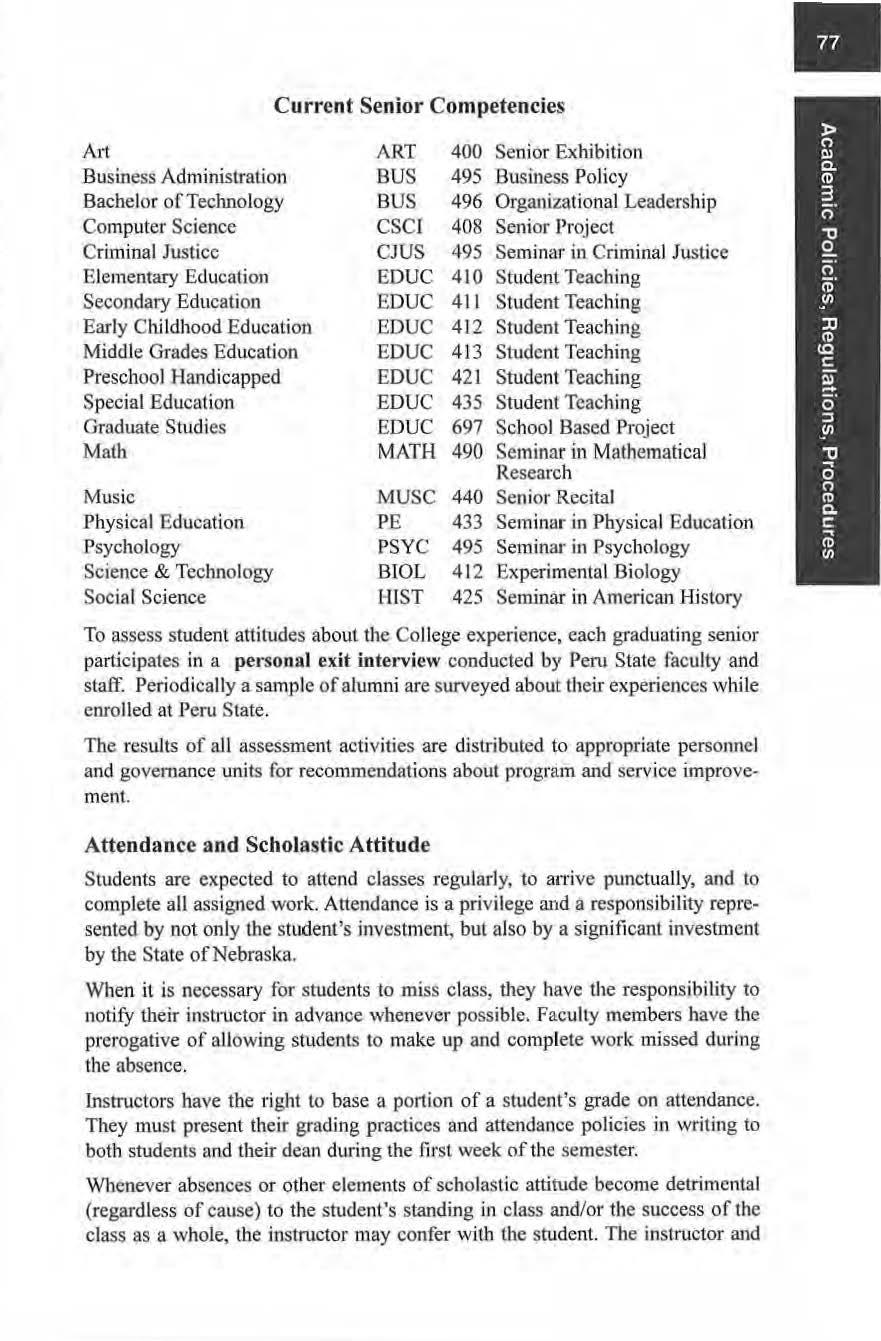
Crim inal Justice CJUS 495 Seminar in Criminal Justice
E lementary Education
EDUC 410 Student Teaching
Secondary Education EDUC 411 Student Teaching
Early Childhood Education EDUC 412 Student Teaching
Midd le Grades Education
EDUC 413 Student Teaching
Preschool Handicapped EDUC 421 Student Teaching
Spec ia l Education
Graduate Studies
EDUC 435 Student Teaching
EDUC 697 School Based Project
Math MATH 490 Seminar in Mathematical Research
Music MUSC 440 Senior Recital
P hys ical Education PE 433 Sem i nar in Physical Education
Psycho logy PSYC 495 Seminar in Psychology
Science & Technology BIOL 412 Experimental Biology
Social Science HIST 425 Seminar in American Hjstory
To assess student attitudes about the College expe r ience, each graduating senior participates in a p e rso na l exit in terview conducted by Pem Stale faculty and staff. Periodically a sample of alumni are surveyed about their experiences while enrolled at Peru S tate.
The results of aJl assessme nt activities are distributed to appropriate personnel and governance units for recommendations about program and service improvement.
Students are expected to attend classes regularly, to an ive punctually, and to complete all assigned work. Attendance is a privilege and a respons ibility represented by not only the student's investment, but also by a signjfjcant inves tment by the State of Nebraska.
When i t is necessary for students to miss class, they have the responsibility to notify their instructor in advance whenever possible, Faculty members have the prerogative of a ll owi ng students to make up and comp lete work missed during the absence
Instructors have the right to base a portion of a student's grade on attendance. They must present their grading practices and attendance policies in writing to both students and their dean during the first week of the se mester.
Whenever absences or oth er elements of scholastic attitude become detrimental (regardless of cause) to the student's standing in class and/or the success of the class as a whole, the instructor may confer wi t h the s tudent. The instructor and
the student m ay mutually agr ee that the registration in the course should be withdrawn, or the instructor may issue the student a "scholasti c alert." Future confe rences for the same or related reasons may result in the instructor withdrawing the student from the class. If the student requests, the Dean of th e Schoo l may be asked to participate in th e dec is io n. Th e grade will be a " W" if the course withdrawal is prior to the last d ate to withdraw with a "W". An ''F" will be recorded after trus date.
Students who want to change adviso rs may obtain a Change of Advisor form from their dean's office. Change of advisor is not official and complete until the previou s advisor, the new advisor's Dean, and the new advisor's signatures are obtained. The previous dean's office is responsible for transfer of student files to the new advisor.

Students who want to c hange their maj or or undeclared starus must co mplete the Change of Major form availab le from their dean's office or at the Director of Records and lnstitutional Research office.
Students who elect to change their major may have to fo llow the requirem en ts in the Co llege cata log current at the time of change, rather than the o ne in effect at the t ime they were admitted to the Co ll ege to pursue a degree program. A c han ge in major may also require additional classes and delay the grad u ation date.
Students are allowed to drop/add until the pub lished final date. Their course registrations are then final.
St ud ents are responsible for the accuracy of each regis tration and are ultimate ly responsible for meeting all degree requirements.
A change in registration is processed at the Director of Records and Institutional Research Office. No fuJI semester courses may be added after th e published final date to add courses. When app li cabl e, tuition charges will be adjusted for changes initiated during the officia l drop/add period only.
Stude nts are classified accord ing to the number of semes ter cred it hours earned:
Freshman Oto 29 credits
Sophomore 30 to 59 credi ts
Juni or 60 to 89 credits
Se ni or 90 and over
Post-graduate students have earned a bachelor's d egree or higher and are earning addi tional undergraduate credit. Non-degree students are qualified persons who enro lled primarily to sat isfy an occupati ona l need or personal interest.
Dead Week is the week prior to finals week and no exams are to be given during that week. Exceptions to this policy may be granted only by the appropriate Dean of the School.
At. the end of each semester the Vice President of Academic Affairs publishes the Dean's List. Students on the Dean's List must have a grade point average of3.75 or higher for the semester, have completed at least 12 hours (credit/no credit not included) during the past semest er, have no incomplete grades for the semester, and have no "holds" on tb.eir academ ic record.
Final exams are scheduled the last week of the semester. Coaches ofvarsity athletic teams do not schedul e regular game s or events during this week. However, they may enter the i r teams in NAIA approved p lay-offs in which the College bas declared an inten tion to participate if quali fi ed. Students who participate in playoff events during finals week are still subject to the attendance policies of their instructors.
Peru State students who are enrolled for 12 credit hours or more during a semester are considered fu ll-tim e students. However, the normal course load for a student wh o expects to comp lete a bachelor's degree within eight (8) semesters (4 years) is 15-16 hours. The ma'<imum load without specia l pennission is 17 hours; the Dean of the School in which the student is majoring may approve l 821 credit hours provided the student obtained a minimum 3.5 grade point average the previous semester. The maximum cr ed it hour load is 21. Students must petition Facu l ty Senate fo r loads above 2 1 hours Class withdrawals subsequent to the drop/add period are included in the credit hour load.
Veterans and other elig ible persons attending Peru State under the benefits of Chapter 34 and 35, Title 38, U.S.C., as full-time students must be enro lled for at least 12 semester hours, or the equivalent.
Courses at Offutt Air Base, Southeast Community Co ll ege, and other off-campus sites are scheduled on an eight-week cycle. For each eight-week session, when students are not registered for student teaching, they may register for a maximum of l 2 semester credi t hours with Peru State. The 12 hours i nc lude any independ• ent or directed study courses.

CR and NCR do not affect grade point average; CR is applicable to graduation hours.

" P' (Jncomp lete) work must be comp leted within the next se mester or the reco rd will s how an "F". Work is to be completed whet her the s tudent is in attendance or not. S tudents who have filed an app lication for graduation are not eligib le for a grade oflncomplete.
Graduation honors arc conferred on bachelor ' s degree candidates who have earned a minim um of 60 Peru State College semester credit hours in graded courses ( CR grades excluded). These hours must be resident credit hours. Grades and credits ea.med at other colleges and un ivers i t ies do not app ly toward graduati on hon ors from Peru State.
Summa
Cum
(See Fu ll -Time Stu dent Status.)
Petiti o n
(See Academic Appeals.) Probation
Students who apply for admission to the College will indicate on the App lication for Admission the major area of study they intend to pursue. Individuals who are unsure of a major should indicate "Undeclared" o n the app li cation form.
(See Academic Suspension,)
A fee i s charged for each transcript (including the first). Transcripts are not issued to students who have financial obligations to the College or holds on their academic records. Transcript requests are made in "vriting to the Director of Record s and Institutional Research.
Once a student graduates or discontinues attendance at Peru State, subsequent college credits do not become a part of hi s/he r Peru State transcript. This does not apply to an active student's credential file in the Credentialing Office in the School of Education and Graduate Studies.
(See Academic Appeal.)
Students who wish to withdraw from a class must notify th ei r advisor, the course instructor, and officially withdraw through the Director of Records and Institutional Research Office. Athletes must notify their head coach of their intent to wi thdraw. Students withdrawing after the last day to drop/add classes, the end of the first week of class, receive a "W". After one week past the term mid-point date, students who initiate a withdrawal re ceive an "F" for the c lass.
Students who wish to withdraw from the College must initiate t11eir witbdrawal wi th the Vice P resident for Student Services/Enrollment Management and complete all the appropriate paperwork. Proportional tu ition refunds are made in accordance with the refund schedule (see the Expenses and Financ ial Aid section) to students who officially withdraw from the Co llege.
Priot to one week past the mid-point of the tenn withdrawal course grades will be "W." After one week past the mid-point of the term, the Vice President of Academic Affairs will determine if unusual or extenuating circumstances surround a withdrawal request and recommend either Withdrawal (W) or Failing (F) grades for all coursework. Poor academic perfonnance i s not s ufficient reason to receive all "W's."

The purpose of the General Studies Program at Peru State is to prepare the student for advanced co ll ege work as well as for li fe-long learning. The General Studies Program consists of spec ifi c colU"ses that are designed to assist the s tudent in acquiring the intellectual foundation that will last for a lifetime of le arning. The objectives of the General Studi es Program are es tablished in the R ole and Mission statement. This statement requires that Pent graduates "I) can write, speak, and compute effectively, 2) are comp uter literate, 3) c an think critically and independently, 4) are open to and h ave the capacity for change, 5) are prepared to assume their socia l and civic ro les as leaders in an in creasingly interdependent world, and 6) are equipped to ptu-sue lives that are inte llectually, ethicaJl y, aesthetically, and physically rewarding." Below is the cwTioulum designed to meet the above objectives .
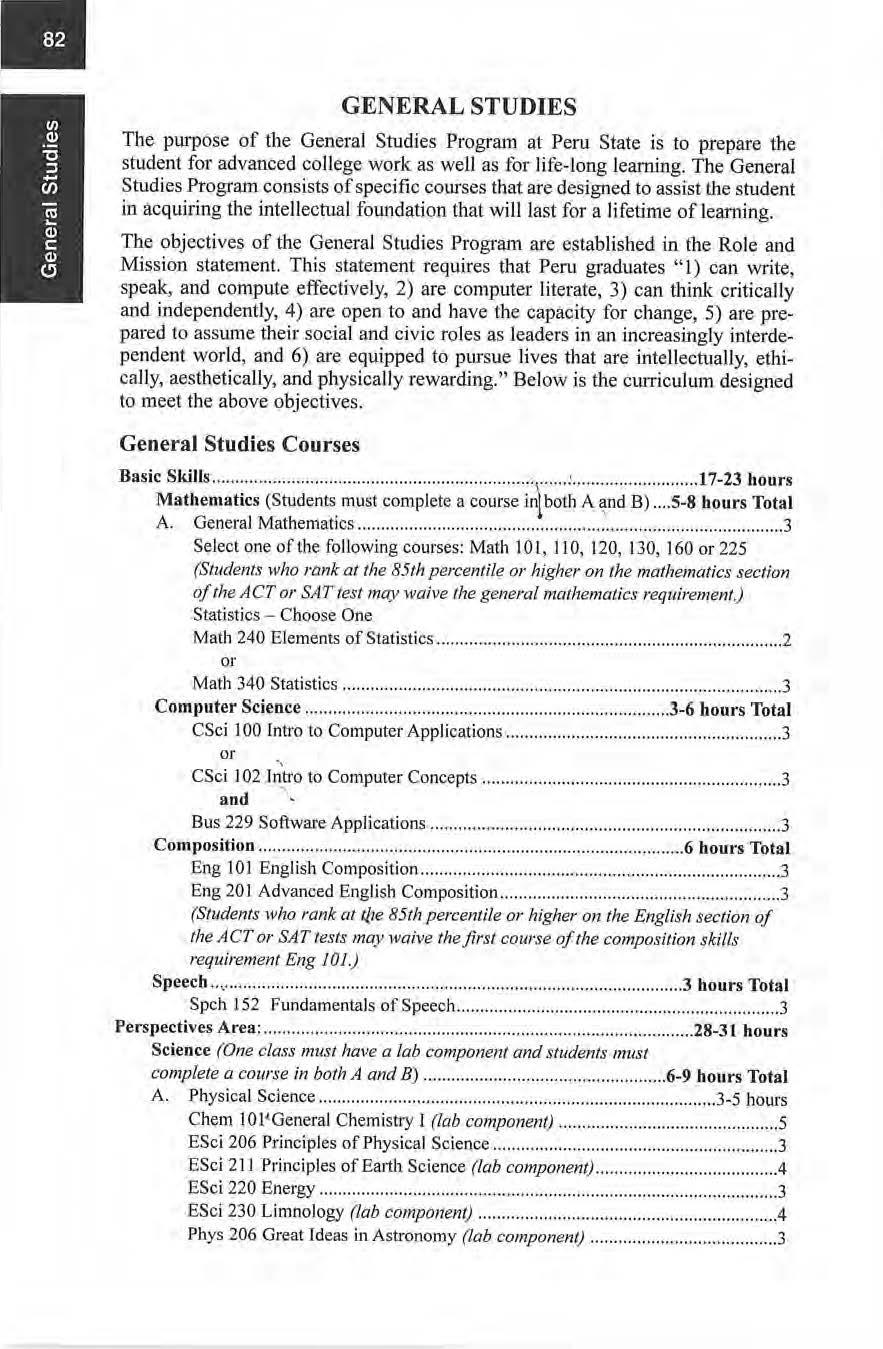
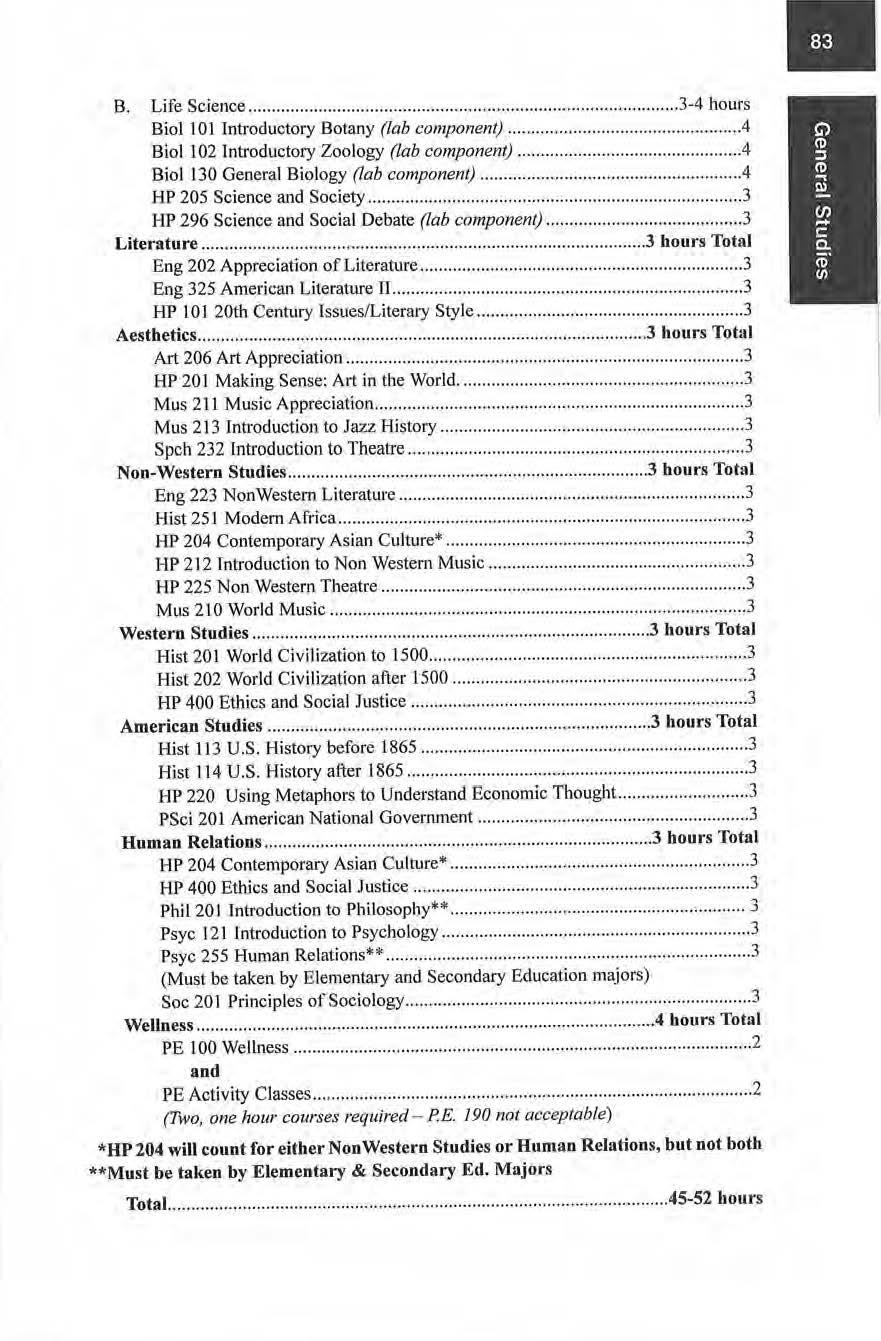
Below is an unofficial worksheet that permits the s t udent to in ventory General Studi es and major courses by grade received, term completed, and numb er of credit hours ea rned.

Course
BA SIC SKI LLS
Mathem atics
MAT H 101/110/ 120/130/160/225
Stat is tics
MATH 240/3 40
Co mpute r Sci en ce
CSC I I00 or CSC I I 02 and BUS 229
Co mpos itio u
ENO 10 1
ENG 201
Speec h
SPC H 152
PERSPECTIVES AREA
Ph ys ical S ci ence
CHEM 10 1/ ESCI 206/ ESC I 211/
ESC I 220/ESCI 230/PHYS 206
Life Sc ience
BIOL 101/BIOL 102/ BIOL 130/
1 IP 205/HP296
L iterat ure
ENO 202/ENG 325/HP JOI
Aes the ti cs
ART 206/ HP 201/MVS 2 11 /
MUSC2 J 3/SPCH 232
No n -W estern S tudi es
ENO 223/HIST 251/HP 204*/H P 212
HP 225/ MUSC 2 10
Wes te rn S tudi es
HIST 201/HIST 202/HP 400
Am e ri ca n Studies
HI ST 113/HJST 114/HP 220/PSCl 201
Human Relation s
HP 204*/PSYC 255**/SOC 201
PHll.201°/PSYC L2 L/HP400
We ll ness
PE 100
Two act i v iti es courses
Date Co mpleted Grade or Exempted Received
PRO GRAM - SPEC IFIC REQU IREMENTS
0
MAJO R COURSES
* HP 204 wi ll cou nt fo r e ither No n- Western Studies or Hum an Relation s, but not both.
'*Musi be taken by Elementary & Secondary Education majors.
Peru State College offers twelve undergraduate majors with 45 options, 26 endorsemeL1ts and e leven minors within the major structu re.
DEGRE E MAJ OR SCHOOL OF ARTS AND SC[ENCES
BS/BA Art
BS/BA
Computer Science
Art (Minor in Art)
Business Applications
Computer Science Endorsement (Jvlinor in Con\puter Sci)
Technical
BS/BA
Engli sh
Language Arts
E nglish (Minor in Engli~h)
(Minor in Speh/ Drama )
BS/ BA
BS/BA
Mathematics
Music
Mathematics (Minor in Mathematics)
E len1entary Vocal Music
E ducation (K-6)
Music Marketing
Music Performance
(Minor in Musio)
VocaVlnstrumental
Music Education (K-1 2)
BS/BA
Natural Science
Blologlcal Science
Wildlife Ecology
Biology
(Minor in Biology)
Chemistry (Minor in Chemistry)
Naturnl Science
Nuclear Technology
Phys ical Science
BS/BA
S1;1clal Sclence
SCllOOLOFEDUCATION ANl> GRADUATE STUDIES
BS/BA Education
Social Science
(Minor in Social Sci)
Histo ry (Minor in History)
Elementary Secondary
Speeial Education
Elem or Sec
Early Childhood
l>rcschool fiandicapped
Middle Grades
BS/ BA
Physical Education
SC HOOL OF PROFESSlONAL STUDIES
BS/BA
Business Administration
Physical Educ (K-6)
Physical Educ (7-12)
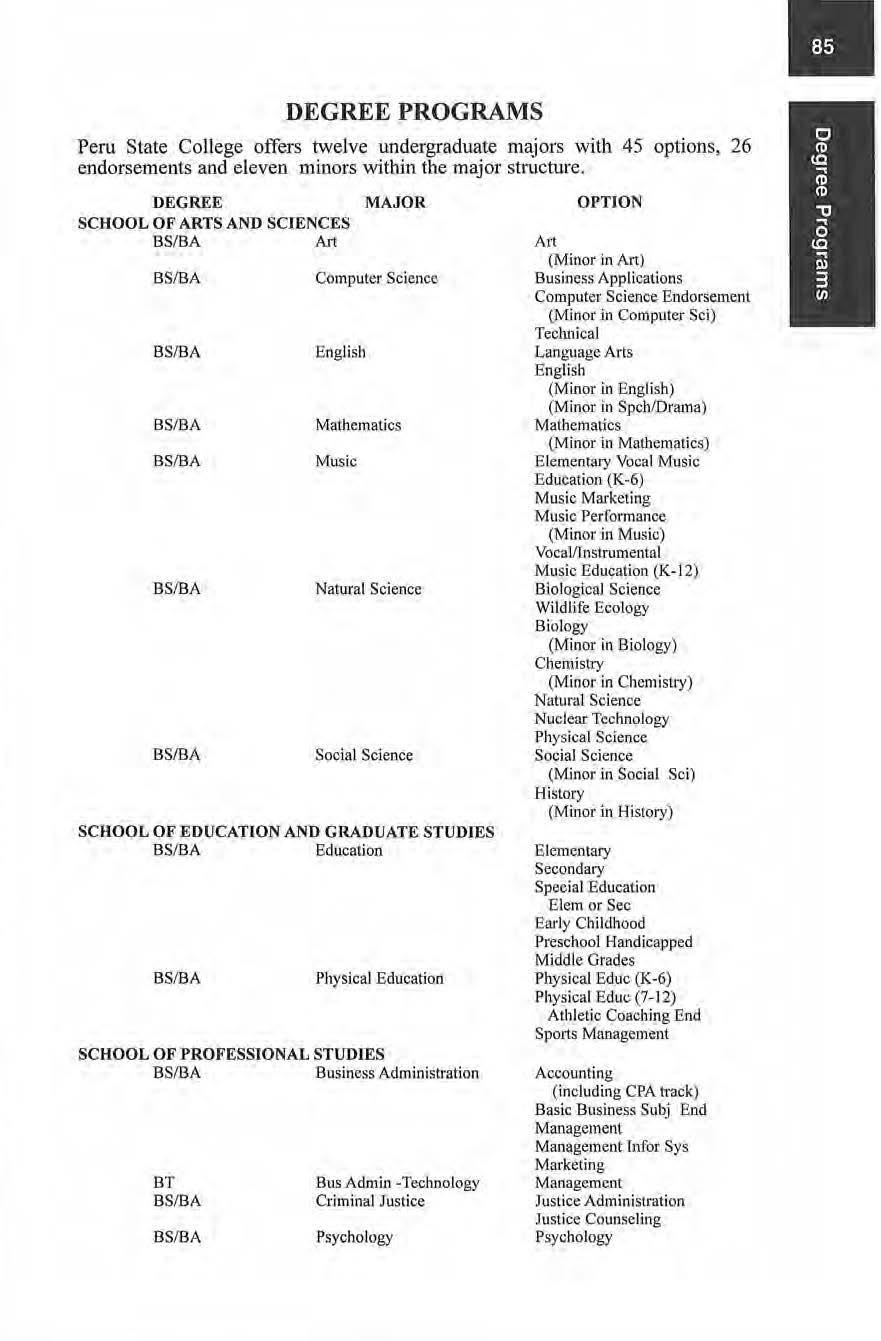
Athletic Coaching End
Sports Mnnagement
Accounting (in cl uding CPA track)
Basic Business Subj End
Management
Management Tnfor Sys
BT
BS/ BA
BS/BA
Bus Adm in -Technology
Criminal Justice
Psychology
Marketing Management
Justice Administration
Just ice Co unseling
Psychology
The purpose of the Honors Program is to challenge academically-gifted students with new ideas and perspectives. Honors courses are usually interdisciplinary in approach. Class size is limited and student eligibility requires higher t han average academic qualificat io n s.
Honors courses are designed to stimulate an inquiry model of l earning through a semmar structure. The Honors Program is an opportunity for personal growth and an insp iration for a lifetime of intellectual curios ity. Honors Program students may attend special cultural or scho lastic events throughout the academ ic year, as welJ as interact with visiting scho lars on the Peru State College campus.
To complete the Honors Program, students. need at least 15 hours of Honors classes. Two of these courses are required: HP 101-Twentieth Century IssuesLiterary Styles (meets the General Studies L iterature requfrement) and HP 400Ethics and Social Justice - Capsto ne cours e (meets the General Studies Western Studies requirement). Five additional Honors courses are offered on a regular basis; students m ust take at least three of these courses to fulfill the 15 cred it hour requirement. All regularly scheduled Honors courses fulfill r equirements of P eru State College's Genera l Studies Program. In addition to the two courses already described , the fo ll owing seven courses may be offered (choose three):
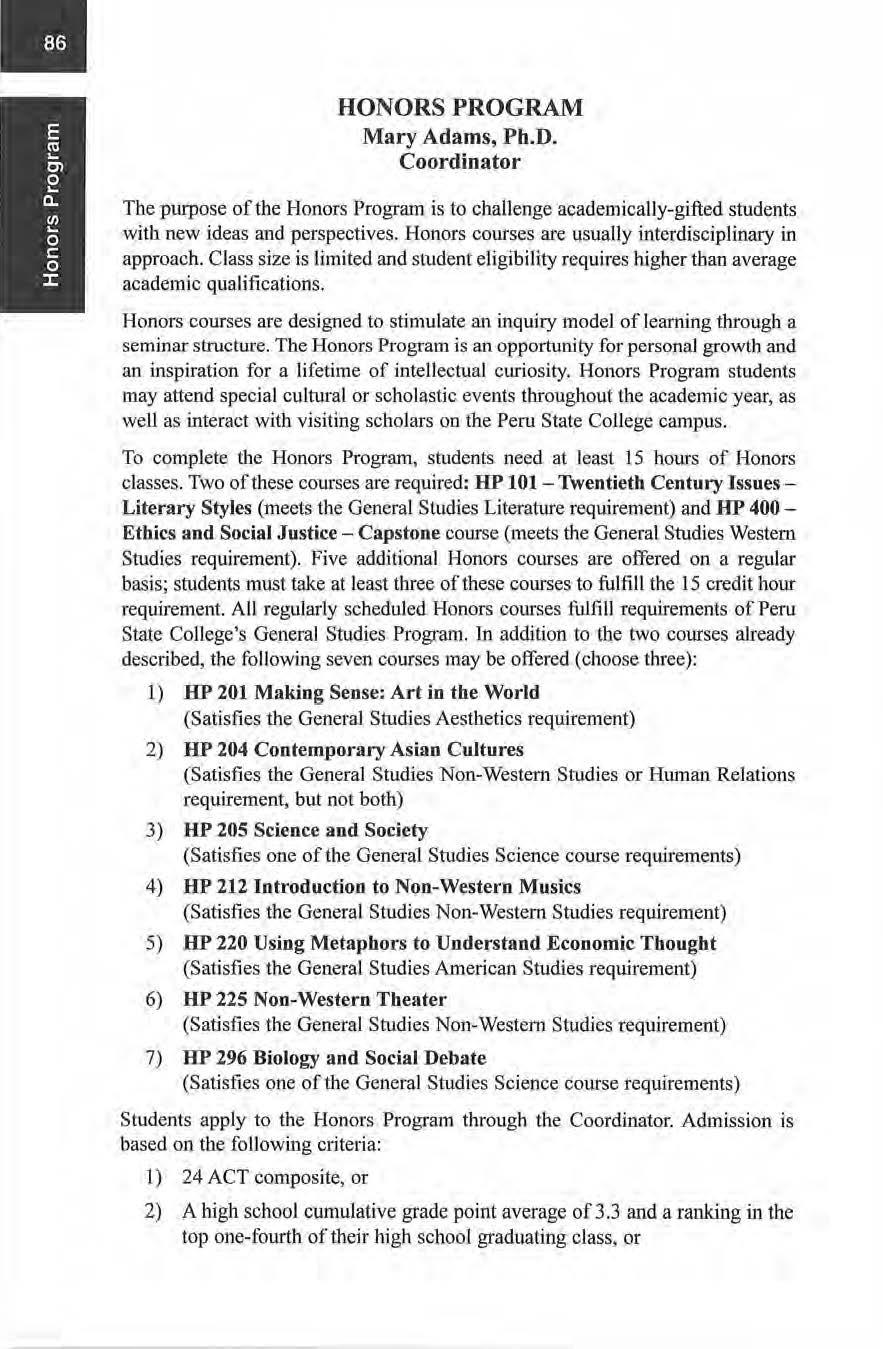
1) HP 201 Making Sense: Art in the World (Satisfies the General Studies Aesthetics requirement)
2) HP 204 Co ntempora ry Asian C ultures (Satisfies the General St udies Non-Westem Studies or Hwnan Relations requ irement, but not both)
3) HP 205 Science a nd Society (Satisfies one of the General Studies Science course requirements)
4) HP 212 Introduction to Non-Western Musics (Satisfies the Ge neral Studies Non-Western Studies requirement )
5) HP 220 Using Metaphors to Understand Economic Thou ght (Satisfies the General Studies American Studies r equirement)
6) HP 225 Non-Western Theater (Satisfies the General Studies Non-Western Studies tequirement)
7) HP 296 Biology and Social D eb ate ( Satisfies one of the Genei·al Studies Sc ience course requirements)
Students apply to the Honors Program through the Coordinator. Adm ission is based on the following criteria:
l) 24 ACT composite, or
2) A bjgh schoo l cumulative grade point average of 3.3 and a ranking in the top one-fourth of their high school graduating class, or
3) A cumulative grade point average of 3.3 for at least 12 semester hours at Peru State or another college, or
4) Permission of the Honors Program Committee based on a wiitten petition by a student who does not meet the preceding requirements .
Students who earn a Presidential, Board of Trustee, or Student Opportunity Scho larship (Non-Resident Scholarship) must enroll in at least one Honors course during their first year at P eru State College. After their first year, students who continue to receive one oftbe preceding scholarships and who meet the Honors Program eligibility requirement - by maintaii1ing a 3.0 cumulat ive grade point average - must take at l eas t one Honors course each year until they eith er fulfill the J 5 credit hour requirement to graduate from the Honors Program or complete their Genera l Studies course require m ents.
To be consid eied Honors Program g raduates, students must have maintained at least a 3.0 cwnulative grade po int average and complete d the 15 credit hour requirement.
Students who successfully complete the Honors Program are designated as Honors Program graduates. They are recognized at Commencement and on their peimanent college records
101 Twentieth Century Issues - Literary Sty les (3 hours)
(Satisfies the General Studies Literature requirement)
Pennission of H onors Program Coordinator required. Through fiction, poetry, drama, biography, autobiography, and historical narrative, this course will focus on such selected issues as education, the environment, racism , behav iori s m, nuclear war, political leadership and the psychology of leadership, mass poli tical movements, and the use of propaganda.
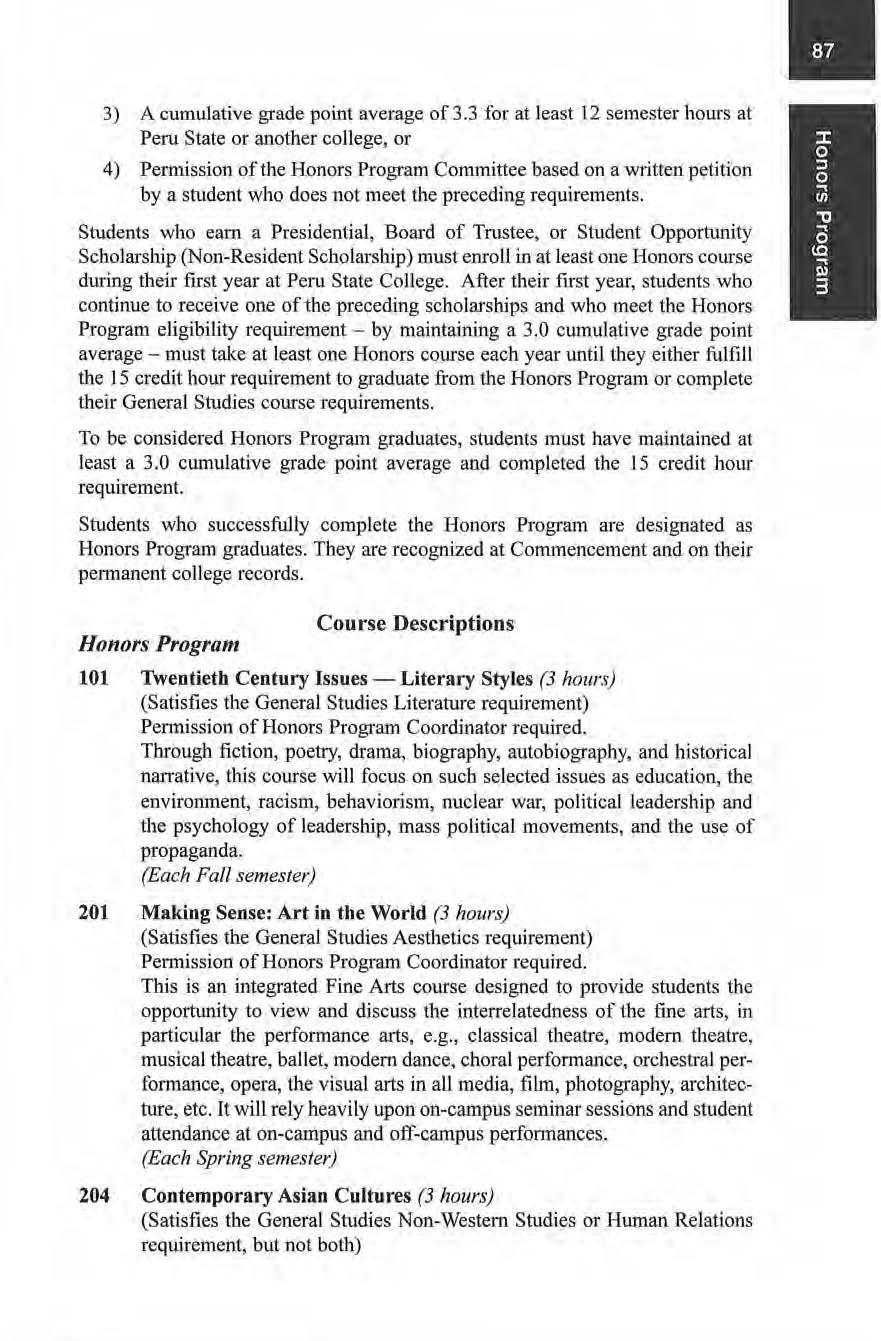
(Eac h Fall semeste, )
201 Making Sense: Art in t he World (3 hours) (Satisfies the General Studies Aesthetics requi remen t)
Pennission of H ooors Program Coordinator requi red. This is an integrated Fine Arts course designed to provi de students the opportunity to yjew and discuss the interrelatedness of the fine arts, in p articular the perfonnance arts, e.g., classical theatre, modem theatre, musical theatre, ba llet, modem dance, choral performance, orch estral perfonnance, opera, the visual arts in all media, film, photography, architecture, etc It will rely heavily upon on-campus seminar sessions and student attendance at on-campus and off-campus perfonnances.
(Each Spring semester)
204 Con temporary As ian Cu l tures (3 hours)
(Satisfies the General Studi es Non-Western Stud ies or Hwnan Relations req ui rement, but not both)
Permission of Honors Program Coo rd in ator required.
This course will introduce societies and cultures of the Far Eastern coun. tries wi th emphasis on Japan , Korea, and China. The course cove rs St1ch topics as the group, relativism , educat ion, business, re ligion, role of wo men, and psycho logical traits. In addition, students will look at the cwTent issues affecting the United States and Asian countries.
(Each Spring semester)
205 Science and Society (3 hours)
(Satisfies one of the Ge nera l Stud ies Life Science course requirements)
P er m iss ion of Honors Program Coo rdi nator required. ihis course will focus on the scientific method and the impact that science has on society and individuals. To p ics to be considered w ill be the relationships of science, ethics, politics, moral issues, and societal goals. Students will read pub li shed articles , write about, and discuss the topics of th is class Th e course topics wi ll be considered in light of a single discipline within science, evolutionary bio.logy.
(Each Spring semester)
212 Introduction to Non-Western Mus ics ( 3 hours)
(Satisfies the General Studies Non-Western Studies requirement)
Permission of Honors Program Coordinator req ui red.
This course is an introduction to ethnomus icology in which the student will leam to expe1ience and understand music in the context of hum an li fe. Students wi ll experience and anal yze the mus ics of Africa, Native America, Black America, Asia, the Near East, the Pacific, and Eastern Europe . TI1is course wil l also provide the stud ent the tools with whi ch to discover the me anjngs of music in the Iife of any soc iety
(As needed)
220 Usin g Metaphors to Understa nd Economic Thought (3 hours)
(Satisfies the Genera l Education American Studies r equirement)
Permission of the Honors P rogram Coordinator required
This course wi ll examine metaphors that are used in vario us disciplines to enhance unders tanding of the human cond iti on. The p rim ary focus is on the development ofwestem thought , w ith special emph asis on econom ic institutions. This course wi ll draw upon economics, western h istory and literature, evolutionary biology, and Newtonian physics.
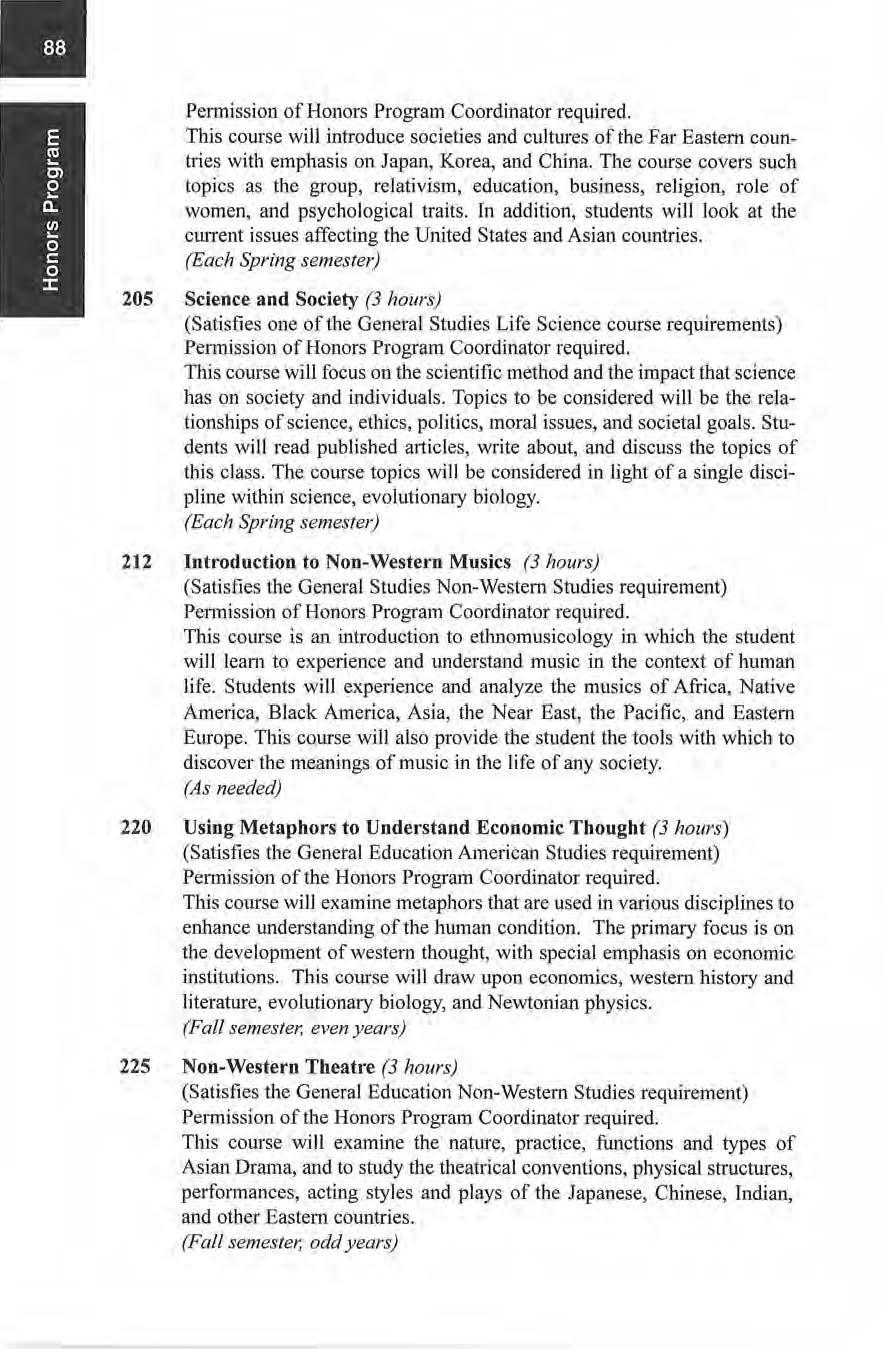
(Fall semester. even years)
225 Non -Western Theatre (3 hours)
(Sa tisfies t he Genera l Education Non-Western Studies requfrement)
Permission of the Honors Program Coordinator requi red.
Th.is course wi ll examine the nature, pract ice, functions and types of Asian Drama, and to study the theatrical conve ntions, physical structures, performances, acting sty les and plays of the Japanese, Chinese, Indian, and other Eastern countries.
(Fall semeste1; odd years)
296
Biology and Social Debate (3 hours)
(Satisfies the Life Science and laboratory component requirement)
Permission of the H onors Program Coordinator required. The objectives ofthis course are to increase the student's level of interest in and understanding of CUlTent biology topics which are a part of their everyday life. It will examine the basis of social conflicts which have arisen, o r which may arise, through research in the biolo gical scienc es. Discl1ssions of these conflicts will lead to a discussion of their scientific background.

(As needed)
400 Ethics and Social Justice (3 hours)
(Satisfies the General Studies Western Studies requirement)
Permission of the H'onors Program Coordinator required. Th is course examines contrasting concept ions of social justice and the ideal soc iety as these appear in some of the major thinkers in the tradition ofWestem ethical philosophy.
(Eac h Fall semester)
The pmpose of College 101 is to introduce the new student to information and ski lls pertaining to coJlege success. Among the subjects covered are academic expectations and planning, study skills, time management, financial aid, substance abuse, and diversity issues.
The purpose of College 400 is to provide credit-bearing career development opportunities, espec iaJly job search skills.
Course Descr iptions
College
101
New Student Experience (I hour)
This course is an introduct ion to college success skills. It is a graduation requirement for all on-campus degree-seeking st11dents with fewer than 30 hours at time of admission, unless subject to waiver.
(Each semeste1)
400
Career Strategies ( 1 how)
This course is designed to teach job search techniques, an educati onal approach for professional development. Open to al l majors.
(Each semester)
Stephen Sy lvester, D.A.
Interim Dean of Arts and Sciences
Professor of History
Mary Adams, Ph.D. Assistant Professor of'English
Ken Anderson, M.F.A. Professor of Art
Michael Barger, Ph.D. Assistant Professor of Biology
Eric Brown, B .A. Tnstructor of Mathematics and Computer Science
William Clemente, Ph.D. Professor of Engli sh and Department Head of Literature
Ri chard C lopton, Ph.D. Associate Professor of Biology and Department Head of Natural Science
Sara Crook, Ph.D
Associate Professor of History/ Political Science
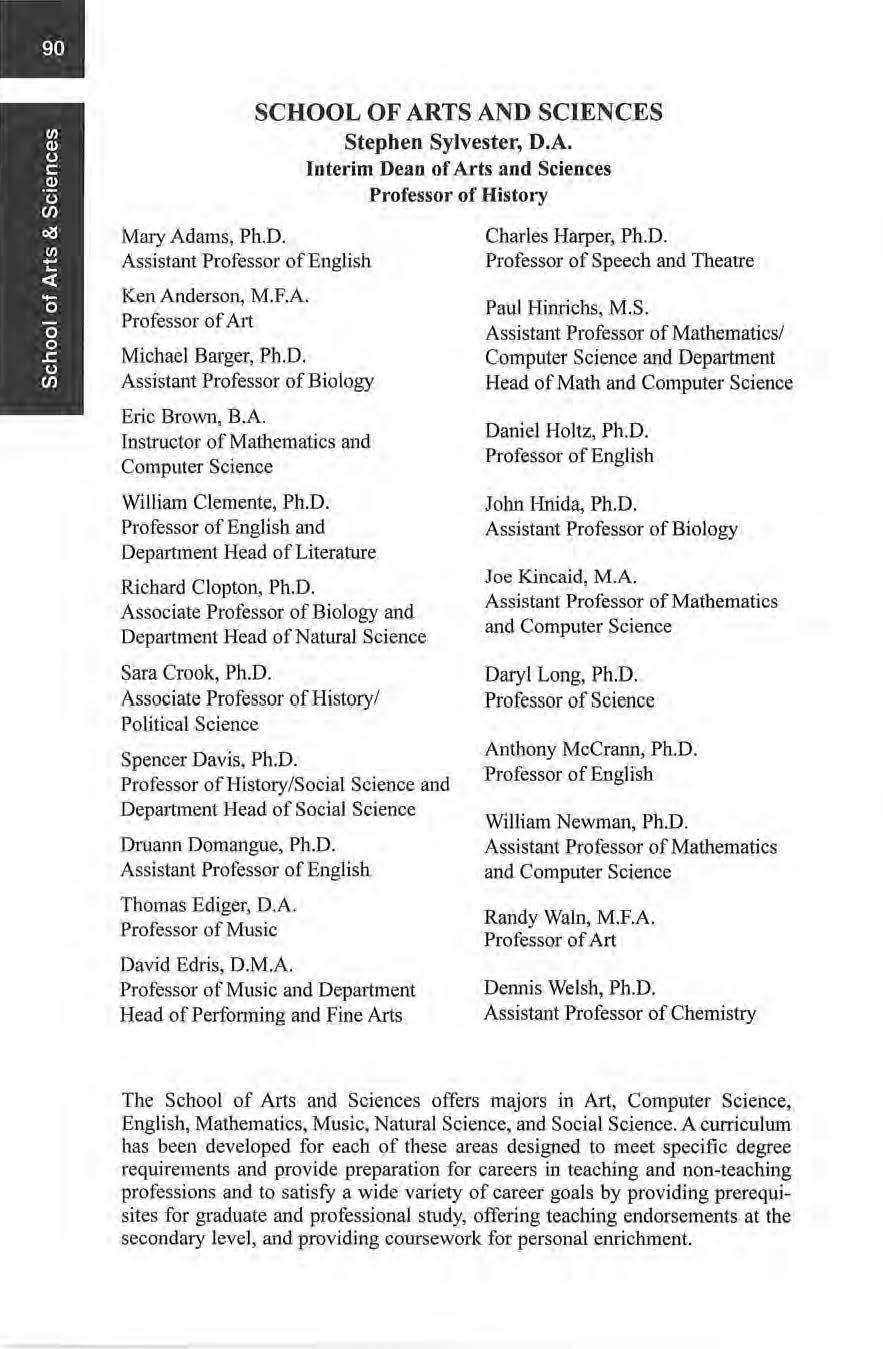
Spencer Davis, Ph.D.
Professor of History/Socia l Science and Department Head of Social Science
Dr-uann Domangue, Ph.D.
Assistant Professor of Engl ish
Thomas Ediger, D.A Professor of Music
David Edris, D.M .A. Professor of Music and Department Head of Perfonning and Fine Arts
Charles Harper, Ph.D. Professor of Speech and Theatre
Paul Hinrichs, M.S. Assistant Professor of Mathematics/ Computer Science and Depa1tment Head of Math and Computer Science
Dani el Holtz, Ph.D. Professo r of English
John Hnida, Ph.D. Assistant Professor of Biology
Joe Kincaid, M.A. Assistant Professor of Mathematics and Computer Science
Daryl Long, Ph. D. Professor of Science
Anthony McCrann, Ph.D. Professor of Engli sh
William Newman, Ph.D. Assistant Professor of Mathematics and Computer Science
Randy Waln, M.F.A. Professor of Art
Dennis Welsh, Ph.D. Assistant Professor of Chemistry
The School of Arts and Sciences offers majors in Art, Computer Science, Eng lish, Mathematics, Music. Natttral Science, and Social Science. A curriculum has been developed for each of these areas designed to m eet specific degree requirements and provide preparation for careers in teaching and non-teaching professions and to satisfy a wide variety of career goals by providihg prerequisites for graduate and professional study, offering teaching endorsements at the secondary level, and providing coursework for personal enrichment..
Areas of specialization (options) within th e Computer Science major include Business Applications, Computer Science Supplemental Endorsement and Technical Options. T he English major includes English or Language Arts, Natural Science major includes Biology, Biological Science, Wildlife Ecology, Chemistry, Natural Science, Nuc lear Technology, and Physical Science Social Science major includes History and the broader area of Social Sciences. Majors in the visua l and performing arts areas provide various teaching and non-teaching options in Alt and Music.
Teacher education programs for endorsement in Art, Biology, Chemistry, Computer Science, History, Language Arts, English, Vocal/Instrumenta l Music E ducation, Elementary Vocal Music Education, Natural Science, Mathematics, Physical Science, and Social Sc ience are also avai table The Computer Science endorsement is designed to complement endorsements in other areas
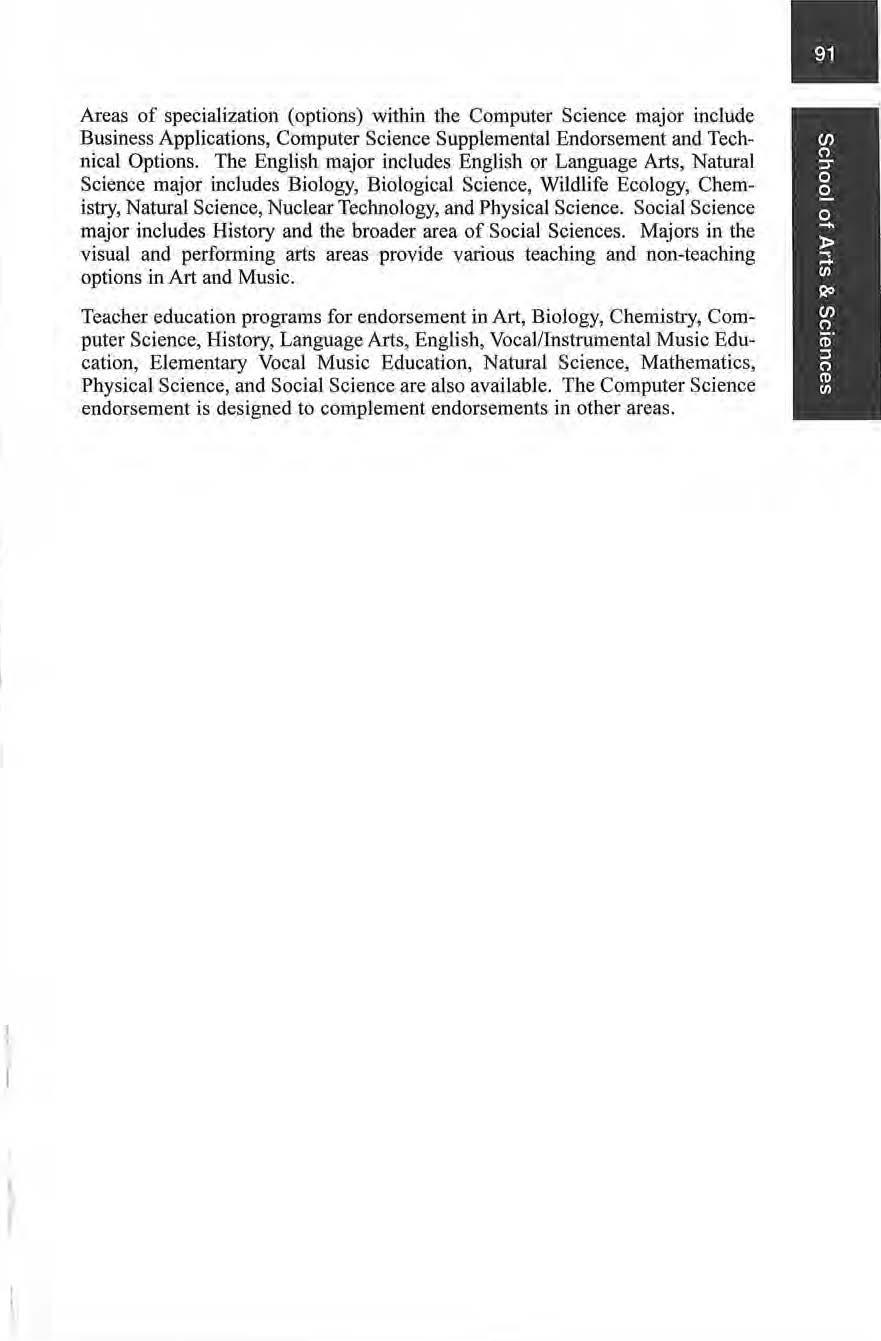
Art Major (K-12 Field E ndorsement* or Non-Teaching)

Art IO I Drawing I
Art I 02 Drawing II
Art 203 2-D Design Art 204 3-0 Design Alt 206 Art Appreciation Art 210 Watercolor Alt 22 1 Printing Processes Art 300 Potteiy
** 308 Art Exploration
Art 310 Scu lpture
Art 31 l Painting
Art 317 Art History I
Art 318 Art History n
Art 325 Figure Drawing
Art *** 400 Senior Exhibition
Alt 226 Photography
Art electives (select eleven (11) hours from the following)
Art 300 Pottery (in additi.on to required 3 hours)
Art 3 10 Sculpture (in addition to required 3 hours)
Art 311 Painting (in add iti on to required 3 hours)
350 Studio Activities
Art 498 Special Topics in Art (1 t o 4 hours)
* Students preparing to teach K- 12 Art are required to take1he Education Core and the Secondary Ecluca!ion Option; The practicum and student teaching must include experiences with both elementary and secondary s tudents.
** Students taking a non-teaching option in Art may substitute any art elective for Al1 308.
*"'* An 400 Senior Exhibition produces one credi t hour and fs a graduation requirement for ALLAJ1 Majors.
Sel ect nine (9) hours from the following:
l 01
1
2
Select nine (9) hours from the following course s:
After completing a core curriculwn, two options are avai l able to students int erested in a Computer Science major, the Technical option and the Business Application option. Stude nts completing a Co mpute r Sc ience degree must a lso take Math 340 in
Stuilies.

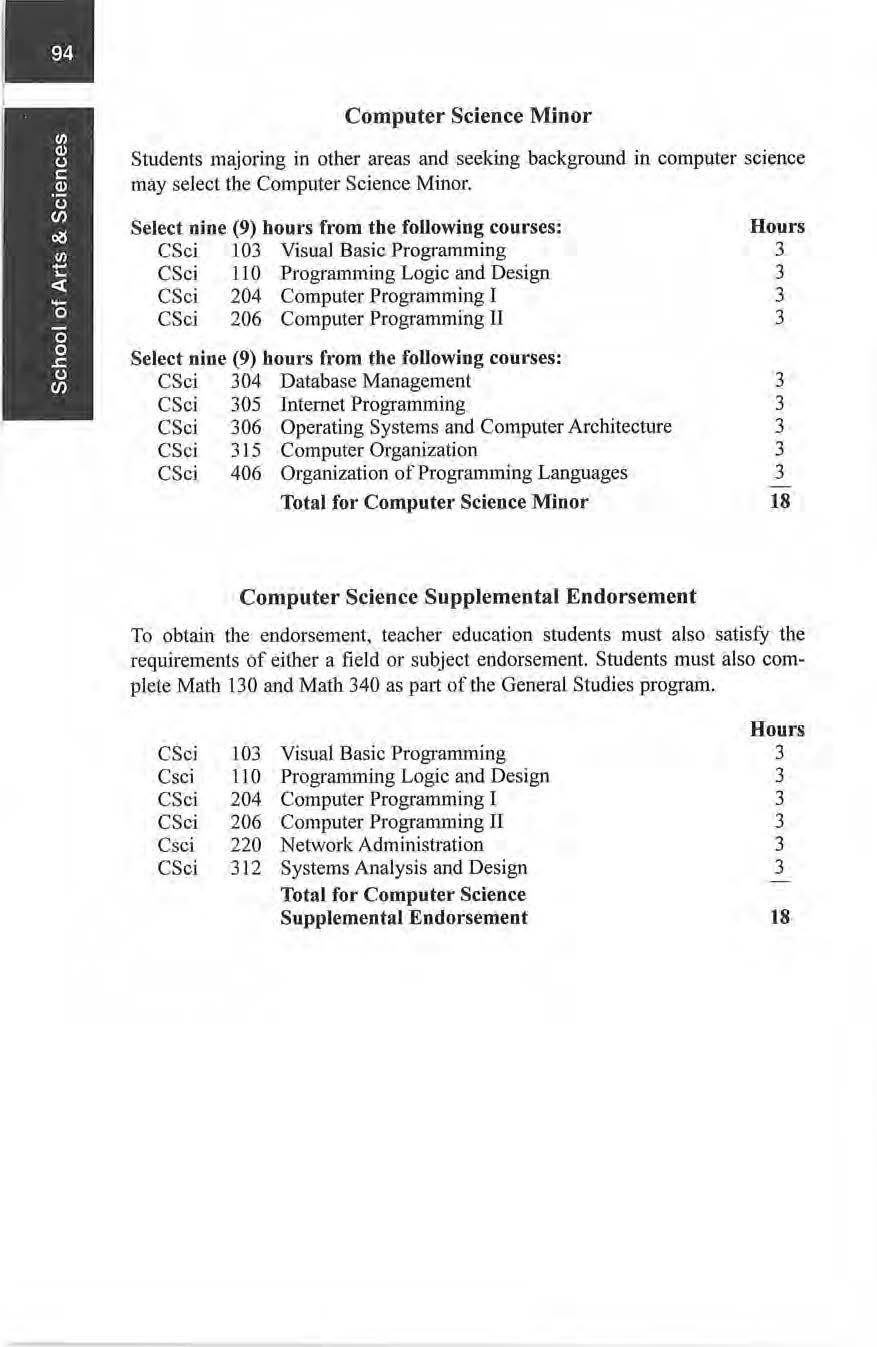
Students majoring in other areas and seeking background in computer sc ience may select the
Science Minor.
To obtain the endorsement, teacher education students must also satisfy the requirements of either a field or subject endorsement. Students must also complete Math 130 and Math 340 as pa1t of the General Stud ies program.
Se lect twe lve (12) hours from the fo llowing courses with at least one course from each a.-ea:

Srudents preparing to teach Engl ish Language Arts are require d to take the Educati o n Core and the Secondary Education Option . ** Students preparing to teach English Language Arts only.
"* * Students preparing to Leach in m iddle school a re required to take Eng 203.
(7-12 Subject Endorsement* or No n-teach i ng)

Select twelve (12) hours from the following courses with at l east oue course
• Studen ts preparing to teach English a re req uired to take the 8 duca tion Core tuid the Secondary Education Option. 0 Student s taking a non-te aching op tio11 in English may subst itute Eng 305 and Ed uc 434 for any cow·se from the Eng lis h electives
take Eng
Select six (6) hours from the E nglish S ubject E ndorsement or Nontea c hing electives - 3 hours must be from either Britis h Literature or Mo dern Literature:
After declaring the E nglish/Language Arts major, each s tudent shall begin to compile eight exams or papers w hich w ill make up the comple ted Senior P ortfolio. The En g li sh D epartment will prov ide specific detail s to m~jors on the required submissions. During the first semester of the junior year, majors must sch edule an interview with a m inimum of two English d epartment fac ulty members to discuss their perceptions regarding culTent personal abilities and eirpectations for the future, as well as to receive s u ggestions from the faculty regarding areas where they may need improvem e nt. Toward the end of the final semester of the senior year, majors will schedu le an exit interv iew with t he English department for portfolio assessment.
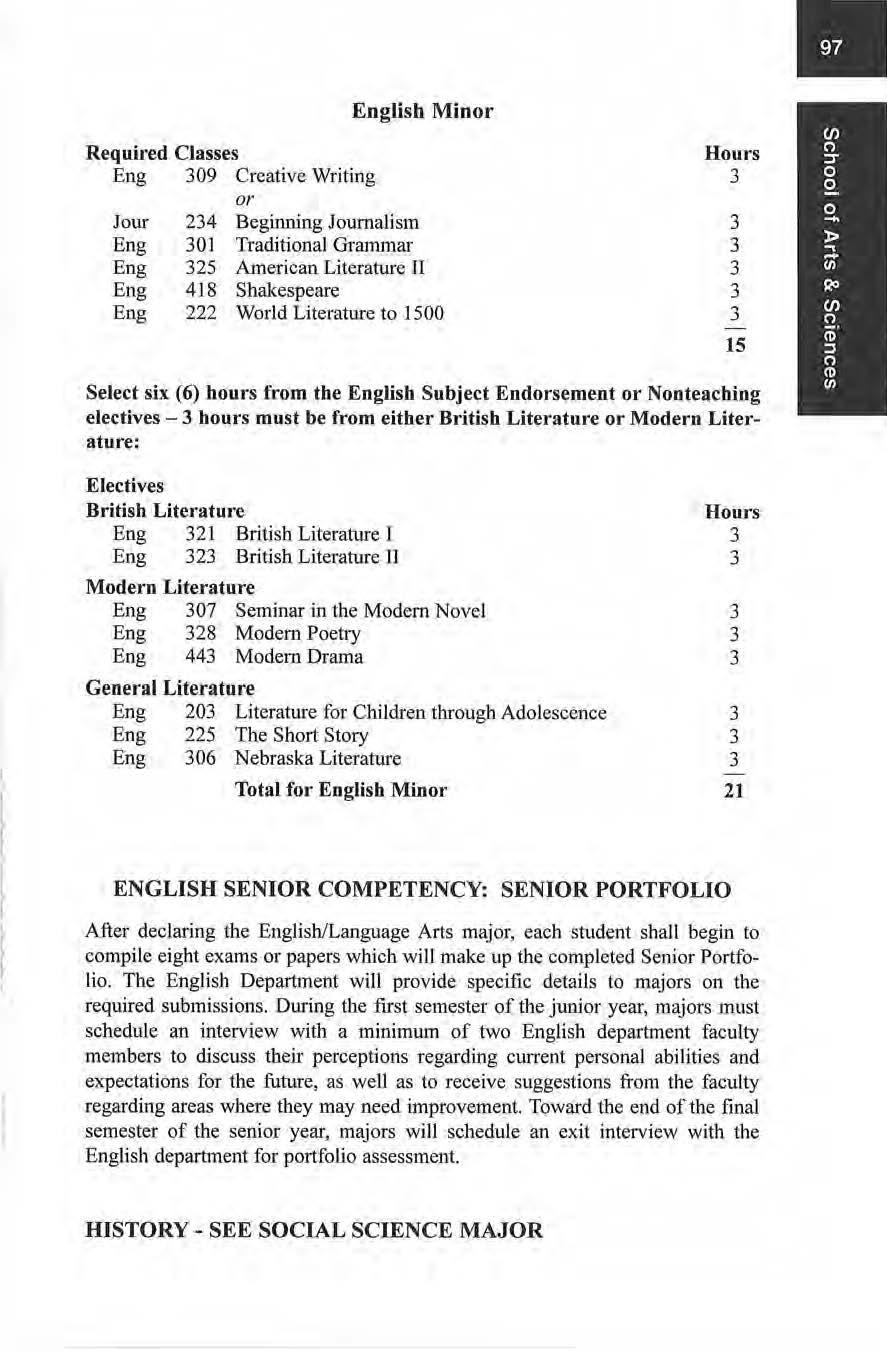
The Mathematics Major has two options, a Mathematics option and a Mathematics Education option (fie.Id end orsement). Stu dents completing a ma themat ics degree must also take Math 340 in General St11dies .
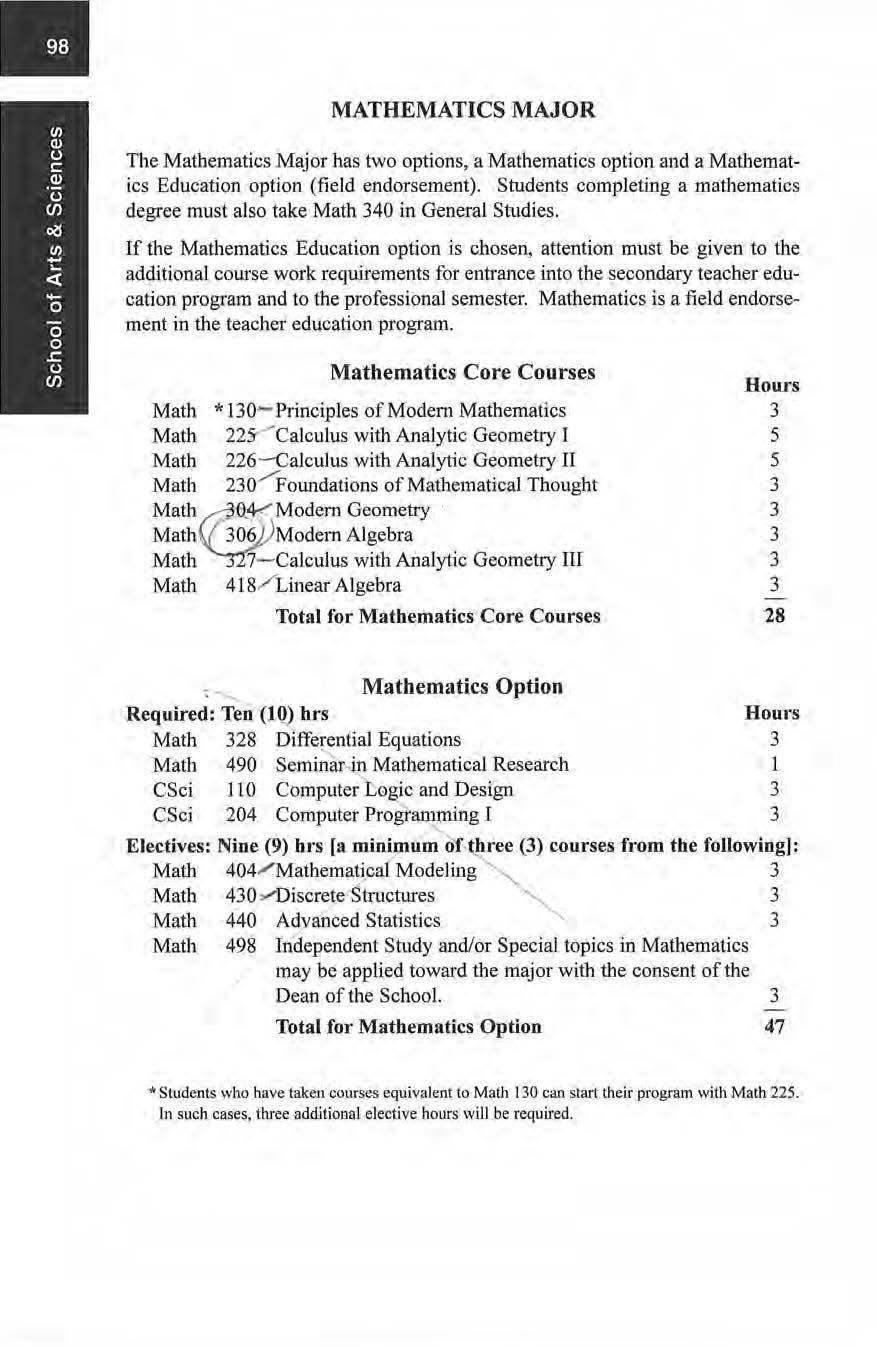
If the Mathematics E ducati on option is chosen, attention must be given to the addi tional cow·se work r equirements for entran ce into the secondary teacher education pro gram and to the professional semester Mathematics is a field endorsement in the teacher education program.
* Students who have taken courses equivalent to Math 130 can start their program with Math 225. In such cases, three additional elective ho11rs will be re<juired.

The Music Minor (Non-teaching) option and the Music-Marketing (Non-teaching) option are open to all students who have prior experience reading music and have the ability to perform on a wind or percussion instrument, piano, or as a vocalist. Those students seeking to eam the Music-Education (K-6 or K-12 endorsements) or Music-Performance (Non-teaching) options wilJ be conditionally accepted into the program . Besides needing to have the ability to read music and perform, students must also satisfy two levels of qualification before being fully accepted into the music education or perfonnance programs.
1. The student must have achieved at l east a 2.5 overall GPA after completing two consecutive semesters.
l. The student must be free from disciplinary probation.
2. The student must have achieved at least a 2.5 overall GPA after completing four consecutive semesters
3. The student must achieve on the Pre-Professional Skills Test (PPST) a minimum score of 170 - reading comprehension, 17 l - math, and 172composition.
4. The student must submit letters ofrecommendation from three faculty members (two should be music faculty) who are in a position to assess the sn1dent as a prospective teacher.
S. The student must complete an interview conducted by a faculty member.

1. The student must be free from disciplinary probation.
2. The student must have achieved at least a 2.5 overall GPA after completing four consecutive semesters.
3. The student must submit letters of recommendation from three faculty members (two should be music faculty) who are in a position to assess the student's attitude, motivation, and enthusiasm toward music perfonnance.
4. After four consecutive semesters the student must perfonn a qualifying audition consisting of a prepared piece and a demonstration of fundamental music perfonnance sk,llls, such as sight reading, scales, or other skiJl s appropriate to the performance medium.

I. AU music majors are required to participate in a large ensemble each semester of full-time enrollment even though on ly a limited number of credits may count toward meeting graduation requirements.
2. Music majors are required to take final examinations in their major applied area before a jury of mu si c faculty members at the end of each semester.
3 . All music majors are required to register for Muse 100 each semester until they have comp leted the established number of semesters ofrecital attendance.
4. Music-Education majors are required to have at least two semesters of private voice and private piano instruction for certification purposes.
5. Students pursuing either of the Music-Education majors are required to pass a functional piano examination (Muse 200) before enro lling in student teaching. During the semester students are enrolled for Muse 200, they should concurrently be enrolled for Applied Piano.
6. Music-Education (K-12 Vocal/lnstnunental) majors are required to give a senior recital (Muse 440). Music-Perfonuance majqrs are required to give a junior reci.tal (Muse 340) and a senior recital (Muse 440). Students should concurrently be enro lled for applied music dUting the semester they are enrolled for the junior or sen ior recital.
7. Music-Performance majors during the freshman year are limited to taking only one hour of applied music instruction in t b e major app lied area. Commencing with the sophomo re year, Music-Performance majors will need to take two (2) hours of private music instruction in the major applied area eacl1 semester in order to complete the required number of hours within the four ( 4) years of attendance.
* If the major applied area is piano, then two t2) hours of applied voice or applied in strument will be substituted for the two (2) hour applied piano requirement.

• Students preparing t o teach K-6 Music only must complete the Education Core. Stu dents preparing to teach K-6 Music and Elementary Education must complete the Education Core and the Elementary Education O ption
** If the major app li e d area is piano, then three (3) hours or applied voice or appl ied instrument will be substituted for the three-hour applied piano requirement. Regardless of what the major instrument is, the student must have experience in voice, :i nstrument, and piano
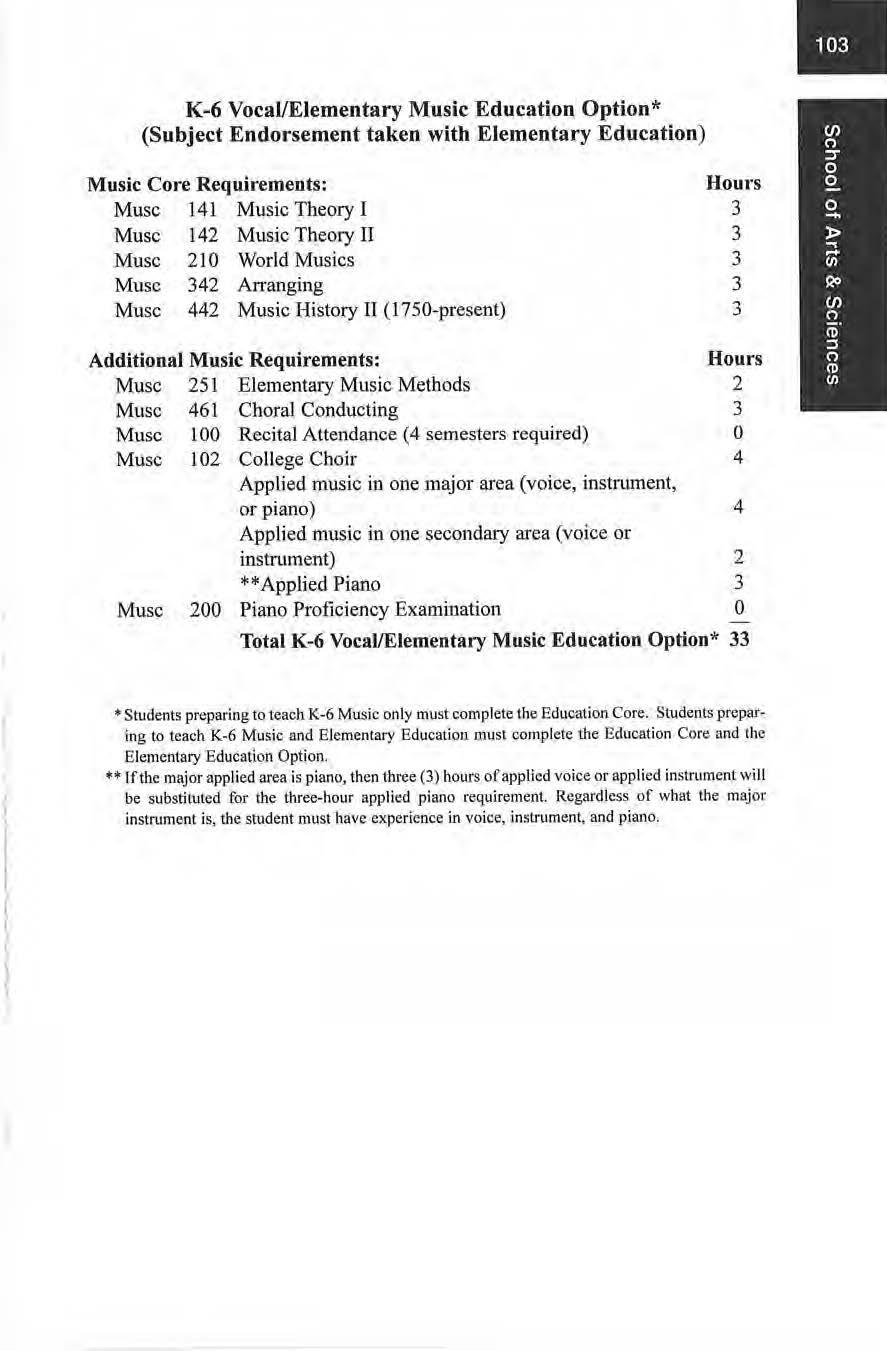
K-12 VocaVl nstrumenta l Music Ed ucation Option * (Field E ndorse ment)
Musk Core Requfrements:
Muse 141 MusieTheoryI
Muse 142 Music Theory II
Muse 210 World Musics
Muse 342 Arranging
Muse 442 Music History IT (1750-present)
Add ition al M usic Requirements:
Muse 241 Music Theory III
Muse 242 Music Theory lY
Muse 251 Elementary Music Methods

Muse 321 Choral Techniques
Muse 322 Band Techniques
Muse 351 Brass Instrument Techniques
Muse 352 Woodwind Instrument Techniques
Muse 362 P ercussion Instrument Techniques
Muse 441 Music History l (Antiquj ty - 1750)
Muse 46 1 Choral Conducting
Muse 462 Instrumental Conducting
Muse 100 Recital Attendance (6 semes ters requfred)
Large Ensemble Performance (se lect Muse l 01 College Band or Muse 102 College Choir)
Small Ensemble Performance (select Muse I05 Brass Ensemble or Muse l 06 Woodwind Ensemb le or Muse I 07 Madrigal Singers or Muse 108 Percussion Ensemble)
App li ed mus ic in one major area (voice, instrument, or piano)
Applied music in one secondary area (voice or instrument)
** Applied Pian o
Muse 200 Piano Proficiency Examjnat ion
Muse 440 Seruor Recital
Total K-12 Vocal/Ins trum enta l Music Educatio n Option*
• Students preparing to teach K-12 Vocal/\nstrumeJ1tal Music must take the Ed ucation Core and the Seoonducy Education Option. T he practicum and student teaching must include experiences with both eleme ntary and seco ndary students.
** If the mujor uppli ed area ls piano , then three hours of applied voice or applied instrument will be s ubs tituted for the three-ho ur applied piano require ment. Regardless of what the major instrument is, the student must have eXperience in voice, instrument, and piallo.

* If the major applied area is piano. then two (2) hours of applied voice or applied inslnamenl will be substi tuted for the two (2) hour applied piano requirement.
If the major applied area is piano, tben two (2) hours of applied voice or applied in strument will be substituted for tbe two-hour appl ied pfono requirement.
The Natural Science Bachelors Degree Program (B.S., B.A.) consists of a core of courses to provide the sti1dents with a general background. In addition to completing these core courses, the student must also select and complete one of the several options within the cunicolum. These options will allow the student to work towards one of a variety of career and occupational goals.
Natura l Science C o re Co urses
Biol 102 Introductory Z oology
Chem 101 General Chemistry I
Choose one earth science cours e from the following: ESci 211 Principles of Earth Science
(required for Nattu·nl Science and Physical Science)
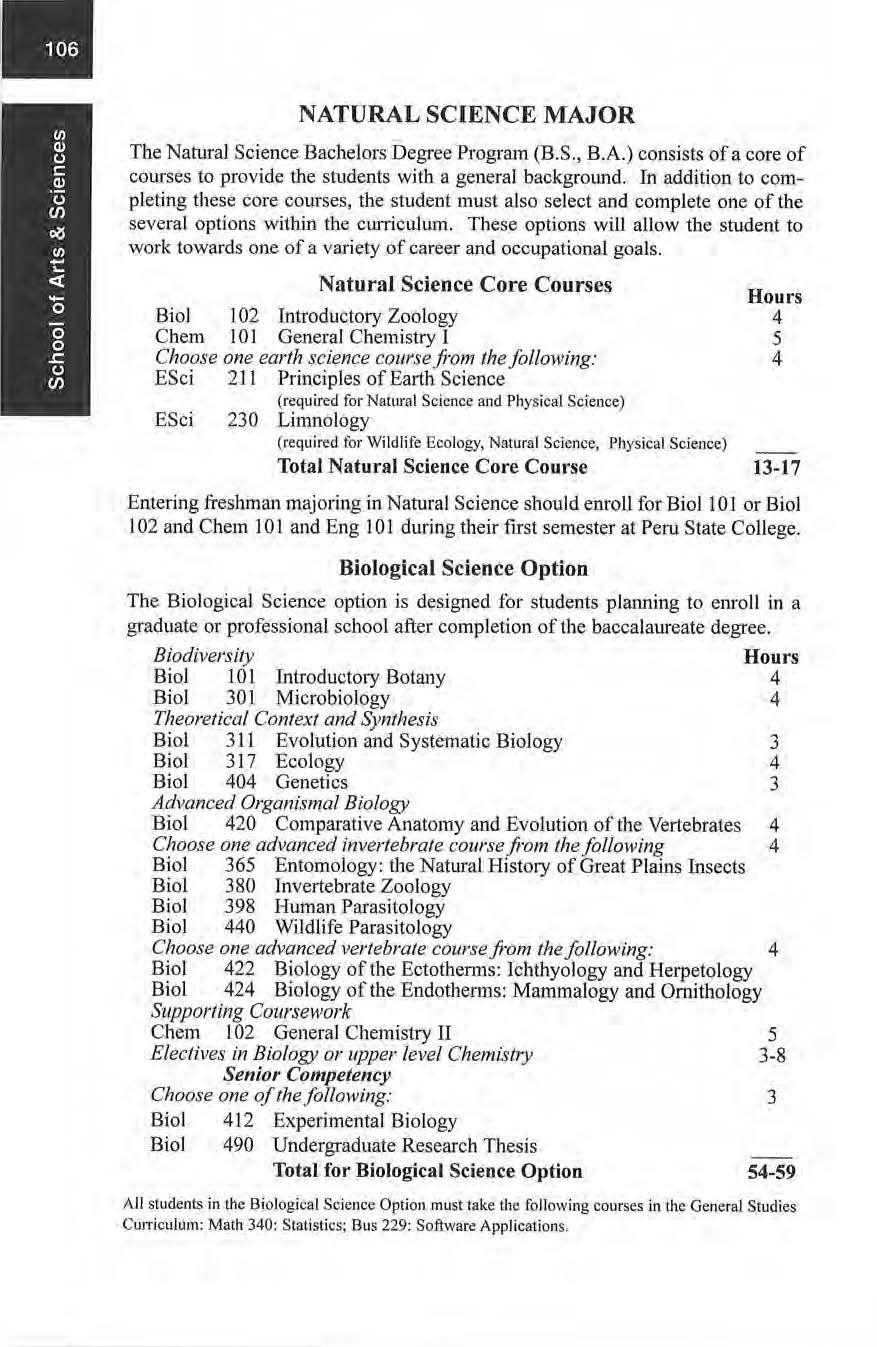
( required fo r Wi ld l ife Ecology, Natural Science, Physical Science)
l Nat ura l Scie nce Co re C ourse
Entering freshman majoring in Natural Science should emoll for Biol 10 I or Biol l 0 2 and Chem IO I and Eng IO l during their first semester at Peru State College.
Bi olo gical Scie nce Option
Th e Biological Science option is desig11ed for students planning to enroll in a graduate or professi o nal school after completion of the baccalaureate degree..
All students in the Biological Science Option must take the following courses In the General Studies Cunicu lum : Math 340: Statis tic s; Bus 229: Software Applicat i ons
The Wi ld life Ecology opt io n is designed for students interested in careers as conservati on o ffic ers or park rangers.
All students in the Wildlife Ecology Option must take the fo llowin,g courses in the General Studies CU rrlc ulum: Math 340: Statis tics; Bus 229: Software Applications.
A Bi ology Subject Endorsement is offered as part of the teacher e ducation program
All students in the Biology Subject Endorsement Option must take the following courses in the Genera l S tudies C urri cu lum : Math 340: Statistics; Bus 229: Softwore Applications ,

A Chemistry Subject Endorsement is offered as part of the teacher education program.
All sl11de nt s in the Chemistry Subject Endorsement Option mus[ take !he following courses in the General Studies Curriculum: Math 340: Stat is tics; Bus 229: Software Applications.
The requirements listed represent both the education and non-education degree programs. lf the teaching endorsement is chosen, attention must be g iven to the additional courses required for entrance into the teach er educati on program professional semester. In the teacher education program, Natural Science is a fie ld endorsement.
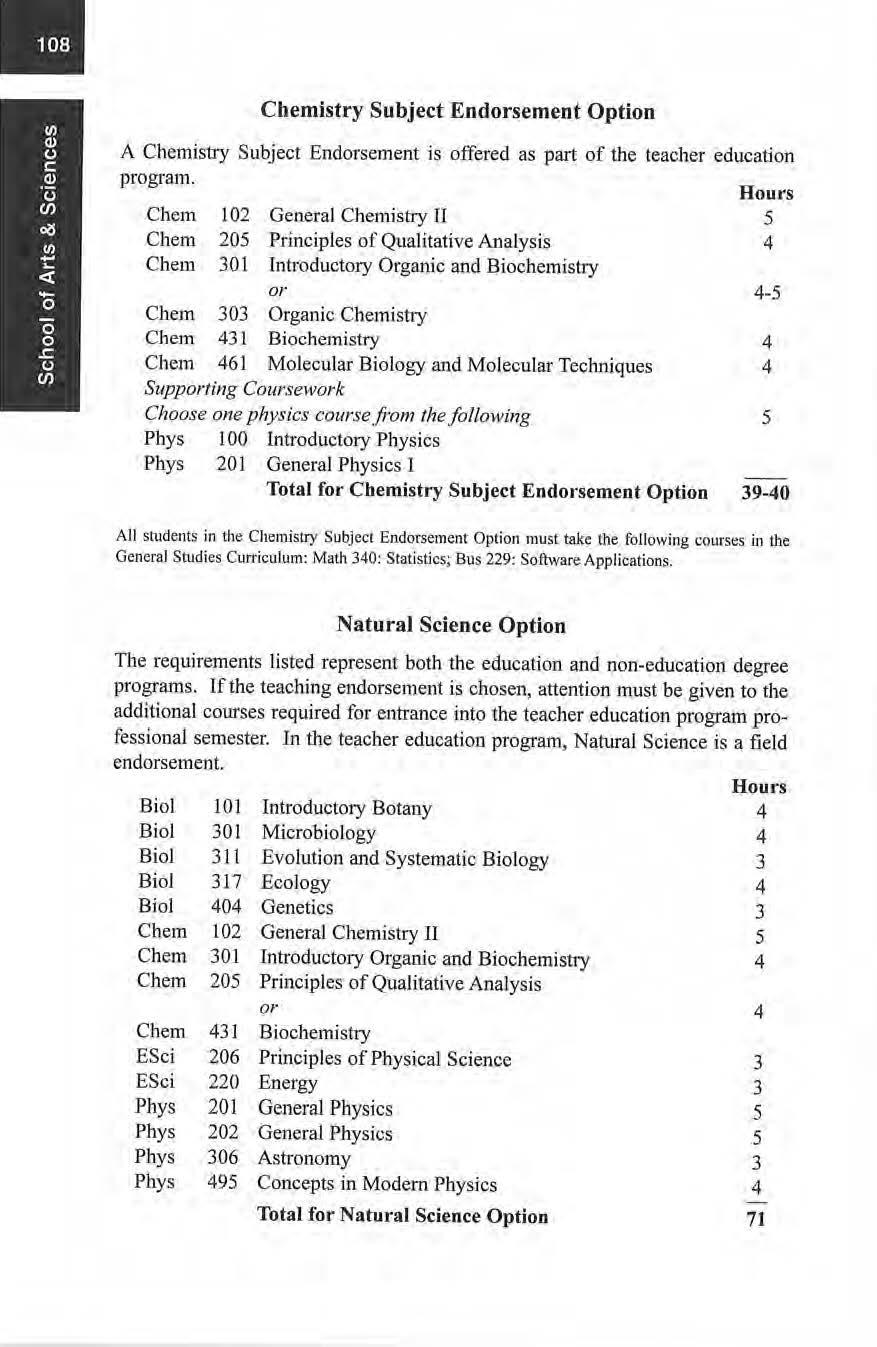
1n addit ion to the specific coursework requirements listed below, the candidate for this option must also be a licensed reactor o perator. Questions regarding this program should be directed to tbe Dean of the Schoo l of Arts and Sciences.
The requirements listed represent both the education and non-education degree programs. If the teaching endorsement is chosen, anention must be given to the additional courses required for entrance into the teacher education program professional semester. 111 the teacher ed ucation program, Physical Sci.ence is a field endorsement. Non-e ducati on majors must give attention to minimum upper-level hour graduation requirements when planning a course of study.


Excluding the 9-hour social science cognate area above , select electives in the remaini n g social science cognate areas of Anthro-


The tran sfer programs listed in this section may require from one to four years to complete. They do not represent academic majors. Students planning to complete a degree at Peru State mus t satisfy the requirements for a specific academic major in addition to comp leting the requirements for one of these programs. Students in these programs are advised to secure a catalog from the professional school they expect to attend as indivi dual schoo ls may vary in requirements.
The term Pre-Law refers to a student's intention to pursue advanced s tudies at a law school. not to any prescribed major or cu rriculum. Adequate preparation for entrance into a ranking law school requires a bachelor's d egree. Neither the committee on pre-law education of the American Bar Association nor leacLing law schools specify a particular undergrad uate major or prescribe a specific pre-law program , but they do stress the ability to read perceptively, to write intelligently, to use a library, and to evaluate evidence. Success in law schoo l requires intellectual depth and breadth as well as certa in skills and insights relevant to law study. S ince many of the goals of legal education are also the goals ofliberal education, law schools recommend that pre-law students obtain the widest possible undergraduate experience cons istent with the ir professional objectives. Literate, well-informed students with broad general educations tend to succeed in law school. Those students aspiring to enter law school, then, may major and/o r minor in any number of fields that wi ll aid them in attaining the following:
• Compositional slcills and oral presentations ski ll s.

• A broad understanding of th e English language.
• A so lid background of American history and government.
• A broad knowledge of society and irs institutions.
• A fundamental understanding of business, including bas ic accounting skills.
• Critical thinking and the abil ity to rea son.
The undergraduate curriculum of Peru State College provides a sound foundation for pre-law study and offers students an opportunity to challenge and expand their capacities to the fullest. Students planning a legal career should inform their academic advisor of t his fact early in their undergraduate years in order for the students and the advisor to make important decisions regarding the selection of courses. During the senior year the student will need to register for the Law School Admissions Test (LSAT). Acceptance into law schoo l wi ll depend upon many factors, of which scores on the LSAT and grade point average are usually but two. Other factors gen erally considered by law schools i nclude campus and community involvement, work experien ce, and letters of recommendation. The PSC undergraduate experience provides an excelle nt opportu nity to demonstrate strength in these a reas.
*225
*
Philosophy
Political Science
2 01 American National Govemment
202 State and Local Governme nt
* 426 American Constitutional Law
* 468 Public Ad.m inistration
Sociology
20 I Princ ipl es of Soc iology

Speech 254 Pub li c Speaking
357 Interpretat ive Reading
Suggeste d Majo r Fields of Study
Bus in ess
E nglish History
Social Science
*denotes cross-listed courses
The students in this program are advised to secu re a cata log from the professional school they expect to attend as i ndividual schools may vary in requirements for pre-dental an d pre-medical prngrams.
The following courses are suggested for admittance into a dental hygiene p rogram:
The requirements for forestry schools vary. Early in the pre-forestry program students shou ld consult the catalog of the college they plan to attend.

The following program is s uggested as a prereq uisite for entering a college of mortuary science:
The ba s ic arts and sciences requirements for nursing programs vary depending on the school selected and the level of training offered (i .e., diploma , associate degree or baccalaureate degree program). The pre-nm·s.ing stude11ts are urged to obtain a copy of the catalog from the nursing school selected to insure proper planning for transfer. The following courses are suggested for a one-year prenursing program. A second year of coursework may be necessary for students e11teri11g a B.S.N. program.

In add iti on to a total of at least 90 semester hours of credit, students must have completed coursework in the following areas:
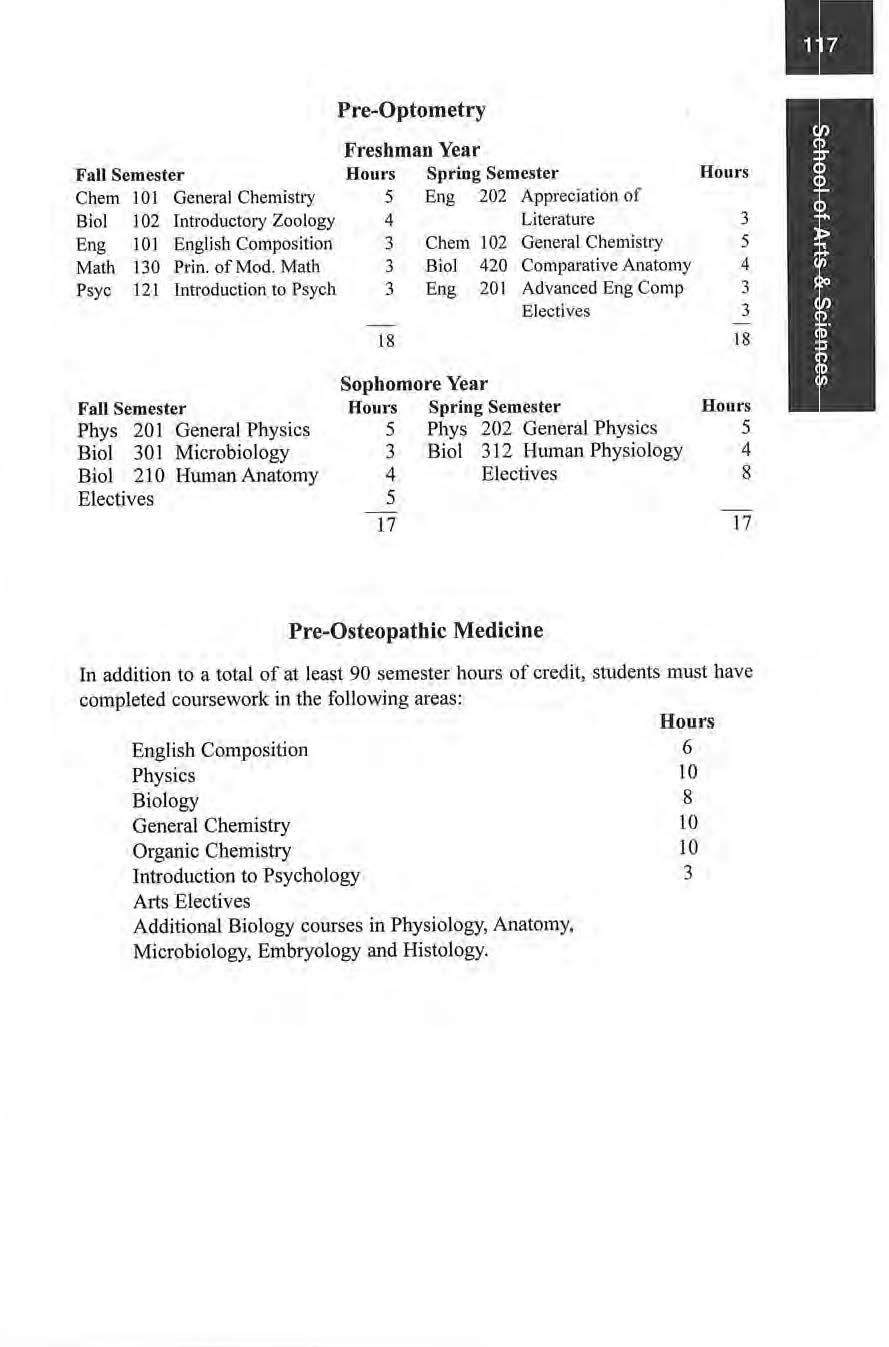
Transfer to a col]ege of phannacy requires a m inimum of 60 semester hours of coursework which must include the following:
Restri cted electives should be from the following areas: f ine and Performing Arts, Social Sciences, and Behavioral Sciences. Additional elect ives should be se lected from the areas of Physics, Chemistry, Computer Science, Mathematics, Business Administration. Students shou ld refer to college phrumacy catalogs for more information.
The fol lowing courses are suggested for students inte rested in P hysical Therapy:
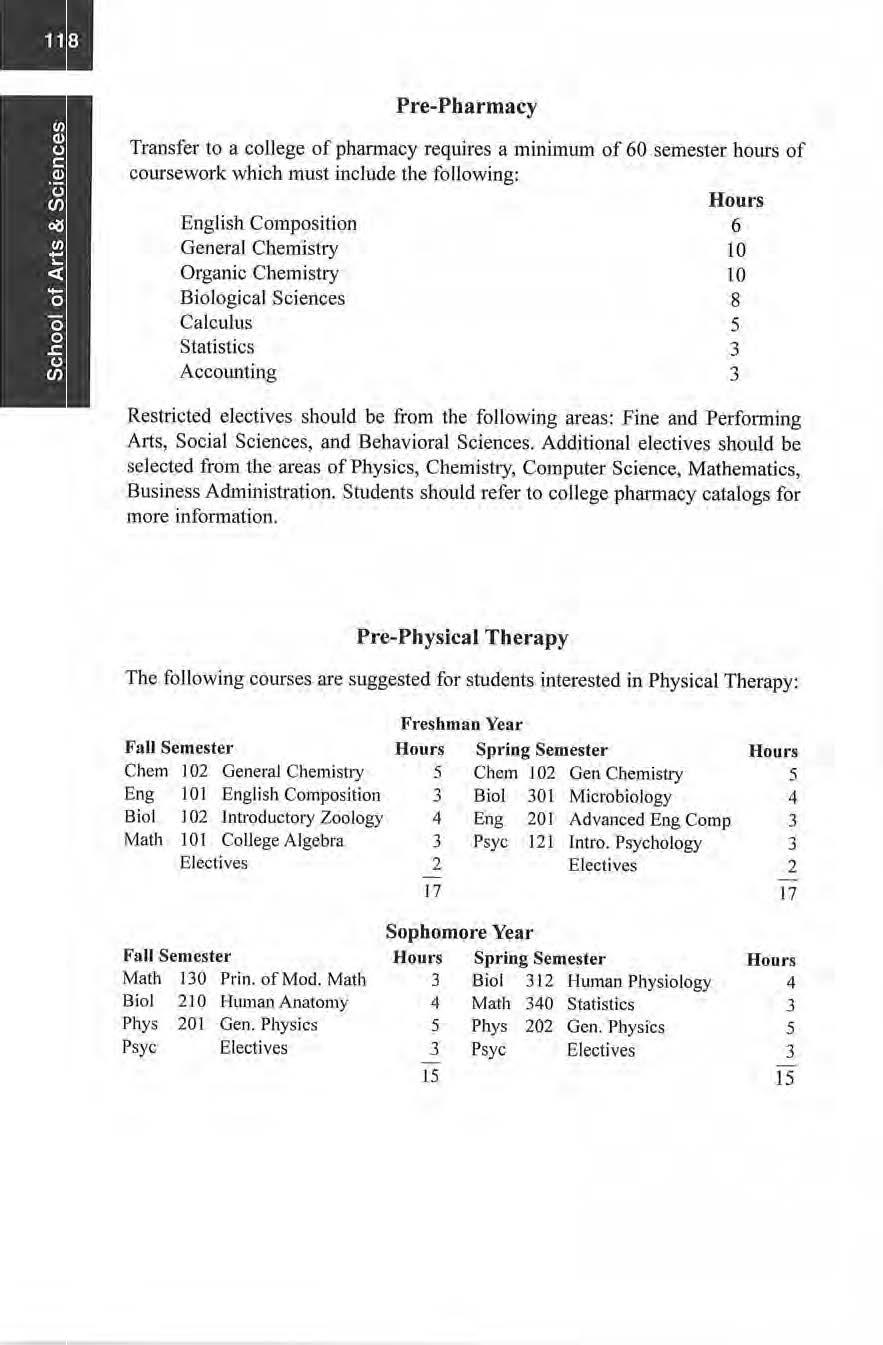
Applicants for most phys ician assistant program s must have satisfacto rily completed a minimum of 90 semester hours including the following courses:
App licants to most co.lieges of pediatric medicin e must have completed the fo llowing prerequisite courses:
TI1e following coursework is suggested for student s in radiation therapy, radiography, nuclear medi cine technology, or medical sonography.
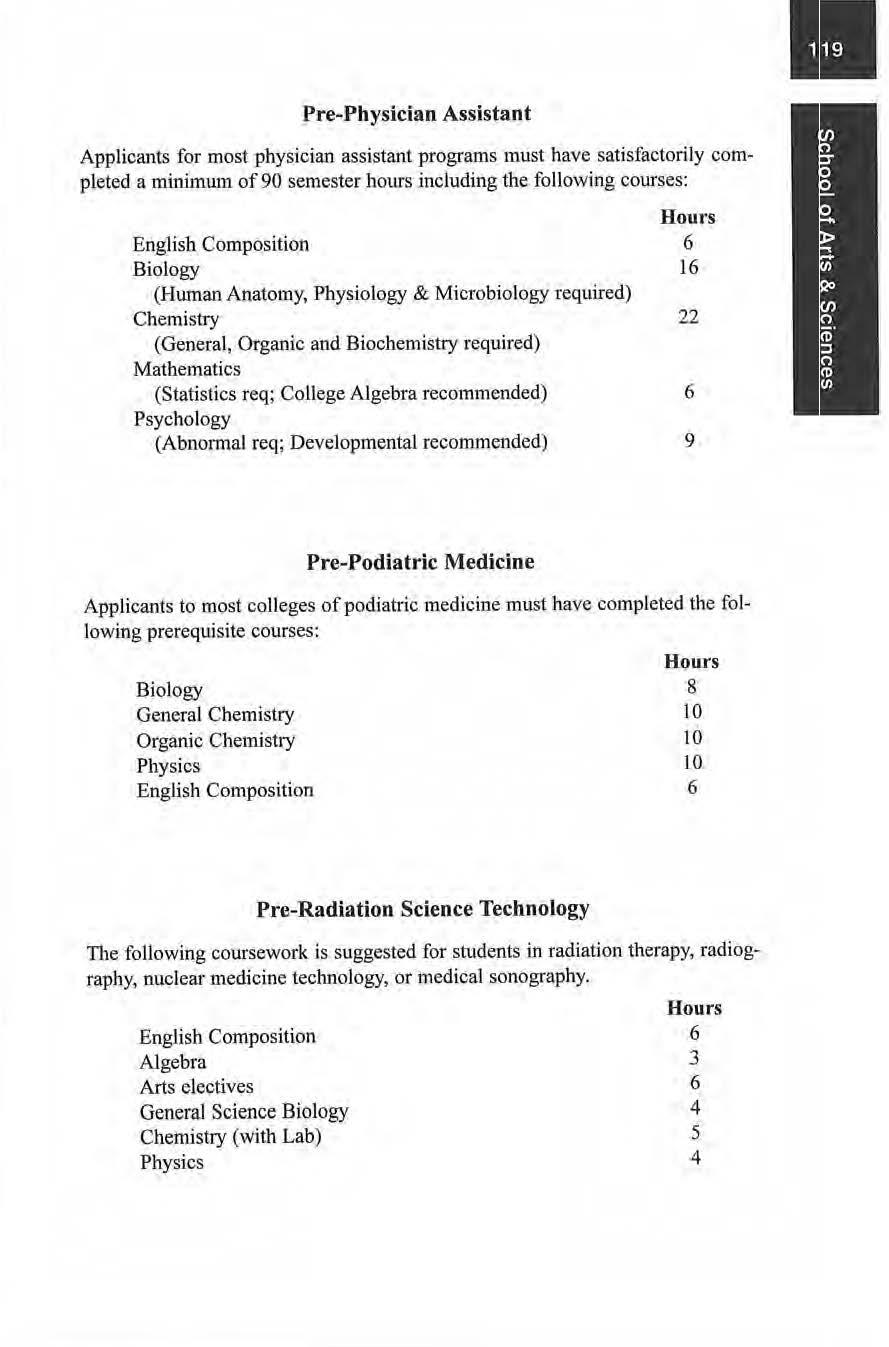
The following co urses are suggested for students interested in entering a bacca laureate program in respiratory therapy.

During the first three years, the student must satisfy the General Studies r equirements for graduation, complete a minimum of 90 semester hours applicable toward a baccalaureate degree, complete 24 semester b.ours of
16 hours of Biology, and at least one course each in Mathematics and Physics. The fourth year, which consists of a full twelve-month program, is spent in residence at an approved school of Medical Technology that awards the degree. Suggested

2 Plus 2 Agreeme nt
The 2 Plus 2 Agreement in Natural Resources is a joint program between Peru State College (PSC) and the Colleges of Agricultural Sciences and Natura l Resources (CASNR) at the University of Nebraska-Lincoln (UNL) which allows PSC students to continue their education and study in a major leading to a Bachelor of Science Degree in Natural Resources The agreement provides a basic knowledge plus specialized course work in natural resources. A student enrolled in this program may transfer all satisfactorily completed academic credits identified in the coW"se schedule listed below, and enter CASNR to study in a major leading to a Bachelor of Science Degree in Natural Resources. Details of the agreement may be obtained from the Dean of Arts and Sciences.
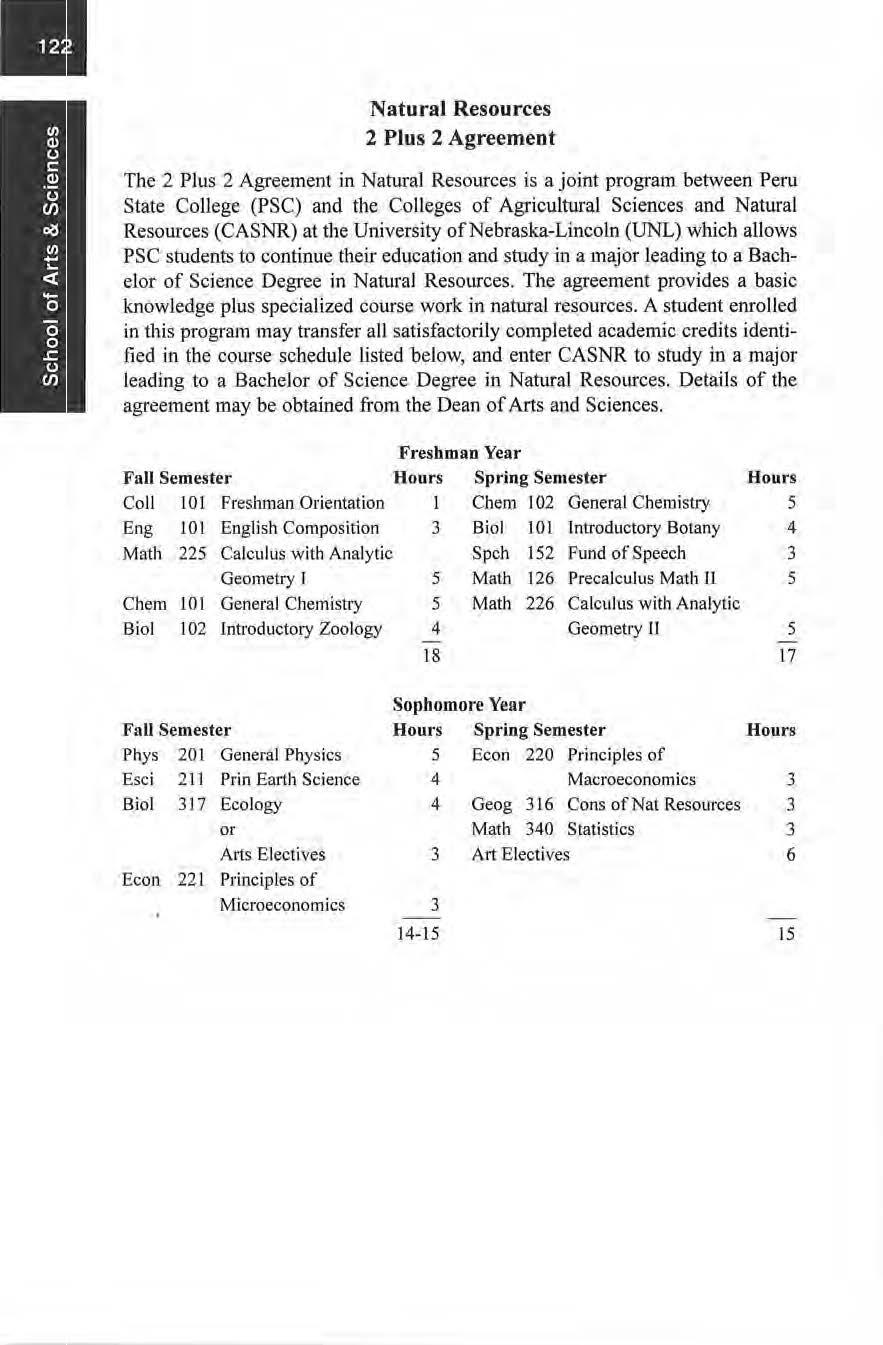
Korin ne Tande, Ed.D. Dean of the Scbo ol o f Education and Graduate Stu di es Professor of Education
Mark Beischel, Ed.D. Associate Professor of Educational Psychology
Anthony Citrin, Ed.D. Professor of Education
Department Head , Teacher Education
John Gibbs, M.S. Instructor of Physical Education
Barbara Heckathorn, Ed D. Assistant Professor of Education
Mary Howe, Ph.D. Assistant Protessor of Education
Richard Lemke, Ph.D. Associate Professor of Physical Education
Patricia Rippe, M.S. Assistanl Professor of Education
Dennis L. Vokolek, Ph.D. Associate Professor of Education
Department Head, Physical Education & Graduate Studies
Deborah Weitzenkamp, M.S. Instructor of Educational Technology
Peru State College, founded as a teachers ' college, places a primary emphasis upon the preparation of excellent teachers who wiU serve the region, the state and the nation. That teachers are the professionals charged with the task of educating ow· children for roles in a democratic society is a realizati on fotming the philoso phical basis for our program.
The Teacher Education Unit is committed to preparing exemplary professionals in the fie ld of ed ucation. The facu_lty and staff in the Teacher Education Unit understand the comp lexity, interre latedness and recursive nature of the teaching/learning process. We are committed to preparing our teacher education candidates to be reflective professionals in general stu dies, specific content areas, and pedagogy. In addition , their educational experiences wi ll equip them to be effective communicators and critical decision-makers in a democratic and increasingly technological society. Graduates wi ll be agents fo r change with an appreciation of diverse cultures and viewpo ints. Therefore, we create and update courses based upon our study and reflection on current research and professional writing. We encourage diverse field experiences, co-curricu lar activities and professional opportunities. We believe that the self-directed individual understands that learning is a lifelong process that involves co ntinual growth.
The School of Education and Graduate Studies provides teacher preparation programs in accordance with the Nebraska Department of Education The Nebraska Department of Educat ion requires that individuals seeking teacher certification be qualified for endorsement in one field or one s ubject. Subj ects and fields are defined as follows:

Fiel d: Field refers to two or more closely related subjects. For example, Soc ial Sc ience is a field wh.ile Hist01y is a subject; or Phy s ical Science is a field while Biology and Chemistry are considered subjects; or Elementary Education is a field including all the subjects taught in grades kindergarten through grade e ight.
Subj ect: Subject refers to specific courses such as English, Psychology or History Education.
The Schoo l of Ed ucati o n and Graduate Studies offers teacher preparation programs in the following fields and subjects:
Art (K-12)
Early Chi ldhood Educ. (P-3)
E lementary Education (K-8)
Language Arts ( 7-12)
Mathe matics (7-12)
Musi c (K-1 2)
Middle Grades Education (4-9)
Natural Science (7-12)
Physical Science (7 - I 2)
Social Science (7-12)
Special Education (K-9, 7-12)
(Mild/Moderately Handicapped)
Biology (7-12)
Basic Business (7-12)
Chemistry (7-12)
English (7-12)
History (7-12)
Physical Education (K-6, 7-12)
Preschool Handicapp ed ( P - K)
*Vocal Music (K-6)
*Thi s e ndorsement is only available to students who possess or intend to graduate with ru, endorsement in elementary education.
Additional supplemental teaching endorsements in Computer Science and Coaching are available with most of the above areas.

For complete infonnation regarding teacher education requirements and teacher certification, contact the Certification 0.fficer, ScbooJ of Education and Graduate Studies at Peru State College or the Director of Teacher Certification, State Department of Education, Lincob1, Nebraska 68509.
The Offutt AFB Extension Program offers non-traditional , accelerated teacher preparation programs with priority ehrollment to active and retired military, Offutt AFB employees, their dependents, and as space i s avajlable, civilians. These programs include the Elementary Education and Middle Grades field endo1·sements, select ed _general studies c lasses and the Secondary Education cun-iculwn. T hese programs will meet the initial Nebraska teacher certification requirements. The content courses required for secondruy endorsement are not offered by the Offutt program. Admission , degree, and course requirem e nts are the same as on- campus. Infonnation regarding the Offutt Extens ion Program is available by contacting the Peru State College Offutt Office, Base Education Center, 55 MSS/DPE, Offutt AFB, NE 68113 , Phone ( 402) 293- 1764
Admission to Peru State College does not equate with admiss ion to teacher education. To initiate the process of admission into teach er education, the student is required to file a fonnal application and to meet or exceed all necessary admission requirements. Once the admission requirements have been met, the teacher education committee reviews each candidate for admission into teacher education. Students will be notified in writing if they have been fully admitted or denied admission into teacher education by the Teacher Education Committee. The Teacher Education Committee meets on a regular basis during the Fall and Spring semesters.
Students who 1Jansfet credit from another institution in lieu of EDUC 208 or students who hold a bachelor's degree and are seeking only a teaching endorsement, must apply to teacher education immediate[y upon entering Peru State CoJ\ege. These students should contact the Dean of Education and Graduate Studies for an immediate interview and transcript evaluation. Upon compl etion of thi s interview, they should file an Application for Admission to Teacher Education with the School of Education Secreta1y.
Applicants must meet the following criteria and conditions prior to review for admission by the Teacher Education Committee:
1. Applicant must be free from social probation .
2. Applicant must possess an overall grade point average of at least 2 .5 with at least 54 credits completed.
3. Applicant must possess minimum scores on the Pre Professi011al Skills test as follows :
4. Applicant must have recommendations from two Peru State College instructors who are in a position to assess the student as a prospective teacher.
5. Students entering Peru State College as a freshman during the fall semester 2001 (and thereafter) must enroll in pre-requisite course work prior to receiving admission. to teacher education. The folJowing courses must be taken: EDUC 208, SPED 200, PSYC 250, PSYC 205 and PE 100. Please visit with an advisor for additional information.
6. Applicant must provide evidence of proficiency in English Composition and Matl1ematics as indicated by a grade of C or above in college level cow·ses or scores at or above the fiftieth percenti le on tbe English and Mathematics sections of the ACT or 800 on the SAT.
7. The Nebraska State Department of Education's Rul e 21 requires that the following regulation and appeal process be in effect.

All teacher education institutions shall require the prospective student teacher to affirm under oath that he or s he has no felony convictions, nor misdemeanor convictions involving abuse, neg lect, or injury to any person, or any other convictions involving moral turpitude.
A person with a conviction as indicated in the rnle shall not be allowed to participate in pre-student teaching field, laboratory, and classroom experiences or student teach without approval by the State Board of Education.
To meet this requirement, all students shall comp lete an oath PRIOR to participation in pre-student teaching field, laboratory, ahd c lassroom experiences or student teaching.
In compliance wi t h thi s rule th e following Peru Sta te College policy is in effect:

NO ST UDENT WILL BE ALLOWED TO PARTICIPATE IN PRE-STUDENT TEACHING FlELD, LABORATORY, AND CLASSROOM EXPERIENCES
O R ST UDENT TEACH UNTIL A NOTARIZED OATH OF PERSONAL AND PR OFESS IONAL FITNESS HAS BEEN PRESENTED TO THE DlRECTOR OF FIELD EXPERIENCES.
PERSONS WITH A RECORD OF CONVI CTIONS MUST CONTACT THE CERTIF ICATfON OFFICER BEFORE ENROLLING fN ANY PRE-STUDENT TEACH.ING FIBLD , LABORATORY, AND CLASS ROOM EXPE RlENCES OR STUDENT TEACH.
STUDENTS FOUND TO BE IN VIOLATION OF THE NEBRASKA FELONY AND MI SDEMEANOR POLICY MAY B E REMOVED FROM ANY OR ALL FIELDWORK.
Neb raska Emotional and Mental Incapacity Status
Nebraska Rule 21 states the follow ing:
004.0lLl Any student app lyi ng for admission to Teacher Education sha ll not have an emotional or mental incapacity to practice the profession as evidenced by a lega l adjudication or dete1mination thereof by oth e r lawful means. Such evidence being any of the following:
004.0 lLI Such person is, at the time of the consideration of the person 's fitness to hold a certificate, a mentally ill dangerous person under 83-1009
R.R.S. as ev idenced by a declaration or o rder to that effect by a mental health board of this stat e, or as evidenced by a similar finding by a si milar body of another state.
004.01 L2 Such person is , at the time of the consideration of th e person's fitness to hold a certificate, a mentally ill individual as defmed in 20- 164
R.R. S ., ("an indjvidual who has a significant mental illness or emotional impainnent as determined by a mental health professional qualified under the laws. mies and regu lations of th.is state and who is an inpatient or resi-
den t of a facil ity for mentally ill i ndi viduals) or similar determinations bas been made by s i m ilarly qu alified mental h ealth professional(s) of another state.
004.01L3 Such person has been declared by a court as mentally incompetent in relation to standing trial for a criminal charge pursuant to 29-1822
R.R.S or 29-1823 R.R,S , or similar laws of another state, and has not been found by cmut to have recovered from such incompetency.
004. 0 I L4 Su ch perso n has been acquitted of a cri minal charge on the basis ofa finding of insanity under 29-2203 R.R.S. or similar laws of another state, unless a co urt, s ubseq uent to such an acquittal, h as found that s uch person is not dangerous to himself, herself, or others by reason of mental illness or defec t and has released such person from court ordered treatment p ursuant to 29-2702 R.R and 29-3703 R.R.S., or sim ilar laws of another state
004.0lLS A court has found s uch person to be an incapacitated person in need of a court appointed guardian p ursuant to 30-2601 R.R.S. and 30-2620 R.R.S ., or similar l aws of another state, and no court order has been entered that such person 's incapacity has terminated.
004.0 I L6 A court has appointed a conservator or made other protective o rder(s) due to a c,ourt's find ing that such person in unabl e to manage his o r her property and property affairs effect ively for reasons which inc lude any of the following: (1) mental illness; (2) mental deficiency ; (3) chronic use of drugs; and (4) chroni c intoxication, pursuant to 3 0- 263 0 R.R.S. or similar laws of another state, a nd no cou rt order has been entered that the disability of the per son has ceased.
Students are reqt1ired to complete a Personal and Professional Fitness Statement PRlOR to all field placements. This statement m ust be on file within the School of Education and Graduate Studies prior to the student starting their placement.
Candidates who wish to student teach lllUSt atten d a student t eaching application workshop two semesters prior to the student teachi n g term D eadlines to sub mit applications will be anno unced. To be eligible to enter student teachin g, candidates must meet the following requirements:
1. Received official notification of their acceptance into the Teacher Education program.
2. An overall GPA of at least 2.5.
3 . Earned enough c redits to graduate within one semeste r following student teaching. Student must submit an updated progress s heet, s i gned by the advisor, w ith the app li cation.
4. Please see t h e Director of Field Experiences for infom1ation regarding s p ecifi c courses that must be completed p1ior to student teaching.

5. Completed a minimum of 12 hours of credit at Peru State College.
6 . Provided a sworn statement that the student has not been convic ted of a felony or misdemeanor. P ersons with a record of convictions must contact the certification officer before enrolling in any pre-student teaching, field laboratory, and classroom exper iences on student teaching.
7 . Provide a sworn s tatement about emotional and mental incapacity status.
8. Provide evidence of liability insurance coverage designed for coverage in the professionaJ educationa l setting. (Current PSEA/SEAN/NEA membership provides liabil ity insurance coverage.)

The School of Education and Graduate Studies offers tbe Bachelor of Science degree with a major in Education. The Bachelor of Science degree prepares a student to teach in Elementary o r Secondary Schools. Options are availabl e in Elementary Education, Middle Grades E du cation, Special Education: Elementary or Secondary, Early Childhood Education, and Preschool Handicapped Education.
All required coursework in the Education Core, Core Competencies (as required by the Nebraska Department of Education) and Options must be completed with a minimwn g rade of ''C."
In addition to the requirements li sted below, all teacher education students must take Psych 255 Human Relations and Phil 201 Introduction to Philosophy The Teacher Education Unit is committed to the importance of student a dvising. Students must contact their advisors on a regular basis.
Please see catalog descriptions regarding pre-requisites and co-req ui s ites.
All students seeking certification in any endorsement option area are required to compl ete the following courses:
Educ "'* 208 Orientation and Practicum
Ed uc *400 Philosophical Foundations of Education

Psyc **205 Educational Psychology
Psyc ** 2 50 Human Growth & Development SpEd **200 lnh·oduction
All students s e eking an endorsement in E lementary Education (grades Kin dergarten - eight) must complete the following Option in E lementary Education.
In conjunction with the Education Core t he fo llowing c lasses are required for any e ndorse ment to teach in grades seven t hrou gh twelve. Additional coursework is required in the
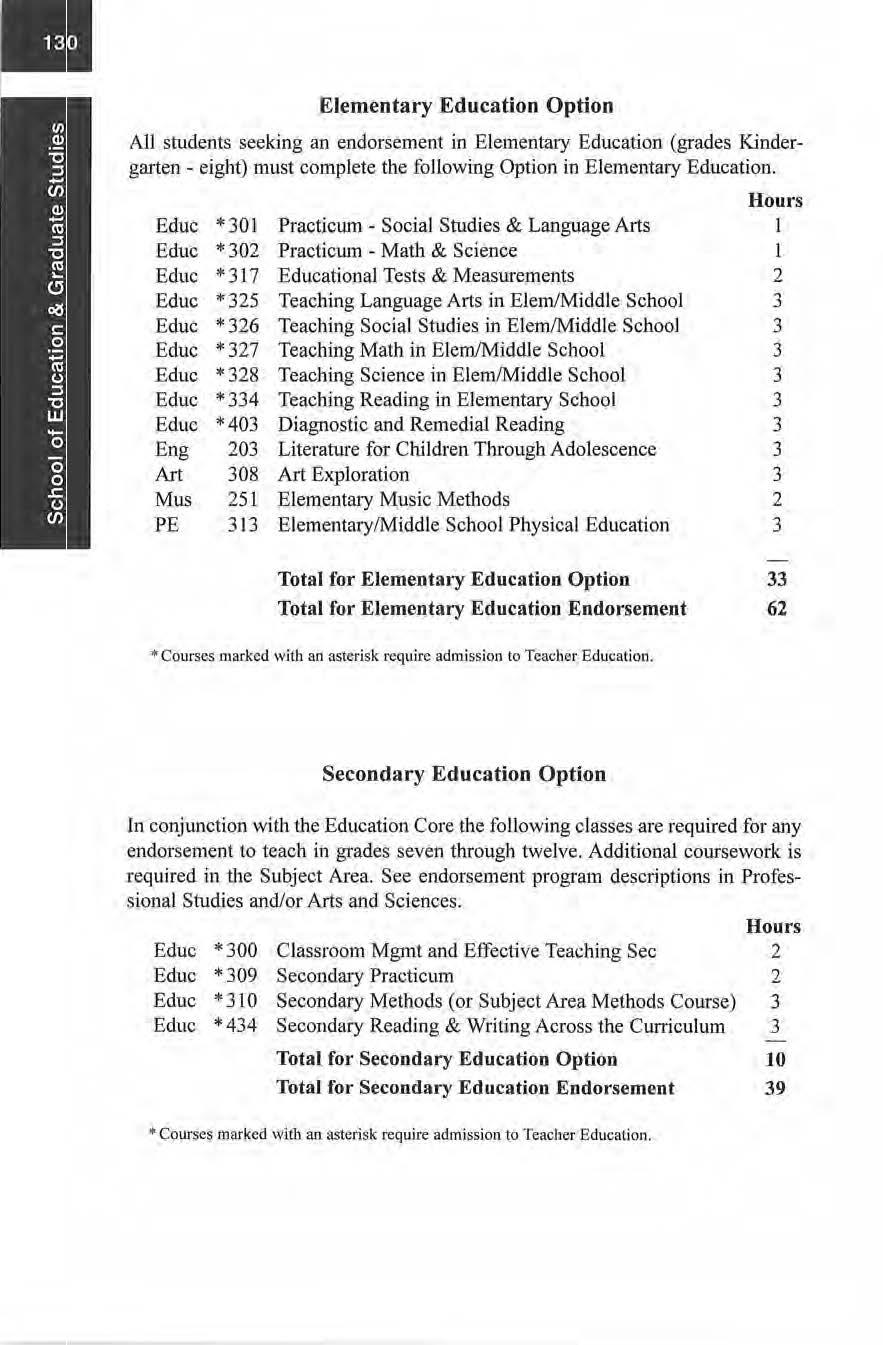
ect Area. See endorsement
in
Peru State College offers programs to prepare individuals to teach from kindergarten through the twelfth grade in the areas of Art and Music. Students working toward K-12 certificat ion must meet the same requirements and follow the same professional teacher education programs as Secondary Education candidates with the exception of practicum and student teaching, which must include experiences with both elementary and secondary students.
This program will endorse an individual to teach Early Childhood grades Prekindergarten through three (3).
*301 Practi cum - Social Studies and Language Arts
*302 Practicum - Math and Science
*305 Principles of Early Childhood Education
*308 Early Childhood Practicum
*3 25 Teaching Lang Arts in Eletn/Middle School
*326 Teaching Socia l Studies in Elem/Middle School
*327 Teaching Math in Elem/Middle School
*328 Teaching Science in Elem/Middle School
*334 Teach ing Read ing in E lementary School
*401 Emergent Literacy
*402 Methods in Early Childhood Education

*403 Diagnostic and Remedial Reading
438 Diversity Issues in Counseling
Select one (I) of t he follow ing co urses: Art 308 Art Exploration or Mus 251 Elementary Music Methods
Total for Early Childhood Option
Total for Ea rly Ch ildhood Endorsement
• Courses mw:ked with an asterisk require admission to Teacher Education.
35-36 64-65

This program will endorse an individual to teach: (A) any or all students in a selfcontained c l assroom in grades four (4) through nin e (9), (B) the areas of special p1·eparation in an integrated team planning/teaching organizational pattern in grades four (4) through nine (9) or (C) the areas of special preparation in classrooms with other organizational patterns in grades four (4) through nine (9).
Special Area Requirements: T hi s endorsement sha ll assure that the applicant has special knowledge in two or more content areas of specialization. The ctuTent Nebraska Department of Education standards require the applicant to have 18 distinct semester hours in each of two Special Areas. Spec ial Areas may be chosen from any one of the four Broad Fields listed below:
The course of study in the content areas of spec iali zation will be developed for each s tudent earning a middle grades endorsement.
This program will endorse an individual to teach Elementary Special Education (Mild/Moderate
in grades
(K) through nine (9).

Th is program will endorse an individual to teach Special Education (Mi ld/Moderate Handicapped) grades seven (7) through twelve (12) .
This program will endo rse an individual to teach infants and young children through age five who have handicapping oonditions.

The School of Education and Graduate Studies offers programs for individuals wfahing to major in Physical Education which will enable graduates to become certified as Physical Education teachers in the public schools or to become qualified for careers in Sports Management and to enable students to meet the requirements for c-ertification as coaches. (Non-teaching PE majors must choose the Sport Management Option.)

This program will endorse an individual to teach Physical Education in grades
(K) through six (6).
The K-6 subject endorsement requires the Education Core and these courses:
This program will endorse an individual to teach Physical Education in grades seven (7) through twelve (12).

Thi s program will endorse an individual to teach Physical Education in grades Kindergarten (K) through six (6) and seven (7) through twelve (12).
The K-6/7-12 subject endorsement requires the Education Core and the Secondary Education Option or the Education Core and these courses:
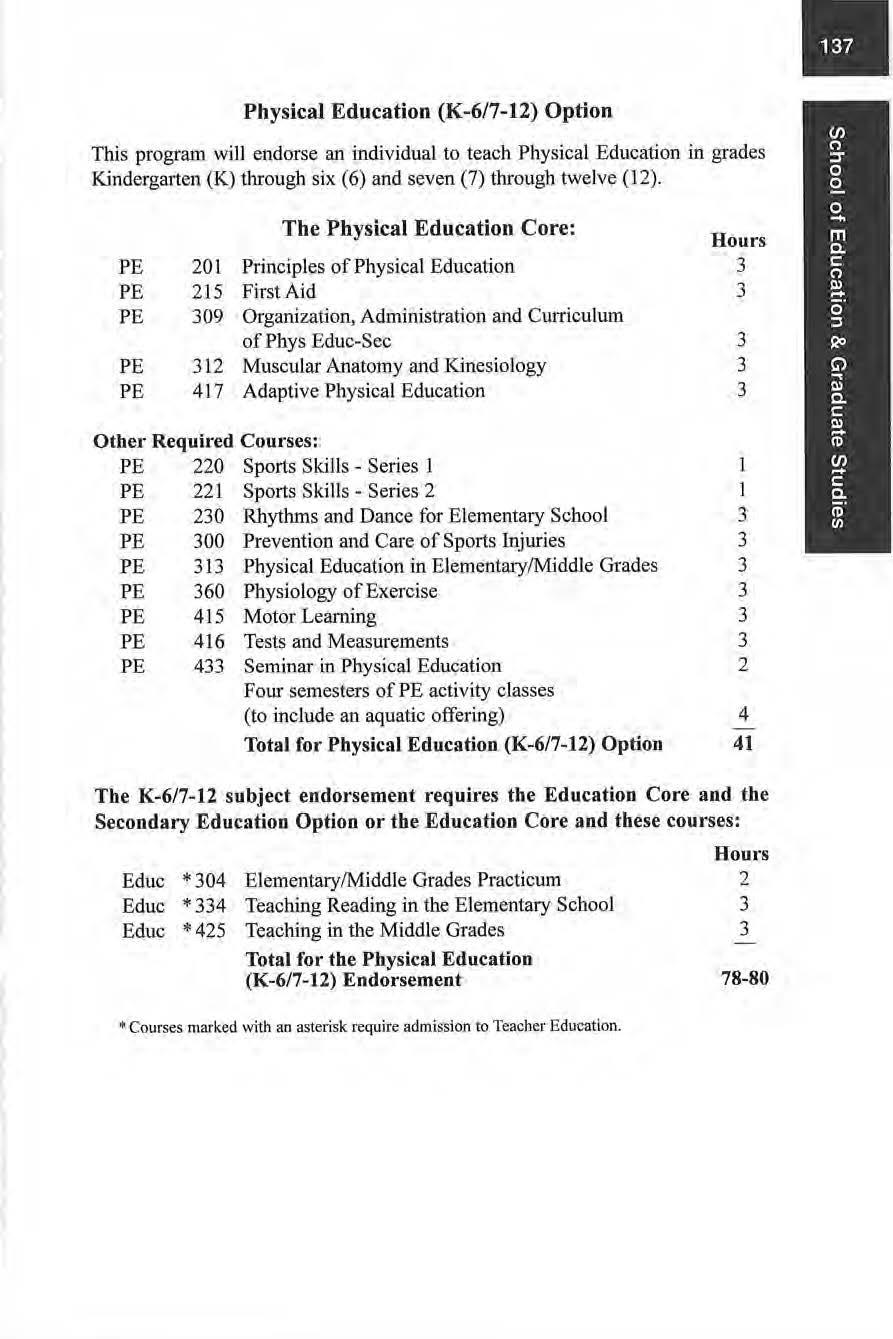
The following program is designed to fit the needs of the h igh school coach and leads to an institutional recommendation for e ndorsement Students completing this program are required to have an endorseme nt in Physical Educati on

The following program is provided for those students interested in coaching intersc h
and who do n ot have an endorsemen t in Physical Education . It is designed to fit the needs of the high sc ho ol coac h and leads to an institutional recommendation for endorsement. Students completing this prngram are required to have an endorsement in an area other than Physical Education.
ihe Sport Management option will allow the graduate to pursue a caree r in t h e sports industry. This option does not lead to a teaching endorsement and does n ot require the Education Core.
Note: Sport Management students should take the "B" Option in General Education computing: CSci I 02 and Bus 229

The following program is provided for those who are interested in teaching Driver's Education in a secondary school.
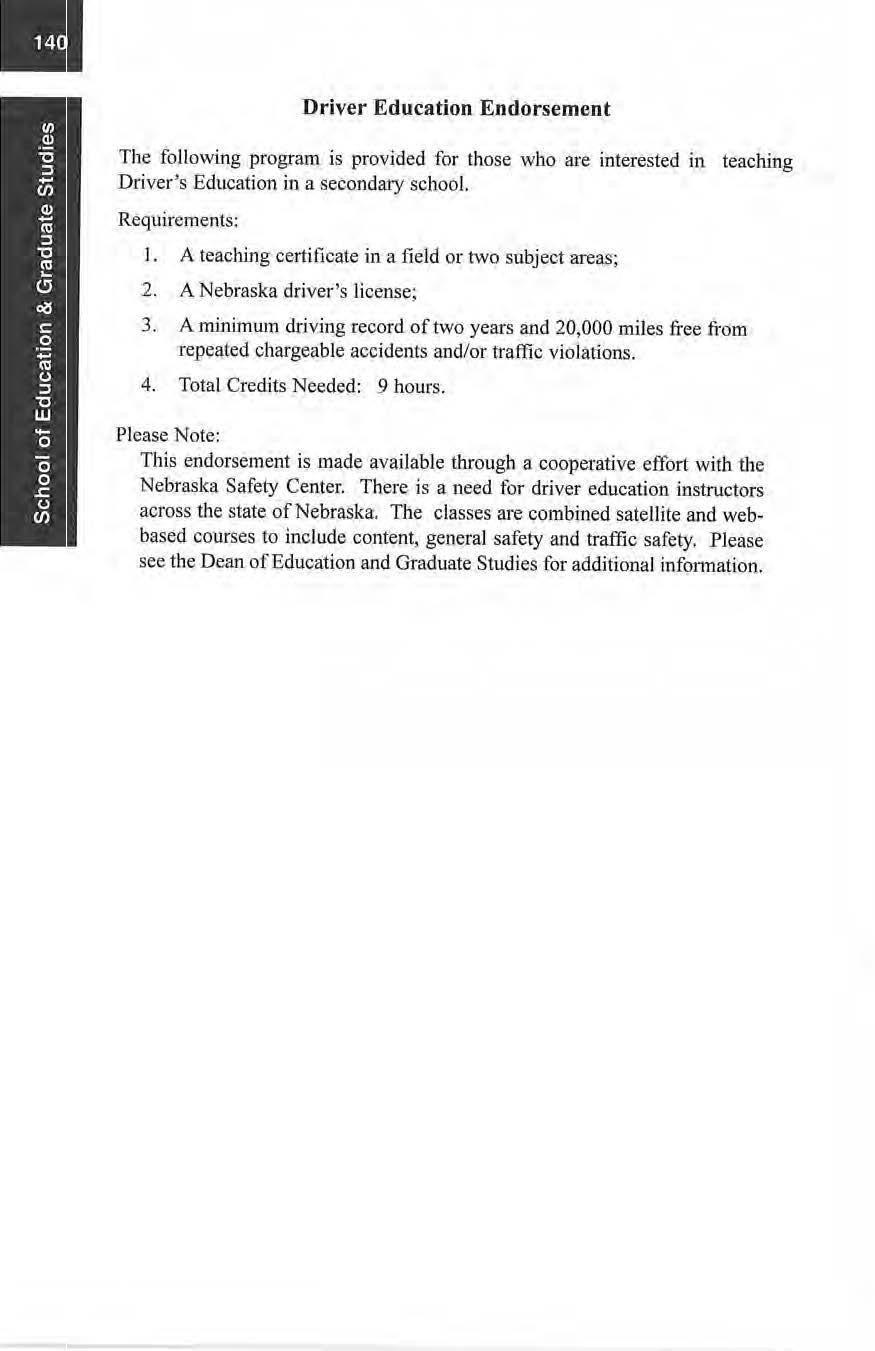
Requirements:
I. A teaching certificate in a field or two subject areas;
2. A Nebraska driver's license;
3. Am.injmwn driving record of two years and 20,000 miles free from repeated chargeable accidents and/or traffic violations.
4 Total Credits Needed: 9 hours
Please Note:
This endorsement is made available through a cooperati ve effort with the Nebraska Safety Center. There. is a need for driver education instructors across the state of Neb raska The classes are combined satellite and webbased courses to include content, geuera l safety and traffic safety. Please see the Dean of Education and Graduate Studies for additiona l info11nat ion.
Todd Drew, M.B .A., M . Ed. Dea n of Profess iona l St udi es Assist ant Professor of Business
Kell y Asmussen. Ph.D. Associate Professor of Criminal Justice a nd Department He ad of P sych o logy and Criminal Justice
Bruce Batterson, J.O. Assistant Professor of Business
Judy Grotrian, M.E d. Assistant Professor of Business
Joel Lundak, Ph.D. Professor of Psychology
William Snyder, Ed.D. Professo r o f Business
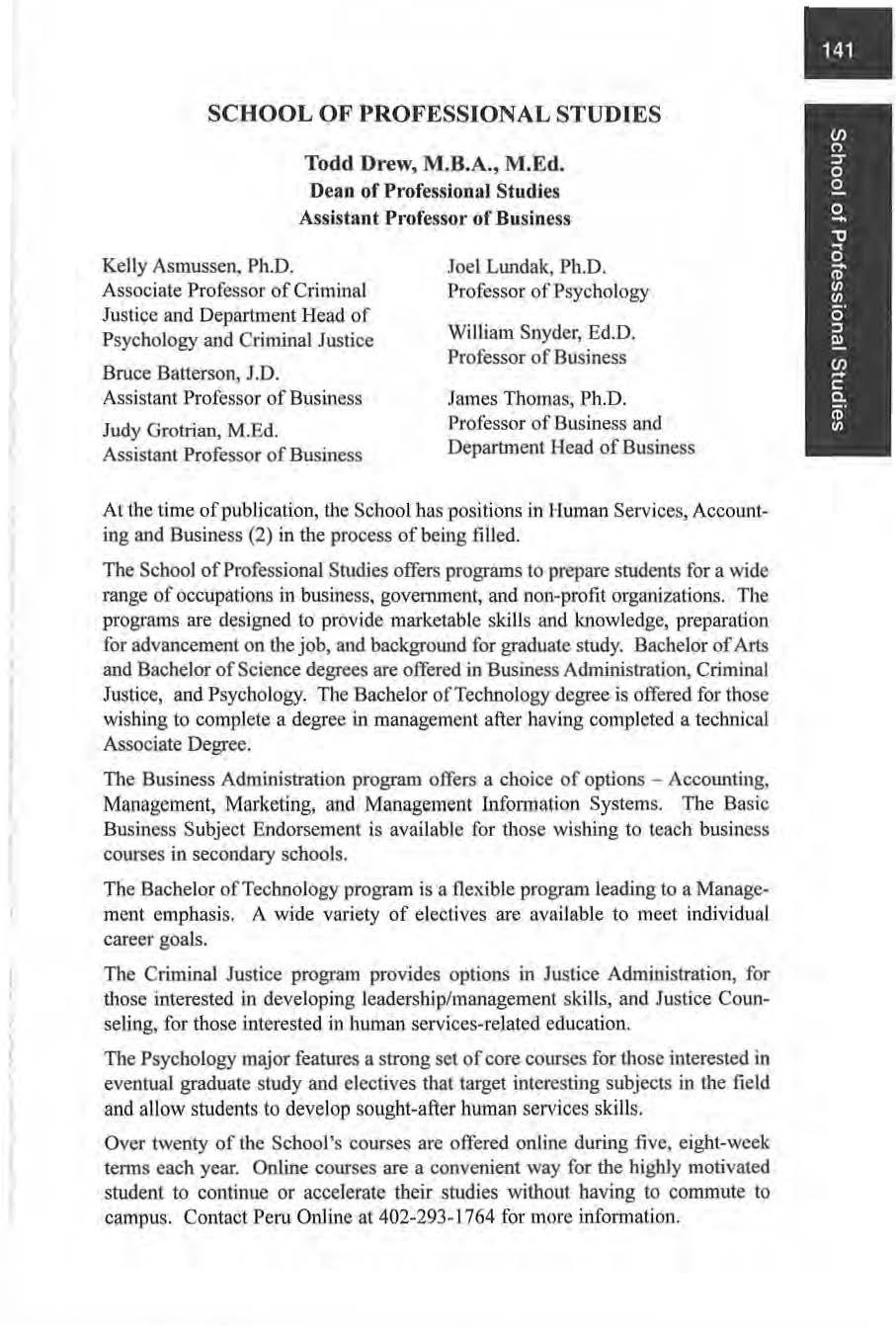
James Thomas, Ph .D. Professor of Business and Department Head of Bus iness
At the time of publication, the School h as positions in Human Services, Accounting and Business (2) in the process of being filled.
The School of Professional Studies offers programs to prepare students for a wide range of occupations in business, government, and non-profit organizations. The programs are designed to provide marketable ski lls and knowledge, preparation for advancement on the job, and background fo r gradu ate study. Ba ch e lor of Arts and Bac helor of Science degrees are offered in Business Administration, Criminal Justice, and Psychology. The Bachelor of Technology degree is offered for those wishing to complete a degree in management after having co111pleted a technical Associate Degree.
The Business Administration program offers a choice of options - Accow1ting, Management, Marketing, and Management Infom1ation Systems. The Basic Business Subject Endorsement is available for those wishing to teach business courses in secondary schools.
The Bachelor of Technology program is a flexible program leading to a Management emphas i s. A wide variety of electives are available to meet individu al career goals.
TI1e Criminal Justice program provides options in Justice Administration , for those interested in developing leadershjp/management s kills, and Justice Cou nseling, for those interested in human services-related education.
The Psychology major features a strong set of core courses for those interest ed in eventual graduate s tudy and electives that target interesting subjects in the field and allow students to develop sought-after human services skil ls.
Over twenty of the School's courses are offered online during five , eight-week tenns each year. Online courses are a con venient way for the highJy motiv ated student to continue or accelerate their studies without having to commute to campus. Contact Peru Online at 402-293 - 1764 for more infom1ation.
NOTE: Business Adm i nistration Majors must take the fo llowing courses in th e Gen era l St udies program:

The Accounting option prepares students for high-demand careers in financial reporting and management. Initia l coursework is designed to prepare students for pos itions in private industry and the Certified Management Accountants (CMA) examination. Those students des iring to take the Certified Public Accountants (CPA) examination w ill need to comp lete the additional Requiremen ts for the Public Accounti n g/CPA Focus.
Require m e nts fo r Ge ne ra l Accounting/CMA Foc us (125 hours required)
A dditional Requireme n ts for Public A ccountin g/CPA F oc us ( 150 boo.rs req u.ire d)
Studen ts opting for the C PA Foc us a re required to take a total of 60 hours of credit in general education exc luding PE but including the current General Studies Program. Credit hours beyond those required by the General Studies Program can be fro m any area of general studies and are not specifically designa ted c lasses (i.e., any Engl ish or Math class). T h e CPA F ocu s d egre e require
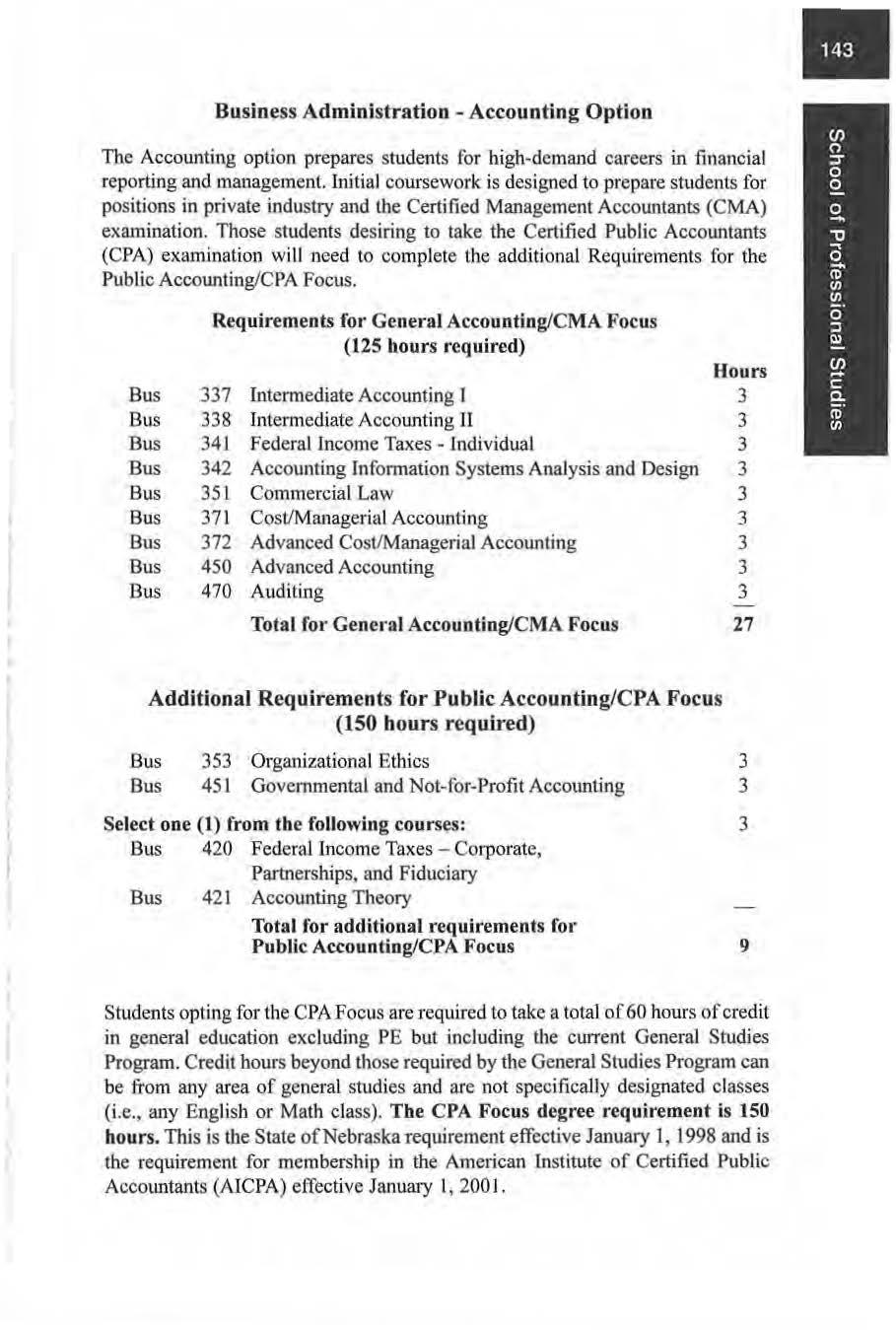
hours. This is t
requirement effective January 1, 1998 and is the requirement for membership in the American Institute of Certified Public Accountants (AlCPA) effective January I, 2001.
The Basic Business Subject Endorsement prepares students for certification to teach ba si c busi ness courses in Nebraska pub li c sch ools in grade levels 7- 12
Students in this option must complete a minimum of 33 semester hours in Business and Economics, exc ludjn g Bus 229, Software Appl ications.
No te : The program requires a demonstrated competency in touch keyboarding, the ten-key pad, document fom1atting, correct technique, and employable speed.

The following courses may be substituted for Bus 335, Bus 339, Bus 373 , or Bus 495 in the B usiness Core:
Students in the Basjc Business Sttbject Endorsement may s ub stitute Math IO I, Co llege Algebra, for Mat h 120 above.
Srudents must complete the above Subject Endorsement plus the 42 hours of Professional Education courses listed in the School of Education and Gradu ate Studies sect ion under the Professio nal Educati on Sequence and under Secondary Education.
The Management Opt ion provides a flexible general business edu cation and prepares graduates for entry and mid-level super vi sory and management positions.
Only three (3) hours of Bu s 441, Business Administration Intemship , may count toward the Management option.
The Manageme nt Infonnation Systems (MIS) option prepares students for emp loyment in the deve lopm ent and use of computer-base d systems that generate t imely and accmate in.formation used for managing an organization. Though a particularly rigoro us field of study, the financia l rewards from compl eting an MIS opt ion can be particularly high, given the student acquires not only tec hn ical computer skills, but also a detailed understanding of the language, processes, and issues of the business world.

The MarJceting option prepares graduates for a wide variety of high-demand careers in marketing and sales. Given tbe strategy development focus and caseoriented instructional approaches used in many of the marketing courses, this option is a particularly good preparation for students eventuall y intending to pursue the Masters of Business Admi nistration degree.

Pursui t of the B ache l o r of Technology degree req uires the completio n of a technical associate degree or equival en t. The degree is designed for those interested in developing management s lcill s to complement th e ir t echnical background. Near ly all of the COlU'Ses requ ired to com plete this degree are offer ed on-line. Contact 'Peru Online at 402-293-1764 for more infom1ation.

Organizational Communicati ons
Production/Operatiolls Management Bus in ess Fi nance
Organ izational Behavior
Organizational Leadership (Sen ior Competency Course)
N OTE: All students must take the following as part of the General Studies
The Criminal Justice major is an interdisciplinary social science curriculum that concentrates on developi11g practical skills and !mow!edge for professional careers in the justice fi e ld. Students' studies focus on con-ections, law enforcement, courts, juvenile justice, criminology, victimology, and research methods to study crime, criminal and abnormal behavior and society's response.
CJus 110 Survey of Criminal Justice
CJus 220 lntroduction to Corrections
CJus 230 Policing in America
CJus 308 Community-Based Corrections
CJus 330 Research Method s
CJus 340 Criminal Law
CJus 360 Criminology
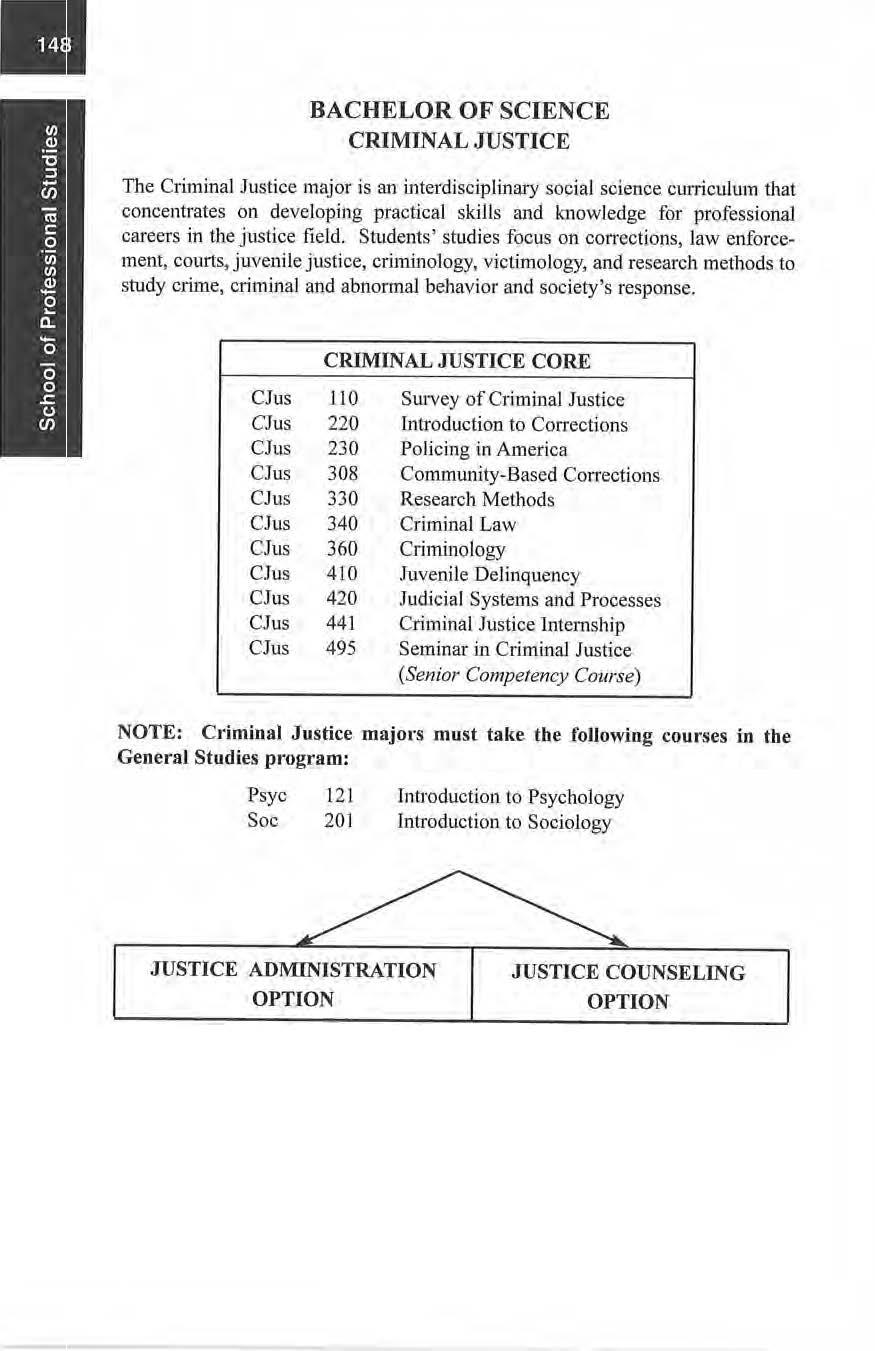
CJus 410 Juvenile Delinquency
CJ us 420 Judicial Systems and Processes
CJus 441 Criminal Justice lnternship
CJus 495 Seminar in Criminal Justice (Senior Compet ency Course)
NOTE : Cr iminal Justice majors must take the folJowiug courses in the General Studies program:
The Justice Administration option is for students who are interested in developing l eadership/management skil.1s.

Select seYen (7) of the following courses: Hours
Bus 251 Legal Environment and Contract Law
Bus 373 Organizational Behavior
Bus 380 Hwnan Resources Management
Bus 381 Employee Training and Development
Bus 4 I 4 Supervisory Sk ill s and Practices
CJus 300 Organization and Administration of Justice
CJus 313 Loss Prevention
CJus 385 Victimology
CJus 442 Criminal Justice Internship
PSci 426 American Constitutional Law
PS ci 468 Public Administration
Psyc 255 Hum an Re lati ons
Total for Justice Administration Option 21
The Justice Counseling option is for students who are interested in human servicesrelated education.
Select seven (i) of the following courses: Hours
CJus 385 Victimology
CJus 442 Criminal Justice Internship
Educ 365 Child Abuse
Psyc 437
Psyc 438
Psyc 440
Techniques of Counseling
Diversity Issues in Counseling
Behavior Management and Modification
Psyc 450 Abnormal Psychology
SoWk 280
SoWk 370
Introduction to Professional Ethics and Social Work Practice
Ethnic Group Relations
So Wk 3 75 Assessment, Evaluation, and Casework Management
SoWk 390 Group Work
SoWk 410 Addictions
So Wk 420 Medical and Treatment Issues in Social Work
Total for Justice Counseling Option 2l
The Psychology major prepares students for gradu ate study as well as for careers where strong buman services skills are necessary.
PSYCHOLOGY CORE,
Psyc 250 Human Growth and Development
Psyc 305 Social Psychology
Psyc 320 Psychology ofLearn ing
Psyc 330 Research Methods
Psyc 345 Psychology of Personality
Psyc 380 Adolescent Psychology
Psyc 410 Experimental P sychology
Psyc 431 Psychological Tests and Measurements
Psyc 440 Behavfor Management and Modification
Psyc 450 Abnormal Psychology
Psyc 495 Seminar in P sychology (Senior Competency Course)
NOTE: Psychology majors must take the following courses in the General Studies program:
Psyc 121 In troduction to Psychology
Soc 201 Introduction to Socio logy
Select seven (7) of the following courses: Hours
Psyc 310 Psychology of Spo11s and Physical Activities
Psyc 437 Techniques of Co unselin g
Psyc 438 Diversity Issues in Counselin g
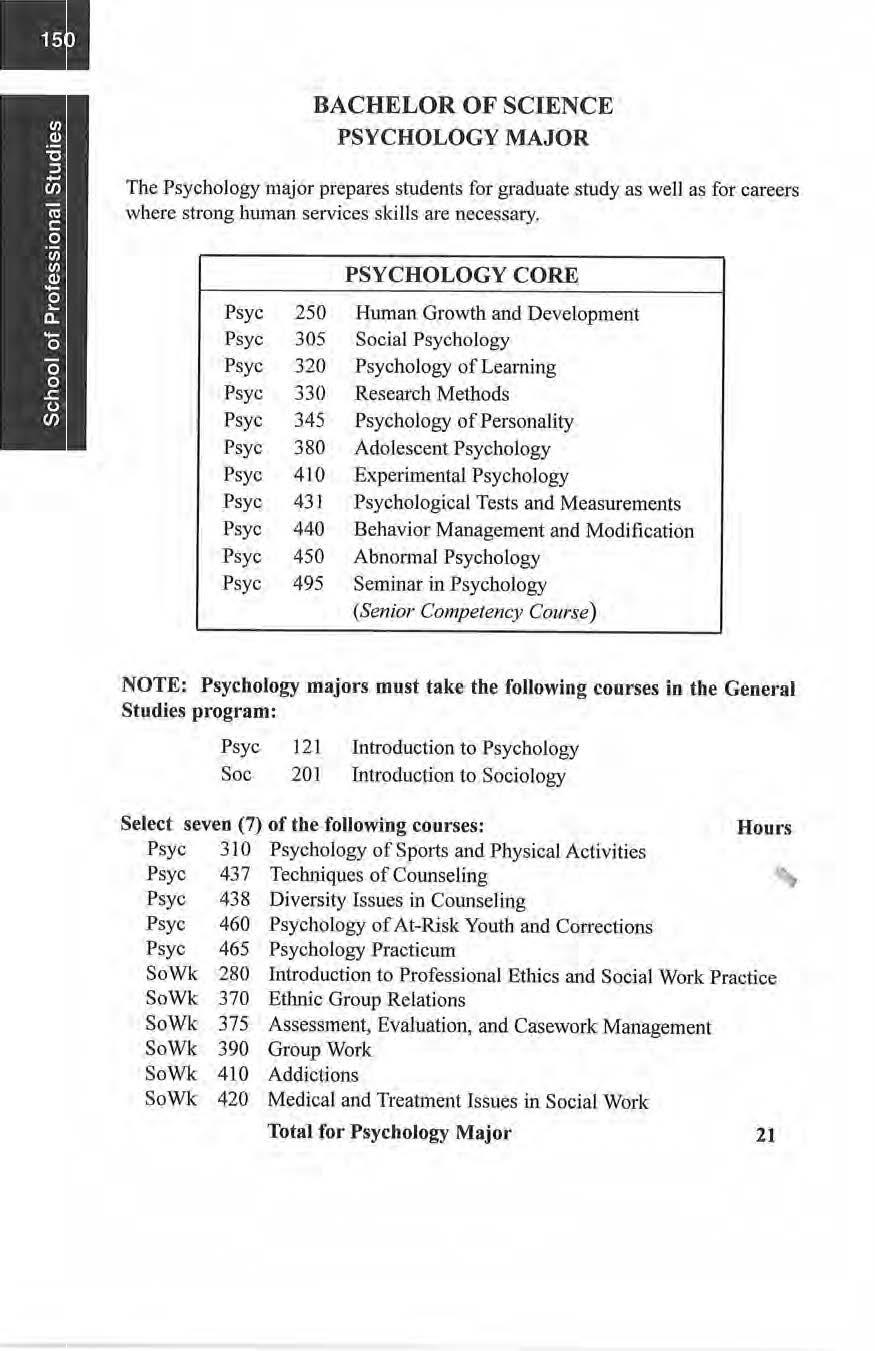
Psyc 460 Psych ology of At-Risk Youth and Corrections
Psyc 465 Psychology Practicum
So Wk 280 Introduction to Professional Ethics and Social Work Practice
So Wk 370 Ethnic Group R e lati ons
SoWk 375 Assessment, Evaluation, and Casework Management
So Wk 390 Group Work
SoWk 410 Addictions
So Wk 420 Medical and Treatment Issues in Social Work
Total for Psychology Major 21
Anthropology
225 Introduction to Cultura l Antbrnpology (3 hours)
A comparative and historical approach to the religion, social organization, subsistence patterns, and the other aspects of the great variety of cultures around the world (Each Fall semester)
297 Directed Study ju Anthropology (3 hours)
Prerequisite: Sen ior standing; prior approval of IJ1Structor and Dean of the School of Arts and Sc iences. For rules concerning Directed Study courses, please refer to page 69 , (Qffered as n eeded}
380 Wor ld Mytho logy (3 hours)
An introduction to myths and fables from ancient and contemporary societies, their structures, purposes, and evolution. (Spring semester, even years)
497 Directed Study in Anthropology (1-3 hours)
Prerequisite: Senior standi ng ; prior approval of Instructor and Dean of the School ofAt1s and Sciences. For rules concerning Directed S tudy cow·ses, please refer to page 69.
(Offered as needed)
499 Independent Study in Anthropo logy (1-3 hours) Art
Prerequisite: Junior standing; prior approval of Instructor and Dean of School of Arts and Sciences. For rules concerning Independent Study courses, please refer to page 69.

( Offered as needed)
101 Drawing l (3 hours)
A study of basic drawing techniques using a variety of drawing medfa. (Each Fall semeste,)
102 D1·awiog II (3 hours)
Prerequisite: Art l O1.
A continuation of Drawing I with an emphasis on improving techniques. (Each Spring semester)
203 2-D Design (3 hours)
A study of two-dimensional design and color theory. (Each Fall semester)
204 3-D Design (3 hours)
A study of three-dimensional design using a variety of media. (Each Spring semester)
206 Art Appreciation (3 hours)
The study of alt history principles through painting, sculpture, architecture, etc.
(Each semeste1)
210 Water Colo r Painting (3 hours)
Prerequisites: Art 101, 102,203.
This course e mph asizes compositions in color using opaque and transparent water color. This course may be repeated for a total of twelve (12) hours. Students are limited to three (3) hours credit per semester.
(Spring semester, odd years)
221 Printing Proces ses (3 houl's)
Prerequisites: Art IO 1, l 02, 203.
This course introduces 1be his1ory and tec hniqu es of the graphic arts of block printing, etching, and lithography. This course may be repeated for a total of twelve (12) hours. Students are limited to three (3) hours credit per semester.
(Spring semeste,; even years)
226 Photography I (3 hours)
This course studies the theory and practice in the basic fundamentals of photography including composition, exposure, lighting, developing, contact printing and enlarging.
(Each Fall semester)
297 Di1•ected Study in Art (1 - 4 hours)
Prerequisite; Senior standing; prior approval of Instructor and D ean of the School of Arts and Sciences.
For rules concerning Directed Study courses, please refer to page 69. (Offered as needed)

298 Special Topics in Art (1-4 hours)
Prerequisite: Freshman-Sophomore standing. (Offered as needed)
300 Potte,·y (3 hours)
Prerequisites: Art IO l, 102, 204. This course offers experiences in hand- built and thrown projects incl uding a basic study of g l aze preparation and c lay analysis. Students are limited to three (3) hours credit per semester. This course may be repeated for a total of twelve (12) hours.
(Each Fall semester)
308 Art Exploration (3 hours)
A study of the purpose of art education in the e lem entary school program. The snident is presented with a survey ofthe hi story and philosophy of art in the e lementary school and becomes actively involved in art activities designed for the eleme ntary school classroom.
(Each semester)
3 10 Sculpt ure (3 how·s)
Prerequisites: Art I OI , 102, 204.
'f'hi:1 course introduces experiences in three-dimensional form using a variety of materials. Students are limi ted to three (3) hours credit per semester. The course may be repeated for a total of twe lve (12) hours. (Each Spring semester)
3 11 Pai nt i ng (3 hours)
Prerequisites: Art 10 I, I 02, 203.
T his co urse introduces studio experiences in oil and acrylic painting techn iques. Students are limited to three (3) hours credit per semester. The cow·se m ay be repeated for a total of twelve ( 12) hours. (Each Fa ll semeste1)
3 17 A rt History I (3 hours)
A study of painting, sc ulpture, and archi tecture from anci ent times to the Baroque. (Fall semest e1; even years)
3 18 A rt History Il (3 hours)
A study of art from the 1800s through contemporar y art t rends. (Fall semester, odd years)
325 F i g ure Drawing (3 hours)
Prerequ is ite: Art I Ol , 102, 203, 204.
Figure drawing is a course that deals with drawing of th e human anatomy from live models. Th is course may be repeated for a tota l of twelve ( 12) hours. S tudents are limited to th ree (3) hours credit per semester (Eac h Fall se111este1)
350 Studio Activities (3 hours)
Prerequisites: Art l OJ, I02, 203, 204.

An integrated course consisting of students working in variou s art mediums. Stude nts will be allowed to work in the field of their c h oosing; painting, sculpture, etc. This course may be repeated for a total of twelve (12) hours. Students are limited to three (3) h ours c r edit per semester (Each Spring sem ester)
400 Se nior E xhibition (1 hom)
Prerequisite: Senior standing.
A student in this course mu st create a mi nimum of two (2) new major pieces, mount and hang their exh ibition, design and print announcements/ mailers, and create their resume, as well as docwnent their work by the use of s lides (20 slides submitted to, and retained by the department). Senior Exhibi t ion is the capstone course for a student's cre ative experience in art at PSC.
(Each semeste, )
497 Directed Study io A rt (1-4 hours)
Prerequisite: Senior standing; prior approval of Instructor and D ean oftbe School of Arts and Scien ces.
For rules concerning Directed Study courses, please refer to page 69. (Offered as needed)
498 Specia l Topics io Art {1-4 hours)
Prerequisite: Junior-Senior standing. (Offered as needed)
499 Indepe nd ent S tudy in Art (1 -3 hours)
Prerequisites: Juni or standing; prior approval of the lns tructor and Dean of the School of Arts and Sciences.
Fo r rules concerning Independent Study courses, please refer to page 69. (Offered as needed)

101 lotroductory Botany (4 hours)
This course examines the foundation principles of biology with s pecial emphasis on anatomy, morphology, life cyc les, reproduction, evolution and diversity of plants and related organisms. Both le cture and laboratory are required for this course.
(Eac h semester)
l02 Introdu ctory Zoology (4 hours)
This course examines the foundation principles of biology with special emphasis on anatomy, morpho logy, life cycles, reprod uction, evo lution and diversity of an imals and related organisms. Both lecture and laboratory are required for this course.
(Each semester)
130 Genera l Biology (4 hours)
An integrated course de signed to introduce the basic patterns and processes of biology and the scientific method. The course builds a conceptual understanding of major biological problems and opportunities and the role the biologica1 sciences play in unde rstanding a nd solving these problems and explo itin g opportunities. Major topics inc lude : medicine, epidemiology and disease ; applied evolution and ecology; genetic engineering, cloning and biotec hnology; population growth and the role of demographics in energy and economic development, and other relevan t current topics as appropriate. This is a course for non-majors and cannot be used for elective cred it in the Natural Science major. Both lecture and laboratory a re required for this course.
(Offered as needed)
210 H uman Anatomy (4 hours)
Prerequisites: Biol I 02.
A comprehensive exam ination of the cell biology, histology, and organ
systems of humans. The course is designed for students in allied health and pre-nursing. Both lecture and laboratory are required for this course.
(Each Fall semester)
220 Horticulture and P lant Propagation Techniques (3 hours)
Prerequisites: Biol I 01.
Students learn the foundation aesthetic, maintenance and propagation techniques of hort iculture in this course. Emphasis is placed on plant propagation techniques and horticultural practices for plant species suited for successful gardening in Nebraska, Both lecture and laboratory are required for this course.
(Spring semeste,; even years as needed)
225 Fres hwate r Biology (3 hours)
Prerequisites: Biol 102. This course examines the biology of lakes and streams, focusing on the cliversity, assembly, and interactions of macrobiotic communities. Both lec ture and laboratory are required for this course.
(Fall semester, even years as needed)
297 Directed Study in Biology (l-4 hours)
Prerequisites: Senior standing; prior approval of Instructor and Dean of the School ofArts and Sciehces.
For rules concerning Directed Study courses, please refer to page 69. (Offered as needed)

298 Special Topics in Biology (1-4 hours)
Prerequisites: Freshman-Sophomore stancling. (Offered as needed)
301 Microbiology (4 hours)
Prerequisites: Biol 101 and 102; or 210.
An introduction to the biology of prokaryotic, eukaryotic, and viral microbes; the diseases associated with microbes; and basic microbiology lab techniques. Both lecture and laboratory are required for this course.
(Each Spring semester)
311 Evolution and Systematic Biology (3 hours)
Prerequisites: Biol 101 and I 02.
Evolution is the core theoi'y of modern biology and all biology depends upon a robust systematic hypothesis of evo luti onary relationship among organisms. This course presents the fundamental concepts of the modem Evolutionary Synthesis: adaptation, niche and population variation; microevolution; speciation and species isolation; systematic theory; p henetic and phylogenetic classification; and zoological nomenclature.
(Fall semestet; even years)
312 Buman Physio logy (4 hours)
Prerequisites: Biol 102 and 210.
An examination of the ftmctions and interactions of the organ systems of th e human body with an emphasis on the body's homeostatic control mechanisms. Both lecture and laboratory are required for this course.
(Eac h Spring sem es ter)
317 Eco logy (4 hours)
Prerequisites: Biol IO I and I 02.
The interactions among organisnis and environment are studied in this comse including major foci on ecology of tbe individual , population ecology, and communi ty ecology. Both lectw-e and laboratory are required for this course.
{Fall semester, odd years)
350 Conservation aod Management (3 hours)
Prerequisites: Biol 101 and 102.
This course examines the role of density dependent and de.nsity independent population limiting factors on the persistant and growth of wildlife populations. Sources and impacting factors on metapopulations , species persistance, and biodiversity are examined from an ecolog ical and wildlife 1nanagement perspect ive.
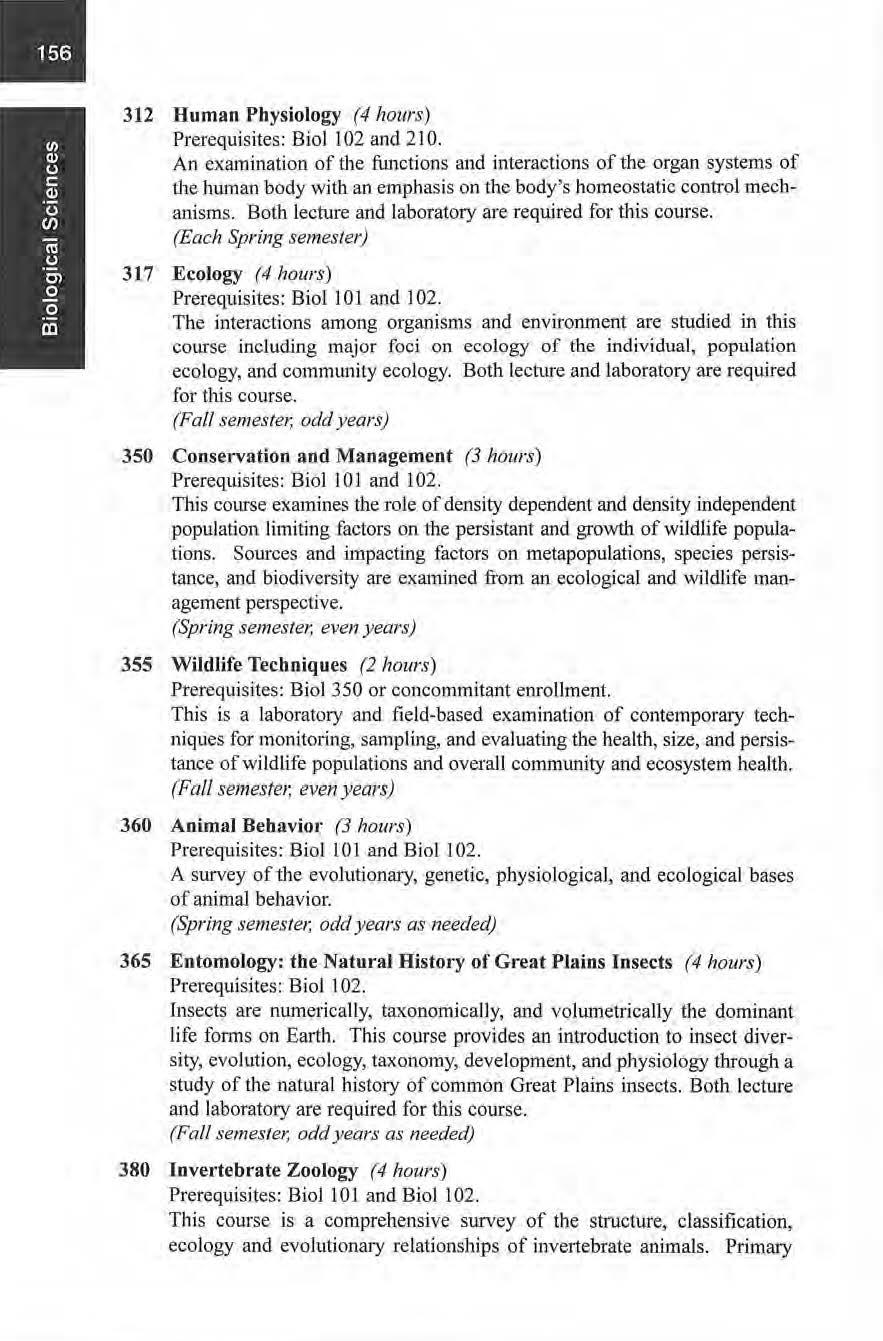
(Spring semest er, even years)
355 Wildlife Techniques (2 hours)
Prerequisites : Biol 350 or concommitant enrollment.
This is a laboratory and field-based examination of contemporary techniques for monitoring, sampling, and evaluating the health , size, and persistance ofwild lue populations and overall communi ty and ecosystem health.
(Fall se1n este1; even years)
360 Animal Behavior (3 hours)
Prerequisites: Biol LO 1 and Biol I 02.
A survey of the evolutionary, genetic, physiological, and ecological bases of animal behavior.
(Spring semeste1; odd years as needed)
365 Entomology: the Natural History of Great Plains Insects ( 4 ho urs)
Prerequi site s: Biol I 02
Insects are nwnerically, taxonomically, and volumetrically the dominant life forms on Earth. Thi s course provides an introduction to insect diversity, evolution , ecology, taxonomy, development, and physiology through a study of the natural history of common Great Plains insects Both le cture and laboratory are required for this course.
(Fa ll semeste1; odd years as n eede d)
38 0 Invertebrate ZooJogy (4 hours)
Prerequisites: Biol 101 and Biol 102..
This course is a comprehensive survey of the structure, classification, ecology and evolutionary relationships of i11ve11ebrate animals . Primary
focus is placed on the comparative anatomy and evolution of major invertebrate phyla. Both lecture and laboratory are requfred for this course.
(Spring semester, even years as needed)
398 Human Parasitology (4 hours)
Prerequisites: Biol 101 and 102.
The morphology, ecology, epidemiology, and evolution of parasites are studied in this laboratory cour se. Emphasis is placed on tbe diagnosis, co urse ofinfection, and clinical pathology of important human internal parasites. Both .l ecture and laboratory are required for this course.
(Spring semester, even years as needed}
404 Genetics (3 hours)
Prerequisites: Biol 101 and 102. This course prov ides an introduction to molecular, cellular, organismal, developmental and population genetics.
(Fall sem ester, odd years)
405 Histology and Biological Microtechnique (3 hours)
Prerequi sites : Biol 102.
The preparation, curation, and microscopic anatomy of animal and plant tiss ues are studied in this course. Topics include histological microtechnique, specimen fixation, differential staining and preparation of permanent mounts of whole and sectioned materials.
(Spring semeste1; even years as needed)
407 Developmental Biology (4 hours)
Prerequisites: Biol 10 1 and l 02.
This course is a study of the mechanisms of development in plants and animals . Both Jectm·e and laboratory are required for this course.
(Spring semeste1; even years as needed)
409 Advanced Ecology (3 hours)
Prerequisites: Biol 317.
The interactions among organisms and environment are studi ed in this course including major foci on tl1e role of genetics and adaptation on persistance and colonization by populations as well as the effects of landscape and spatia l scale on the ecology of t he individual , metapopulation, and community.

(Spring semeste1; odd years as needed}
412 Experimental Biology (3 hours)
Prerequisites: Biol 101 and 102, 8 hours upper division Biology courses, and Senior stand ing.
Students will conceive, design and conduct a se lf-contained experimental research project in biology. The resulting data and conclusions will be reported in the fo tm of a platfonn presentation and a technical manuscript. This is a capstone course for the Biological Science option and includes a student se11ior competency defense.
(Each Spring Semeste1)
414 lotemship in W ild l ife Managemen t (l-12 hours)
Prerequisites: 45 hours of completed coursework, 1ninimum 2.0 GPA, permission of Department Head and Natural Science and Wildlife Internship Coordinator.
This program allows wild l ife students to gain relevant work experience and establish professional relationships in their field of speciality. St udents may enroll for 1-12 hours of graded credit. A minimum of forty hours of work experience will be required for every hour of credit per semester. The student will complete necessary paperwork with employer and Wildlife lntemship Coordinator. The student's work wi ll be supervised and evaluated by the Wildlife I nternship Coordinator in cooperation with the employer. This is a capstone course for the Wildlife Ecology option and includes a student senior competency defens e. Arranged.
(Each semester; summer session)
420 Comparative Anatomy and Evolution of the Vertebrates (4 hours)
Prerequisites: Biol l 0 1 and 102.
The evolutionary rise and diversification of vertebrates is studied through a detai led analysis of comparative anatomical design among major vertebrate ta,"'{a in lecture and the use of comparative anatomical dissection technique in laboratory. Both lecture and laboratory are req11ired for th is course.
(Spring semester, odd years)
422 Biology of the Ectotberms : Ichthyo logy and Herpeto logy (4 hours)
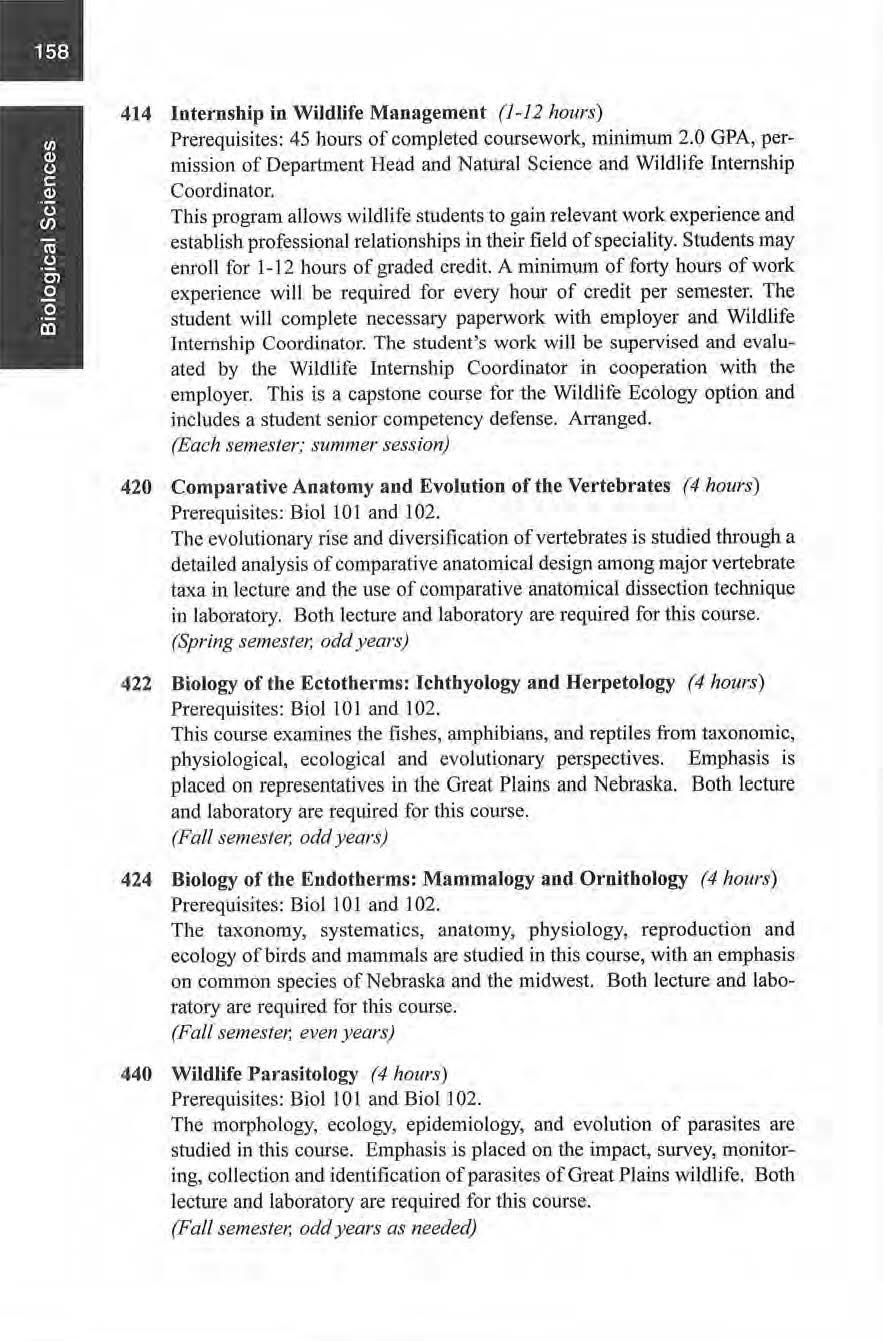
Prerequisites: Biol l OI and 102
This course examines the fishes, amphibians, and reptiles from taxonomic, physiological, ecological and evolutionary perspectives. Emphasis is placed on representatives in the Great Plains and Nebraska. Both lecture and laboratory are required for this course.
(Fa ll semester; odd years)
424 Biology of the Eudotberms: Mamma logy and Or nit hology (4 hours)
Prerequisites: Biol 101 and 102.
The taxonomy, systematics, anatomy, physiology, reproduction and ecology of birds and mammaJs are studied in this co urse, witl1 an emphasis on common species of Nebraska and the midwest. Both lectu re and laboratory are required for this course.
(Fa ll semeste1; even years)
440 Wildlife Parasitology (4 hours)
Prerequisites: Biol IO t and Biol 102.
The morphology, ecology, epidem iology, and evolution of paras i tes are studied in this course. Emphasis is placed on the impact, survey, monitoring, collection and identification of parasites of Great Plains wildlife. Both lecture and laboratory are required for this course.
(Fall semester, odd years as needed)
490 Undergraduate Research Thesis (3-6 hours)
Prerequisites: Permission of Mentor.
Type I and Type IT thesis options are ava il able and are completed in close cooperation with a faculty mentor. Type I Option: the student will conce ive, design and conduct an independent experimental research project in natural science. The resulting data and conclusions will be reported in the form of a platform presentation to a professional soc iety and/or a teclmical manuscript submitted for review/publicati on in a professional scientific journal. Type II Option : the student wi ll conceive, design and conduct an independent review of the technical literature on a specific topic in natural science. The resulting literature review and synthesis will be reported in the fonn of a platform presentation to a professional society and/or a technical manuscript submitted for review/publication in a professional scientific journal. This is a capstone course for the Bi ological Science and Wildlife Ecology options and includes a student senior competency defense An-anged (Each semester,· summer session)

497 Di rected Study in Biology (1-4 hours)
Prerequisites: Senior standing; prior approval o f th e Instructor and Dean of the School of Arts and Sciences. For mies concemjng Directed Study courses, please refer to page 69. (Each semester; summer session)
498 Special Topics in Biology (1-4 hours)
Prerequisites: Junior-Senior standing. Arranged.
(O.ffered as needed)
499 Ind e pendent Study in B iology (l-6 hours)
Prerequisites: Junior standing; prior approval of instructor and the Dean of the Schoo l of Arts and Sciences. For rules con cerning Independent Study courses, p lease refer to page 69. (Each semester; summer session)
137 Principles of Ma nagement (3 hours)
This course i.s a comprehensive int roductory course for managers in all organ izations. Planning, problem solving , goal attaining, controlling, and leading are studied in this course. Contemporary management issues and c unent trends that affect managers will be discussed .
(Each Fall semeste1 )
228 Wo rd Processing (I ho111)
Prerequisite: Keyboarding Ability. This course is an introduction to IBM-based word processing software. Development of proficiency using the selected word processing package is stressed.
(Offered as n eed ed)
229 Software Applications (3 hours)
Prerequisite: Keyboarding Ability.
This course is an introduction to IBM-based spreadsheet, database, and presentat ion graphics software cuJTently used in industry. Development of proficiency using selected commercial software packages is stressed.
(Each semester)
:231 Principles of Financial Accou ntin g (3 hour~)

Students are introduced to accounting as an information system that provides repm1s to stakeholders abot1t the economic activities and condition of a business Students learn about the complete accounting cycle, accounting systems and internal controls, and balance sl1eet accounts - cash, receivables, inventories, fixed and intangible assets, and cuITent li abilities .
(Each Fall se111es1e1)
232 Principles of Managerial Acco unting (3 hours)
Prerequisite: Bus 231.
Students contin ue their preparation in accounting by studying the accounting process for a corporation - organization, capital stock transactions, and dividends; income and taxes, stockho lders' equity, and investments i n stocks; and bonds payab le and investments in bonds. Other topics studied are: statement of cash flows, financial statements and analys is, managerial accounting and job order cost systems, process cost systems, cost behavior and cost-volume-profit analysis, and budget ing and performance evaluation using variances from standard costs.
(Each Spring semester)
25 1 Legal Environment and C ontract Law (3 hours)
This course examines the sources and origins of law and the legal system, legal processes, and fundamental legal principles, with an emphas is on the obligations of parties to a contract.
(Each Fall semester)
260 En trepren e urship (3 hours)
Prerequisite: CSci 100 or CSci I02. This course is designed for those interested in starting a small business. The areas covered will include writing a s mall business p lan, research in g markets, raising money, analyzing accounting records, and us ing infonnation technology.
(Offered as needed)
297 Directed St udy in Bu s iness (l -4 hours)
Prerequisite: Senior standing; prior approval of Instructor and Dean of the School of Professional Studies. For ru les concerning Directed Study courses, please refer to page 69,
(Offered as needed)
298 Special Topics in Business (!-4 hows)
Prerequisite: Freshman-Sophomore standing
(Offered as needed)
301 Orgauizatioual C ommunications (3 hour.1)
Prerequisite: Speh 152, Eng 20 l.
Students study commun ication foundations, the writing process, and communicating through letters, memorandums, a11d E-hiail messages. The culminating activity permits the students to understand the rep011 process and research methods, 1mmage data and use graphics, and organize and prepare reports and proposals for the design and delivery of business presentations.
(Each se mester)
313 Loss Prevention (3 hours)
This course is designed to impart the knowledge of internal security issues such as personnel sc reening, the identification of high-risk employees, m ethods of emp l oyee theft, honesty shopping, undercover detectives, interrogation principles, counseling, alarm systems, and perimeter security. External issues will include shoplifting, checks and credi t card security, forgery, burglary, and vendor fra ud. Dual listed as CJ us 313.
(Offered each Spring)
32 1 Desktop Publ ishing (3 hours)
Prerequisite: Eng 201, Bus 229, Abili ty to Type.
T hi s comse is designed to study and utilize the modern technologies of the computer scanner and laser printer to develop marketing and promotional communications. Emphasis will be placed on mastering computer programs in conjunction with design principles and functional applications of desktop publishing. Business comm1micafions in the fonu of reports, forms, brochures, newsletters, websites, and screen presentations will also be addressed.
( Offered as needed)
328 Principles of Marketing (3 hours)

Students learn the buying, se llin g, transpor ting, and storing flmctions involved in marketing, with an introduction to retailh1g, wholesaling, and marketing management.
(Each semester)
329 Promotion (3 hours)
Prerequisite: Bus 328 recommended.
Students examine the five e lements of the promotion mix including advertising, direct marketing, personal selling, sales promotion. and public relations/publicity, focus ing on the blending of lhe elements into an integrate d marketing communication program.
(Each Spring semeste1)
330 Designing Web Pages for Business (3 h ours)
Prerequisite: Bus 229.
This course will be an introd ucti on to the HyperText Markup Lan guage (HTML). HTML js the lan guage used to create a web page. Topics covered wi ll include: planning, defining design elements, page layout tools , pho -
tography, image maps, videos, audio animation and 30, setting up a web server, designing for s peed and efficiency, desi gning a se lf-promotion si te. How com mercial organizations score site design is also covered.
(Eac h Spring sem est e1)
331 Risk Management and In sunnce (3 hours)
This course is an introduction to the study ofrisk management and insurance (Ojj'erecl as n eeded)
332 Investments (3 hours)
Trus course utilizes economi c princ ip les in evalua1i n g the major uses of in vestment funds, in cl uding sav ings accounts in banks and other financia l institutions , government bond s, c-0rporate stocks and bonds, a nnu iti es, and real estate.
(Qffered as needed)
335 P roduction/ Opera tion s Management (3 hours)
Prerequisite: Bus 232, Econ 221, Math 340 recommended. This course explores a wide variety of production and operations m anagement topics Topics considered incl ude: operations strategy and competiti veness, product design, process selection, qual ity m anage ment, capacity management, Just-io-Tiroe (flT) producti on systems, faci lity location and layout, supply chain management, operations sch eduling, and the production p lanning process.
(Each Spring semester)
337 Intermediate Accounting I (3 hours)
Prerequisite: Bus 232, Bus 229 or P ermission of Instructor. This comse is a comprehensive study of accounting t heory and concepts relating to the ba lance sheet. in co me statement, statement of casb flows, cash, cuITent receivables. revenue recognition , and inventories.
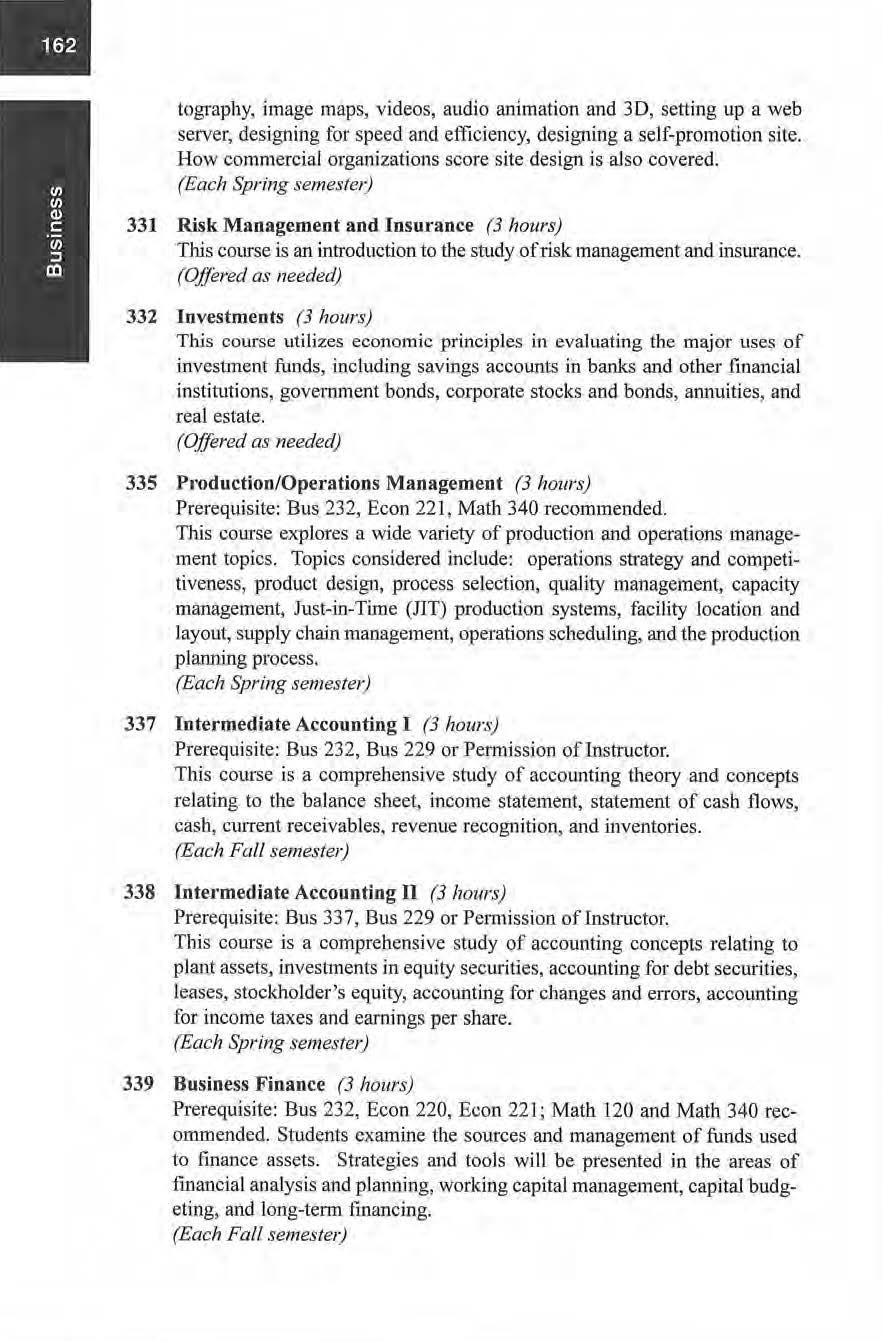
(Each Fall semeste1)
338 Intermediate Accounting II (3 hours)
Prerequisite: Bus 337, Bus 229 or Pe1n1ission of Instructor. Thjs course is a comprehensive study of accounting concepts re lat ing to plant assets, investments in equity securi ties , accounting for debt securities, l eases, stockholder's equ ity, account in g for ch anges and errors, accounting for income taxes and earnings per share.
(Each Spring sem estet)
339 Business Fina nce (3 hours)
Prerequisite: Bus 232, Econ 220, Econ 221; Math 120 and Math 340 recommended Students examin e the sources and management of funds used to finance assets Strategjes and too ls w ill be presented in the areas of financia l an alysis and p lanni ng, work ing capital management, capital budgeting, and long-tenn financing.
(Each Fall semeste,)
341 Federal Income Taxes - Individual (3 h ours)
Prerequ isite : Bus 232 .
This course detail s federal laws, regulations, etc., as they pertain to the income taxation of individuals. A review of the history of taxation is in c luded. Practice in tax return preparation and problem so lving is provided.
(Each Fall sem ester)
342 Accounting Information Systems Analysis and Design (3 hours)

Prereq uisite: Bus 232, Bus 229 or P e tmi ss ion oflnstructor. This cow-se provides an examinati on of accounting system concepts, app lications, and the pro cess by which they are analyzed, designed and imp lemented. An emphasis is placed on computer-based systems through the use of extensive case analysis.
(Each Fall sem es te , )
345 Real Estate Principles and Practices (3 hours)
This course presents real estate law as it affects interests in land, marketing, ownership, sa les, leases, and agencies. The financial, marketing, and m anage rial aspects o f rea l property will be introducecl This course has been a pprov ed by the Nebraska R ea l Estate Commission for pre-license education as #0040.
(Offered as n eeded)
346 Fi nancial Institutions and Markets (3 h ours)
Prerequisite: Econ 220. Students study the various institution s which constitute the Uni ted Stat es finan cial system. Analysis of financial market dynamics and the mechanics of interest rate determination are also covered.
(Offered as needed)
347 Consumer Behavior (3 h ours)
Prerequis ite: Bus 328.
Thi s course is d esigne d to impart the principles of consumer behavior in the areas of motivation, perception, learning, attitude change, inf01mation processing, life -sty le, demograph ics, social class, refe rence groups, o pinion leader s and diffusion , family and culture, and shoppJng e nvironments.
(Eac h Fall sem ester)
348 Retail Management and Merchandising (3 hours)
Prereq uisit e : Bus 328.
Tbis course is designed to impart the pr inc iples of retailing in cluding strategies, m erchandise management. sto re operatio ns, evalua tion and control, fin ancial strategies, human resources management, buying and selling, information sys tems, prom ot ions , and inventory control.
(Each Spring semester)
350 Sa lesmanship (3 hoiirs)
Students focus on the skill s and tec hnique s used in se lling and persuasion. The course is designed to help the studen t learn to sell products and ideas through a study of proven techniques used by success ful salespeople.
(Each Fall sem ester)
35 1 Com mercia l Law (3 hours)
Prerequisite: Bus 251.
This course examines the legal principles covering sa les contracts and negotiable it,strnments under the Unifonn Commercia l Code, properly ownership, bailrnents, corporations, partnersh ips, and other business organization s.
(Each Spring semester}
353 Organization a l E thics (3 hours)
This course applies ethical concepts and principles to moral issues in business: corporate responsib ility, discriminati,o n, advertising, competition, whistle-blowing, trade secrets, multinationa ls, environment, WOl'kers' rights, government regulation, investment, bribes, product li abili ty, and consumerism.
(Each Spring semeste1)
360 Rea l Esta te Fina nce (3 hours)
Prerequisite: Bus 345.
This co urse is a detai led analysis of the methods and techn i ques of financing the purc h ase of real estate. Areas of study i ncl ude fund sources, analysis of mortgage risk, FHA underwriting, other government influences and agencies, legal aspects , and the polic ies and proced ures of lending institutions . Th is course has been approved by tbe Nebraska Real Estate Comm ission for pre-license education as #0042.

(Offered as needed)
361 Re al Estate L aw (3 hours)
Prerequisite: Bus 345.
Students Jeam the legal implications of estates in land. deeds, leases, mortgages, easements, zoning ordinances, covenants, trespass, nuisance, licenses, inv itees, and descendants ' estates. This course has been approved by the Nebraska Real Estate Commission for pre-license education as #0041.
(Offered as needed}
371 C ost/Managerial Accou n ting (3 hours)
Prereq Ltisi tes: Bus 232, Math 120, Math 340; Bus 229 or Permission of instructor.
This cmirse covers the accounting concepts and procedw·es pertaining to cost/managerial reporting . Major topics are cost flows, al location of indirect costs, job order costing and process costing, and the accounting for lost units, joint products, and by products
(Each Fall semester)
372 Advanced C os t/M a nagerial Acc ountin g (3 hot,rs)
Prerequisites: Bus 335, Bus 371.
This course covers standard costing, variable costing, relevant costing, designing a maste-r budget, inventory con trol and production, capital budgeting, and designing a cost system for measuring organizational perfonnance
(Each Spring semeste,~
373 Orga nizational Be havio r (3 hours)
This co urse presents the foundations of the history, theory, and applications of organizational beb,avior in the areas of personality, stress, motivation, job design, goa l setting, learn ing theory, behavior modification, group behavior, power, leadership, organizational structu re, decision-making, and control.
(Each semestet)
374 Ad van ced Spreadsheet Applications (3 hours)
Prerequisite: Bus 229.
This course will cover advanced techniques in spreadsheet applications us ing business applications for the coursework. Advanced commands and some macro programm ing will be covered. Advanced spreadsheet applications will be11tilized for case analysis including spreadsh eet modeling, information system development, and automated fonns-oriented database management.
( Qffered as needed)
380 Hum a n Resources Management (3 hours)
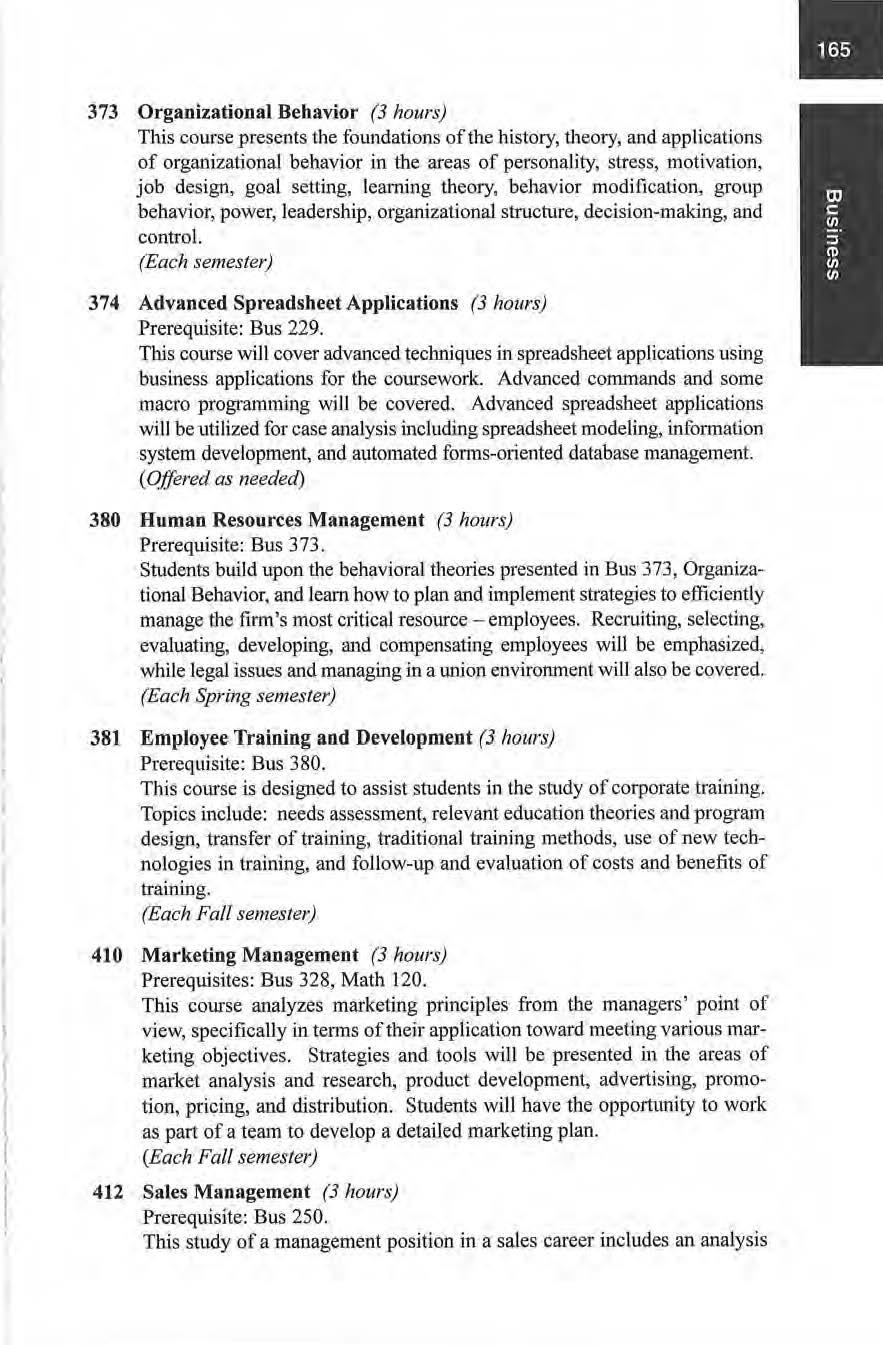
Prerequisite: Bus 373.
Students build upon the behavioral theories presented in Bus 373, Organizational Behavior. and learn how to plan and implement strategies to effic ient ly manage the firm's most c1iticaJ resource - employees. Recruiting, selec ting, eval uating, developing, and compensating employees will be emphasized, while legal issues and managing in a union environment will also be covered.
(Each Spring semester)
381 Employee Training and Development (3 hours)
Prerequisite: Bu s 380.
This course is designed to assist students in the study of corporate training. Topics include: needs assessment, relevant education theories and p rogram des ign, transfer of training, traditional training methods, use of new technologi es in training, and follow-up and evaluation of costs and benefits of training.
(Each Fall semestet)
410 Marketing Management (3 hours)
Prerequisites: Bus 328, Math 120. This course analyzes marketing principles from the managers' point of view, specifically in terms of their application toward meeting various marketing objecti ves . Strategies and tools will be presented in the areas of market analysis and research, product development, advertising, promotion, pricing, and distribution. Students will have t he opportunity to work as part of a team to develop a detailed marketing plan.
(Each Fall semester)
412 Sa les Management (3 hours)
Prerequisite: Bus 250.
Th is study of a management position in a sales career includes an analysis
of such tasks as recruiting, interviewing, and hiring salespeople. Other areas of s tudy are training and motivating, compensation methods, assigning territories, and coordinating with other managers.
(Offered as needed)
413 Purcbasiog and MateriaJs Management (3 hourl)
Prereq11isite: Bus 328.
The study of the procwing of industrial materials includes such topics as SIC codes, negotiated contracts, reci procity, buying committees, and bidding procedures. Buying motives are studied as are procedures such as stTaight rebuying, value analysis, inventory analysis, and other topics from the buyer's viewpoint.
(Offered as needed)
414 Supervisory Skills and Practices (3 hours)
Students learn the basics of effective supervision including worker motivation, leadership styles and practices, communication with workers, selection, promotion, compensation, training, counseling, evaluation and discipline aJJ within the confines of front-line management.
( Offered as needed)
420 Federal lncome Taxes - Corporate, Partnerships, Fiduciary (3 hours)
Prerequisites: Bus 232, Bus 341.
Students study federaJ laws, regulations, etc., relating to estate and gift taxation and income taxation of partnerships, corporations, and fidnciaties. Practice in tax return preparation and problem solving is provided,
(Each Spring semester)
421 Accounting Tbe01-y (3 hour~)
Prerequisite: Bus 338
This course is a s tudy of theoreti cal considerations in asset measurement and income detennination. Emphasis is placed on pronouncements of recognized accountfog authorities.
(Each Spring semester)
430 lndustriaJ Marketing (3 hours)
Prerequisite: Bus 328.
S tudents analyze industrial di s tribution considering organizational consumers, demand , buying process, and strategies. Understanding planning, product lines , channels, logistics, pricing, and promotion are included.
(Offered as needed)
431 Small Business Management (3 hours)
This course studies planning, requirements, resources, and operations involved in small business management/ownership.
(Offered as needed)
441 Busioe.ss Administration Internship (1-12 hours)

Prereq uisite: 45 hours of complete d coursework, minimum GPA 2.0; Permiss ion of the Business Department Head.
This program is designed for students with a major in Business to gain
work experience related to their m~jor and career goals. Students may enroll for 1-12 hours of graded credit. A minimum of forty (40) hours of work experience will be required for every hour of credit per semester. The student will complete necessary paperwork with the employer and the School of Professional Studies office. The student' s work will be s upervised and monitored by the Business Department H ead. A final paper will be prepared at the conclusion of the intern ship. Three (3) semester hours of Bus 441 and/or Bus 442 may be applied toward the Management option.
(Each semester)
442 Business Administration Internship (1-12 hours)
Prerequisite: 45 hours of completed coursework, minirrrum GPA 2 .0; Permission of the Business Department Head. This program is designed for students with a major in Business to gain work experience related to their major and career goals. Students may enroll for 1- 12 hours of graded credit.. A minimum of forty (40) hours of work experience will be required for every hour of credit per semester. The student will complete necessary paperwork with the employer and the School of Professional Studies office. The student 's work will be supervised by the Business Department Head. A final paper will be prepared at the conclusion of the internship. Three (3) semester hours of Bus 441 and/or Bus 442 may be applied toward the Management option.
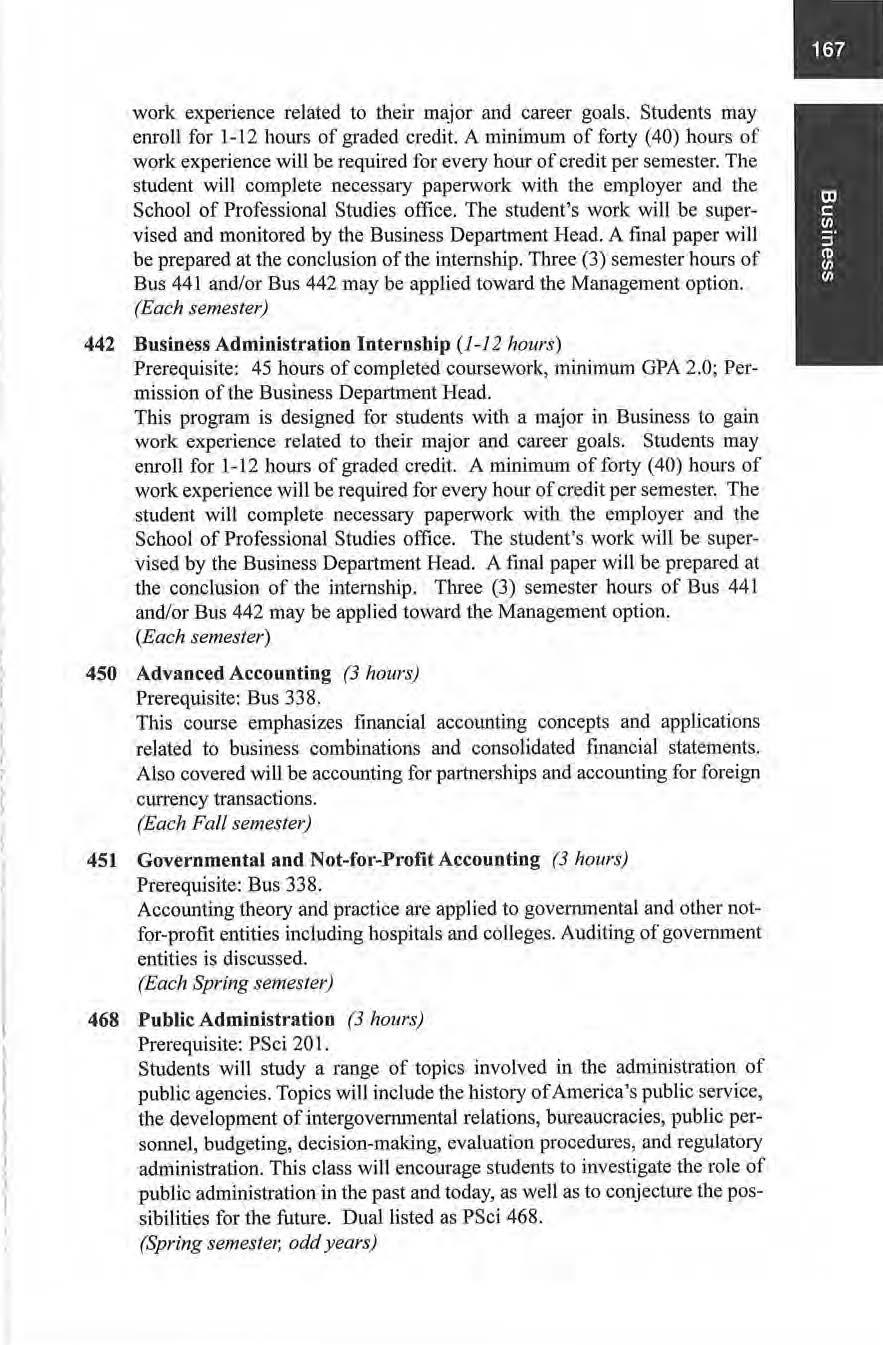
(Each semester)
450 Advanced Accounting (3 hours)
Prerequis ite: Bus 338. This course emphasizes financial accounting concepts and applications related to business combinations and consolidated financial statements. Also covered wiU be accounting for partnerships and accounting for foreign currency transactions.
(Each Fall semester)
451 Governmental and Not-for-Profit Accounting (3 hours)
Prerequjsrte: Bus 338.
Accounting theory and practice are applied to governmental and other notfor-profit entities including hospitals and colleges. Auditing of government entities is discussed.
(Each Spring semester)
468 Public Administration (3 hours)
Prerequisite: PSci 201.
Students will study a range of topics invo lved in the administration of public agencies. Topics will includ e the hjstory ofAmerica's public service, the development of intergovernmental relations, bureaucracies, public personnel, budgeting, decision-making, evaluation procedures , and regulatory admin istration. This class will encourage students to investigate the rnle of public administration in the past and today, as well as to conjecture the possibilities for the fu t ure . Dual listed as PSci 468.
(Spring semeste,; odd years)
470 Auditi ng (3 hours)
Prerequisite: Bus 338, Bus 342. This course covers generally accepted aud iting standards ai1d procedures and the philosophy supporting them. Auditing techniques avai lable to the independent public accountant are also studied.
(Each Spring semeste,)
480 International Business (3 hoL1rs)
Prerequisite: Bus 328, Bus 339, and Bus 373. Students learn contemporary business and management practices in multinational market environments with emphasis on cultural, fiL1anciaJ, and marketing differences.
(Each Fall semeste1)
492 Marketing Strateg ies (3 hour:,)
Prerequisite: Bus 328, Bus 410. The case-study approach is used to instill the methods of marketing analysis for decision-making. Companies in a variety of industries will be considered. Specific components include financial analysis, situation analysis, strategic planning activities, problem and opportunjty analysis, generation and evaluation of alternative marketing programs, defining measurable objectives, and marketing mix/program dec ision s. Studen ts are encouraged to truce this course the semester immediately fo ll owing Bus 410, Marketing Management.

(Each Spring semester)
495 Business PoJicy (3 hours)
Prerequisite: Senior business major having comp leted 45 semester hours of business major including Bus 229, Bus 328, Bus 339, Econ 220, and Econ 221. Recommended for student's last semester.
As the capstone course for Business Administration stu dents, sen iors in the program will be required to demonstrate their ana lytical , communication, and so lution development competencies thrnugh oral and written presentation of business case reports. Students wi ll also have the opportunity to prepare and present a company or industry situation analysis.
(Each semester)
496 Organiz ation a l Leadership (3 hours)
Prerequisite: Students must h ave completed a minimum of one,.half of the business courses required in their major including Bus 373, Organizational Behavior.
As the capstone course for Bachelor of Techn ology - Management, seniors in the program will be required to demonstrate their analytical, communication, and solution developmem competencies through preparation of business case reports covering a wide variety of organizational issues. Preparati on of a final comprehensive report will a l so be required.
(Offered ojj~campus onl;1
497 Directed Study i n B us iness (1-4 hours)
Prerequisite: Senior standing; prior approval of Instructor and Dean of the School of Professional Studies. For rules concerning Directed Study courses, p lease refer to page 69.

(Offered as needed)
498 Special Top i cs i n B us in ess (J-4 hours)
Prerequisite: Junior-Senior standing.
(Offered as needed)
499 Ind epen de n t Stu dy i n B us i ness (1-3 hours)
Prerequisite ; J uniot: standing; prior approval of Instructor and the Dean of the Schoo l of Ptofossional Studies. For mies concerning Independent Study courses, please refer to page 69.
(Offered as needed)
Chemis try
101 Ge nenl C hem is try I (5 hours)
Prerequisites: High school algebra. An introducti on to the fu ndamentals of chemistry. Topics such as atom.ic theory, chemical bondi ng, stoichiometry, solutions, and p H are covered. Both lecture and laboratory are required for this course.
(Each Fall semester)
102 Ge nei-a l Chemistry II (5 hours)
Prerequisites: Chem 101.
This course is an application of the fundamentals of chemistry, including states of matter, ox idation-reduction, tl1ermocbemistry, chemical equilibrium, kinetics, nuclear ch emistry, and descriptive chemistry. Both lecture and laboratory a re required fo r this course.
(Ea ch Spring semester)
205 Principl es of Qua lita tive An alysi s (4 hours)
Prerequisites: Chem 101 , Chem 102. This course presents the fw1darnental principles of qualitative analysis and their technical application in the laboratory. Both lecture and laboratory are required for thi s course.
(Fall semester, even years as needed)
2 06 Pri ncipl es of Q uan tit ative A n alysis (4 hours)
Prerequisites: Chem 205.
This course continues to present the fundamental principles of quantitative analysis and their technical application in the laboratory. Both lecture and laboratory are reqnired for this course.
{Spring semester, odd years as needed)
29 7 Directed Stu dy i n C hemistry (J-5 hours)
Prerequisites: Senior standing; prior approva l of Instructor and the Dean of the School of Arts and Sciences.
For rules concerning Directed Study courses, please reger to page 69.
(Offered as needed)
298
Special Topics in Chemistry (l -5 hows)
Prerequisites: Freshman-Sophomore standi ng . Arranged.
(Offered as needed)
301 Introductory Organic and Biocbemistry (4 hours)
Prerequisites: Che m I OJ, Chem 102.
This is a condensed conceptual course in organic and biochemistry. Thi s cou rse serves as a tenninal organic and biochemistry course for the Natural Science option. lt also serves as a preparato1y course for Biochemistry and Biochemical techniques. Both lecture and laboratory are required f01· this cow·se.
(Fall Semester, odd years)
303 Organ ic Chemistry l (5 hours)
Prerequis i tes: Chem IO 1, Chem l02.
This course introduces the chemist:ty of aliphatic and aromatic compounds, reaction mechanisms and stere ochemistry Both l ectu re and laboratory are required for this course
(Fal l se111este1; even years)
304 Organic Chemistry TI (5 hours)
Prerequisites: Chem 303.
This course is a continuation of Chem 303 with emphasis on the chemjstry and detectiot1 of functional groups. The laboratory e mphasi s is on methods of qHalitative organic analysis. Both lecture and laborat01y are required for this course.
(Spring semeste,; odd years)
431 Biochemistry and Biochemical Techniques (4 hours)
Prerequisites : Chem 30 1 or Chem 303.
The chemical foundations of molecular biology with an emphasis on the molecular aspects of intermediary metaboJism a re studied. Both lecture and laboratory are required for this course.
(Fall semeste1; odd years)
461 Molecular Biology and Molecular Techniques (4 hours)
Prerequisites: Chem 431.
T he foundation techniques of molecular biology with an emphasis on the molecular natlU'e and function of gen es and contemporary molecular techniques. Both lecture and laborato1y are r equired for this co urse.
(Spring semester, even years)
497 Directed Study io Chemistry (1 -5 hours)
Prerequisites: Senior standing; priot approval of instiuctor and the Dean of the Schoo l of Arts and Sciences For rules concerning Directed Study courses, please refer to page 69.

(Each semester; summer session)
498 Sp ecial Topics in Chemistry (1-5 hours)
Prerequ isites: Junior- Senior standing. Arranged.
(Offered as needed)
499 Independent Study in C hemistry (J-6 hours)
Prerequisites: Junior standing; prior approval of Jnstructor and the Dean of the Schoo l of Arts and Sciences. For rules conceruij1g Independent Study in Chemistry courses, please :refer to page 69.

(Offered as needed)
100 Introduction to Computer Applications (3 hours)
This course provides an overview of the history and evolution of computers and software. Issues such as the future of computers, their social impact, and the ethics of computer use are also con sidered. Students receive direct instruction and directed experience on an integrated software package that includes word processor, spreadsheet, and data fil e manager. Both lecture and laboratory are required for this cow-se.
(Each semester)
102 Introduction to Computer Concepts (3 hours)
This course i s designed to develop a general knowledge about computers. Th is includes technical knowledge about hardware a nd software with regard to their op eration and how they are used to solve problems. The course also includes an awareness of how computers affect society. Students will use software simulation projects that demonstrate tbe use of the computer to solve common problems.
(Each semester)
103 Visual Basic Programming (3 hour:,)
Prerequisite: CSci 110.
The Visual Basic language and its application to problem solving in mathematics, sc ience, and business. Microcomputer applications are emphasized, starting with simp le operations and progressing into string manipulation, arrays, subroutines, graphics and file ma11ipulation.
(Each Spring sernesler)
110 Programming Logic and Design (3 hours)
This course is for students who plan to take courses in computer science or data processing above the 100 level. Students use flowcharts, pseudocode and other design techniques to l earn beginning computing concepts, constructs of an algorithmic language, control structures, subroutines, simple data types and compound data types (such a records, arrays, and strings).
Processing of strings, li sts and files is introduced. Developing programs and problem-solving using the top-down design approach i s emphasized throughout. Students also become acquainted with the UNIX operating system.
(Fa ll semester)
203 COBOL Programming (3 hours)
Prerequisite: CSci 110.
An introduction to AN S COBOL and its app licat ion to business computing.
This course emphasizes structured analysis and design of programs illustrating business applications.
(Fall semester, odd years)
20 4 Co mputer Programming I (3 hours)
Prerequisite: CSc i 110.
This course provides an introduction to programming and algorithm development using C++ with elements of program structure and subprogram usage. Problem so lving techniques, includin g stepwise refi nement, are appli ed to problems in mathematics and business with algo,ithms for searching, merging, and sorting introduced.
(Each Spring semeste,)
206 Co mputer Programm i ng ll (3 hours)
Prerequi site: CSci 204.
The study of stepwise refinement and object-oriented programming, testing, and debugging is continued with an emphasis on string processing, internal searc hing and so1tiog, and recursion . Data structures including stacks. queues, deques and linked li sts are also built and man ipulated.
(Eac h Fall semester)
220 Netwo rk A dministration (3 h ours)
Prerequis ite: CSci 110.
This course is an introduction to the fundamental principles of data communication and connectiv ity. The students will have hands-on experience in managing a local area netv;ork. Topics include communication media, hardware, message flow with protocol, netwo rking analysis, management of data communication systems and administration of loca l area networks.
(Each Fall semeste,)
297 Directe d St udy in Computer Science (1-4 hours)
Prerequisite: Senior stan ding; prior approva l oflnstructor and Dean of the School of A11s and Sciences. For ru les concerning Directed Study courses, please refer to page 69.
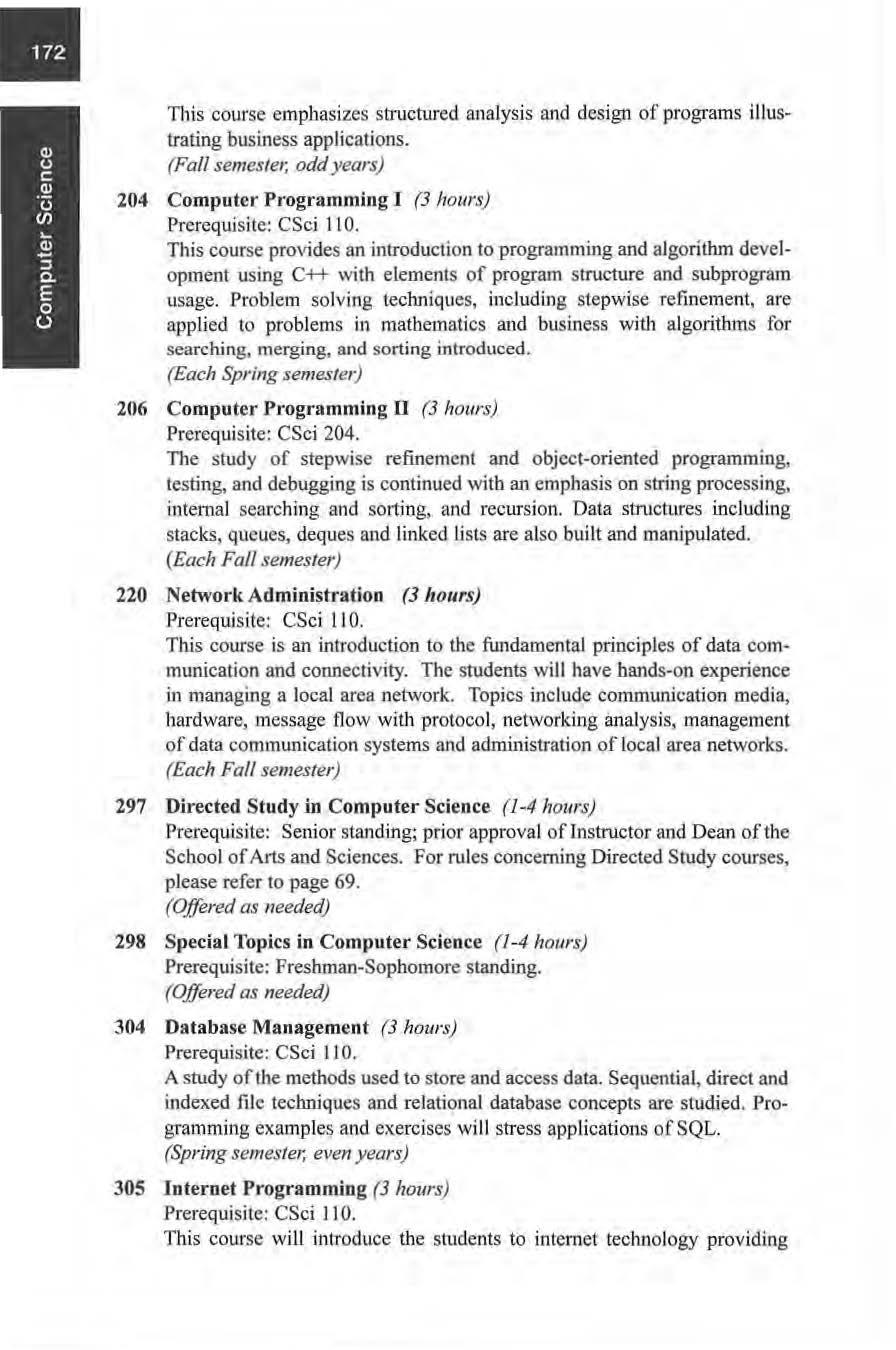
(Offered as needed)
298 Spec ial To pics in Co mputer Sci e nce (l-4 hours)
Prerequisite: F reshman-Sophomore stand ing
(Offered as needed)
3 04 Database Management (3 hours)
Prerequisite: CSci 110.
A study of the methods used to store a nd access data. Sequential, direct and indexed file techniques and relati onal database concepts are studied. Programming exa mples and exerc ises wil l stress app li cations of SQL. (Spring semester; even years)
305 Internet Programming (3 hours)
Prerequisite: CSci 110.
This course will in troduce the stude nts to inteme! technology providing
breadth in the field and devel oping skills in designing compute r p rograms that work with internet teclmology. The course wi ll emphasize th e fundamentals of the internet, web servers and browsers, HTML a nd XML, c lient side programs using Java Sript, ser ve r side programs using Perl and Java, popular web servers and database connectivity through the web (Fa ll semester, even years)
306 Operatin g Systems and Computer Arch itecture (3 hours)
Prerequi site: CSci 206.
Operating systems principles and relationsh ips between operating systems and computer architecture are studied including procedure activati on, system structure, system modeling and evaluation, memory management, process managem e nt, interrupts, scheduling, and recovery procedures (Spring semeste1; odd years)
312 Systems Analysis and Design (3 hours)
Prerequisite: CSci 203 o r 204.
This course is a study of the methods used in des ign of compu ter programs and app l ications systems, with emphasis on Compu ter Aid ed Software Engineeri ng (CASE) tools and prototyping u sing fourth generation languages (4GL).
(Spri ng semeste,; even years)
315 Computer Organization (3 hours)
Prerequ is ite: CSci 110.
The organi zation and structure of the hardware compone nt s of computers are covered w ith logic design, number representation an d arithmetic, com~ puter architecture, and interfacing are emphasize d in this course . A detailed laboratory study of a represen tative micro-processor system is a major portion of the course.

(Spri ng semeste,; odd years)
320 Network Implementa tion (3 hours)
Prerequisite: CSci 220.
T his course is an in-depth study of the technical issues associated with local area network s Topics include digital transmission fu nda m ental s, networking protocols, advanced network architectures, security protocols as well as configuration and installation of loca l area networ ks.
(Spring semester, even years)
404 Data Structures and A nalysis of Algorithms (3 h ours)
Prerequisite: CSc i 206 and Math 23 0.
This course is a study of the inte rnal representati on and manipulation of data. The topics covered include stacks, que ues, lists, tree, graphs and graph and tree a lgorithm s; design and an alysis of sorting, merging, and searchi ng a lgolithms; memor y allocation an d deaJ locatiOJ'I, and database management systems .
(Fall semes ter. odd years)
406 Organization of Programming Languages (3 hours)
Prerequi site: CSci 206
Thi s com·se is a study of the structure and impl ementati o n of computer languages. TI1e topics covered include language definition and structure, data types and structure, control s tructures, run time considerations, compilers and interpreters, lexical analysis, and parsing.
(Fall semeste1; even years)
408 Senior Proj ect (3 hours)
Prerequis ite; CSci 312 or 404.
The student will s tudy the analysis, des ign, implementation, testing, and documentation ofa complete system. This project is chosen in consultation with the ins tructor to apply skills and integrate knowledge acquired in undergrad4ate studies. This is the capstone course and senior competency for the Computer Science major.
(Spring semester)
441 lnternship in Computer Sc ien c e (1-12 hours)
Prerequisite: Pennission ofDcparlment Interns hip Coo rdinator. This program allows computer science students to gain rel evant work experience and establish profe ss ional relationships in computer sc ience. Students may enroll for 1-12 hours of graded credit. A minimum of forty hours of work experience will be required for every hour of credit per semester. The student will complete necessary paperwork with employer and the Computer Science [ntemship Coordinator. The student's work wi ll be supervised and evaluated by the Computer Science Internship Coordinator in cooperation with the employer.
(Each semester)
497 Directed Study jn Computer Science (1-4 hours)
Prerequis ite: Senior standing; prior approval of lnstrnctor and Dean of the School of Arts and Sciences. For rules concerning Dirncted Study courses, please refer to page 69.
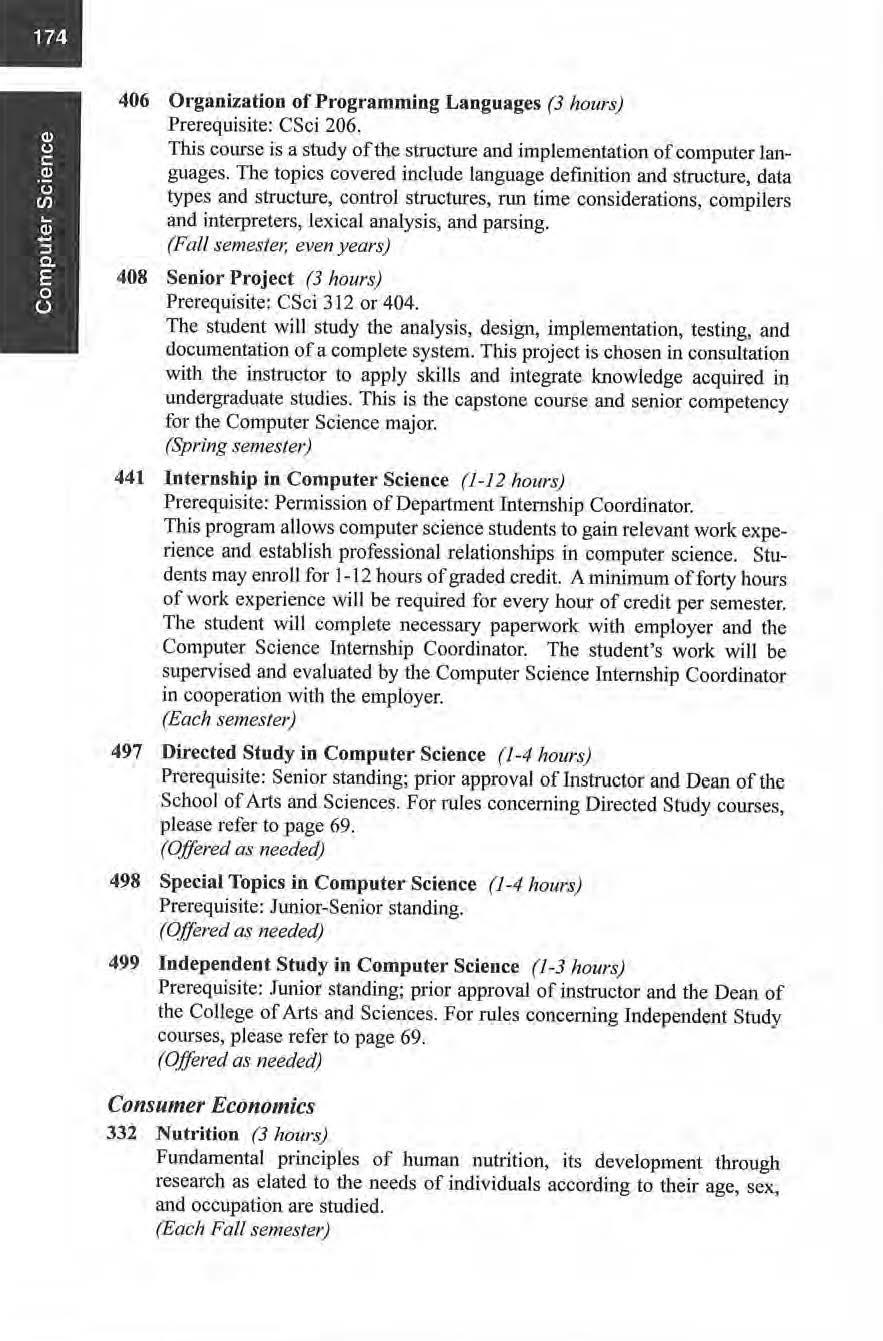
(Offered as needed)
498 Special Topics in Computer Science (1 -4 hours)
Prerequisite: Junior-Senior standing.
(Offered as needed)
499 Independent Study in Computer Scie nce ( l-3 hours)
Prerequis ite: Junfor standing; prior approval of instructor and the Dean of the College of Arts and Sciences. For rules concerning Independent Stu dy courses, please refer to page 69.
(Qffered as needed)
332 NutJ•ition (3 hours)
Fundamental principles of human nutrition, its development through research as elated to the needs of individuals according to their age, sex, and occupation are s tudied.
(Each Fall semester)
110 Su rvey of C ri minal J u stice (3 hours)
This course introduces students to general criminal justice concepts and knowledge about the relationships of c r ime and cri minal behavior. The purpose, role, and i nterrelationships of the police, other law enforcement officials, the courts and judiciary, corrections, and parole system will be discussed.
(Each Fall semester)
220 [ntrod uction to Cor rect ions (3 hours)
Prerequisite: CJu s 110.
This course is a general introductory course that describes the history and development of co rrecti ons in America, the various aspects of conectional practices, and is s ues and perspectives affec tin g institutional life wi thin the correctional system. Organizational and administrative practices will be exam ined.
(Each Spring semester)
230 Polici ng in Ame ri ca (3 hours)
Prerequisi te : CJus 110.
This course covers the major roles of the police in American socie ty The course will investigate the o rigins of policing and law enforcement, police organization, the functions of police in society, and the polices' relationships to the various components of the c riminal justice system. fssues confrontin g police administration will be discussed.
(Each Fall semester)
297 Directed St ud y in C rimi nal .Ju stice (1-4 hours)
Prerequisite: Senior standing; prior approval oflns tructor and Dean of the Sch oo l of Professional Studies. For rules concern ing Directed Study courses, please refer to page 69.

(Offered as needed)
300 Organization and Admi nistratio n of J ustice (3 hours)
Prerequi s ites: C Jus I lO.
This course will examin e hi storical , as well as Lheoretical. aspects o r the organization and adm ini stration of tJ1e police, co urts, corrections and juvenile justice systems. The ro les and func tions of personnel and administrative management is s ues and practices that span a nd influe nce the justice and human services syste m are cliscussed.
(Each Fall semester)
3 0 8 C om mu nity-Base d Co rrecti on s (3 ho urs)
Prerequ is ite: CJus 110.
This course focuses on correct iona l processes a nd strate gies regarding probation, parole , juveniles, diversion. and other innovative approaches applied in a commw1ity setting.
(Each Spring sem ester)
313 Loss Prevention (3 hours)
Prerequi site: CJ us 110.
Thi s co urse is de sig ned to impart the knowled ge of internal secw·ity iss ues suc h as personnel sc reening, the ide ntificat io n of hi g h-ri sk e mployees, methods of employee th eft, honesty s hoppin g, undercover detectives, int errogatio n princip les, counse l ing, alann systems, and perimete r security. Ex ternal iss ues wi l l includ e s hoplifting, checks and c redit card security, fo rgery, burglary, and vend or fraud. This co urse is cross-li sted as Bus 3 13.
(Each Spring semester)
33 0 Research Methods (3 hours)
Prerequi sites : CJus 110.
This is an introductory course that co ncentrates on research method s and designs and not on s tati s tfoal analysis procedures u sed in research proj ects. This course demonstrates how res ea rch methods are utilized in the social and behavioral sciences. This course is cross -l isted w it h Psyc 33 0. (Each Fall semester)
340 C riminal Law (3 hours)
Prerequis ite : CJ us 110.
This course will focus o n the concepts of case law as they pertain to due process , interpretation of cri minal s tatutes, el e ments of evidence and proof from a l egal standpoint, and principal mies o f crimi nal case proces si ng. Co ntemporary cr iminal law iss ues confronting law en fo rcement o ffi c ial s from crim e prevention to court appearance are a lso consi dered.
(Each Spring semester )
360 C rimin ology (J hours)
Prerequisite: C.Ju s I J0.
This course examines the nature and causes of crime as a socia l phenomenon.
(Each Spring semester)
385 Victimology (3 h o urs)
Prerequisite: CJ us 110, Juni or o r Se ni o r standing. This course wi ll focus o n the theore tical pers p ectives of victimization, the sco pe of v ic timization in the United States, the jus tice system's response, vic tim's r ights, top ical issues, res!orative j us ti ce, and res earch and evaluati o n fmdin gs. B eing ex.posed to and understanding victi mization issues will facilitate student' s know led ge about a comprehens i ve system of justice rather than a "criminal 's jus tice system "
(Eac h Fall semester)
41 0 Ju venil e Delinqu e ncy (3 hours)
Prerequisite: CJ us 110.
This co urse foc uses on the nature a nd extent of delinquen t acts and status offenses hi s toricall y, theore ti ca l approaches to explain w hy these behavi ors develop, environmental/contextual approaches to ex planation, and how the jus tice system and soc iety res pond legally. A var iety of c ultural and soc ial facto rs re lated to de linquency arc examined , along with program imp lications for prevention and interventi on.
(Each Faff semester)
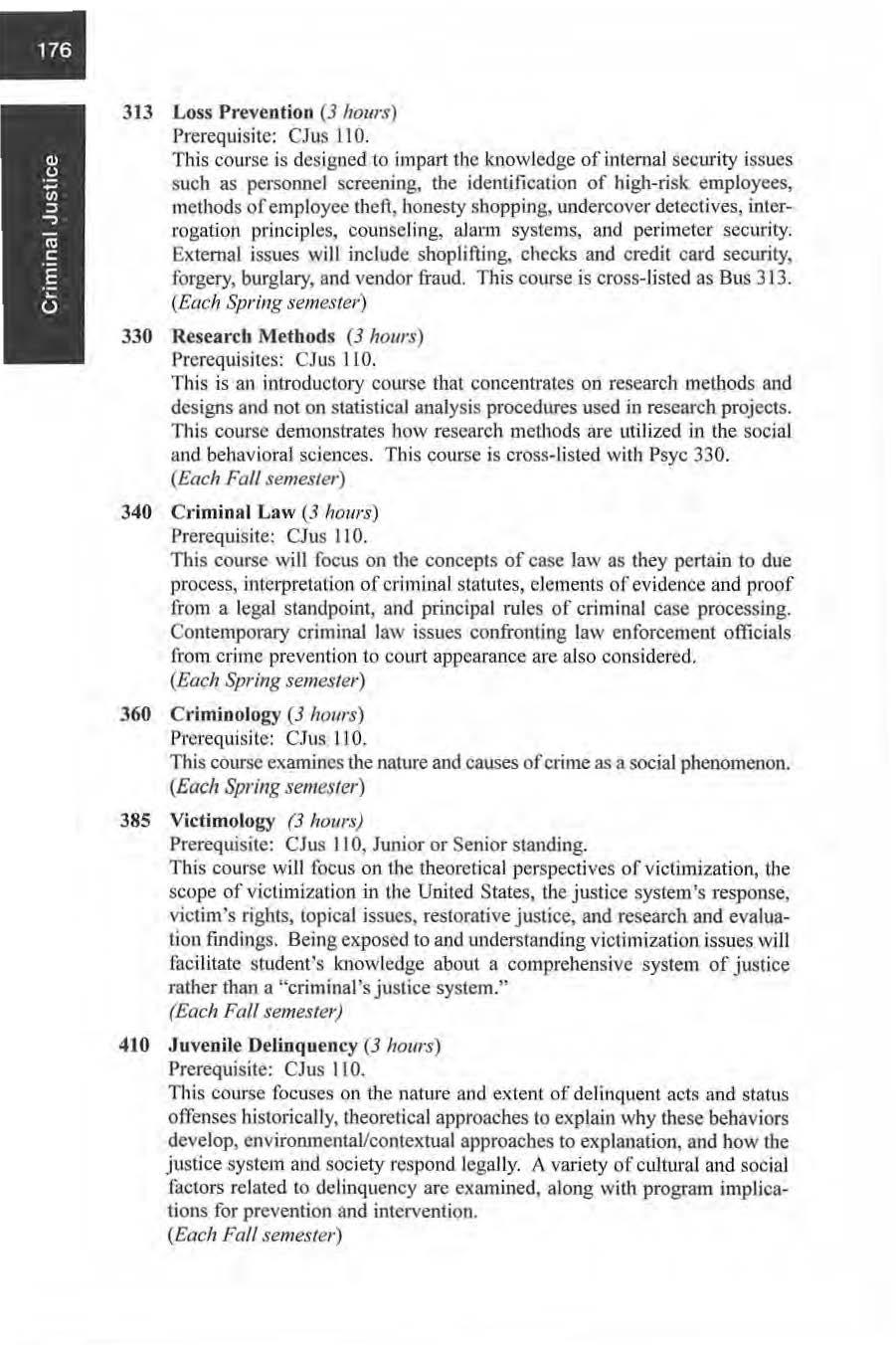
420 .Ju dicia l Systems and Processes (3 hours)
Prerequisites: CJus I I 0.
Tbis ooutsc provides an overview of the structure and functions of the criminal court system in the Uni ted States, including coun ty, stare, federa l, and specialized courts. Particular emphasis will be placed o n the Ne braska Courts. Ro les of cou ,i personnel, case flow management, a variety of issues confronting the court system, cowt standard s are compared with actual functioning, a nd court refonn measures are included.
(Each Fall semes ter)
44 1 C rim ina l Justice Internsh ip (l-12 hours)
Prerequisite: Approval from the Criminal Justice/Psychology Department Head.
This course is designed for any student majoring in C riminal Ju stice A m inimum of forty hours of work experience will be re quired fo r each h our of credit for which the snide nt enrolls. The student wil I complete necessary paperwork with employer and the School of Professional Studies office. The s tudent 's work wilt be supervi sed and monitored by the Criminal Justice/P sychol ogy Department 1--l ead. A final paper will be prepared at th e conclusion of the internship.
(Each semeste1)
442 Crimin al Justice lnterns bip (1-12 hours)
Prerequisite: Approval from the Criminal Justice/Psychology Department H ead.
Thi s course is designed for any student maj oring in Crimina l Justice to complete a second internship. A minimum of forty hours of work experie nce wi ll be required for each hour of credit for which th e st udent enrolls. The student will complete necessary paperwork with em ployer and the Schoo l of Professional Studies office. The student's work will be supervise d by the Criminal Justice/Psychology Department Head . A final paper will be prepared at the conclusion of the internship.
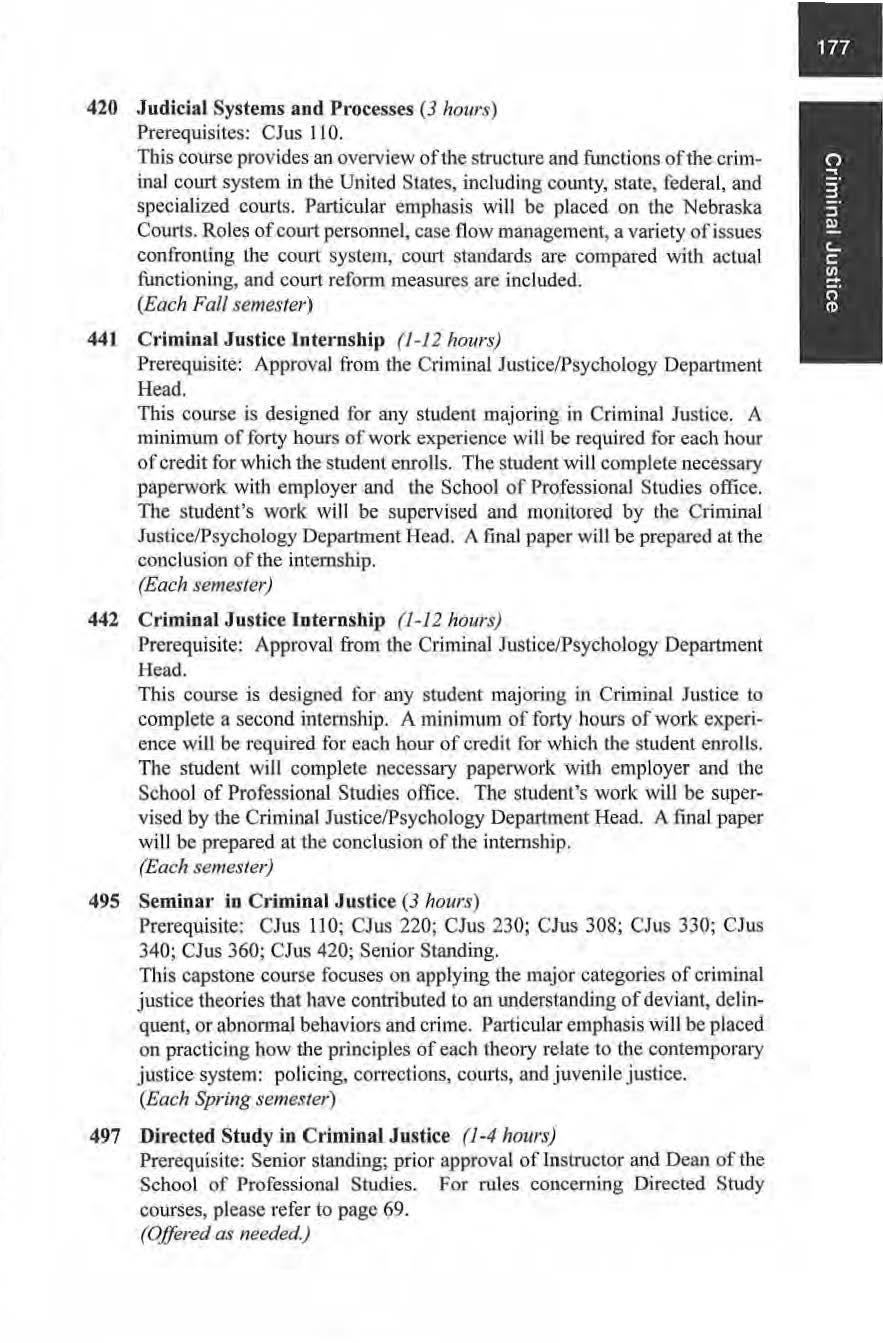
(Each semeste1)
495 Seminal' in Crimin a l Justice (J hours)
Prerequisite: CJ us 11 0; CJ us 220; CJ us 23 0; CJus 308; CJ us 33(); CJ us 340; CJus 360; CJus 420; Se ni or Stand ing. This capstone course focuses on app lying the major categories of c riminal justice theories that have contributed to an understanding of dev iant, delinquent, or abnonnal behaviors and crim e. Particular emphas is will be placed o n practicin g how the principles of each th eory relate to the contemporary just ice system: policing, corrections, courts, and juvenil e justice.
(Each Spring semester)
497 Directed Stu dy in Crimi na l Ju stice (1-4 hours)
Prerequjsite: Senior stand ing; prior approva l oflnstructor and Dean of the School of Professjonal Studies. For rules concerning Directed Study co urses, please refer to page 69.
(Offered as needed.)
498 S pecial Topics in Criminal Ju stice (/-4 hours)
Pre requi site: Jun ior or senior standing.
(Offered as needed)
499 lodep e nd e nt Study in C rimin al Justice (J-3 hours)
Junior standing; prior approval of Instr uctor and the D ean of t he Scl1oo l of Professional Studies. For rules concerning Independent Study courses, please refer to page 69.

(Offered as needed)
Earth Scie11ce
206 Principles of Ph ysica l Science (3 hours)
This is an integrated course covering the various phases o r man's physica l and chemical world. Experiences with a variety of learnin g s ituations, such as demonstrations, experiments, instructionaJ te levis ion, and other visual aids are included.
(Eac h Spring se1neste1~
2 11 Princip les of E arth Science (4 hours)
This is an integrated course that examjnes fundamental concepts in earth science Course topics include concepts of matter and energy and their function in the so lar sys tem, basic g lobal c]jmatology and weather formation, fundamenta l geological composition and function, vu lca nism, and tectonic processes , continental drift, glacial & loess deposition, Nebraska soils and the geop hysical history of North America. Both lecture and laboratory are required for this co urse.
(Each Fall sem es te1)
220 Energy (3 hours)
This course is a s tud y of energy resources with a focus on both nuclear and conven ti onal power stations, design operati on , cost, governmental regul ations, safety, and e nvironmental effects. Field !tips to nuclear and conventionaJ generation stations are required.
(Each Fall semestei·)
230 Limnology (4 hours)
L imnology is the study of the physical and biological properties of iuJ and waters. Students will examine tbe origins, eco logy, and physical properties of inland waters including tbe effects of climate, land use, and pollution. Students will study th e biological and physical properties of local streams and lakes and team to assess the general health and water qua lity of inland stream s and watersheds. Both lecture and laboratory are required for this course.
(Fall semeste,; even years as needed)
297 Directed S tudy in Earth Science (l-4 hours)
P rerequisites: Senior standing; prior approvaJ of lnstructor and D ean of the School of Arts and Sciences. For rules concerning Directed Study courses, please refer to page 69.
(Each seme ster; summ er session)
298 Special Topics in Earth Science (1-4 hours)
Prerequisites; Freshman-Sophomore standing. Arranged.
(Offered as needed)
304 Meteorology and Climatology (3 hours)
The physica l factors influencin g the climate with practical work in interpreting meteorological records and forecasting are studied. Both lecture and laboratory are re qu_ired for this course.
(Offered as needed)
306 Astronomy (3 hours)
This is a bas ic course dealing with a study of the heavenly bodies, the solar system, and the universe. Telescopic observation is a part of this course. Telescopic observation arranged. Cross-listed as Physics 306. (Spring semester, odd years as needed)
315 Physiography of the United States (4 hours)
Prerequisites : ESci 211 .
As a regional study of landfonn provinces, thls course gives specjal empha,. sis to the relationship betwee11 landforms, climate, so il s, vegetation, and mineral resources. Both lecture and laboratory are required for tbis course.
(Offered as needed)
497 Directed Study in Earth Science (1 -4 hours)
Prerequisites : Senior standing; prior approval ofinstructor and Dean of the School of Arts and Sciences. For rules co nceming Directed Study courses, please refer to page 69.
(Each semester; summer session)
498 Special Topics in Earth Science (1-4 hours)
Prerequisites: Junior-Senior sta11 ding. Arranged.
(Offered as needed)
499 Independent Study in Earth Science (1-6 hours)
Prerequisites: Junior standing; prior approval oflnstructor and the Dean of the School of Arts and Sciences. For rul es concemiog Independent Study, p.lease refer to page 69.

(Each semester ; summer session)
220 Principles of Macroeconomics (3 hours)
This course presents el ementary concepts of macroeconomics with an e mphasis on equilibrium analysis, monetary and fiscal policy, banking and developmental economics.
(Ecich Spring semeste,)
Consideration is given to the microeconomics concepts of wages, interest, rent and profits, personal distribution of income, consumption, monopolies, agriculture, government taxation and expenditures, international trade and comparative economic systems.
(Each Fall semeste1)
305 Ec onomic Geography (3 hours)
Prerequisite: Econ 220.
The purpose of economic geography is to introduce the student to the basic concepts, analytical tools and re sottrces that explain ways in which individuals and organizations organize their economic activities in geographical locations. It further develops the influence of various institutional arrangements that affect spatial interdependencies. Finally, the course e."plains the use of demographic data in interpreting international target markets. Dual l.isted as Geog 305.
(Eac h Spring semeste,)
320 Macroeconomics for Manage1•s (3 hours}
Prerequis ite: Econ 220.
This course p resents advanced concepts of macroeconomics with an emphasis in the application of theory to prac1ical problems faced by managers.
(Offered as needed)
497 Directed Study in Eco nomics (1-4 hours}
Prerequisite: Senior standing; prioi' approval of Instructor and Dean of the School of Professional Studies. For rules concerning Directed Study courses, please refer to page 69.
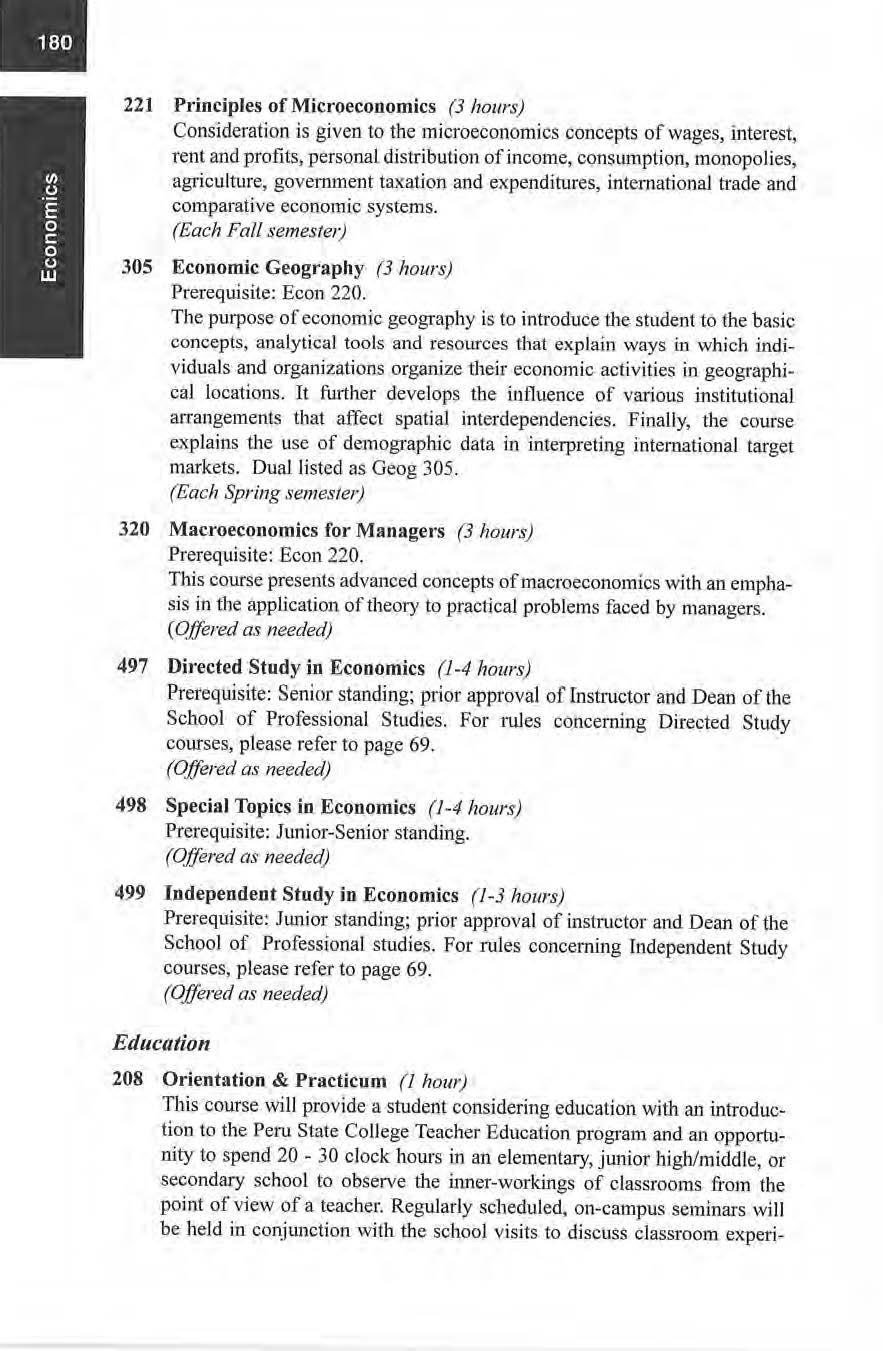
(Offered as needed)
498 Special Topics in Eco nomics (l-4 hours)
Prerequisite: Junior-Senior standing.
(Offered as n eeded}
499 Independent Study in Economics ( l-3 hours)
Prerequisite: Junior standing; prior approval of instructor and Dean of the School of Professional studies. For rules concerning Independent Study courses, please refer to page 69.
(Ofjered as needed)
208 Orientation & Practicum ( l hour)
This course will provide a student considering education with an introduction to the Peru State College Teacher Education program and an opportunity to spend 20 - 30 clock homs in an elementary, junior high/middle, or secondary school to observe the i1mer-workings of classrooms from the point of view of a teacher. Regularly scheduled, on-campus seminars will be held in co11junction with the schoo l visits to discuss classroom experi-
ences with other education students and faculty and to meet other course requirements.
(Each semester)
241 Cooperative Education Internship (1-4 hours)
Prerequisites: 15 hours of completed coursework, rrtinimum GPA 2.0, permission of Dean of Education and Graduate Studies. This program is designed for students wjth an intended major in Education to exp lore and/or gain work experience related to their major and anticipated career goals. Students may enro ll for 1-4 hours of credit which will be graded on a credit/no credit basis. A minimum of forty hours of work experience will be required for every hour of credit per semester. The student will complete necessary paperwork with employer and the office of the Dean of Education and Graduate Studies. The student's work will be supervised by the School of Education and Graduate Studies staff. A final paper will be prepared at the conclusion of the internship. (Each semester; sun1111er session)
297 Directed Study in Education (I-4 hours)
Prerequisite: Senior standing; prior a pproval of Instructor and Dean of School of Education and Graduate Studies. For rules concerning Directed Study courses, please refer to page 69. (Offered as needed)

298 Special Topics in Education ( 1-4 hours)
Prerequisite: Freshman-Sophomore s tandin g, (Offered as needed)
300 Classroom Management & Effective Teaching in the Secondary School (2 hours)
Prerequi s ite: Admission to Teacher Education. Thls course is intended to provide prospective secondary education students the opportunity to discuss the relationships between c las s room management and effective teaching, to research and discuss cuITent themy, research, and practice in classroom management and effective teachlng, discuss and practice lesson and unit planning and cu1Ticulum design, and to discuss individual management styles and plans for their own classrooms. (Each semester)
301 Practicum - Social Studies and Language Arts (J hour)
Prerequisites: Admission to Teacher Education; Concurrent enrollment in Educ 325 & 326.
This course provides field exper ience in elementary or middle schools for students enrolled in Social Studies and Language A1ts Methods courses. (Each semester)
302 Practicum - Math & Science (1 hour)
Prerequi sites: Ad.missi on to Te acher Education; Concurrent enrollment in Educ 327 & 328.
This course provides field experience in elementary or middle schools for students enrolled in Math and Science Methods courses.
(Each semeste1~
304 Elementary/Middle Grades Practicum (1-2 hours)
Prerequisite: Admission to Teacher Education.
Thjs course provides practical experience for those who need field work at the e lementary or middle levels either in addition to the hours required in the elementary or secondary programs or for endorsement programs which need to provide field work for certification.
(Ea c h semeste1)
30 5 Principles of Early Ch ildhood Education (3 hours)
Prerequisite: Admission to Teacher Education. This course is designed to give students the theory and practice necessary for teaching and caring for children from in fa n cy through age ei ght. It is an introduction to the professional preparation needed for preschools and child care.
( Each Fall semester)
3 08 Early Childhood .Practicum (2 hours)
Prerequisites: Admission to Teacher Education; Concurrent enrollment in Educ 402.
This course is des igned to provid e students an opportunity to observe the specifi c methods being s tudied in the methods class and to begin to practice those methods. May be repeated to a total of 4 hours.
(Each Spring se111este1)
309 Secondary Practicum (2 hours)
Prerequisites: Admission to Teacher Education; Concurrent enro llm ent in Educ 3 LO (or subject area methods).
This course is designed to provide students an opportunity to observe the specific methods being studied in methods classes and to begin to practice those methods.
(Each semeste1)
3 10 Secondary School Teaching M:etbods (3 hours)
Prerequisites: Admission io Teacher Education; Concurrent enrollment in Ed uc 309

This course provides education majors with opportuniti es to study, discuss, and practice instructional methods specifically for middl e and J1igh school students and to exam ine t h ese school environments .
(Each semeste1)
3 17 Tests and Measurements (2 hours)
Prerequisite: Admission to Teacher Education .
The course emphasizes the procedures for constructing tests, analyzing teacher made tests, and applying the results of testing to gradi ng and reporting of pupil progress. The course also presents the basic statist ics which are used in the analysis, interpretation, and use of test results.
(Each semeste,)
325 Teaching Language Arts in the Elementary/Middle School (3 hours)
Prerequisites: Admission to Teacher Education; Concurrent enroUment in Educ 301 & 326.
This course investigates goals , methods, materials , and evaluation techniques in the area of elementary/middle grades language arts.
(Each semeste1)
326 Teaching S ocial Studies in the Elementary/Middle School (3 hours)

Prerequisites: Admission to Teacher Education; Concurrent enrollment in Educ 301 & 325.
This course is designed to make the prospective elementary/middle scl10ol teacher aware of the methods, materials, resources, and techniques used to teach Social Studies in an elementary/ middle school. Students will also discuss the irnp01tance of Social Studies and the make-up of an elementary/ middle grades Social Studies curriculum.
(Each se m este,)
327 Teaching Math in the Elementary/Middle School (3 hours)
Prerequisites: Admission to Teacher Education; Concurrent enrollment in Educ 302, 328; and Math 110 or equivalent. Th.is course introduces and gives practice to students in the philosophical basis, techniques, instructional methods, organization, and learning activities of teaching elementruy/middle grades Mathematics.
(Each semeste 1)
328 Teaching Science in the Elementary/M iddle School (3 hours)
Prerequisites: Admission to Teacher Education; Concurrent enrollment itl Educ 327, 302; and General Studi es Science requirements. The purposes of the course are to: (1) give direction to prospective teachers on how to organize and conduct meaningful science leaming experiences in the elementary/middle school , (2) provide simple and easy lo understand outlines of science concepts and conceptual schemes for each area of science concepts and appropriate learning experiences.
(Eac h semeste,~
334 Teaching Reading in the E lementary School (3 hours)
Prerequisite: Admission to Teacher Education. The course is a study of current methods, approaches, types and availability of reading materials, and their uses in the elementary school. Emphasi s will be placed on facilitating instruction in the classroom and the skills of reading
(Each semester)
350 Computer Applications in Education (3 hours)
The purposes of the course are to ensure that class members have proficiency in creating documents using word processing, calculating using the spreadsheet, and searching using the database ; to familiarize the students with a variety of the best software programs cunently available in their
area; to show the students how these programs can be applied in the classroom; and to have the students apply useful utility programs to improve the learning process.
(Eac h semeste, )
375 Education of Gjfted Learners (3 hours)
This course examines the historic and curTentJy u sed definitions of gifted and talented, identifying characteristics, means of identifying and choosing tbe gifted and talented , individual s who have been identifi ed in the present and past, and techniques for teaching gifted and lalented s tudents in the regular classroom.
(Each Spring semeste,)
400 Philosophical Foundations of Education (3 hours)
Prerequisites: Taken immediately preceding Student Teaching; Admission to Teacher Education.
Philosophical Foundations of Education is a capstone course des igned to assist the prospective teacher entering student teaching and, ultimately, the teaching profession. So that all students can draw on previously learned infonnalion when discussing the various objectives of the course, all students wiU take this course during the semester prior to student teaching.
(Each semeste1:)
401 Emergent Literacy (2 hours)
Prerequisites: Admis sion to Teacher Education & Psyc 250.
This coUJse is designed to provide the learner with a background in the development of language, communication and reading. Methods facilitating these skills will be addressed in a dev e lopmental approach.
(Spring semeste1; odd years)
402 Methods in Early C hildhood Education (3 hours)
Prerequis ites: Admiss ion to Teacher Education and Educ 305. This course deals with curriculum, program planning, materials, and individua]jzation in Early Childhood Education.
(Eac h Spring semester)
403 Diagnostic and Remedial Reading (3 hours)
Prerequisites: Admission to Teacher Education; Edl.lc 334 or 434
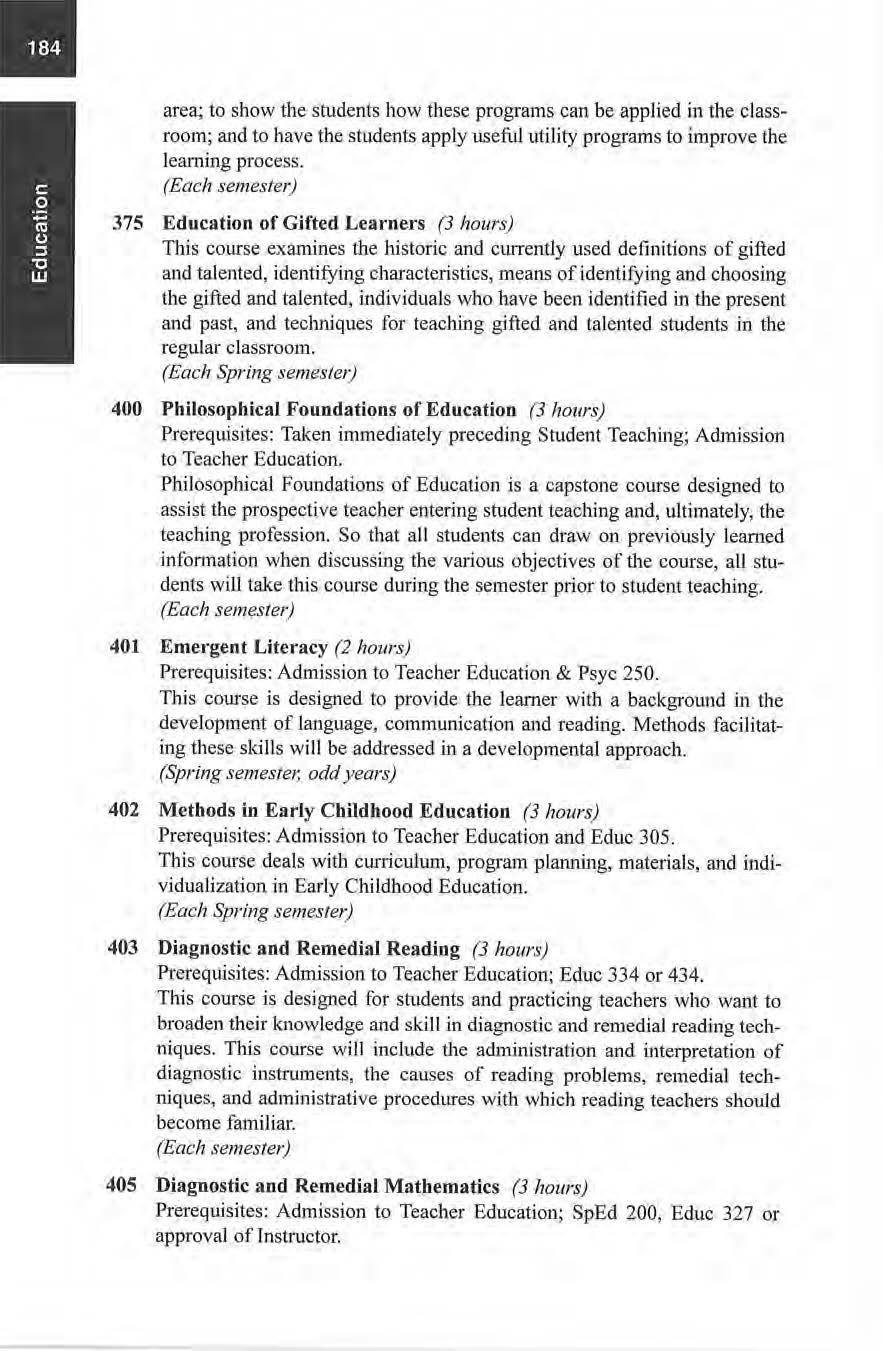
This course is designed for students and practicing teachers who want to broaden the ir knowledge and skill in diagnosti c and remedial readi11g techniques. This course will include the administration and interpretation of diagnostic instruments, the causes of r eading problems, remedial techniques, and administrative procedures with which reading teachers should becom e familiar.
(Each semeste,)
405 Diagnostic and Remedial Mathematics (3 hours)
Prerequisites: Admission to Teacher Education; SpEd 200, Educ 327 or approval oflnstructor.
This course is designed to provide a foundation for working with students who have spec ial needs in the area of mathematics. Learning theory and general techniques for dealing with instruction of students with special mathematics needs will be emphasized.
(Each Fall semeste,)
409 Rece1·tification Studen t Teaching (3-4 hours)
Prerequisite: Must have held a Nebraska IJtitial Standard or Professional Teaching Certificate or its equivalent from another state. This course is designed for those persons whose teaching certificate has expired for longer than S years. The course wilJ provide the opporhmity for the person to spend a minimum of three weeks in a K-12 classroom to become reacquainted with students and classroom procedures. Educ 409 will fu lfill the State Department of Education Practicum requirement for renewal of an expired certificate.
(Each semester)
410 E le men tary St udent Teaching (8-16 hours)
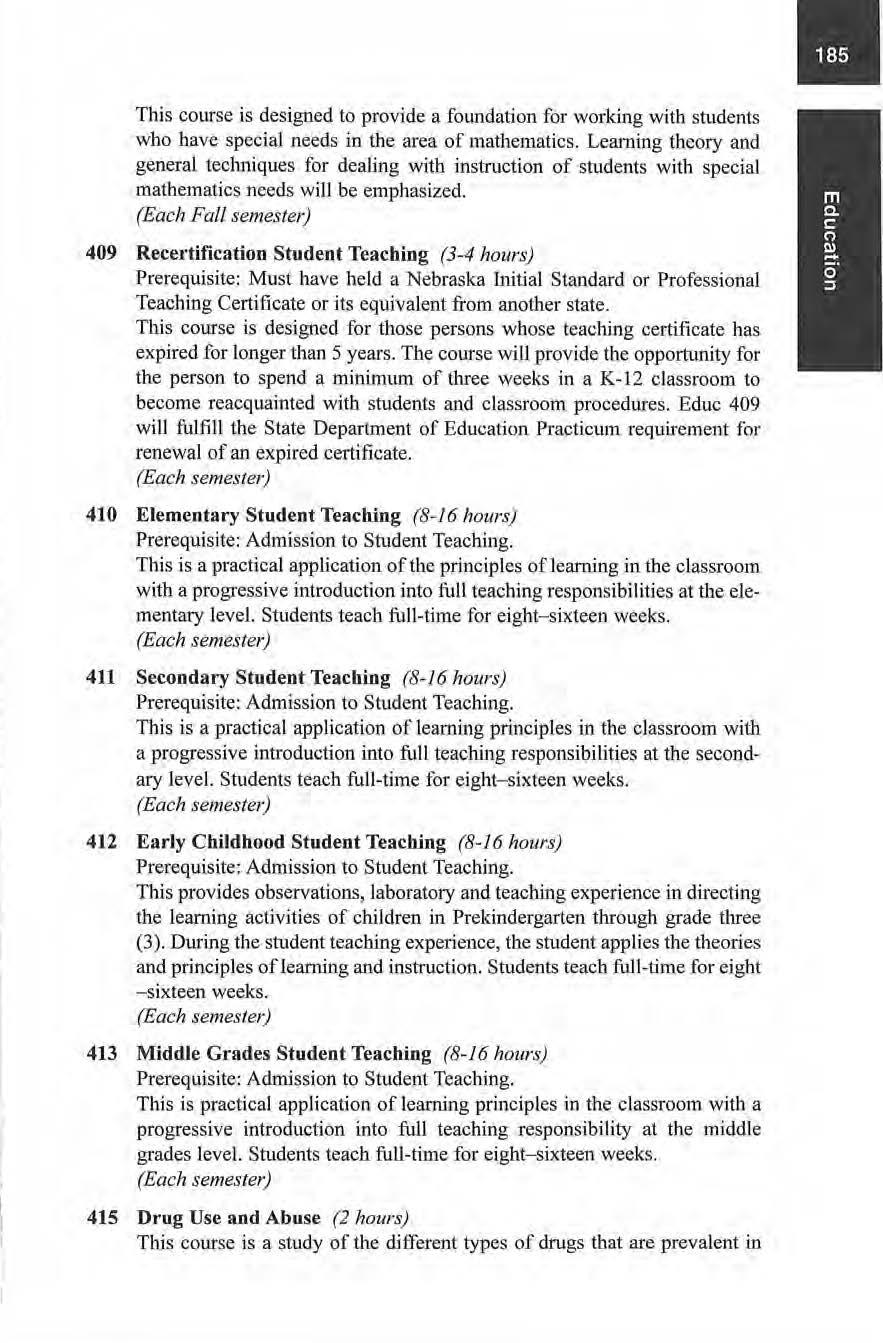
Prerequisite: Admission to Student Teaching. This is a practical application of the principles ofleaming in the classroom with a progressive introduction into full teaching responsibilities at the elementary level. Students teach full-time for eight- sixteen weeks.
(Each semestet)
411 Secon d ary Stu d ent Teach in g (8~16 hours)
Prerequisite: Admission to Student Teaching. This is a practical application of learning principles in the classroom with a progressive introduction into foll teac.Jti.ng responsibilities at the secondary level. Students teach full-time for eight- sixteen weeks.
(Each semeste,)
412 Earl y C hild ho od Student Teachin g (8-16 hours)
Prerequisite: Admission to Student Teaching. This provides obser vations, laboratory and teaching experience in directing the learning activities of children in Prekindergarten through grade three (3). During the stt1dent teaching experience, the student applies the theories and princ-iples ofleaming and instruction. Students teach full-time for eight - sixteen weeks .
(Each semester)
4 13 M iddl e G rades Stude nt Teachi ng (8-16 hours)
Prerequisite: Admission to Student Teaching. This is practical application of learning principles in the classroom with a progressive introduction into full teaching responsibility at the middle grades level. Students teach full-time for eight-sixteen weeks.
(Each semestet)
415 Dr ug Use and A buse (2 hours)
This course is a study of the different types of drugs that are preva lent in
our American society. Emphasis will be placed on the origins of drugtaking behavior, the problems that drugs create in society, and t he allure that drugs have in American culture today.
(Spring semeste,)
425 Teaching in the Middle Grades (3 hours)
Prerequisite: Admission to Teacher Education; taken semester immediat ely preceding student teaching. This course is designed to pmvide students with a background in the curriculum, history, and philosophy of the middle school. It will also investigate the organizational struchtre, team planning and collaboration techniques, and teacher-student advising situations tl1at are unique to the middle grades
(Each Spring semeste1)
434 Secondary Reading and Writing Across the Curriculum (3 hours)

Prerequisite: Admission to Teacher Education. The course wi U be a study of the c tuTen t trends and practices in reading in the secondary schools Emphasis will be placed on ways for teachers to improve reading skills for sh1dents as well as ways to use those skills to improve learning. The reading/writing relationship wi ll be explored and students will be introduced to the process metl10d of writing instruction. Ways to incorporate this method of writing into content area classrooms will be presented as well as other composition methods that can be used in the con tent areas.
(Fall semeste1)
441 Cooperative Education Interns hip (1-12 hours)
Prerequisites: Upper-class standing, permission of the Dean of the Schoo l of Education and Graduate Studies .
This course is designed for an y student majoring in any discipline li sted within the School of Education and is to be taken near the end of t he formal college course requirements . Students may enroll for 1-12 h ours of credit upon approval of the Dean of the Schoo l of Education and Graduate Studies. The learning situation will be organized and supervised by the Schoo l of Education and Graduate Studies staff A minimum of forty hours of work experience will be required for each hour of credit for which the student enro ll s. This is not in lieu of the required teacher education practicums or student teaching.
(Each semester; summer session)
497 Directed Study iu Education (1-4 hours)
Prerequisite: Senior standing; prior approval of Instructor and Dean of the School of Education and Graduate Studies. For rules concerning Directed Study courses, please refer to page 69.
(Offered as needed)
498 Special Topics in Education (1-4 hours)
Prerequisite: Junior-Senior standing.
(Offered as needed)
499 Independent Stud y in Ed ucation (1-3 hours)
Prereq uisite: Junior standing. Pennission of Instructo r and p rior approval of the Dean of Education and Graduate Studies. Por rules concerning Independent Study courses, please refer to page 69 (Offered as needed)
100 Elements of Composition (3 hours)
English l 00 is d es igned to help students who need additional assistance with composition (as determined by either an indjvidual student's d eci sion o r by the Compute r Placem ent Test) to acquire the requisite writing ski ll s to pass Engl i sh IO 1. Students enrolled in Elements of Compos ition write essays; in addition , this class places spec iaJ emphasis on organization, grammar, sentence structure and those other elements that constitute effect ive prose. This course eams students in stih1tional credit but does not fu lfill Gen era l Studies requirements.
101 English Co mposition (3 hours)
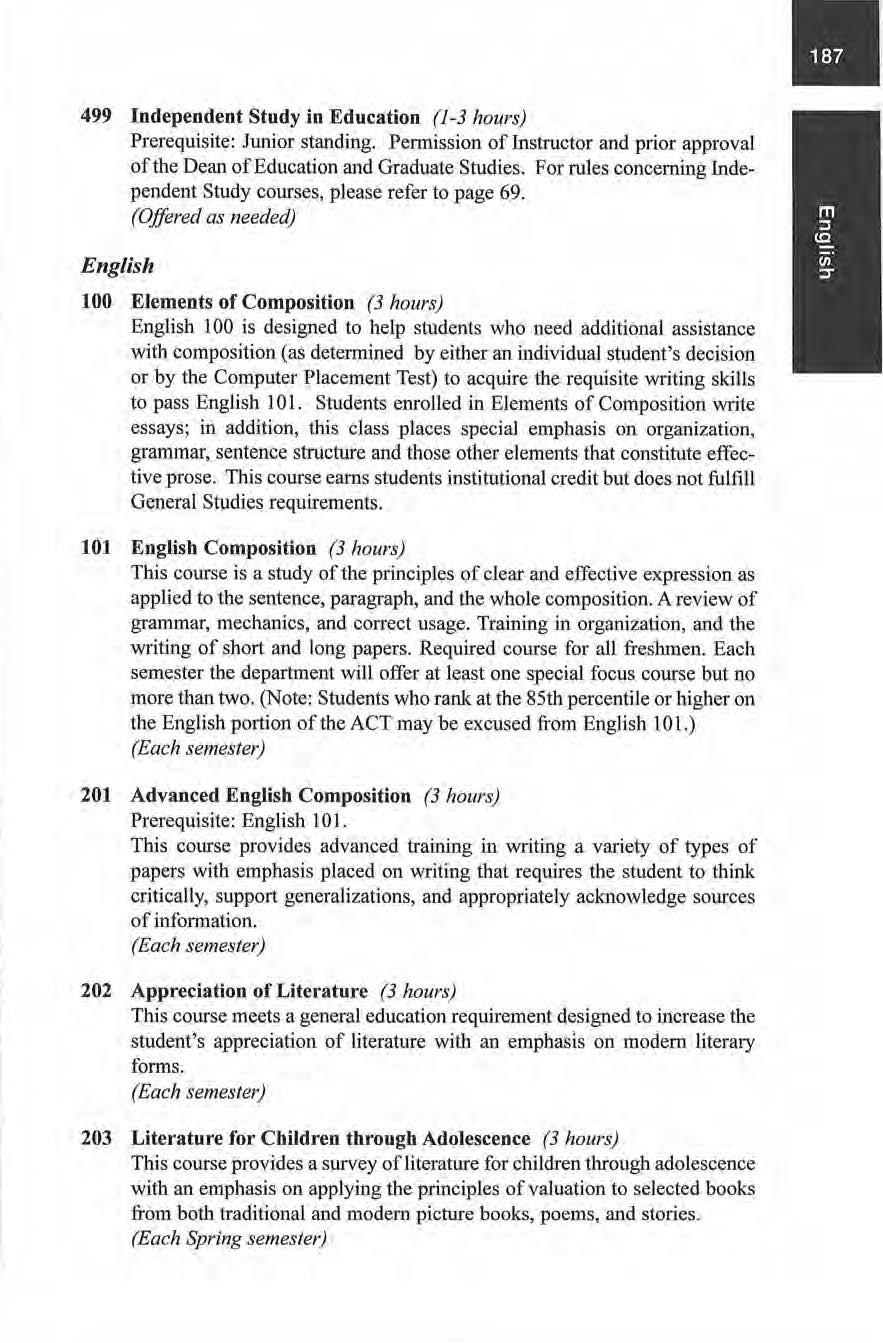
This course i s a study of the principl es of cl ear and effective expression as applied to the sentence, paragraph, and the whole compos ition. A review of grammar, m echanics, and correct usage. Training in organization, and the Wliting of short and long papers. Required course for all freshmen. Eac h semester the department will offer at l east one special focus course but no more than two. (Note: Studen ts w h o rank at the 85th percentile or h igher on the English po1tion of the ACT may be excused from English 101.)
(Eac h semeste,)
201 Advanced E nglish Composition (3 hours)
Prerequisite: Engli sh 10 I.
This course provides advanced training in writing a variety of types of papers with emphasis placed on writing that requires the student to think cri tically, s upport gene ralizations, and appropriately acknowledge soiu-ces of information
(Each seme/iter)
202 Appreciation of L ite rature (3 hours)
This course meets a general education requirement clesigned to increase the s tudent 's appreciation of literature with an emphasis on modern literary forms.
(Eac h semes te1)
203 Literature for C hildren thrnugh Adolescence (3 hours)
This course provides a s urvey ofliterature for ch il dren through a dolescence with an emphasis on applying th e principles of val uat ion to selected books from both trad iti onal and mod ern picture books, poems, and stories
(Each Spring semester)
222 World Literature to 1500 (3 hours)
T hi s course serves as an introduction to classical and medieval traditions in Western literature.
(Spring semes te,; even years}
223 Non-Wes tern Literatu1·e (3 hours)
This course is an examination of significant literary works of Africa, the Middle East, As ia, Australia, New Zealand, Latin America, and the Caribb ean.
(Each semeste1)
225 Short Story (3 hours)
The major emphasis of this course is on the development of the short story in American literature.
(Fall semesfe1; even years)
297 Directe d Study in English (1-4 hours)
Prerequisite: Senior standing; prior approval of instructor and Dean of the School of Arts and Scien ces. For rules co ncerning Directed Study courses. please refer to page 69.

(Offered as needed.)
298 Special Topics in EngHsh ( l-4 hours)
Prerequisite: Freshman-Sophomore standing.
(Offered as needed)
301 Traditional Grammar (3 hours)
The emphasis of this co urse is on an in-depth ana lysis of sentence structure.
(Spring semeste1; odd years)
3 0 5 P ractic um in Composition (3 hours)
This course is an investigation of cun-ent practices, research, issues, and theories about teaching composition to see how they app ly to classroom teaching.
(Fall semeste,; even years)
306 Nebraska Literature (3 hour:,)
P rerequisite: Consent of the instmctor.
T hi s course provides an introduction to the works of Nebraska writers and literature about Nebraska.
(Spr ing semeste1; even years)
307 Sem inar in the Modern Novel (3 hours)
This course is a study of modern fiction as it mirrors tbe philosophical, soc iological, psychological, and scientific thought of the twent ieth century. (Fall semester; odd years)
308 Business EngUsb (3 hours)
T hi s course serves as a study of business English and communication as well as a study of how to compose and produce the various types ofletters used in the business world, This course is approved as an elective for business majors.
(Offered as needed)
309 Creative Writing (3 hours)
This course allows for experimentat ion with writing poetry, short fiction, and cr eative nonfiction in a writing workshop seltjng.
(Each Fall sem este1)
321 British Literature I (3 hozll's)

This course is the study of British Literature from the Old English period to the 17th Century. Works and writers stud ied may include Beowulf, C h aucer, the Pearl Poet, Miracle and Morality Plays, Utopia, Spenser, and M ilton.
(Spring sem esfe1; odd years)
32 3 British L iteratui·e II (3 hours)
This course is the study of British Literatu re from the 17th to the early 20th Century. Areas of study may include selected words of post-Shakespearean drama, metaphysical poets, and the literature of the Romantic aud Victor ian periods.
(Fall semester, even years)
324 American Literature I (3 hours)
An historical survey of significant American wri ting from the Colonial Period to 1865 is conducted in this course. Maj o r writers receive ch ief emp has is.
(Fall semeste,; odd years)
325 American Literature ll (3 hours)
Thi s course is a continuation of English 324 fl-om 1865 to present.
(Each Spring semester)
328 Modern Poetry (3 hours)
A study of contemporary British and Ame1ican poetry and its relevance to lite rature and li fe is conducted in this course.
(Spring semeste,; even years)
357 Interpretive Reading (3 hours)
Thi s co urse is designed to e mphas i ze oral reading of worthwhile litera tu re in group settings. It i nclud es th e close, criti cal analysis of practice se lections as we ll as the study and pr actice of bas ic de li very techn iques. This comse is dual listed with Speh 357.
(Each Spring semester)
375 Film Study (3 hours)
An introduction to film studies with emphasis on critical analysis , historica l dev e lopment, cu lt ural signifi can ce, and cinematic technique is provided in this course.
(Each Spring semester)
418 Shakespeare (3 hours)
Th is course provides a study of representative plays and sonne ts.
(Spring semeste1; even years)
440 History of the English Language (3 hours)
This course is a study of the growth of modem English through examination of changes in the sounds, fonus, and syntax that have occurred in the language and t11e development of vocabulary.
(Fall semeste1; odd y e ars)
441 P re-Sh akespearean Drama (3 hours)
This course looks at the development of drama and theatre through classical and native channels to their culmination in Elizabethan drama
(Offered as needed)
442 Post-Shakespearean Drama (3 hours)
This cow-se provides the basis for the appreciation and understanding of the variety and growth of dramatic literature dw-ing the years following the death of Shakespeare to the advent of modem theatre.
(Offered as needed)
443 Modern Drama 1890 - present (3 hours)
This course provides the student the opportunity to follow the growth of inodern dramatic techniques in tbe western world, the interaction of these techniques with the modem movements in art , music and other art foons, and to make the student aware of his recent heritage of dramatic literature and its position in the world of thought and emotion.
(Spring s emester, odd y e ars)
461 Literature Fights and Re.fights tbe Civil War (3 hours)
This course is an interdjsciplinary literature/history course that examines how the Civil War and Reconstruction and the events and issues leading up to and arising from them have been portrayed in American literature. The course will include a field trip to a battlefield site in Missouri. Dual-listed as Hist 461 , (Spring s em e ste1; e ven years)
497 Directed Study in Eng lish (1-4 hours)
Prerequisite: Senior standing; pr ior approval of Instructor and Dean of t he School of Arts and Sciences. For mies concerning Directed Study courses, please refer to page 69.
(Offered as needed.)
498 Special Topics in English (1-4 hours)
Prerequisite : Junior-Senior standing.
(Offered as needed)
499 Independent Study in English ( J-3 hours)

Prerequisite: Junior standing; prior approval of instructor and the Dean of the School of Arts and Sciences. For rules concern ing fndependent Study courses , please refer to page 69.
(Offered as needed)
100 Physics (4 hours)
Th is course is designed to acquaint the stud ent with physics. Th e areas of energy, mechanics, heat, electricity, so und, and light are surveyed. Both lecture and Jaboratmy are required for thi s course.
(Fall semester, even years)
206 Principles of Physical Science (3 hours)
Thi s is an integ rated course specifically designed for the non-science s tudent covering the various phases of man's physical and chemical world. Experiences with a variety of learning situations, such as demonstrations, experiments, instructional televisio n, and other visua l aids are included. Does not apply to the major or support in Physical Science.
(Eac h Spring semest er)
241 Cooperative Education Internship (1-4 hours)
Prerequisite: 15 hours of completed coursework , minimum GPA 2. 0, p ermission of the Dean of the School of Arts and Sciences. This program is designed for students with an intended major in the Science and Technology to explore and/or gain work experience rel ate d to their major and anticipated career goals. Students may e moll for 1-4 hours of credit which will be graded on a credit/no credit basis. A minimum of forty hours of work experience will b e tequited for every hour of credit per semester. The student will comp lete necess ary paperwork with employe i· and the Natural Sciences s taff. The sn1dent's work will be supervised by the Natural Scien ces s taff A final paper w ill be prepared at the conclusion o f the internship.
(Each semester; summe r session)
297 Directed Study i n General Science (1-4 hours)

Prerequisite : Senior s tan ding; prior approval of fnstructor and D ean of the School of Arts and Sciences. For rnles conceming Directed Study courses, please refer to page 69.
(Offered as needed)
298 Specia l Topics i n Gene ral Science (1-4 hmm)
Prereq uis ite: Fre shman-Sophomore standing.
(Offered as needed)
441 Cooperative Education Internship (1-12 h ours)
Prerequisite: 45 hours of completed co ursework , minimum 2. 0 GPA, p ermission of the Dean of Arts and Sciences. This program is designed for students with a major in Science or Technology to gain work experience rel ated to theit- major and career goals, Stu dents may enroll for 1~12 h ours of grade d credit. A minimum of forty hours of work experience will be required for every h our of credit per sem ester. The s tudent w ill comp lete necessary paperwork with emp l.oyer and th e Natural Sciences staff. The student's work will be s upervised by the Natural Scien ces staff.A final paper will be prepared at the conclusion of the internsh ip. (Each semester; summer session)
497 Directed Study in General Science (1-4 hours)
Prereq uisite: Senior standing; prior approval of Instructor and Dean of the School of Arts and Sciences. For rules concerning Directed Study courses, please refer to page 69.
(0./fered as needed)
498 Special Topics in General Science (l-4 hours)
Prerequis ite: Junior-Senior standing.
(Offered as needed)
499 Independent Study Io General Science (l-3 hours)
Prereqllisites: Junior standing; Permission of instructor and prior approval of Dean of Arts and Sciences. For mies concerning 1ndependent Study courses, please refer to page 69.
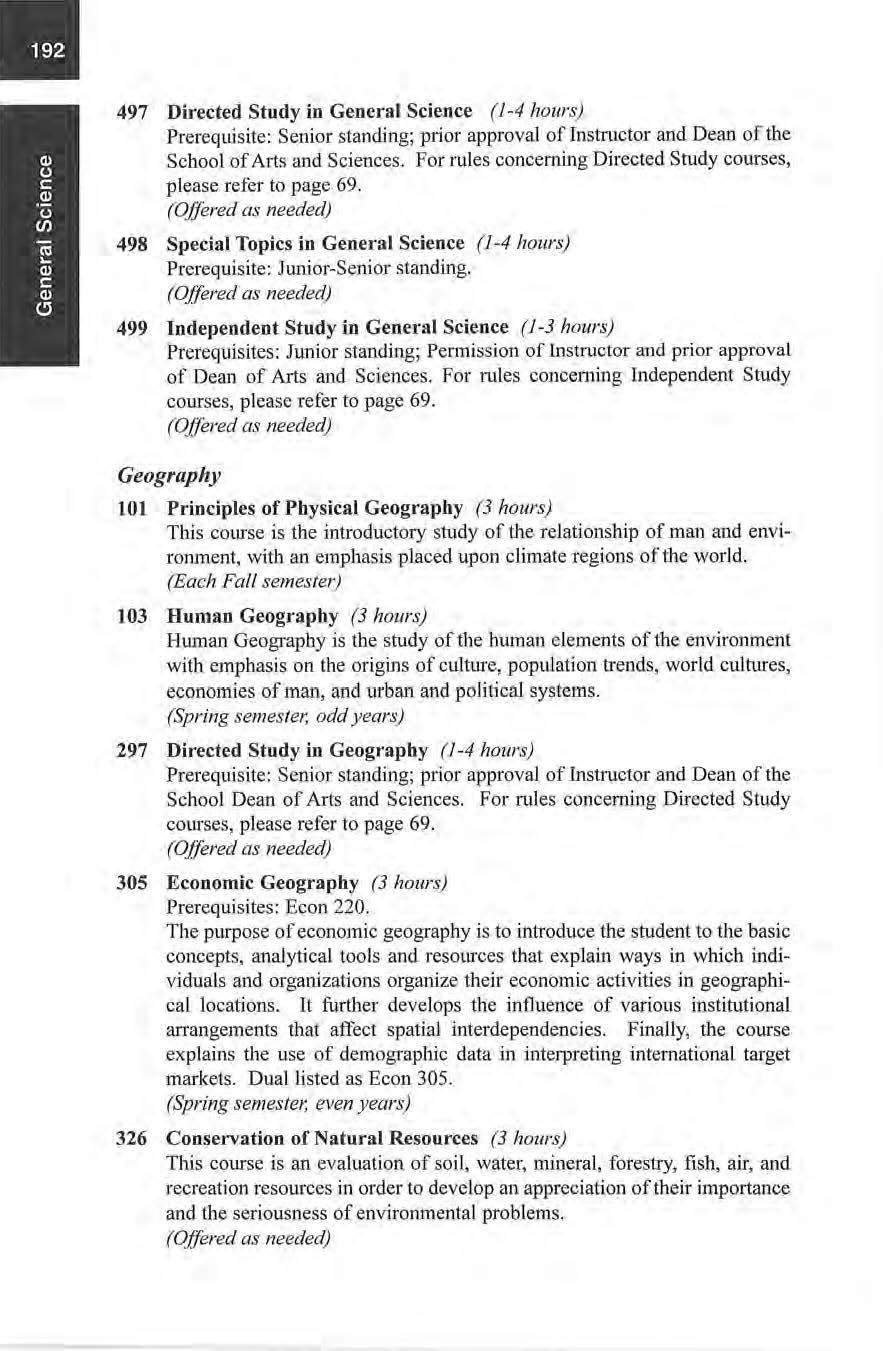
(Offered as needed)
10 I Principles of Physical Geograp hy (3 hours)
This com·se is the introductory study of the relationship of man and environment, with an emphasis placed upon climate regions of the world . (Each Fall semester)
103 B u man Geography (3 hours)
Human Geography is the study of the human eleJJ1ents of the environment with emphasis on the origins of culture, popu lation trends, world culh1res, economies of man, and urban and politicru systems.
(Spring semest er, odd year~')
297 D irected Study in Geography (1-4 hours)
Prerequisite: Senior standing; prior approval of Instructor and Dean of the School Dean of Arts and Sciences. For rules concerning Directed Study co urses, please refer to page 69.
(Offered as needed)
305 Economic Geography (3 hours)
Prerequisites: Econ 220.
The purpose of economic geography is to introduce the student to the basic concepts, analytical tool s and resources that explain ways in which individuals and organizations organize their economic activities in geographical locations. It further develops the influence of various inst itutional arrangements that affect spatial interdependencies. Finally, the course explains the use of demographic data in inte rpreting international target markets. Dual listed as Econ 305.
(Spring semeste,; even years)
326 Co nservation of Natural Resources (3 hours)
This course is an evaluation of soil, water, mineral, forestry, fish, air, and recreation re sources in order to develop an appreciation of their importance and the seriousness of environmental problems.
(Offered as needed)
497 Directed Stu dy in Geography (l-4 hours)
Prerequisite: Sen ior standing; prior approval of Instmctor and Dean of the Schoo l of Arts and Sciences. For rnl es concerning Directed Study co urses, p lease refer to page 69.
(Offered as n eeded)
498 Special Topics in Geography (1 -4 hours)
P rerequisite: Junior-Senior standing.
(Offered as nee ded)
201 Physical Geology (4 hours)
This course is an introduction to the theories of the earth's origin and the study of the earth's structu re a nd materials with a sp ec ial emphasi s on rock, minerals, l andfotms, oceanography and environmental studies Both lecture and laboratory are required for thi s cou rse.
(Offered as needed)
202 R o cks and Minera ls (3 hours)
T hi s course is an introduction to the study of the physical properties of rocks and minerals stress ing field w01·k at minera l and rock localities in Southeast Nebraska. Both lecture an d laboratory are required for this course.
(Offered as needed)
203 Introduction to F ossils (3 hou1's)
Prerequi s ites : None.
Th.i s co urse provides an introduction to the methods of interpreting t he fossi l record through actual field work at fossil l ocations in Southeast Nebraska. B oth lecture and laboratory are required for this course.
(Offered as needed)
29 7 D irected S tudy in Geo logy (1-4 hours)
Prerequi s ites: Senior s tanding; prior approva l oflnstructor a nd Dean of the School of Arts and Sciences. For rules concerning Directed Study courses, please refer to page 69.

(Offered as needed)
298 Special Topics in Geology (1-4 hours)
Prerequi s ites: Freslunan-Sophomore standing. Arranged.
(Offered as needed)
301 Historica l Geology (4 hours)
Prerequisites: None
This course introduces the geo logical history of the earth and the evolution of its animal and plant inhabitants. It includes work at fossi l localities in Southeastern Nebraska utilizing s tratigraphi c methods. Both le c ture and laboratory are required for this cou rse.
(Offered as needed)
497 Directed Study in Geology (l-4 hours)
Prerequisites: Senior standing; prior approval ofJnstmctor and Dean of the School of Arts and Sciences. For rules concerni ng Directed Study courses, please refer to page 69.
(Offered as needed)
498 Special Topics iu Geology (1-4 hours)
Prerequisites: Junior-Senior standing. Arranged.
(Qffered as needed)
499 Independent Study in Geology (J-3 hours)
Prerequisites: Junior standing; prior approval oflnstructor and the Dean of the School of Arts and Sciences. For rules concerning Independent Study courses , please refer to page 69.
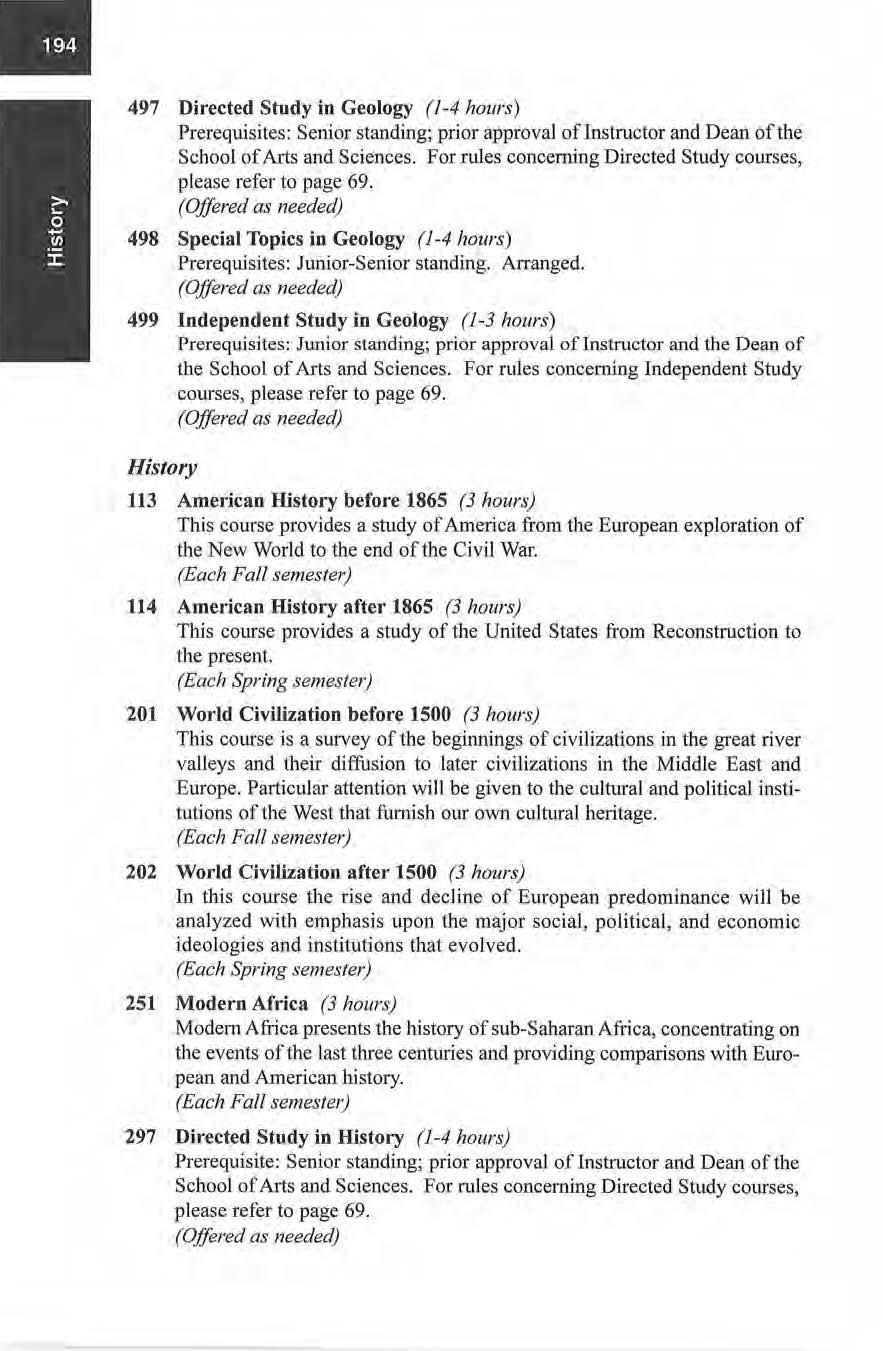
(Offered as needed)
113 American History before 1865 (3 hours)
This course provides a study of America from the European exploration of the New World to the end of the Civil War.
(Each Fall semester)
114 American History after 1865 (3 hours)
This course provides a study of the United States from Reconstmction to the present.
(Each Spring semester)
201 World Civilization before 1500 (3 hours)
This course is a survey of the beginnings of civilizations in the great river valleys and their diffusion to later civilizations in the Middle East and Europe. Particular attention will be given to the cultura l and political institutions of the West that ftunish our own cultural heritage.
(Each Fall semeste1)
202 World Civilization after 1500 (3 hours)
In this course the rise and decline of European predominance will be analyzed with emphasi s upon the major social, political, and economic ideo logies and institutions that evolved.
(Each Spring semeste,)
251 Modern Africa (3 hours)
Modem Africa presents the llistory of sub-Saharan Africa, concentrating on the events of the last three centuries and providing comparisons with European and American history.
(Each Fall sem ester)
297 Directed Study in History (1-4 hour~)
Prerequisite: Senior stao cting; prior approval of Instructor and Dean of the School of Arts and Sciences. For rules conceming Directed Study courses, please refer to page 69.
(Offered as needed)
298 Special Topics in History (J - 4 hours)
Prerequis ite: Freshman-Sophomore standing. (Offered as needed)
301 Colonial A merica (3 hours)
Prere qui sites: History 113 or instructor's permission
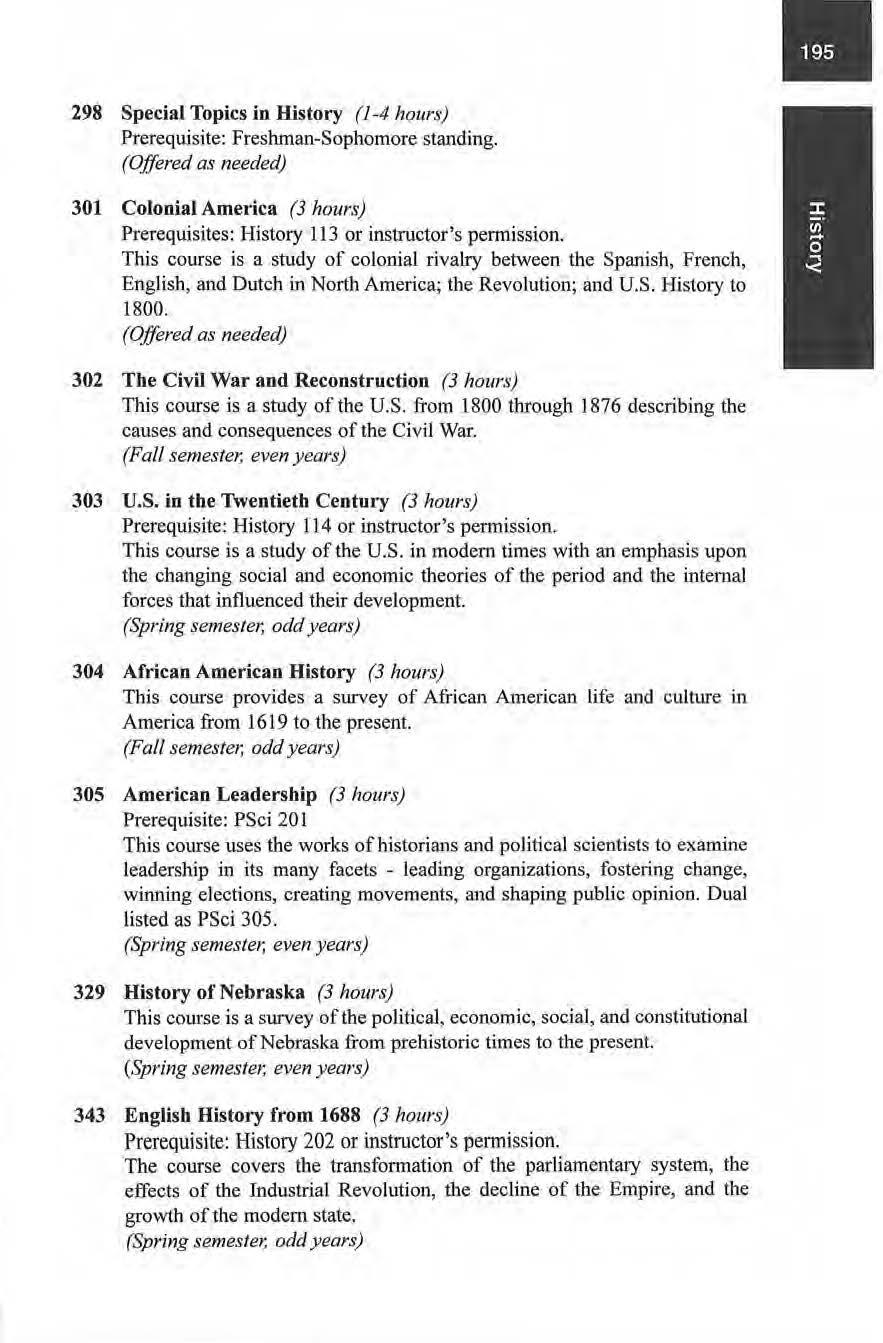
This course is a study of colonial rivalry between the Spanish , French, En glish, and Dutch in North America; the Revolution; and U.S . History to 1800.
(Offered as n eeded)
302 The Civil War and Recons tr ucti on (3 hours)
This course is a study of the U.S. from 1800 through 1876 describing the causes and consequences of the Civil War. (Fall semest er.. even years)
303 U.S. in the Twentieth Century (3 hours)
Prerequisite: History 114 or instructor's pennission. This cou rse is a study of the U.S. in modern times with an emphasi s upon the changing social and economic theories of the pe riod and th e interna l forces that influenced their d eve lopment. (Spring semeste1; odd years)
304 African American History (3 hours)
This course provides a survey of African American life and cul ture in Ame rica from 1619 to the present. (Fall sem ester, odd years)
305 American Leadership (3 hours)
Prerequisite: PS c i 20 1
This course uses the works of historians and political scientists to examine leadership in its many facets - leading organizations, fostering change, winning elections, creating movements, and s haping public op in.ion. Dual listed as PSci 305 (Spring semeste,; even years)
329 History of Nebraska (3 hours)
This course is a survey oftbe political, economic, social, and constitution al development of Nebraska from prehistoric times to the present (Spring semeste1; even years)
343 English History from 1688 (3 hours)
Prerequisite: History 202 or instructor 's perm ission. The course covers the transformation of the parliam entaiy system, the effects of the Industrial Revolution , t11e d ecline of the Emp ire, and the growth of the modem state.
(Spring semeste,; odd years)
345 Modern Eu rope (3 hours)
Prerequisite: History 202 or instructor's permission.
This course offers a comparative bistot·ical analysis of the on go in g process of modernization in Europe. The emph asis is on movements and institutions such as Liberalism, Conservatism, Romantici sm, Socialism, Imperialism, and Totalitarianism from I 815 to the present.
(Spring semes1e1; even years)
411 American Fro ntier (3 hours)
Prerequisite: History 113 or instructor ' s permission.
This course is a study of the importance of the frontier in America from coloojal times to the 20th centwy.
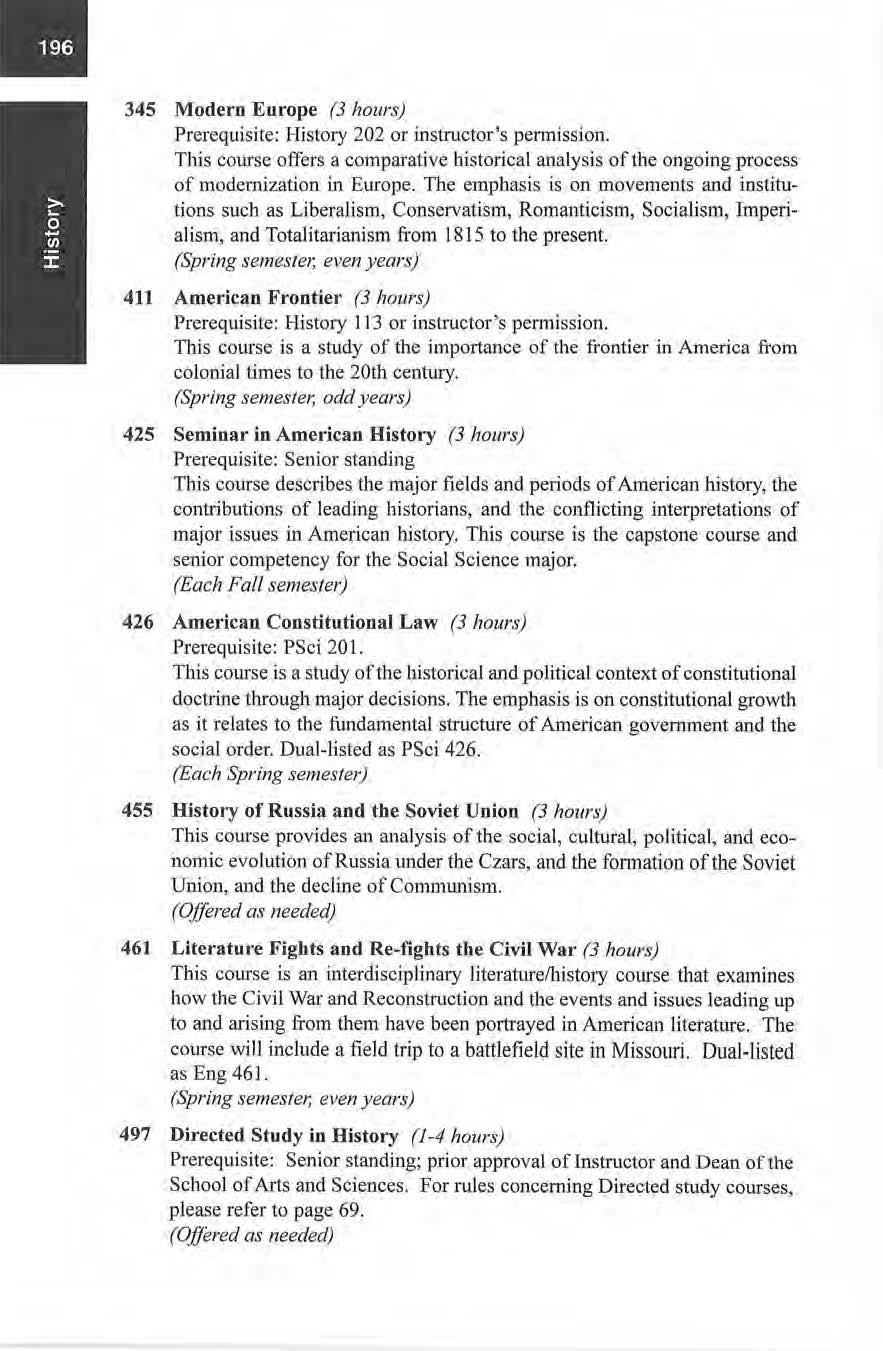
(Spring semester, odd years)
425 Sem in ar in Ame a·ican Histoa·y (3 hours)
Prerequisite: Senior standfog
This course describes the major fields and periods of American history, the contributions of leading historians, and the conflicting interpretations of major issues in American histmy. Th is course is the capstone course and senior competency for the Social Science major.
(Each Fall semester)
426 Ame rican Co nstitutional Law (3 hours)
Prerequisite: PSci 201.
TI1is course is a sh1dy of the historical and political context of const ituti onal doctrine through major decisions. The emphasis is on constitut ional growth as it relates to the fundamental structure of American government and the soc/al order. Dual-listed as PSci 426.
(Each Spring semester)
455 History of Russia and the Soviet Union (3 hours)
This course provides an analysis of the social, c ultural, political, and economic evol ution of Russia under the Czars, and the fonnation of the Soviet Union, and th e decline of Communism.
(Offered as needed)
46 1 L i terature Fights and Re-fights t he Civil War (3 hours)
This course is an interdiscip l inary li terature/history course that examines how the Civil War and Reconstruction and the events and issues leading up to and arising from them have been portrayed in American literature. The course will include a field trip to a battlefield site in Missouri. Dual-listed as Eng 461.
(Spring semester, even yem s)
497 D irec ted Study in History (1-4 hours)
Prerequisite: Senior standing; prior approval of Instructor and Dean of the School of Arts and Sciences. For rules concerning Directed study courses, p lease refer to page 69.
(O.ffered as needed)
498 Special Topics in History (1-4 hours)
Prerequisite: Junior-Senior stand ing.
(Offered as n eeded)
499 Independent Study in History (J-3 hou rs)
Prerequisite: Junior stan ding; petmission ofln structor and prior approval of Dean of Arts and Sciences. For rules concerning Independent Study courses, p lease refer to page 69.

(Offered as needed)
Ho1tors Program
101 Twentieth Centut")' Issues-Literary Styles (3 hours)
Pennissioo of th e Honors Program Coordinator required. (Satisfies the General Studies L iterature requirement)
Through literature such as fiction, poetry, drama, biography, autobiography, a nd historical na1Tative, this course w ill focus on se lected issues suc h as education, the environment, racism, behaviorism, nuclear war, political leadership and the psychology of leadership, mass po liti cal movements, and the use of propaganda.
(Ead1 Fall semester)
201 Making Sense: Art in the World (3 hours)
Pennission of th e Hono rs Program Coordinator required. (Satisfies the General Studies Aestheti cs requirement)
This is an integrated Fi ne Arts course designed to provide students the opp ortunity to v iew and di scuss the interrel atedness of th e fine arts, in particular the performance arts, e .g., c lassical thea tre , modem theatre, musical theatre, ballet, mod em dance, chora l performan ce, orchestral perfom1ance, opera, the v is ual arts in all media, film, photography, architecture, etc. lt will re ly heavily upon on-campus seminar sessions and student attendance at on-campus and off-campus performances.
(Eac h Spring semeste1)
204 Contempora1")' Asian Cultures (3 hours)
Permiss io n of t he Honors Program Coordinator required.
(Sati sfies the General Stud ies Non-We stern Stud ies or Human ReJations requirement, but not both)
This course wm introduce soc ieties and cultures of the Far Eastern countries with emph asis on Japan, K.orea, and China. The course covers such topic s as the group, relativism, education, business, religion, ro le of women, and psychological tra its. In addition, students will look at the ctin-ent issues affecting tbe United States and Asian countr ies
(Each Spring semeste1)
205 Science and Society (3 hours)
Permission of the H onors Program Coord inator required
(Satisfi es one of the General Studies Life Science course r equirements)
This course w ill focus on the scientific method, and the i mpact that science
has on society and individuaJs. Top ics to be considered will be the relationships of science, ethics, politics, moral issues, and societal goa ls. Students will read published articles, write about, and d is cuss the topics of this class. The course topics will be considered in light of a single discipline within science, evolutionary biology.
(Each Spring semester)
212 Introduction to Non-Western Musics (3 hours)
Permission of the Honors Program Coordinator required.
(Satisfies the Gen era l Studies Non-Western Studies requirement)
This course is an introduction to ethnomusicology in which the student w ill learn to experien ce and understand music in the context of human life. Students will experi ence and analyze the musics of Africa, Native America, Black America, Asia, the Near East, the Pacific, and Eastern Europe. This course will also provide th e student the tools with which to discover the meanings of musi c 111 the lj fe of any society.
(Offered as needed)
220 Using Metaphors to Understand Economk Thought (3 hour s)
Permission of the Honors Program Coordinator required.
(Satisfies the General Studies American Studies requirement)
This course will examine metaphors that are used in various disciplines to enhance understanding of the human condition. The primary focus is on the development of western thought, with special emphasis on economic institutions. This course will draw upon economi cs, westem history and literature, evolutionary biology, and Newtonfan physics.
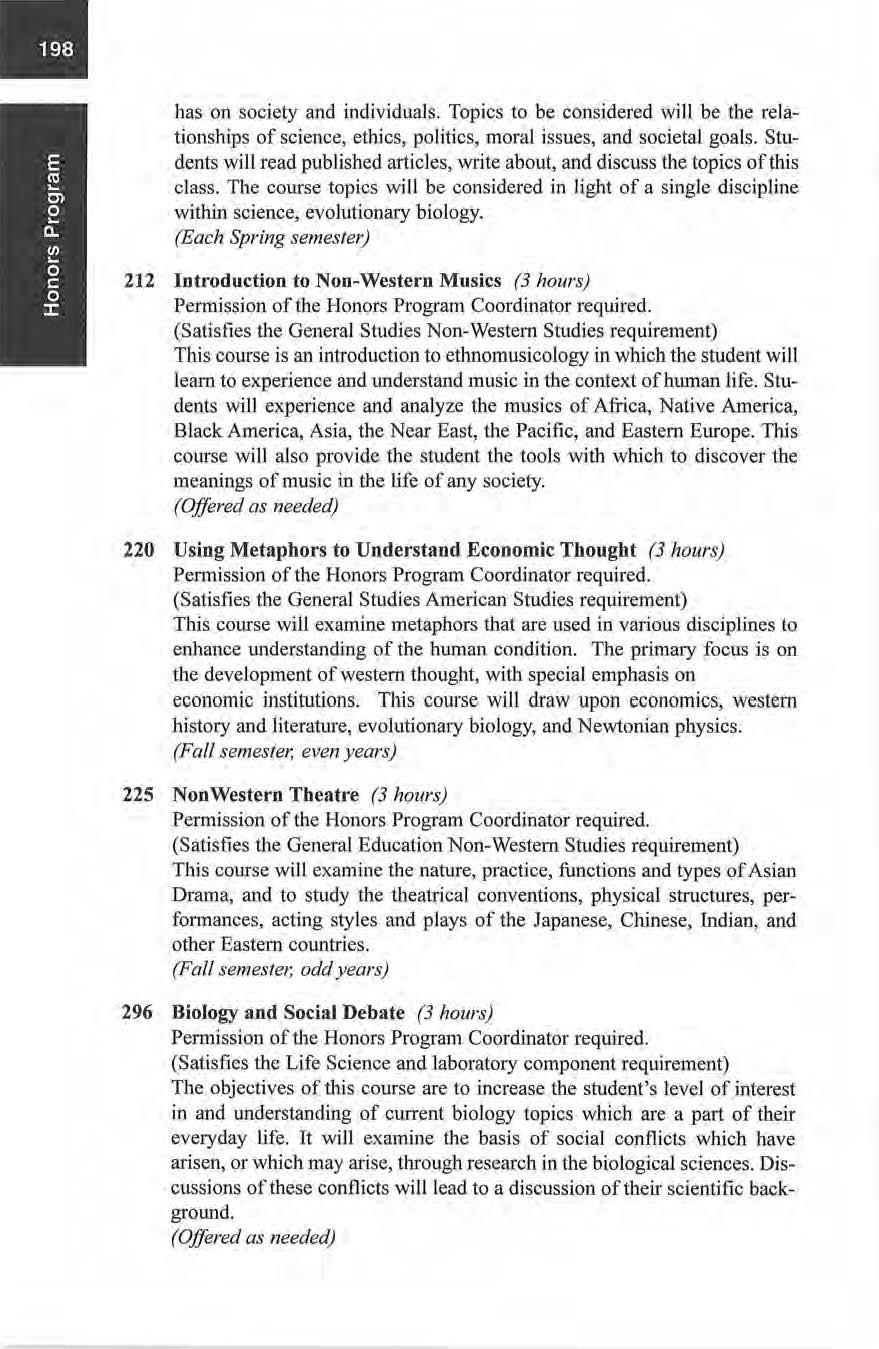
(Fa ll semester, even years)
225 Non Western Theatre (3 hours)
Permission of the Honors Program Coordinator required.
(Satisfies the General Education Non-Western Studies requirement)
T hi s course wi ll exam i ne the nature, practice, functions and types of As ian Drama, and to study the theatr ical conventi ons, physical structures, perfonnances, acting sty les and plays of the Japanese, Chinese, Indian, and other Eastern countries.
(Fall semeste,; odd years)
296 Biology and Social Debate (3 hours)
Permission of the Honors Program Coordinator requi:red.
(Sat isfies the Life Science and laboratory component requirement)
Th e objectives of tl1i s course are to increase the student's l'evel of interest in and understanding of current bio lo gy topics which are a part of their everyday life. It will examine the basis of social confl icts w hi ch have arisen, or which may arise, thrmigh research in the biological sciences. Discussions of these conflicts will lead to a discussion of their scientific background.
(Offered as needed)
400 Et hi cs a nd S oc ia l Ju stice (3 houri>)
Permission of the Honors Program Coordinator required. (Satisfies the Genera l Studies Western Studies requirement}
This course examines contrasting conceptions of social justice and the ideal society as these appear in some of the major thinkers in the tradition of Western ethical philosophy. (Each Fall semeSter)
241 C oo perative Edu cati on Intern s hip (1-4 hours)
Prerequisite: 15 h ours of completed coursework, minimum GPA 2.0, permission of the D ean of t he Schoo l of At1s and Sciences
The program is designed for students with an intended major in the Humanities Department to explore and/or gain work experience re lated to their major and anticipated career goals Students may enroll for 1-4 hours of credit which will be graded on a credit/no credit basis. A minimum offorly hours of work experience wil l be required for every hour of credit per semester. The student will complete necessary paperwork with employer and D ean's office The student's work will be supervised by Arts and Sciences staff. A final paper will be prepared at the conclusion of the internship. (Each semester)
441 Cooperative Ed uc atio n Internsh ip (7 12 hours)
Prereqttis ite: Approval from the Dean of the School of Arts and Sciences
This course is designed for any student majoring in any disdpline listed within the School of Arts and Sciences. A minimum of forty hours of work experience w i ll be required for each hour of credit for which the student enrolls The student will complete necessary paperwork with employer and Dean's office. The student's work will be supervised by Arts and Sciences staff. A final p aper will be prepared at the conclusion of the internship. If any hours from the internship are to be applied toward the compl etion of a major's requirements, approval to do so must be obtained in writing from the Dean pri or to the time of registration. Not more than 3 hours may be applied toward the completion of a m!\jor's requirements, (Each semester)
4 42 Co op era tive Edu cat ion I nterns hip (1 - 12 hours)
Prerequisite: Approval from the Dean of the School of Arts and Sciences. Tltis course has the same requiremeuts as Humanities 44 l. Students sh ould enroll in tbis course to estab lish a second, and completely different, intemship experience than bas been fulfilled from the first internship completed in Humanities 441.
(Each semeste1)
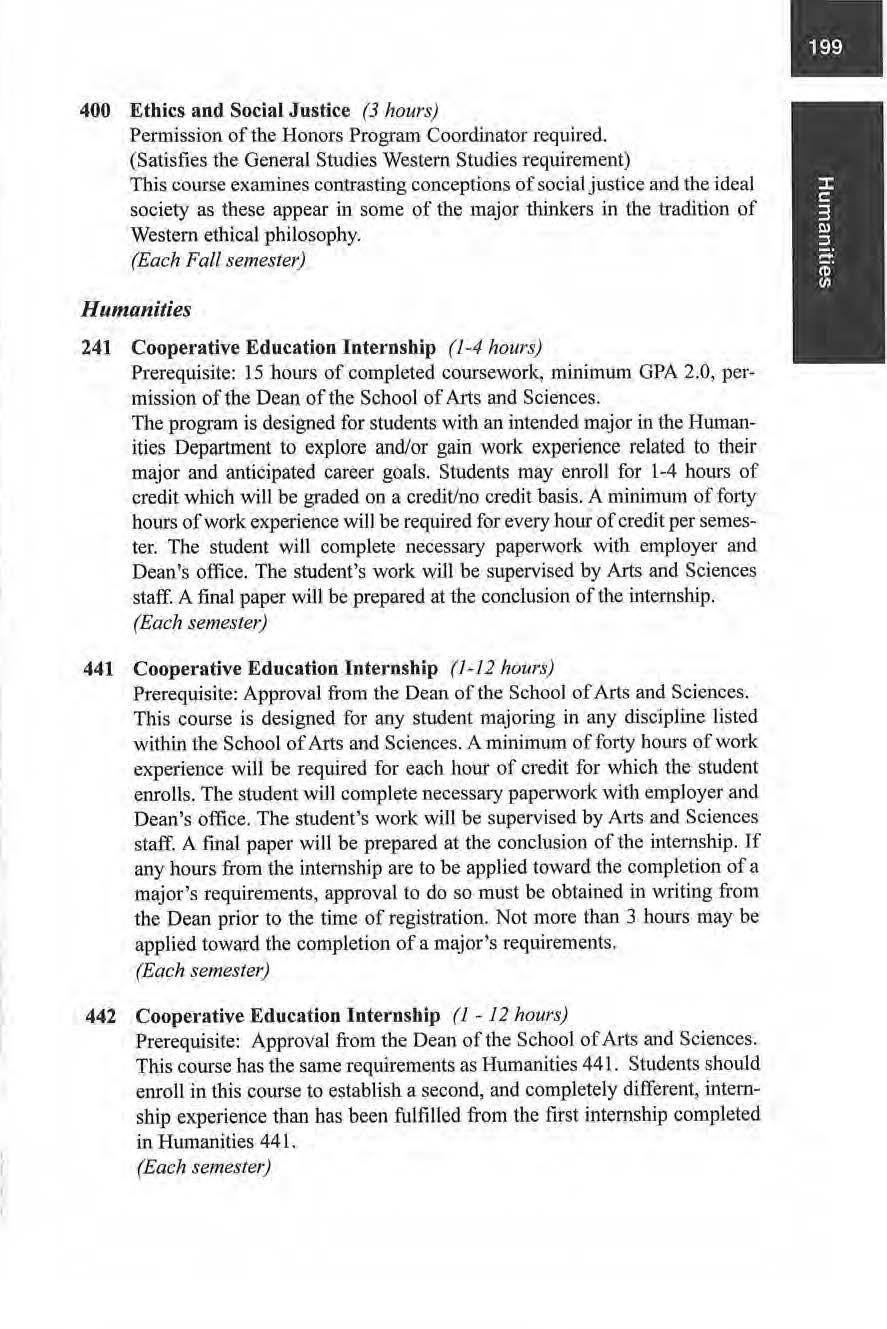
240 Car Care (2 hours)
This course is designed to provide tbe student with a basic knowledge of purchasing, maintaining, instu'ing, and operating the- modem autom obi le. Conswner infonnation is stressed together wirh basic knowledge of automotive lubrication, tune-up, and diagnosis. This course does not apply on the Industrial Teclu1ology major.
(Offered as needed)
330 T.-af'fic Safety I (3 hours)
A study of the highway transportation system with emphasis on education, enforcement and engineering techniques to improve the safe mobjlity of the American public. The development of knowledge and skills in a driver education instructional system including teacher and program qualifications, curriculum development and administration, and instructional preparation in traffic safety programs.

(Offered as needed)
331 Ti-affic Safety ll (3 hows)
Prerequis ite: IT 330 or pennission
This course will provide an opportunity to construct materials relating to and experiinenting with methods of presenting lessons in traffic safety and behind-the-wheel driving. Each studen t will be expected to teach a beginoing driver.
(Offe red as needed)
338 Industrial Safety (3 hours)
This course is designed to familiarize the student with safety management and accident prevention as related to industry. Emphasis will be placed in the following areas: Occupational, P ersonnel, Transportation, Waste Management, and Management of Safety Programs.
438 Teaching the Use of the Multiple Vehicle Range (I hour)
Prerequisite: IT 3'.30 or permission.
The course provides the students with basic and advanced techniques, and methods in teaching the use of the multiple veh icle range facility and programs
(Offered as needed)
439 Teaching Simulator Instruction (1 how)
Prerequisite: IT 330 or permission.
Introduction of methods, techn iques and maintenance in the use of driving simulation systems for Driver Education.
(Offered as needed)
100 Introduction to Mass C ommunications (3 hours)
This course presents the nanire, function, and responsibilities ofcommunications agencies, includ ing newspapers, radio and television , film, and advertising; the services that the mass media perform for society.
(Sp ring semeste1; odd yearl)
234 Begjnoing Journalism (3 hour5)
Prerequisite: Ability to type.
The fundamental principles of gath ering and writing news: practice in reporting campus news; and work on the Peru State Tim es, college newspaper are incorporated into this cou rse.
(Eac h Fall semester)
235 Newspaper Editing (2 hours)
Prerequisite: Journ 234 or permission of instructor.
This i s an intensive course in joumalistic d esk work that includes copy preparation, headline writin g, page layout; extens iv e work on the Peru State Tim es desk. Credit not to exceed a total of four hours.
(Each Fall semeste,)
297 Directed Study in Journalism (1-4 hours)
Prerequis ite: Senior standing; prior approval of Instmctor and Dean of the Sch oo l of Arts and Sciences. For mies concerning Directed Study courses, please refer to page 69.

(Offered as needed)
298 Special Topics in Jo urnalism (1-4 hours)
Prerequisite: Freshman-Sophomore standing; Journalism 234 or permission of instructor.
This course presents the fundamentaJ principles of designing, organizing and publishing a college publication will be experienced in thi s class through work on college projects.
(Offered as n eeded)
300 C ommunications Law (3 hours)
This course is a study of the media 's legal context wit11 an emphasis on the issues oflibel, contempt. access to public records, invasion of privacy, criticism, and copyright.
(Offered a:; needed)
401 Journalism Practicum (1 how)
Prerequisite: Journalism 234.
Practicum students will be involved in th e production of the college n ewspaper and/or college yearbook. Credit not to exceed one credit hour each semester. May be repeated for up to six hours credit.
(Each semestet)
497 Directed St udy i n Jo u rnalism (1-4 hours)
Prerequisite: Senior standing; prior approva l of Instructor and Dean o f the School of Arts and Sciences. For rules concerning Directed Study courses, please refer to page 69.
(Offered as needed)
498 Special Topics i n Journa l ism (2 hours)
Prereqllisite: Junior-Senior standing; Journa lism 298. A continuation of Journalis m 298 involving advanced techniques in layout and design.
(Offered as needed)
499 Independent Study in Journal ism (1-4 hours)
Prerequisite: Junior standing; prior approval of instructor and the Dean of the ScJ100J of Arts and Sc iences. For rules concerning Independent Study courses, please refer t o page 69.
(Offered as needed)
100 Elementary Algebra (3 hours)
This course is an introduction to the effective algebra and graphing ski ll s which can be used to promote academic success in college. Units to be covered include rea l numbers , linear equations, polynomfals, rational expressions, exponents and radicals and quadratic equations. Each topic is also applied to word problems , This course earns students institutional credit but do es not fulfill General Studies requirements.
(Offered eve1J1 semeste1~
IOI College A lgebra (3 hours)
Prerequisite: One year of high schoo l a lgebra. This course is for students who specifically need algebra in certain pre-professional> programs. lt covers algebraic principles and processes and is not to be taken for credit by students who have completed Math 120, or Math 130.
(Each semester}
110 Eleme nts of Mat he m atics (3 hours)
This course is designed to give the non-mathematical student the opportunity to use basic operations, succeed in mathematical modeling and understand deductive and inductive reasoning The general concepts covered will include sets, logic , the 11umber system (natural numbers through the rea ls), equations, inequalities, problem so lving, graphs, functions and geometry.

(Each semester)
120 Fini te M athemati cs (3 hours}
Prerequisite: Two years of college preparatory mathematics or Mat h l OI . This cow·se is designed to give the non-mathematica l student mathematical skills necessary for success i11 today's world. Emphasis is placed on appli-
cations The concep ts covered wi ll inc lude linear, quadratic, exponential and logarithm ic equations, fu n ctions and graphs , rates of change, linear a lgebra, li near programming, sequences and series.
(Every semester)
130 Princi ples o f Mode rn Ma them atics (3 hours)
Prerequisite: Two years of college preparatory mathematics or Math 101 Th.is course is intended for st11dents who plan to pursue a college program req uiring a subs tantial ammmt of training in mathematics. The course wi ll bui ld from bas ic know ledge ofalgebra and geometry towards a solid understanding of th e modem approach to both doing mathematics and ap plying mathematics, especially in the areas of technology and connections between branches of mathematics. Course t opics include functions , rates of change, fractal geometry, trigonometric functions, po lar coordinates, vectors, complex numbers, linear transformations, matrices and groups of motions. Applications from many areas of science are incl uded .
(Bac h Fall semester)
160 M ath e matics for Ele menta ry Teac hers (3 hours)
This course is intended for students who plan to teach elementary school chi ldren or special education children in both elementary and secondary schools Topics wi ll include concepts in arithmetic, numeration systems, estimation and measurement, number patterns and number theory, mathematical model ing, p lane geometry, prob lem-solving strategies and deductive and inductive reasoni ng. Emphasis is placed on developing mental models fo r these concepts and processes to hel p understand 'why' instead of j u st 'how'. NCTM standards are emphasized throughout the course.

Prepa ration for the P PST is i ncl uded.
(Each Fall seinester)
225 Calculu s w ith Ana ly tic Geom etry I (5 hours)
Prerequisite: Math 130 or equivalent.
This course includes the study of analytic geometry, functions, limits, conti• nuity, related rates , differentiation, maxima and mi nima, higher ordet derivatives, techniqu es of graphing, and basic integration theory with app lication.
(Each Fall semester)
226 Ca lc ulus with A na lytic Geo metry n (5 hours)
Prerequisite: Math 225 or equivalent. This course includes the study of the d ifferentiation of logarithmic and exponential functions, antiderivati ves and th e definite integral, integration, inverses and related top ics.
(Each Spring semester)
230 .Foun dations o f Math e ma tical Thou g ht (3 hours)
Prere qu isite: Math 225 or equivalent.
This course is an introd uction to the theoretical aspect s of mathemat ics. Students will explore axiomatic foundations of sets, functions and logic. Various methods and sty les of proofs wi ll be discussed. Students wilJ learn
to write proofs of various type-S using proper mathematical sty le and proper w1iting style.
(Each Spring semester)
240 Elements of Statistics (2 hours)
This course i11troduces the non-mathematics student to tl1e statistical language, skills and techniq ues necessary for success in many of today's fields. Emphasis is placed on applications in business, public policy, socia l sciences, education and medicine. Moral and ethical issues relatfag to experimentation and to decision making are also discussed. Specific topics include descriptive statistics, e lementary probabjlity, experimental design, frequency distributions, visual representation of data, the normal distribution and formal stati stica l reasoning. Student work on research projects to gain first-hand experience with the issues in tl1e course.
(Eve1y semester}
297 Directed Study in Mathematics (/-4 hours)
Prerequisite: Senior standing; prior approval of Instructor and Dean of the Schoo l of Arts and Sciences. For rules concerning Directed Study courses, please refer to page 69.

(Offered as needed)
299 Special Topics in Matbematics (1-4 hours)
Prerequisite: Freshman-Sophomore standing.
(Offered as needed)
304 Modern Geometry (3 hours)
Prerequisite: Ma1h 230.
Thi s course covers the modem approach to geometric con cepts with emphasis in both the axiomatic approach to geometry and the use of modem technology to work with geometric concepts . Topics covered will include finite geometries, geometric transfon11ations, syntbetfo geometry, geometric constructions and non-Euclidean geometries.
(Fall semeste1; even years)
3 06 Modern Algebra (3 hours)
Prerequisites: Math 230 or Math 430. This course is a study of the various algebraic systems arising in m odem mathematical computations. Emphasis is placed on the axiomatic approach to algebra and the use of modern technology to work with algebraic concepts. Topics covered will include sets, mappings and operat ion s, relations , groups, rings, domains, development of the real number system and development of the comp lex number system.
(Spring semeste,; even years)
327 Calculus with Analytic Geometry ID (3 hours)
Prerequisites: Math 225 and 226 or equivalent. This course includes the study of further techniques in integration, infinite limits, :improper integrals, polar equations, an introduction to vector calculus, and an introduction to muJtivariable calculus.
(Pall semester. odd years)
328 Differential Equations (3 hours)
Prerequisites: Math 327 or equivalent.
Thjs course will review differentiation and integration. Solutions and m ethods for solvin g first and second order ordinary differential equation will be discussed and applied.
(Spring :semeste;; even years)
340 Statistics (3 hours)
A study of the methods of summarizing and interpreting data, elementary probability, and its relation to distributions. The meanings, importance, and application of the nonnal and binomial distributions and the methods of random sampling, testing of hypotheses, analysis of paired data, and interpretation of standardized test scores are covered. Students work on independent research projects to gain firs t-hand experience with the issues of the course.
(Each semeste,)
404 Mathematical Modeling (3 hours)
Prerequisite: Math 225 or equivalent
Thi s course covers a variety of mathematical topics ranging from graphs and networks to linear programming. The emphasis of the course is on modeling process used to set up and solve problems in these topic areas. Strengths and limitations of the mathematical modeling technique will be discussed. Analysis and critique of traditional word problems will also be di scussed.

(Fall semester, even year~)
418 Linea1· Algebra (3 hours)
Prerequisite: Math 230
This course presents systems of linear equations, determinants, vector spaces, inner product spaces, lin ear transfomrntions , eigenvalues and eigenvectors with moderate emphasis on proof. Applications of these concepts are also covered.
(Fall semeste1; odd years)
430 Discrete Structures (3 hours)
Prerequisites: Math 120 or Math 130, and Math 230. A study of some of the mathematical concepts useful to the computer sciences including number systems, logic , 1Tuth tables. sets and relations, boolean algebra, logic circuits, vectors, matrices, determinants , graphs, directed graphs, finite machines, and automata.
(Spring semestet; odd years)
440 Advanced Statistics (3 hours)
Prerequisite: Math 340.
This course continues the study of methods of summarizing and interpreting data, with special emphasis on non-non11ally distributed statistics, hypotheses testi11g, multivariate analysis and non-linear analysis of data.
(Spring semester, odd years)
441 lnte.-n s bip in Mathematics (l-12 hours)
Prerequisite: Penni ssion of Department Internship Coordinator
This program allows mathematics students to gain relevan t work experience and establish professional re lationships in mathematics. Students may enro ll fo r 1-12 hours of graded credit. A minimum of forty hours of wor k ex perience wil l be required for eve ry hour of credit per semester. The s tudent wi ll complete necessary paper work wi t h employer and the Mathematics Internship Coordinator. The student 's work ,v ill be s upervised and evaJuated by the Mathematics In ternship Coordi nator in cooperation with the employer.
(Eac h semester)
442 Biometrics (3 hours)
Prerequisite : Math 340
This cou rse is designed to give the biological researc h student a bas ic knowledge of statjstical techniques. Emphasis in this course is on appli cation rather than statistical theory. Topics wiJI i nclude one and two factor analysis of variation, testing for goodness of fit, and introductions to CX"perimen tal design and multiva ria ble regress ion.
( Offered as needed)
490 Semina r in Math em atical R esearch ( 1 hour)
Prerequisite: Seruor Standing in Mathemat ics, Penn iss ion.
This course consists of a review of current research trends in mathematics. Eac h student will review current litcratwe and se lect and pursue a topi c of individual s tudy. Mathematics facu lty will rnenror and g rade the participants in the course. This course is to be taken during the student's last year of study at Peru State Col lege. Thi s course is the capstone course and senior competency for the Matbematjcs major.
(Offered as n eeded)
497 Directed S tudy io Mat he m atics ( 1-4 hours)
Prerequisite: Senior sta nding; prior approval of Instructor and Dean of the Schoo l of Arts and Sc iences. For ru les concerning Directed Study courses, please refer to page 69.
(Offer ed as needed)
498 Spec ial Topics in Mathematics (1-4 hours)
Prerequisite: Junior-Se nior standing.
( Offered as needed)
499 Independent Study in Mat hemati cs ( 1-3 hours)
Prerequi site: Jtu1ior standing; P ermission of In struc tor and prior approva l of Dean of Arts and Sciences. For ru les concerning Indep endent Study in Mathematics, please refer to page 69.
(Offered as n eeded)

100 Recital Atten dan ce (0 hours)
All students in music are required to register fo r lhis course each semes ter on a credit/no credit basis for tbe appropriate number of se mesters indicated in their selected program. Attendance at a minimum of eighty percent (80%) of all rec itals each semester is requi red.
(Each semester)
101 C ollege Band (I hour)
Co ll ege Band is a p erformance class open to all s tudents who have pri o r experienc e playing an instrument and reading music, or with the consent of the in structor An emphas is is placed on the s t udy and perfonnance of traditional and cont emp orary co nce rt ban d literature in a variety of idi oms and sty les. Con ce rts are performed on and off campus.
(Each sem ester)
101 C ollege C hoir (I how)
Open to a ll students with the consent of the director. An emphasis on th e s tudy and performance of rep resentative cho ral works of a ll periods. Three days atten dance weekly.
(Each semeste,)
103 .Jazz En s emble (1 hour)
Open to a ll students by audi tion an d the consent of the in s tructor. An emphas is is placed on the study and perfonnance of music in all popular idioms. Jazz ensemble performs co ncerts on and off campus.
(Eac h semester)
102 S how Choir (J hou1)

Opeo to all students by audition and consent of the instructo r An em phasis is placed upon the study and performance of vocal music in all popular idioms and concerts are perfonned on and off campus.
(Each semester)
105 Bra ss Ensemble (1 hour)
Open to all students with the consent of the instructor. An emphasis is placed upon the s tudy and performance of brass literature in all t he c h amber music idi oms and concerts are performed on and o ff campus.
(Each semeste,)
106 Woodwind E nsemble (1 ho ur)
Open to all student s with th e con sent of the instructor. An emphas is is placed upon the study and per formance of wood wind litera ture in all the chamber mus ic i dioms and concert s are per fo rmed o n and off the campus.
(Each sem ester)
107 M adrigal Singers (1 '10 111 )
Open to all s tudents w ith the consent of the in structor. An e mphasi s is placed upon the study and performance of voca l literature in a ll chamber music i diom s. Co ncerts are p erformed on and off campus.
(Eac h s e m est er)
108 Percussion Ensem ble ( I hour)
Open to all students with the consent of the instructor. An emphasis is placed upon the study and perfon11ance of percussion ensemble literature in a variety of chamber music idfom s. Concerts are performed on and off campus.
(Each semester)
11 I Fund a me ntals of Mus ic (2 ho1,r3)
This course provides an introduction to the rudiments of music, including letter and syllable names of notes, lime values of notes and rests, time and key s ignatures, chromatics, intervals, chords, keyboard experien ce, and the writing of original melodies.
(Eac h Fall sem ester)
112 Beginning Class Piano (I how)
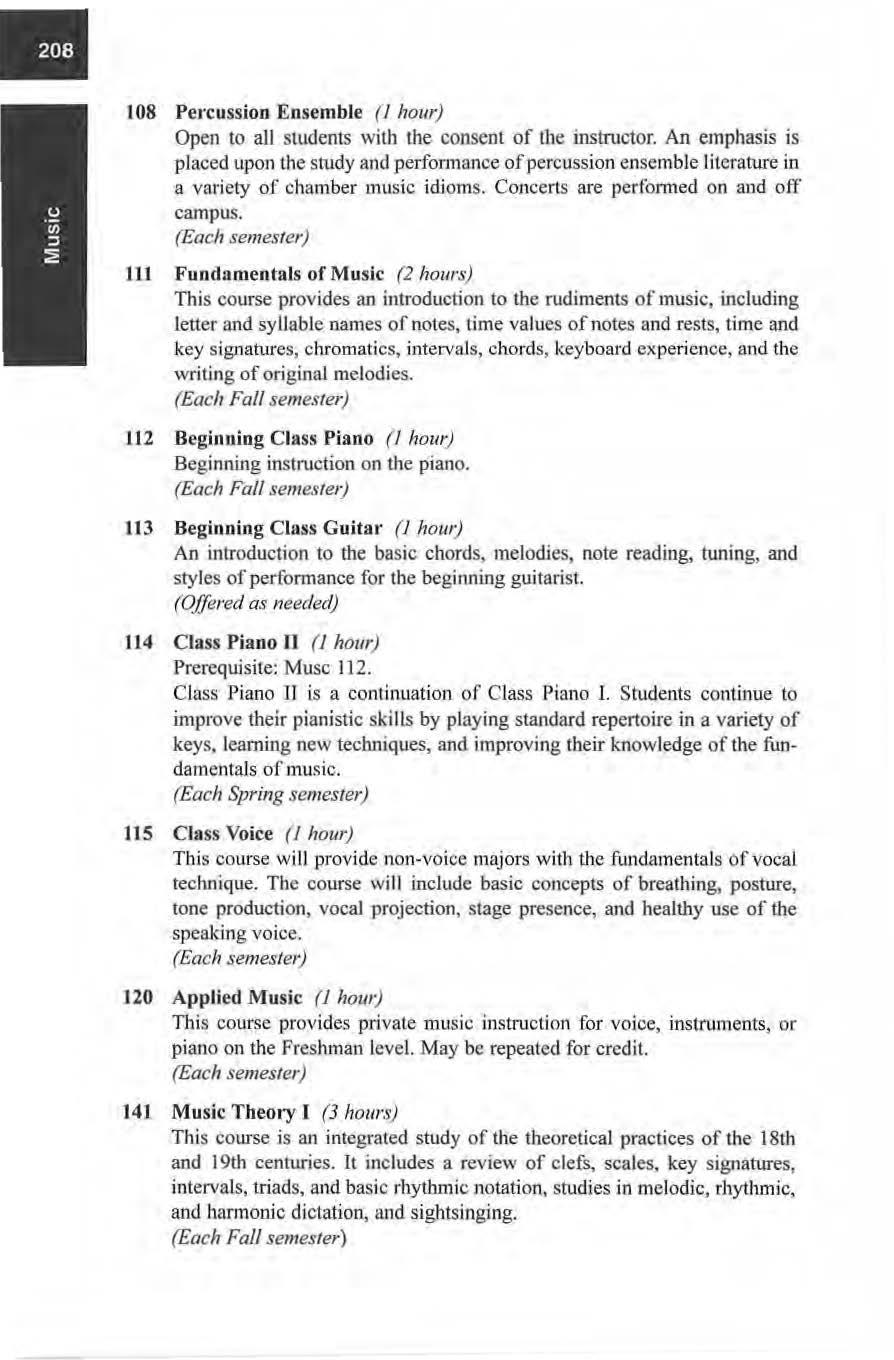
Beginning instruction on the piano.
(Each Fall semestei)
11 3 Beginning Clnss Guitar (/ how)
An introduction to the basic chords. melocLies, note reading, tuning, and styles of performance for the beginning guitarist.
(Offered as needed)
114 Class Piano 11 (1 hour)
Prerequisite: Muse 112.
C lass Piano 11 is a continuation of C lass Piano I. Students continue to improve their pianistic skills by playing standard repertoire in a va riety of keys. learning new techniques, and improving their knowledge of the fundamentals of music.
(Each Spring semester)
115 C la ss Voice (1 how )
This course wi ll provide non-voice majors w ith the fundamentals of vocal technique. The course will include basic concepts of brea t hing, posture, tone production , vocal projection, stage presence, and healthy use of the speaking voice.
(Each semeste1)
120 Applied Music (1 hour)
This course provides private music instruction for voice, instruments, or piano on the Freshman level. May be repeated for credit.
(Each semestei)
14·1 Music Theory l (3 hours)
Thi s course is an integrated study of the theoretical practices of the 18th and 19th centuries. It inc ludes a review of c lefs, scales. key signatures, intervals, triads, a nd basic rhytbn1ic notation, studies in melodic, rhythmic. and harmonic d ictation , and sightsinging.
(Each Fall semester}
142 Music T heo ry n (3 hours)
Prerequ isite: Muse 141.
This course is an integrated study of the theoretical practices of the 18th and 19th centuries. It includes the study of secondary triads, six-four chords , domi nant ru1d s upe rtonic seve nths, e lementary m odulation , studies in melodic, rhythmic and harmonic dictation, and sights inging.
(Each Spring semester)
200 Piano Proficiency Exami na tion (0 h ours)
All stu den ts in mus ic e ducation (K-6 o r K-1 2) are requ ired to register for Muse 200 on a credit/no c redi t basis during the semeste r they in tend to take t he required piano proficiency examination. Successful co mpleti on of M use 200 is required before emailing for student teaching. S tudents must be e nroll ed for applied piano concurrently with Muse 200.

(Each semeste1)
211 Mus ic Apprec iation (3 hours)
This course prov ides a s urvey of the various forms and sty les of mu s i c ranging from folk songs to opera, oratorio, and symp hony Se lected works are analyzed and discussed through the use of recordings.
(Each semesle1)
210 World Music (3 hours)
World Musi c is an introduction to ethnomusicology in wh ich the student w ill learn to experience and understand music in l11e co ntext of human l ife. Students will experie nce and analyze the mus ics of Africa, Native America, Black America, Asia, th e Near East, lhe Pacifi c, and Eastern Euro pe . Thi s course will also provide the s tudent the tools with w hich to discover the meanings of music in the Ii fe of any society.
(Each Fall semester)
213 Introdu ct ion t o Jaz;i: History (3 hours)
In troduction Lo Jazz History is a gen era l educat ion survey cou rse that will examine the three artistic activities o f music, viz., c reating, performing, and l is tening; th e co urse will examine the unique place jazz has in A m erican c ultural hjstory and how its creators have been influenced by soc ial a nd hi storical forces peculiar to America; and although concerned primarily with the music of jazz, the course will examine the lives of some of the most prominent performers from eac h jazz period.
(Eac h Spring semester)
220 A pplied Mu sic (1-2 hours)
Prerequis ite: Muse 120.
Thi s course prov ides pri vate music instructi on for voice, in struments, or piano on the Sophomore level. May be repeated for credi t.
(Each semester)
241 Music Theory III (3 hours)
Prerequisite: Muse 142.
This course is an integrated study of the theoretical practices of the l8th and 19th centuries. It includes a detailed study of the c hromatic hannonic practices of the 19th century, a survey of the 20th century theoretical practices, studies in melodic, rhythmic, and hannonic clictation, and sight singing. (Fall se111este1; even years)
242 Music Theory IV (3 hours)
Prerequisite: Muse 241.
This course is an integrated study of the theoretical practices of the J8t h and 19th centuries. It includes a detailed study of the chromatic ha1monic practices of the 19th century, a survey of 20th century theoretical practices and studies in melodic, rhythmic, and hannonic dictation and sightsinging. (Spring semeste,; odd years)
251 E lem e ntary M usic Met hods (2 hours)
Prerequisite: Muse 111 or music major.
This course is a s tudy of modern teaching techniques for children's music literature.
(Each Spring semester)
297 Directed St ud y in Music (1-4 hours)
Prerequis ite: Senior standing; prior approval of In structor and Dean of the School of Arts and Sciences. For rules concerning Directed Study courses, please refer to page 69.
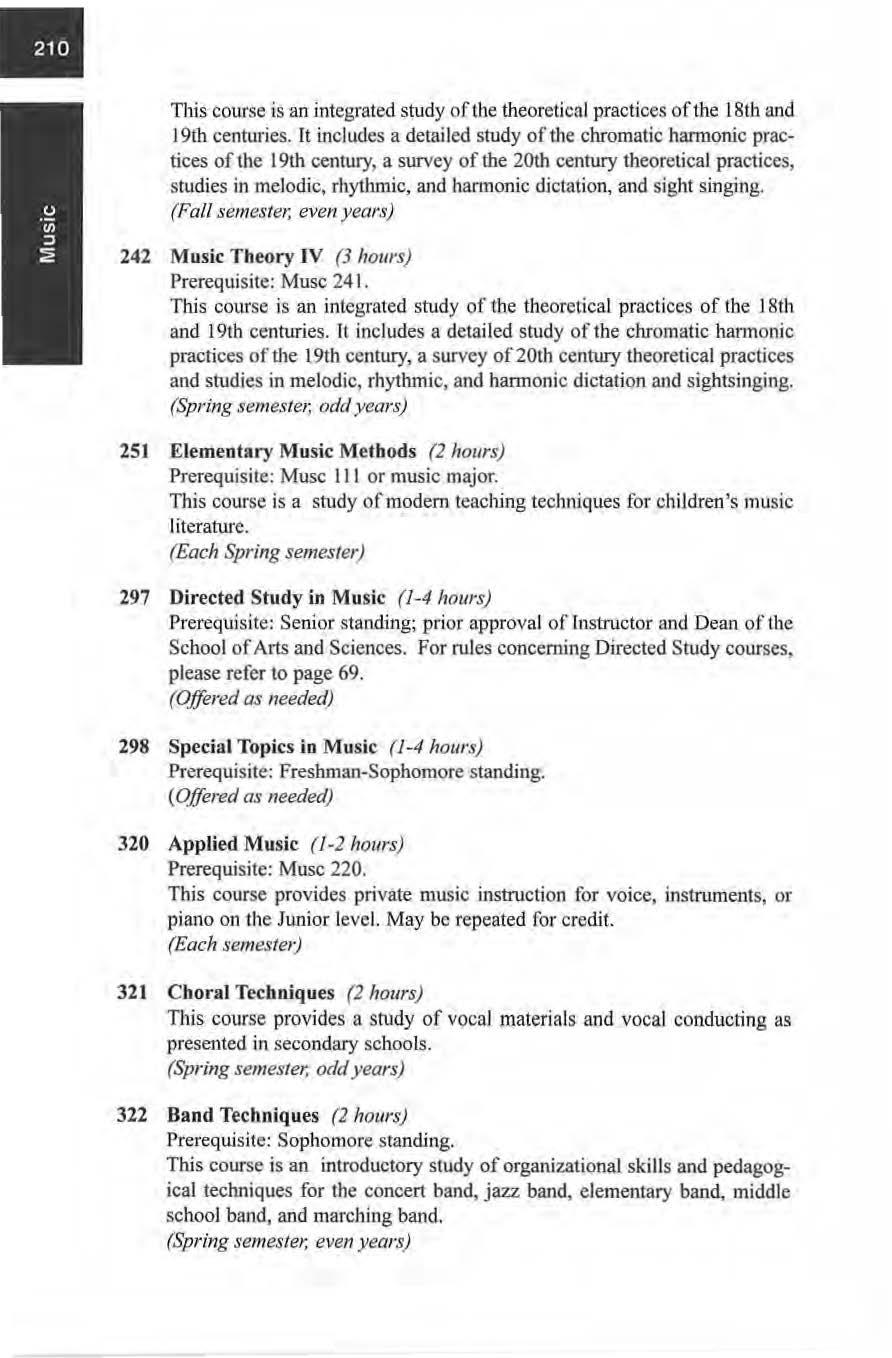
(Offered as needed)
298 S pecia l Topics in Mus ic (l-4 hours)
Prerequisite: Freshman-Sophomore standing. ( Offered as needed)
320 AppJied Music (1-2 hours)
Prerequisite: Muse 220.
This course provides private music instruction for voice, instruments, or piano on the Junior level. May be repeated for credit
(Each semeste1)
321 C horal Techniques (2 hours)
This course provides a study of vocal material s and vocal conducting as presented in secondary schools.
(Spring semester, odd years)
322 Band Tec hniques (2 hours)
Prerequisite: Sophom o re standing.
This course is an introductory study of organizational ski ll s and pedagogical techniques for the concert band, jazz band, elementary band, middle school band, and marching baud.
(Spring semeste1; even years)
340 Junior Rec ita l (I h our)
Prerequisite: Muse 320.
This course includes selection, preparation, direction and rehearsal of a recital of music for voice, instruments, or piano cu l minating in a thirtyminute performance. Students must be concurrently enro lled for applied music during the semester they are enrolled for the junior recital. (Each semeste1)

342 Arra nging (3 hours)
Prerequisite: Mllsc 142.
This is a course in p r actical scoring and arranging for band and orchestra and voices.
(Spring semester, even years)
351 Brass Methods (2 hours~
Th is course is a study of brass ins t r uments and brass pedagogical techniques with actual playing experience. (Spring semeslet; odd year~)
352 Woodwind Me th ods (2 hours)
This course is a s tudy of woodwind instruments and woodwind pedagogical techniques with actual p laying experience. (Fall Semester. odd year!-.)
36 1 String Meth ods (2 hours)
TI1is course is a study of stringed instruments, including the guitar, and stringed pedagogical techniques w ith actual playing experience. (Offered as needed)
362 Percuss io n Me thod s (2 hours)
This course is a s tudy of perc ussion instruments and percussion pedagogical techniques with actual playing experience. (Fall semester, e ven years)
363 Music Business (3 hours)
Mus ic Business is an in troduction to m us i c as it functions in the business world in the United States, focusing on the music i n dustry and related fields. Basic theories and processes will be stressed , histories and musical trends of particular fields wi ll be explored, various contracts and contract law and the role of the music industry attorney, and an examination of the ways in which music is encountered in our daily lives wi ll be taken into account.
(Sp r ing semester, odd years)
420 Applied Mus ic {l-2 hours)
Prerequisite: Muse 320.
This course provides private music instruction for voice, instruments, or pian o on the Senior level. May be repeated for c redit. (Each semester)
440 S enior Rec ital (1 how)
Prerequisite: Muse 320 or h igher. This course includes se lect io n, preparation, direction, and rehearsal of a rec ital of music for voice, instruments, or piano culminating in a six tymi nute perfo rmance. Stude nts must be concunentl y enro ll ed fo r app li ed music duri ng the semester th ey are enro ll ed for the senior recital. Thjs course is the capstone course and senior competency for the Music major. (Each semcsre,)
441 Music Hi s t o ry l (A n t iquity to 1 75 0 ) (3 hours)
This course is a study of the development of' music from antiquity through the end of the Baroque period wit h stylistic analysis of m usi cal examples. (Fall semester. odd years)
442 Music Hi s tory II (1 750 - present) (3 hours)
Thjs course is a study of the development of music from the beginning of the Classica l period to t he present wit h sty listic ana lys is of mus ica l examp les. (Spring se111es/e1; even year.1)
461 C horal C onducting (3 hows)
Prerequjs ite: Permjssion of tbe instructor. In thi s cou rse studen ts wi ll learn the bas ics of c horal con duct ing incl udin g score preparation and conducting rehearsals. (Fall semeste1; even years)
462 In strume ntal C onductin g (3 hou r~~
Prerequisite: Muse 242
The knowledge of baton techniques, reading and interpreting a musical score, and the presentation of techniques of rehea rsing instrumental organizatio ns a re s tressed in this course. (Fall semeste1; odd years)
497 Dire cted S tud y in M usic ( /-4 hours)
Prereq uisite: Senior stand i ng; prior ap pro val of Ins tr uctor a nd Dean of t he Schoo l of Arts and Sciences. For rules concerning Directed Study courses, please refer to page 69.
(Offered as needed)
498 Special Topic s in Mus i c { 1-4 ho urs)
Prerequ isi te: Junior-Senior standing.
(Offered as needed)
499 Indepe ndent S tudy in Music {1-3 hours)
P rerequisite: Junior s tanding; prior approval of Instructor and Dean of the School of Arts and Sciences. For ruJes concerning Independent Study courses, p lease refer to page 69.
(Offered as needed)

201 Intro du ctio n t o Ph ilosophy (3 hours)
This course is an introduction lo the main fields in philosophy, with special attention to theory of knowledge, ethics, poUtical theory, and aesthetics. Major thinkers in the Western tradition will be discussed.
(Each semeste1)
Physical Educ11tio 11

Phys ical Education activities courses require two hours of attendance . In fulfillment of the General Studies requi rements, each student will be required to enroll in PE I 00 Wellness. It will be followed by two activity courses, of which one will be developmental.
l 00 Wellness (l houni)
This course is designed to acquaint students with the ph i losophy, knowledge, and techniques necessary to write a personalized life-time fitness and wellness program. The course wil l include both theory and practical application in the study of physical fitness and well ness.
(Each semester)
104 Go lf and Te nn is-Ma inte n ance (1 hour)
Prerequisite: PE I 00.
Thi s course is designed to interest the stude nt in go lf and tenni s. Emphasis will be placed on fundamental techniques of tbe ga me, rules of th e game and etiquette.
(Each semester)
106 Ra cquet Spo rts-Main te na nce (I hour)
Prerequisite: P E 100
This course is designed to introduce s tudents to a variety of racquet sports. Emphasis will be p laced on fundamental skills, rules and techniques of play.
(Each Fall semester)
11 2 Beginning Swimming- D e velo pm ental (1 ho 11r)
Prerequisite: PE I 00.
This course is designed to introduce the student to the basic fundam e ntals of swimming. Emphasis will be placed on deve lopment of basic strokes and r hythmic breathing.
(Each Spring semester}
116 Voll eyball and Bas ket ball-Ma intenance (1 hour)
Prerequis ite: PE 100.
This comse is designed to introduce the student to the bas ic fundam ental s of vo ll eyball and basket ball. Emphasis w i ll be p laced on skills, rnles and strategies of the games.
(Each Fall semester)
116 S trengt h T rai n ing-Deve l opme n ta l (/ how)
Prerequi site: PE 100.
This course is designed to introduce students to a variety of ph ilosophies and strength development techniques. Programs will be deve loped to meet individual needs.
(Eac h semester)
11 9 Restricted Activi ties- Deve lopmenta l ( I how)
Prerequfaites : PE 100; penuission of Dean of Education and Graduate S tudies.
This course is designed to meet th e needs of students who are unabl e, because of medical reasons, to taJce general physical ed ucation activity courses. The c lass is conducted on an individual basis in order to meet the personal fitness need s of the student.
(Offered as needed)
12 1 Aerobic D a nce-D eve lo pm enta l (I hour)
Prerequi si te: PE 100
Tllis course is designed to introduce the student to a variety of aerobic co nditioning act ivities and technique s. Emphasis is on mod es o f training, aerobic capac ity, fitness development and program design to meet indi vidua l need s and demands.
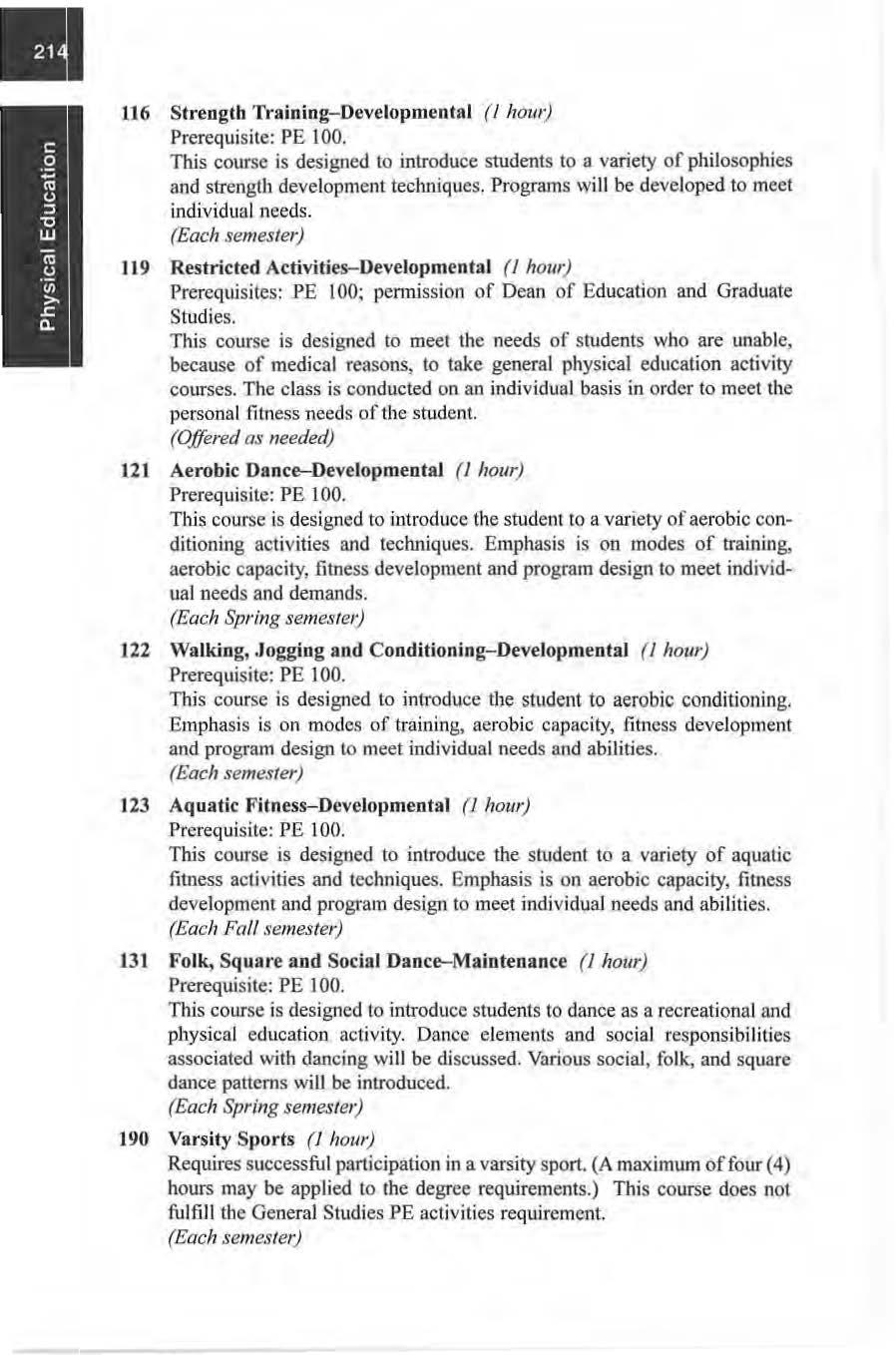
(Each Spring semeste1)
122 Wa lkin g, J oggin g and Co nditionin g-D eve lo pm e nta l (I how)
Prerequisite: PE 100.
This course is design ed to introduce the student to aerobic conditioni ng; E mphasi s is on modes of training, aerobic capacity, fitness development and program design to meet individual needs and abilities.
(Each semester)
123 Aq uatic Fi t ness-Devel o pmental (I hoUJ)
Prerequisite: PE I 00.
This comse is designed to int roduce the s tudent to a variety of aquatic fitness activities and techniques. Emphasis is o n aerobic capacity, fitness developm ent and prog ram design to meet individual need s and abilities.
(Each Fall semester)
131 Fol k, Sq u are an d Soc ia l Da nce-Ma inte na nce (1 hour)
Prerequisite: PE I 00.
Thjs course is designed to introduce s tudents to dance as a rec reational and physical education activity. Dance elements and social responsibi l ities assoc iated with dancing will be discussed. Various social, folk, and square dance patterns wilJ be introduced.
(Eac h Spring semeste1)
190 Vars ity Sp orts ( 1 hour)
Requires s uccessful participation in a varsity sport. (A maximum of four (4) hours may be a pplied to the degree requirements.) This co urse does not fulfill the General Studies PE activities requirement.
(Eac h sem este r)
201 Principles of Physical Education (3 hours)
Students will study the development of the field of Physical Education and its relationship to modem educational theory including the history and principles of Physical Education as furn ished by the basic sciences and the philosophies of Physical Education.
(Each Fall semeste,)
208 Theory of Footba ll and Wrestling (3 hours)
This cow·se examines the theory and methodology of coach ing football and wrestling. Emphasis is placed 011 offensive and defensjve styles of football and all basic techniques of wrestling, organization of practice periods, scheduling, budgetiJ1g, pre- and post-game or match management, and rules interpretation.
(Each Fall semeste,)
209 Theory of Basketball and Baseball (3 hou,.s)

This course examines the theory and methodology of coaching basketball and basebal l. Emphasis is placed on offensive and defensive styles of basketball and baseball, organization of practice periods, sched uling, budgeting, pre- and post-game management, and rules interpretation.
(Each Fall semester)
210 Theory of Track nod Field and Cross Country (3 hours)
This course examines the theory and methodology of coaching all the standard track and field events and cross cow,try. Emphasis is placed on orgauizatfon of practice periods, schedul ing, budgeting, management of aerobic capacity; fitness development and program design to meet individual needs and abilities.
(Each Fall semester)
21 l Theory of Women's BasketbaU a nd Softball (3 hours)
This course examines the theory and methodology of coaching women's basketbaU and softball. The course will address gender differences in selection of activities in basketball and softball. The psychological approach to the game and special concerns a coach must be aware of when dealing with female athletes will also be addressed. This course will address the differences between women's and men's sports. Emphasis is placed on organization of practice periods, scheduJing, budgeting, pre- and post-game management and rules interpretation.
(Each Spring semester)
2 11 Theory of Volleyball and Soccer (3 hours)
This course examines the theo1y and methodology of coaching vo l.l eyball and soccer. Emphasis is placed on offensive and defensive strategies in volleyball and soccer, organization of practice periods, scheduling, budgeting, pre- and post-game management, and rules interpretation.
(Each Fafl semester)
215 First Aid (3 hours)
American Red Cross course and Medical Self Help course
(Each semeste,~
220 Sports Skills - Series l (1 hour)
This course is a study of the strategies and techniques i1wo lved in teaching selected physical education activities. lncludes work to demonstrate compe tency in specified motor skills, including aquat ics.
Sports Skills co urses (PE 220-221) r e quire two hours of attemlllnce.
(Each Fall semester)
22 1 Sports S kills - Series 2 (1 how~
This course is a study of the s t rategies and teclmiques involved in teaching selected physical educat ion activities. lncludes work to demonstrate competency in specified motor skills, including gymnastics.
Sports Skills co urses (PE 22 0-22 I) r e quire t1110 hours of ntlenda11ce.
(Each Spring semeste,)
23 0 Rhythm s and Dauce for Elemen tary School (3 hours)
Tb.is course is an exploration of the concepts and relati onsh ips of move1nent, broadening the concept of se lf-education through th e expe rience of basic rhythms and dance a ctiviti es at the elementary level.
( Each Spring semester)
241 Internship in Sport Management (3 h ours)
Prerequisite: Pennission of Dean of E ducation and Graduate Studies. T hi s course is designed fo r any student majoring in the Sport Management op tion and is to be taken early in the fonnaJ college program. The learning s ituation will be organized a nd supervised by the School of Education and Graduate Studies staff. A minimum of fot1y how s of work experience will be required for each how- of credit (rnjnimWTI total of I20 hours ).

(Offered as needed)
Z97 Directed Study in Physical E ducation (1-4 hours)
Prerequisite: Senior stand ing; prior approval of In structor and Dean of the Schoo l of Education. For rules concerni ng Directed Study courses, please refer to page 69.
(Offered as needed)
298 Special Topics in Physica l Education ( 1-4 hours)
Prerequisite: Freshman- Sophomore standing.
( Offere d as needed)
300 Preventio n and Ca re o f S ports Injuries (3 ho urs)
Prerequisite: PE 3 i 2
This course examines the nature and cause of injuries related to the physical activi ties of children and athletes.
(Each Fall semeste1)
309 Orga nization , Administration and C urricu lum of Physical EducationSecondary (3 h o zws)
This course examines the general principles of admi ni strative techn iques and responsibilities in Physica l Education.
(Each Spring semester)
312 M usc ula1· A na to my and Ki nesiology (3 hours)
This course will provide the student with an understanding of the anatomical and mechanical fi.mdamentals of human motion. The student will learn a systematic approach to the analysis ofhwnan motion and \Ni ll be able t o apply anatomical and mechanical analysis to the learning and improvement of a broad spectTUrn of movement activities.
(Each Fall semester)
3 13 Elemen tary/Mid dJe Scho oJ P hysical Ed u c atio n (3 hours)
Prerequisite: Junior standing or permission of the Dean of Education and Graduate Studies.
This course examines the selection and organization of materials and techniques of ins t ruction focusing on human movement and its significance in the development of the lives ofchildren K -8
(Each Fall semester)
360 P hysiology of :Exercise (3 hours)
This course will provide students with a working understanding of how exercise affects the different systems oftbe body
(Each Spring semester)
415 M otor Learn ing (3 hours)
This course will provide an introduction to the field of motor learning. T he focus of the course is on ski ll acqu isi tion with primary consideration given to the learning process, the cognitive and motor processes underlying the l earni ng of skills and factors that influence skill learning.
(Each Fall semeste1)
4 16 Tes ts and Meas u e m ents i n Phys ica l Ed uc a tion (3 hours)
The purpose of this course is to provide an understanding of essential statistical techniques, relevant m easurement theory. and availab le tests to enable the student lo develop valid methods of evaluation.
(Each Spring semestet~
4 17 A da p tive Physic al E du cation (3 hours)
Prereq uisites: Psych 250 and PE 312. This course provides a study of philosophy, procedures and practices in adapted physical education.
(Each Spring semesrer)
441 Internship i n S port Ma nageme n t (3 hours)
Prerequis ites: Penuission of D ean of Education and Graduate Studies; Compl etion of PE 241.

This course is designed for any student majoring in the sport management option and is to be taken near the completion of the forma l college program. Students may enroll for this course upon the approval of the Dean of Education and Graduate Studies. The learning situation will be organized and supervised by the Schoo l of Education staff. A minimum of forty hours of work experience will be requ ired for each hour of credit (minimum total of 120 hours).
(Offered as needed)
433 Seminar in Physica l Education (2 hour~)
This course is designed to explore issues and challenges in physical education . As a capstone course, it should be taken near the completion of all Physical Education coursework.
(Each Spring semeste1)
497 Directed Study in Physica l Education (1-4 hours)
Prerequisite: Senior standing. Prior approval of the Instructor and Dean of the School of Education and Graduate Studies. For ruJes concerning Directed Study courses, please refer to page 69.

(Offered as needed)
498 Special Topics in Phys ical Ed uc atio n (l-4 hours)
Prerequisite: Junior standing.
(Offered as needed)
499 Independent Study in Physical Education (1-3 hours)
Prerequisite: Junior standing; prior approval of Instructor and the Dean of the School of Arts and Sciences. For rules concerning Independent Study courses, please refer to page 69.
(Each semeste,)
100 Introductory Physics (5 hours)
This is a condensed comprehensive survey of Newtonian and Modem Physics. Topical focus includes energy, mechanics, heat, electricity, sound, light, atom ic slrncl11re and relativity. This class includes required lectures, recitation, and laboratory components.
(Fall semeste,; even years as needed)
201 General Physics (5 hours)
Prerequisites: Math 130 or equivalent.
The topics of mechanics, sotmd, and heat are included in this mathematically-based physics course. This class includes required lectures, recitation. and laboratory components.
(Fall semeste,; odd years as needed)
202 General Physics (5 hours)
Prerequisites: Physics 201 or permission
The topics of li ght, electricity, and magnetism are inclu ded in this mathematically-based physics class. This class includes required lectures, recitation, and laboratory components.
(Spring semester, even years as needed)
206 Great Ideas in Astronomy (3 hours)
Thi s course is an introduction to astronomy, with emphasis on those ideas and discoveries that have had, and continue to have, strong influence on our modem culture and world view.
(Offered as needed)
297 Directed Study in Physics (1-4 hours)
Prerequisites: Senior standing; prior approval of the lnstmctor and Dean of the School of Arts and Sciences. For rules concerning Directed Study courses, please refer to page 69.
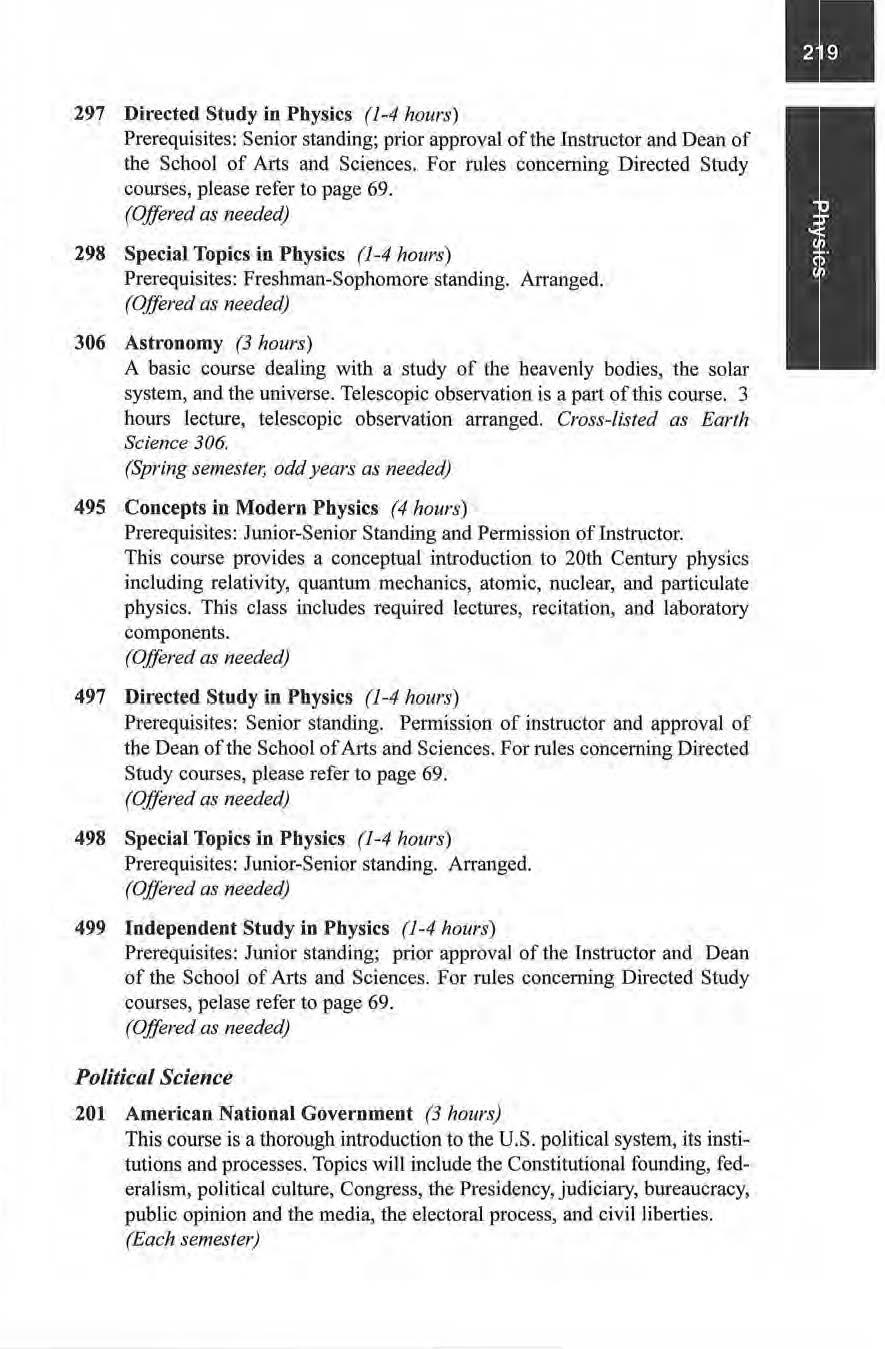
(Offered as needed)
298 Specia) Topics in Physics (1-4 hours)
Prerequisites: Freshman-Sophomore standin g. Arranged. (Offered as needed)
306 Astronomy (3 hours)
A basic course deaJing with a study of the heavenly bodies, the solar system, and the universe. Telescopic observation is a part of this course. 3 hours lecture, telescopic observation arranged. Cross-listed as Earth Science 306.
(Spring semester, odd years as needed)
495 Concepts in Modero Physics (4 hours)
P rerequisites: Junior-Senior Standing and Permission of Instructor. This course provides a conceptual introduction to 20th Century physics including relativity, quantum mechanics, atomic, nuclear, and particulate physics. This c lass includes required lectures , recitation, and laboratory components.
(Offered as needed)
497 Directed Study in Physics (1-4 hours)
Pterequisi tes: Senior standing. Pem1ission of instmctor and approval of the Dean of the School ofAt1s and Sciences. For rules concerning Directed Study courses, please refer to page 69. (0.IJ'ered as needed)
498 Special Topics in Physics (1 -4 hours)
Prerequisites: Junior-Senior standing. Arranged. (0.IJ'ered as needed)
499 Independent Study in Physics (1-4 hours)
Prerequisites: Juni o r stand ing; prior approval of the In structo r and Dean of th e School of Arts and Sciences. For rules concerning Directed Study courses, pelase refer to page 69.
(Offered as needed)
201 Ame1·ican National Government (3 hours)
This course is a thorottgh introduction to the U.S. political system, its institutions and processes. Topics will i11clude the Constitutional founding, federalism, political cu lture, Congress, the Presidency, judiciary, bureaucracy, public opinion and the media, the electoral process, and civil liberties.
(Ea ch semester)
202 State and Loc al Government (3 hours)
This course include s description and analysis of political institutions and behavior in American states with interstate comparisons and comparisons between state and national po li tical systems. Lecture topics include the development and role of American local government, its forms and structures, and the re lationsh ip to tile federal government.

(Fall semester, even years)
298 Special Topics in Political Science (1-4 hours)
Pr ereqt1is ite: Freshman-Sophomore standing.
(Offered as needed)
3 01 Com parative Government (3 hours)
This course includes a comparative analysis of political systems and institutions of several nation s; the nations studied may change \\rith each offering. TI1e course emp ha sis is on political culture, comparative political hi story, chief executives, legi slatures, political parties, interest groups, courts, and policy making with ample comparisons to the U.S.
(Each Fall semeste1; odd years)
3 05 A merican Leadership (3 hours)
Prei'equisite: PSci 201.
TI1is course uses the works of historians and political sc ientists to exam ine leadership in its many facets - leading organ izations, fostering change, winning elections, creating movements, and shapi11g public opinion. Dual listed as Hist 305 .
(Sp r ing semeste1; even yem·s)
426 American Constitutional Law (3 hours)
Prerequi site: PSci 20 1.
A study of the hjstorical and political context of constitutional doctrine through major decisions. The emphasis is on consti tutional growth a s it relates to the fundamental stmcture of American government and the social order. D ual-listed as Hist 426.
(Each Spring semester)
467 The Fa r East (3 hours)
Thls course is concerned with the political trad itions and historical evolution of the area, the impact of the West and its profound influences on tile pol itical or der, and today's revo lutionary s ituat ion.
(Offered as needed)
468 Public Adm ini strat ion (3 hours)
Prerequis ite: PSci 201.
Stud ents will study a range of topics involved in the administration of pub li c agencies. Topics will include the history of America's public service, t he development of intergovernmental relations, bureaucracies, public personne l, budgeting, decision making, evaluation procedures, and regulatory administration. This class will encourage students to investigate the role of
public administration in the past and today, as well as to conjecture the possibilities for the future. Dual-listed as Bus 468. (Spring semeste1; odd year.s)
497 Directed Study in Political Science (1-4 hours)
Prerequisite: Senior standing; prior approval of the Instructor and the Dean of the School of Arts and Sciences For rules conceming Directed Stndy courses, please refer to page 69.
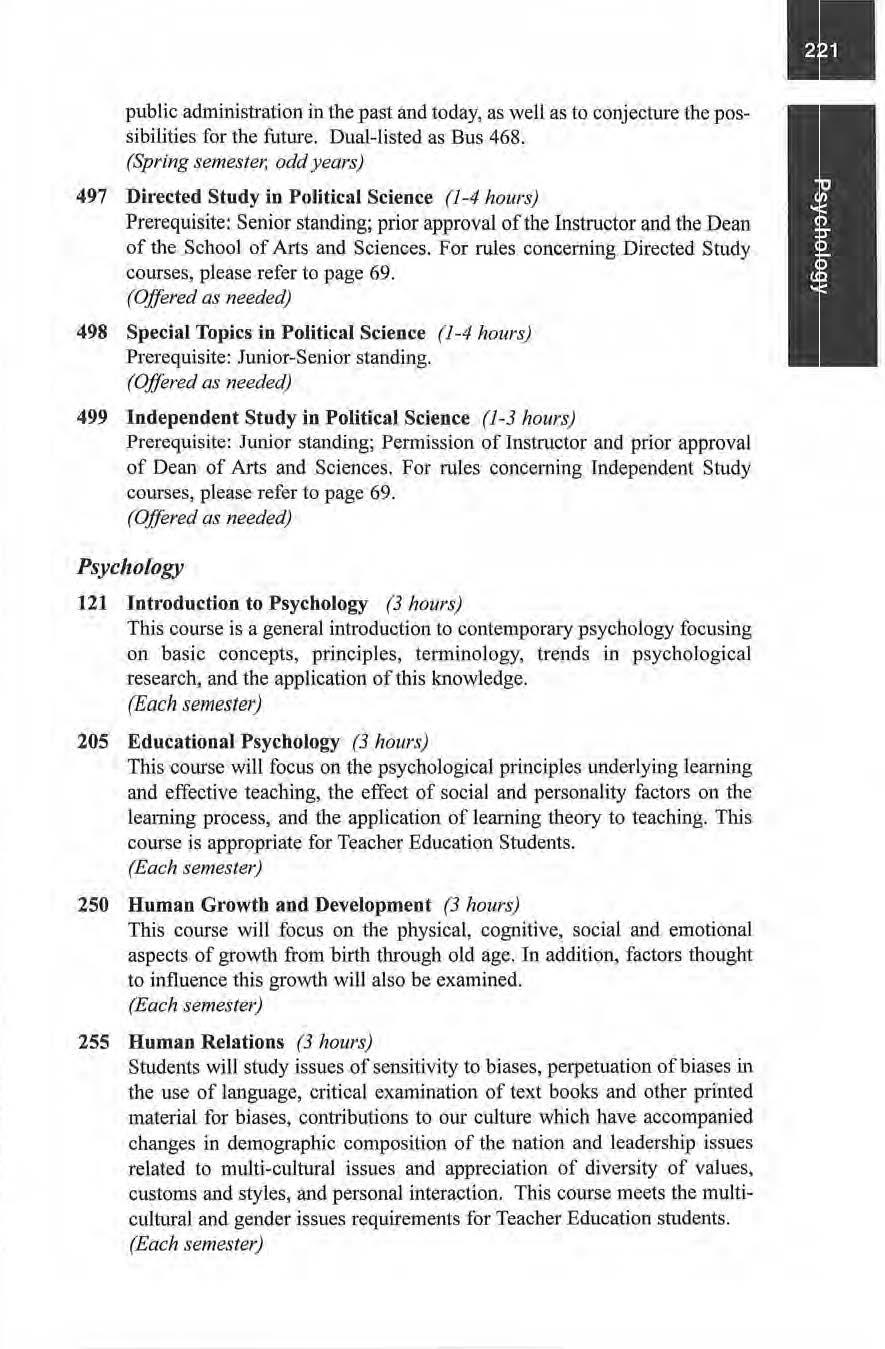
(Offered as needed)
498 Special Topics in Political Science (1-4 hours)
Prerequisite: Junjor-Senior standing.
(Offered as needed)
499 Independent Study in Political Science (1-3 hours)
Prerequisite: Juni or staiJcling; Permission of Instructor and prior approval of Dean of Arts and Sciences, For mies concerning Independent Study courses, please refer to page 69.
(Offered as needed)
121 Introduction to Psychology (3 hours)
This course is a general introduction to contemporary psychology focusing on basic concepts, principles, t erminology, trends in p sychological research, and the app lication oftbis knowledge. (Each semester)
205 Educational Psychology (3 hours)
This course will focus on the psychological principles underlying learning and effective teaching, t he effect of social and personality factors on the learning process, and t11e application of learning theory to teaching. This course is appropriate for Teacher Education Students. (Each semester)
250 Human Growth and Development (3 hours)
This course will focus on the physical, cognitive, social and emotio11al aspects of growth from birth throu gh old age. In addition, factor s thought to influence this growth will a lso be examined. (Each semeste,)
255 Human Relations (3 hours)
Students will study i.ssues of sensitivity to biases, perpetuation of biases in the use of language, critical examination of text books and other printed material for biases, contTibutions to our culture whi ch have accompanied changes in demographic composition of the nation and leadership issues related to multi-cultural issues and appreciation of diversity of values, c ustoms and styles, and personal interaction. This course meets the multicultural and gender issues requirements for Teacher Education students. (Each semester)
297 Directed Study in Psychology (/-4 hours)
Prerequisite: Senior standing; prior approval of the Instructor and the Dean of the School of Professional Studies. For rules concerning Directed Study courses, please refer to page 69.
(Qffered as needed)
305 SociaJ Psychology (3 hours)
Prerequisite: Psyc 121 o r Soc 20 I. This course will focus on the effects of culture, society, social institutions, and soc ial learning on tile social attitudes and behavior of individuals within groups.
(Spring semeste1; odd years)
310 Psychology of Sports and Physical Activities (3 hour~~

Prerequjsite: Psyc 121.
This course examines the place of psychology in physical education and sports. It includes personality, attention and arousal, anxiety and interven• tion, theories of motivation , and social psycho logy of sp011s aggression, audience effects, team cohesion, and leadership in sports.
(Fall semeste1; even years)
320 Psychology of Learning (3 hours)
Prerequisite: Psyc 121.
Trus course will provide students with a broad, eclectic coverage of the field of leami ng and memory by addressing the wide range of issues and problems within the field from stimulus-response to cogn itive psychology.
(Spring semeste1; odd years)
330 Research Methods (3 hours)
Prerequisite: Psyc 121.
This is an introductory course that concentrates on research methods and designs and not on statistica l analysis procedures used in research projects. This course demonstrates how research methods are utilized in the social and behavioral science. This course is cross-Usted with CJus 330.
(Each Fall semester)
345 Psychology of Personality (3 hours)
This course will focus on the process of personality growth and adjustment. Through a11 examination of elecled theoretical systems, different interpretations of this process will be presented. Non-Western and multicultural considerations of personality theory are included.
(Fall semeste,; odd years)
380 Adolescent Psychology (3 hours)
Prerequisite: Psyc 121.
This course examines the cognitive and psycho-social aspects of adolescence, It examines age appropriate developmental events, barriers to progress. and development facilitation.
(Each Fall semester)
410 Experi mental Psychology (3 hours)
Prerequisite: Psyc 121; Psyc 330.
This course is designed io assist students in the comprehension and use of experimental methods and literature. Research exercises are provided to illustrate course content.
(Spring semester; even years)
431 Psychological Tests and Measurements (3 hours)
Prerequisites: Psyc 121.
The course will focus on the issues and problems surrounding psychological testi11g. Topics to be discussed include reliability, validity, construction, administration, nonns, and interpretation as well as a survey of current psycho logical tests.
(Offered as needed)
437 Techniques of Co unseling (3 hours)
Prerequisite: Psyc 121.
The course will study the fundamental theories, principles, and techniques of counseling as they apply to education, psychology, and soc ial work practices. Practi cal experience in the use of these techniques will also be provided.
(Each Fall semester)
438 Divers ity Issues in Counseling (3 hours)
This course is designed to help professionals in a variety of fields consider the impact of family and cultural systems on the counseling process. Basic counse li ng approaches and strategies of working with diverse populations will be addressed.
(Each Fall semester)
440 Behavior Management and Modification {3 hours)
Prerequisite: Junior standing or pennission of instructor.
The course will focus on the basic p rinciples of behavior modification as well as survey some of the practical application s of this general approach to behavior change.
(Each Spring semester)
441 Psychology Internship (1-12 how·s)

Prerequisite: Junior-Senior stanrnng; pennissiou of the Criminal Justice/ Psychology D epartment Head.
This program is designed for students with a major in P sychology to gain work experience related to their major and career goals. Students may enroll for l-12 hours of graded credit. A minimum of forty (40) hours of work experience will be required for every hour of credit per semester. The student will complete necessary paperwork with the e1uployer and the School of Professional Studies office. The student's work will be supervised and monitored by the Criminal Justice/Psychology Department Head. A final paper will be prepared at the conclusi on of the internship.
(Each semester)
442 Psycho logy internship (1-12 hours)
Prerequisite: Junior-Senior standing; permission of the Criminal Justice/ Psychology Department Head. This program is des igned for students wi th a maj or in Psychology to complete a second internship. S t udents may enro ll for 1-12 hours of graded credit. A mini.tnw11 of forty ( 4 0) hours of work experience will be requited for every hour of credit per semester. The stu dent will complete necessary paperwork with the employer and the School of Professional Studies office. The student's work w ill be s upervised and justify monitored by the Crim in al Justice/Psychology Department Head. A final paper will be prepared at the conclusion of the internship.

(Eac h semester)
450 A bnormal Psyc ho logy (3 hours)
P terequis i tes: Psyc 121, Psyc 25 0 and junior standing. Focusing on personality disorders, schizophren ia and manic depressives, this course wi ll dea1 extensively with c mTent DSM categories of abnormal psychology.
(Spr ing semester, odd years)
460 Psychology of At-Risk Youth and Co rrections (3 hours)
Prerequi s ite: Junior standing, corrections employm ent or instructor permi ss ion.
This course appl ies cultural influences on behavior, mult icultural considerations, counse lin g and treatment techn iques, educati on and therapy ski ll s appropriate for at-risk youth, a nd under-educated correctiona l populations. The cou rse incorpoJates learni ng styles, alco ho l and dntg use/abuse, domestic viol ence education and prevention, cooperative learni ng, confl i ct management, and soc ia l literacy and l eadership skil ls developed in active learning.
(Spring semester, even years)
465 Psychology Practicum (3 hours)
Prerequisites: Psyc 460, Math 240 or Math 340
As a companion course of Psychology 460. Practicum will super vise students t uto ring and mentoring offenders. Students wi ll develop library and referencing skills along wi th choosing a topic, fortnul ating a research question, note taking, paraphrasing, and summar izing. Other areas to be covered include interpretation of data, presentation of materials , and plagiarism
(Each semester)
495 Seminar in Psychology (3 hours)
P rerequi site: Seni or s ta nding; Psychology major.
This sen ior-l evel seminar is meant to be a capstone experience, u tili zi ng individu al research, dra"ving npon inte rn or practicum exper iences, in corporating cooperati ve 1eamiog for group assignments in which each student wi 11 demonstrate mastery of verbal and written exp1·ession of major, broad psychol ogi cal concepts, concerns, and perspectives, and their incorporation into rea l world experiences, needs, and opportunities.
(Eac h Spring semester)
497 Directed St ud y in Psychology (1-4 hours)
Prereq ui site : Senior standing; prior approval of In structor and Dean of the School of Professional Studies. For rules concering Directed Study courses, please refer to page 69.

(Offered as needed)
498 Special Topics in Psychology (1-4 hours)
Prerequisite: Junior·Senior standing.
(Offered as needed)
499 Ind e pendent Stud y in Psychology (/-3 hours)
Prerequisite: Juni or standing; prior approval of Instructor and Dean of the School of Profe ssional Studies. For rul es concerning Independent Stl1dy courses, please refer to page 69 .
(Each semester)
280 Intmduction to Professio nal Ethic s an d Socia l Work P ractice (3 hours)
This cotu·se is an introduction to the profession of social work with an emphasis On professiona l ethics in social work as well as professiona l eth ics and issues in a lco hol/drug counseling. Students will also study the hi story, philosophy, methods , and processes of social work. Various populations will be studied from a socia l work perspective, and these sa.t11e popuJations will be exp lored from al cohol/drug perspectives, with the code of profess ional ethics applied from both perspectives.
(Each Fall semeste1)
310 Social Services (3 hours)
Prerequisite: So Wk 280. This course is the sn1dy of co mmunity socia l work with emphasis on techniques used to assess social problems on a macro level as well as practice. Emphasis is also placed on how social services meet the needs of communities in deaUng with social issues.
(Each Spring semeste1)
370 E thnic Gro up Relations (3 hours)
Prerequisite: Soc 2 0 L
This course will anal yze factors that impact m inority groups historica ll y, cultura lly, socia ll y, psycho logically and economically within the social structure of th e Un ited Siates. An em ph asis will be placed on ID1derstanding these relationship s between the dominant-minority structure as they relate to political, educationa l, legal and soc ial opportunities within ow· culture. Students wi ll s tudy similarities and differences within and b e tween mjnority groups.
(Each Fall semester)
375 As sessm e nt, Eva luation , and Casework Management (3 hours)
Prerequisite: So Wk 280.
This course applies tl1e tbeory and practice of current techniq ues utilized in
casework. A special emphasis is placed on alcohol/drng disorder diagnosis, evaluation and treatment, and/or referral, including practice assessing and managing a case.
(Each Fall semeste1)
390 G roup Work (3 hours)
Prerequisite: So Wk 280.
Group Work focuses on the theories and dynamics of group counseling. The course will focus on tl1e development of specific skills that can enhance group leadership such as: understanding the group process, group development, how to set up groups, choosing group members, the diITerent types of groups, and the leadership skills needed for group work. Students will facilitate an experiential gro up process to practice the skills.
(Each Spring semester)
410 Addictions (3 hours)
Prereqllisite: SoWk 28 0.
This course investigates the physiological, psychological, and socio logical aspects of a variety of populations that are at-risk for addictions, compuls ions, and dependence , particularly focusing on aJcoho l and drugs. The etiolog ical, behavioral, cultural, and delhographic conditions and belief systems of vatious add ictions are explored. Case analysis, referral , and treatment plans are practiced.
(Each Spring semesrer)
420 Mecl ical and Tniatme nt Issues in Social Wo rk (3 hours)
Prerequisite: So Wk 28 0; Junior-Senior standing. This course st udies medical and treatment trends and issues in social work with a special emphasis o n alcohol/drug disorders, physical and mental disorders, generational use/abuse/ dependence of alcohol/drugs, drug treatment theories, practices and p rograms, and UJtique spec ial populations. The social implications of modern western world medical practices, as well as alternative approaches to hea ling, and the future of medical socia l work are discussed.
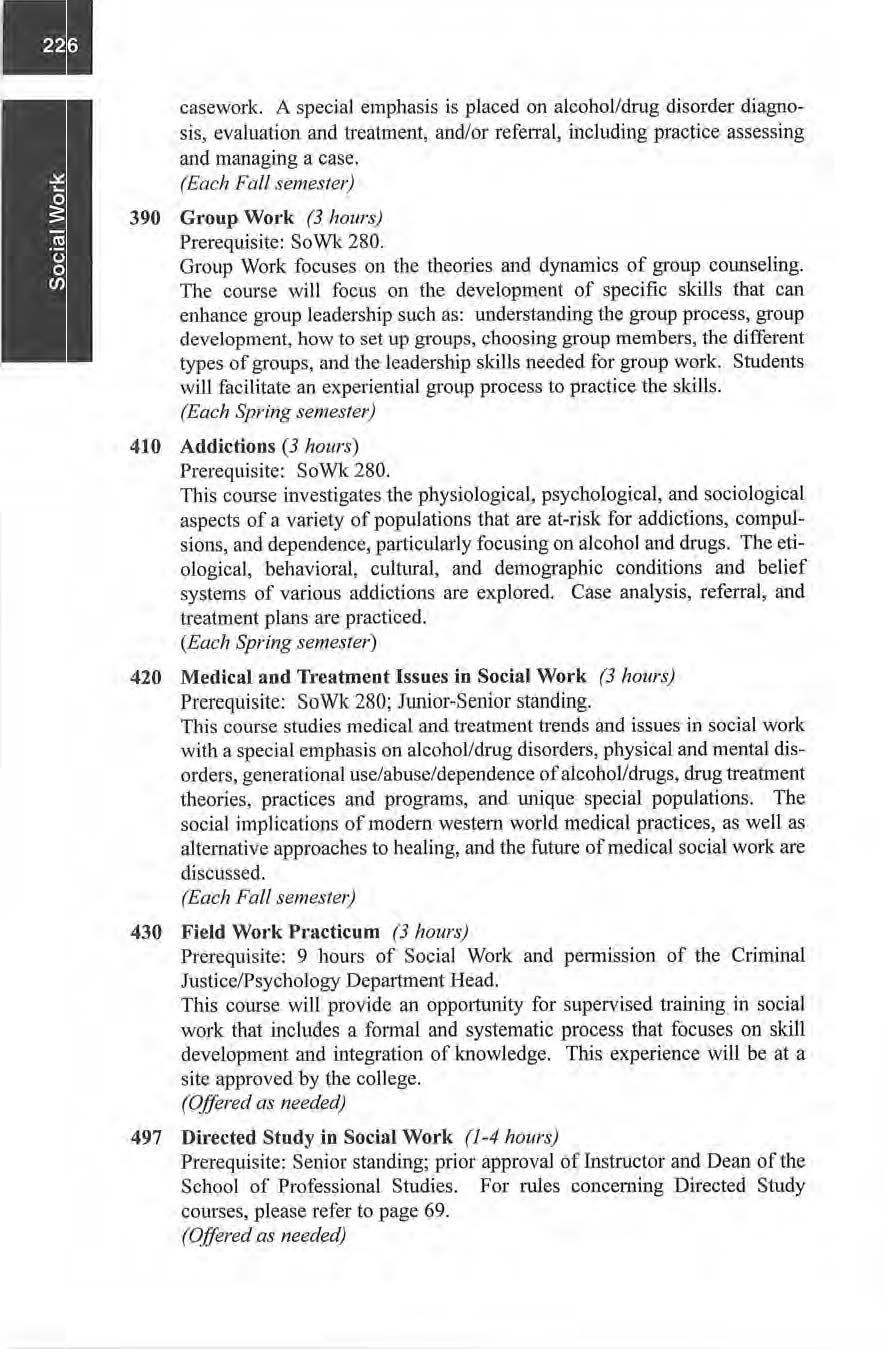
(Eac h Fall semeste1)
430 Field Wo rk Practicum (3 hour~)
Prere qui s ite: 9 hours of Social Work and permiss ion of the Criminal Justice/P sychology Department Head.
This course will provide an oppo1tunity for supervised trai ning in social work that inc ludes a fo1mal and systematic process that focuses on skill development and integration of knowledge. This experience will be at a site approved by the college.
(Offered as needed)
497 Direc ted Study in Socia l Work (J-4 hours)
Prerequisite: Senior standing; prior approval of Instructor and Dean of the School of Professional Studies. For rules concerning Directed Study courses, please re-fer to page 69.
(Qffered as needed)
498 Special Topics in Social Work (1-4 hours)
Prerequisite: Junior-Senior standing.
(Offered as needed)
499 Independent Study in Social Work (1-3 hours)
Prerequisites: Junior standing; prior approval oflnstructor and the Dean of the School of Professional Studies. For rules concerning Independent Study courses , please refer to page 69.

(Offered as needed)
201 Principles of Sociology ( 3 hours)
Tbjs course is an introductory study of group and social dynam ics, cultures, social problems, social institutions, intergroup relationships, and the impact of social policies.
(Ea ch semester)
300 Contemporary Social Problems (3 hours)
This course is an introduction to the causes, treatment, and prevention of selected social problems with particular emphasis on t.he problems of conflict and inequality.
(Offered as needed)
340 The Family (3 hours)
Prerequisite: Soc 201.
This course provides an examination of the role of the family in contemponlry society with an emphasis on the factors influencing the family structure, functions, and roles, and their imp)jcations for both the commwlity and individuals at vacying stages of the family life cycle.
(Offered as needed)
497 Directed Study in Sociology (1-4 hours)
Prerequisite: Senior standing; prior approval of Instructor and Dean of the School of Professiona1 Studies. For rules concerning Directed Study courses, please refer to page 69.
498 Special Topics in Sociology (1-4 hours)
Prerequisite: Junior-Senior standing.
(Offered as needed)
499 Independent Study in Sociology (1-3 hours)
Prerequisite: Junior standing; prior approval of instructor and the Dean of the School of Professional Studies. For rules conceming Independent Study courses, please refer to page 69.
(Offered as needed)
101 Introductory Spanish (5 hours)
This is an introductory course in Spanish dealing with grammar, reading, writing, and conversing.
(Each Fall semester)
l 02 Span is h II (5 hours)
Prerequisite: Span 10 I.
Spanish II emphasizes increased p roficiency in conversational situations, grammar, reading, and writing.
(Each Spring semester)
200 Introdu ction to Special Education (3 hours)
This course is designed to provide a historical , political and socio logical survey of the areas of exceptionality in the field of spec ial education. The course will identify s ignificant changes which have occurred in the education of exceptional populations and provide an introductory experience concerning the various disability groupings.
(Eac h semester)
290 Education of Mentally Han dic apped Learners (2 hours)
Prerequisite: SpEd 200 or concurrent enrollment. This course is designed to provide a swvey of the characteri st ics, abilities, needs, the psychological and environmental and cu ltural factors which contribute to retardation.
(Each Fall semester)
297 Directed Study in Special Education (1-4 hours)
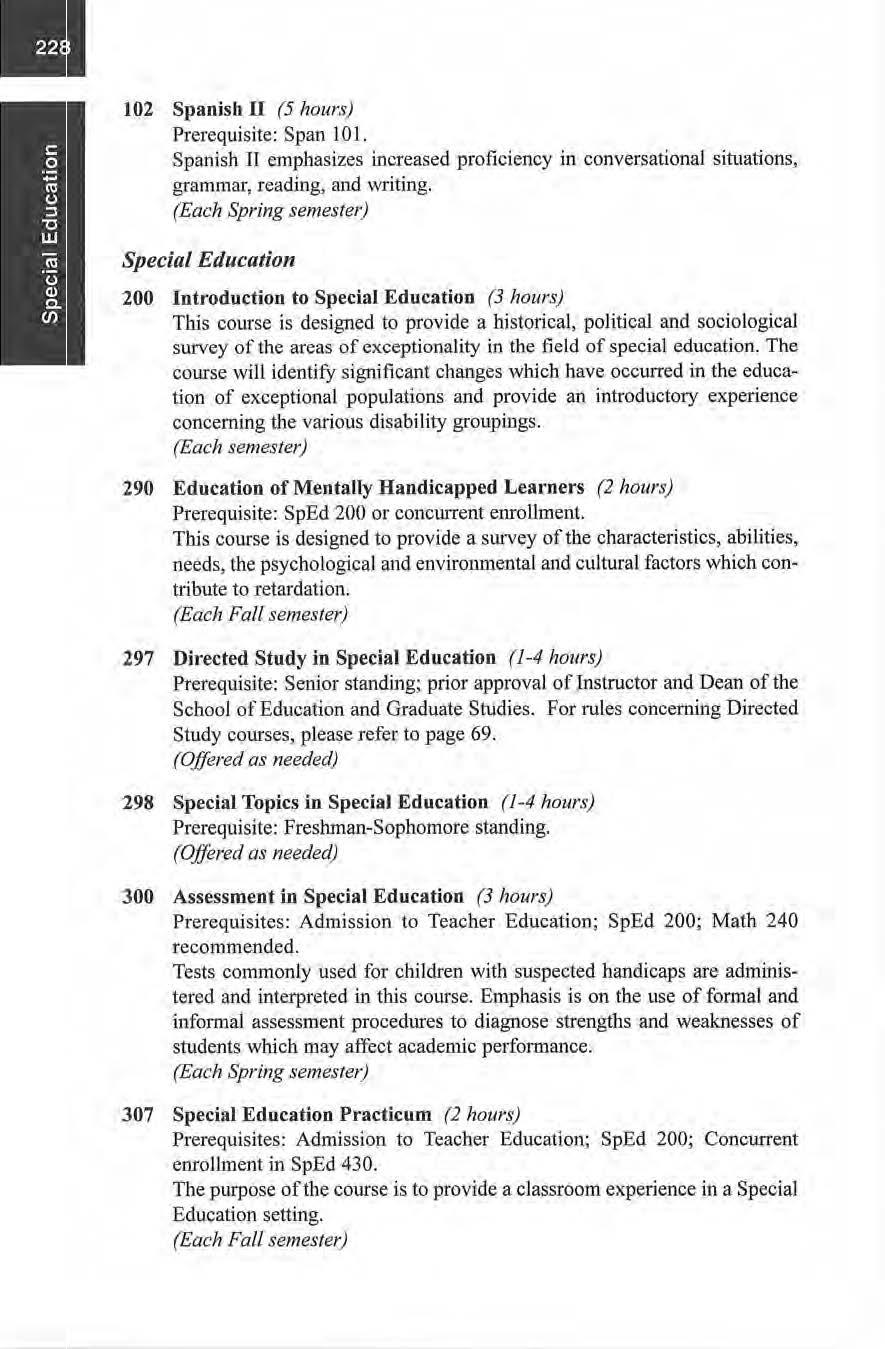
Prerequisite: Senior standing; prior approva l oflnstructor and Dean of the Schoo l of Education and Grad uate Studies For rules cohcerlling Directed Study courses, p lease refer to page 69.
(Offered as needed)
298 Special Top ics in Spec ial Education (1-4 hour.1)
Prerequisite: Freshman-Sophomore standing.
(Offered as needed)
3 00 Assessment in Special Education (3 hours)
Prerequjsites: Admission to Teacher Edu cation; SpEd 200; Math 240 reco mm ended.
Tests common ly used for children with suspected handicaps are administered and interpreted in this course. Emphasis is on the use of formal and informal assessment procedures to d iagnose strengths and weaknesses of studen ts which may affect academic performance.
(Each Spring semeste1)
3 07 Special Ed ucation Practic um (2 hours)
Prerequisites: Admission to Teacher Education; SpEd 200; Concurrent enrollment in SpEd 430.
The purpose oftlle course is to provide a classroom experience in a Special Education setting.
(Each Fall semester)
309 Preschool Handicapped Practicum (2 hour:,)
Prerequisites: Admission to Teacher Education; SpEd 200.
Corequisite: SpEd 405.
This course is designed to provide students with an opportunity to observe the specific methods in Preschool through Kindergarten being studied in preschool handicapped methods classes and to begin to practice those methods.
(Spring se me ste1; even years)
385 Education of Students With Leaming Disabilities (2 hours)
Prerequis ites: Admiss ion to Teacher Education; SpEd 200 or Conclment enrollment.
This course has been designed to prepare tbe prospective teacher with the ability to diagnose deficit areas and areas of strengths, and to be able to know and implement various instrnctional procedures and appropriate educational materials of the L.D. child.
(Each Spring semestel'}
405 Special Educatio n/Early Childhood Characteristics & Methods (3 hrs.)
Prerequisites: Admission to Teache.r Education; SpEd 2 00.
Corequisite: SpEd 309,
This course is designed to enable the student to master the knowledge of the purposes, unique fean1res, service delivery a11d issues in the field of early childhood special education Basic information about the foundations of early childhood special education programs and sources of current research about this rapidly growing field will be studied. Current best practice instructional methods will be a major focus of this course.
(Spring semeste, ; even years)
421 Preschool llandicapped Student Teaching (8-16 hours)
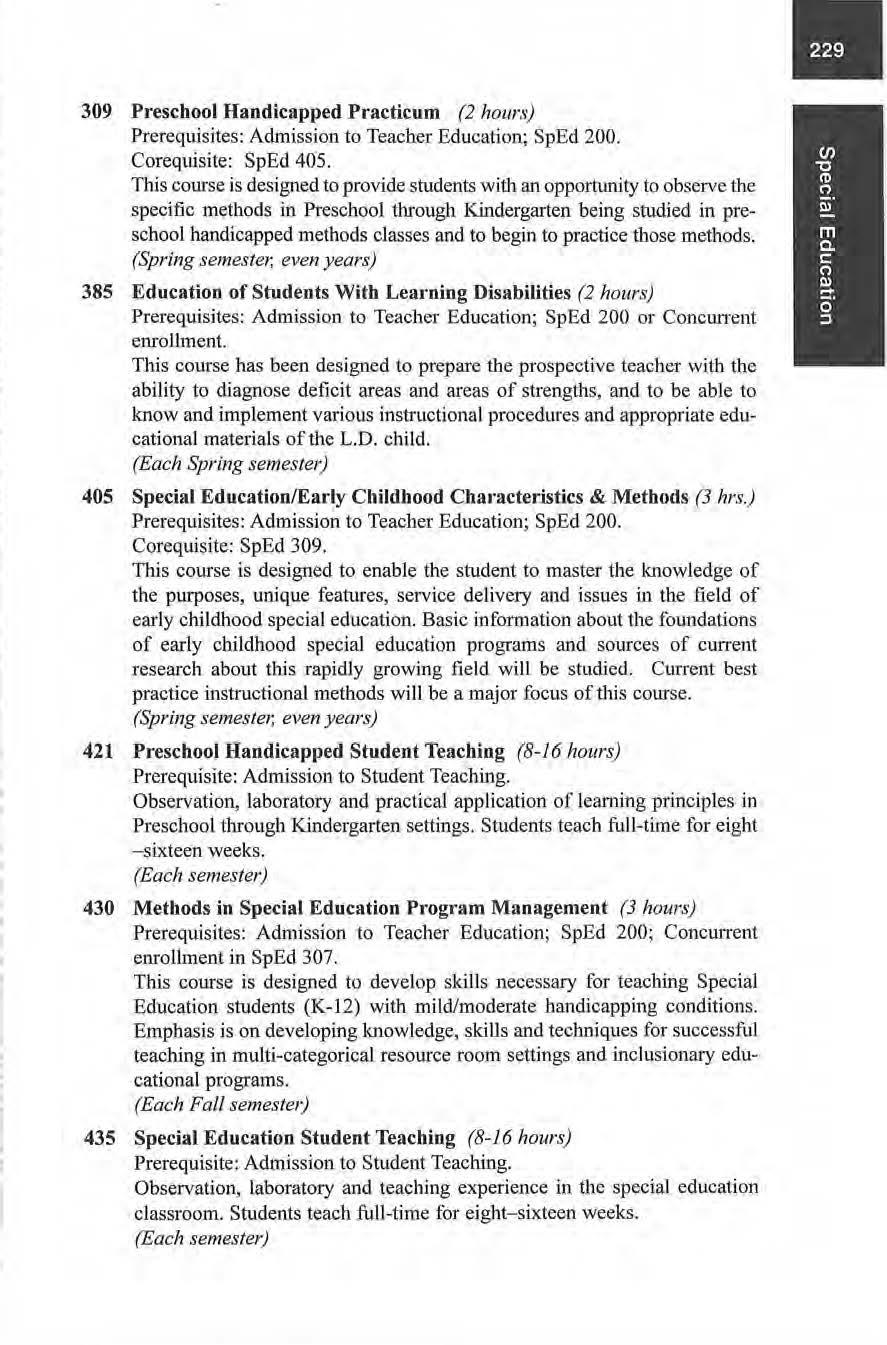
Prerequisite: Admission to Student Teaching.
Observation, laboratory and practical application of leaming principles in Preschool through Kindergarten settings . Students teach full-time for eight - sixteen weeks.
(Each semeste1)
430 Metbods in Special Educatio n Program Management (3 hour~)
Prerequisites: Admission to Teacher Education; SpEd 200; Concunent enrollment in Sp Ed 307.
This course is designed to develop skills necessary for teaching Special Education students (K-12) with mild/moderate handicapping conditions. Emphasis is on developing knowledge, skills and techniques for successful teaching in multi-categorical resource room settings and inc lu siona1y educational program s
(Each Fall se meste1)
435 Special Education Student Teaching (8-16 hours)
Prerequisite: Admission to Student Teaching.
Observation, laboratory and teaching experience in tl1e special education classroom. Students teach full-time for eight- sixtee n we eks.
(Each semeste r)
460 Career & Vocatio nal Ed ucation for the Ha ndica pped (2 hourJ)
Prerequisites: Admission to Teacher Education; SpEd 200.
The curriculum is designed to provide background information in vocational/career education for the m i ld/moderately handicapped. Vocational services, vocational evaJuation, vocational counseling, work-study programs. job placement and follow-up, lesson plans and current models and materials used are included in the cw:riculum.
(Each Spring semester)
465 Educatio n of Stude.nts Witt\ Emotio nal/Behavioral Disorders (2 hours)
Prerequisites: Admission to Teacher Education; SpEd 200.
Thi s course is designed to investigate the etiology, classification, and treatme11t for children and adolescents with emotional, social and behavioral impairments. lt examines the historical and philosophical contexis, major theoretical perspectives, a nd instructional alternatives. Current best practice and research related to the topic wi ll be explored.

(Ead1 Spring semester)
497 Directed Study in Special Education (1 -4 hours)
Prerequisite: Senior standing; prior approval of Instructor and Dean of Education and Graduate Studies. For rules concerning Directed Study courses, please refer to page 69.
(Offered as needed)
498 . Specia l Topics in Special Education ( 1-4 hours)
Prerequisite: Junior-Senior standing. Prior approval of the Dean of Education and Graduate Studies.
(Offered as needed)
498 Independent Study in Special E ducation (/-3 hours)
Prerequisite: Junior standing; prior approval of fnstructor and Dean of the School of Education and Graduate Studies. For rules concerning Independent Study courses, please refer to page 69.
(Each semeste1)
152 Fundamenta ls of Speecb (3 hours)
This course is a study of the principles of speech with an emphasis on the development of oral skills. Class emphasizes methods of organization and delivery for addressing various audiences.
(Each semeste1)
232 Introduction to T heatre (3 hour:,)
This course is an introduction to all forms of drama and styles of theatrical presentation and production as a means of developing the student's critical appreciation of the theatre arts.
(Each semester)
235 S tagecrafts (3 hours)
This course provides an introduction to the study and practice of the basic aspects of technical theatre production including sets, lighting, costuming, sound, properties, and make-up.
(Offered as needed)
254 Public Speaking (3 hours)
This course is a study of the fonns of address, speech organization, composition, delivery, and parliamentary rules with practice required in various public speaking situations including public meetings and group discussions, radio and television broadcasting, interviewing, role-playing and debate.
(Spring semestet; even years)
256 Acting Technjques (3 hours)
A concentration on stage moveme11t and pantomime with an emphasis on the development of the creative imagination and the use of stage conventions and techniques .is provided in this course.
(Offered as needed)
257 Acting Styles (3 hours)
This course provides intensive training in stage business, dialogue and characterization, character analysis, and the principles of dramatic interpretation as applied to various historic periods and acting styles.
(Offered as needed)
297 Directed Study in Speech and Drama (1-4 hours}
Prerequisite: Senior standing; prior approval of the In structor and the Dean of the School of Arts and Sciences. For mies concerning Directed Study cow·ses, please reter to page 69.
(Offered as needed)
298 Special Top ics in Speech and Drama (1-4 hours)
Prerequisite: Freshman-Sophomore. standing, (Offered as needed)
300 Summer Theatre Workshop (3 hours)
This course offers practical training in all aspects of theatre production including actin g , set design, lighting, costuming, make-up, improvisation, music, and dancing
(Offered as needed, Summers only)
327 Light and Sound Design for Stage and Television (3 hours)
Prereqtlisite: Speh 23S. This course studies the theory and practice of stage and television lighting and sound systems with an emphasis on color, acoustical, and light problems. (Offered as needed)

353 Speech Correction and Development (3 hours)
This course identifies the unique educationa l problems of chj ldren w ith speech deficiencies with an emphasis on identification and remediation. (Each Spring s e mester)
355 Principles of Play Production (3 hours)
This co urse for the director of dramatics in schools and commw1ities answers the fundamental questions of play selection, castii1g, directing, steps in rehearsal, scenery, lighting, costume, make-up, and business organization.
{Fall semesle1; even yearJ)
357 1nte1·pretive Reading (3 hour.1)

This course is designed to emphasize oral reading of worth-while literature in group settings . rt includes the c lose, critical analysis of practice selections as well as the study and practice of basic delivery techniques.
This course is Dual listed as Eng 357.
(Each Spl'ing semeste1)
360 Scenery and Costume Desigo (3 hours)
Prerequisite: Speh 256.
This cotu-se app li es the principles of design to scenery and costumes and studies the interrelationship of the two design areas.
(Offered as needed)
363 Directing I (3 hours)
Prerequisite: Speh 256.
This course answers the fundamental questions of play selection, casting, directing, scenery, lighting, costume, and make-up for the one-act play.
(Offered as needed)
364 Directing II (3 hours)
Prerequisites: Speh 256 and 363 .
Further sll1dy in the historical interpretations of action is provided in this cow·se as well as an intense practical application of the fundamentals leamed in Directing 1 in staged scenes ru,d staging a one-act play.
(Offered as needed)
369 C hildren's Theatre and Creative Dramatics (3 hours)
This courses is the study and active participation in the two different concepts of drama for young people: creative dramatics, in which chi ldren with the guidance of an imaginative leader create scenes or plays a11d perform them using improvised dialogue and action with personal development as the goa l, and Children's 111eatre which utili zes written scripts directed and performed as a complete production for child aucliences.
(Offered as needed)
400 Theatre History (3 hours)
This course wiU ex.amine the nat11re, function, and literature of the theatre from its beginning to the present day. The approach wiJI consist of a st udy of each of the major periods in theatre history and representative plays of the periods.
(Offered as needed)
497 Directed Study in Speech and Drama (1-4 hours)
Prerequisite: Senior standing; prior approval oflnstructor and Dean of the School ofArts and Sciences.
For rules concerning Directed Study courses, please refer to page 69. (Offered as needed)
498 Special Topics in Speech and Drama (1-4 hours)
Prerequisite: Junior-Senior standing. ( Offered as needed)
499 Independent Study in Speech and Drama (1-3 hours)
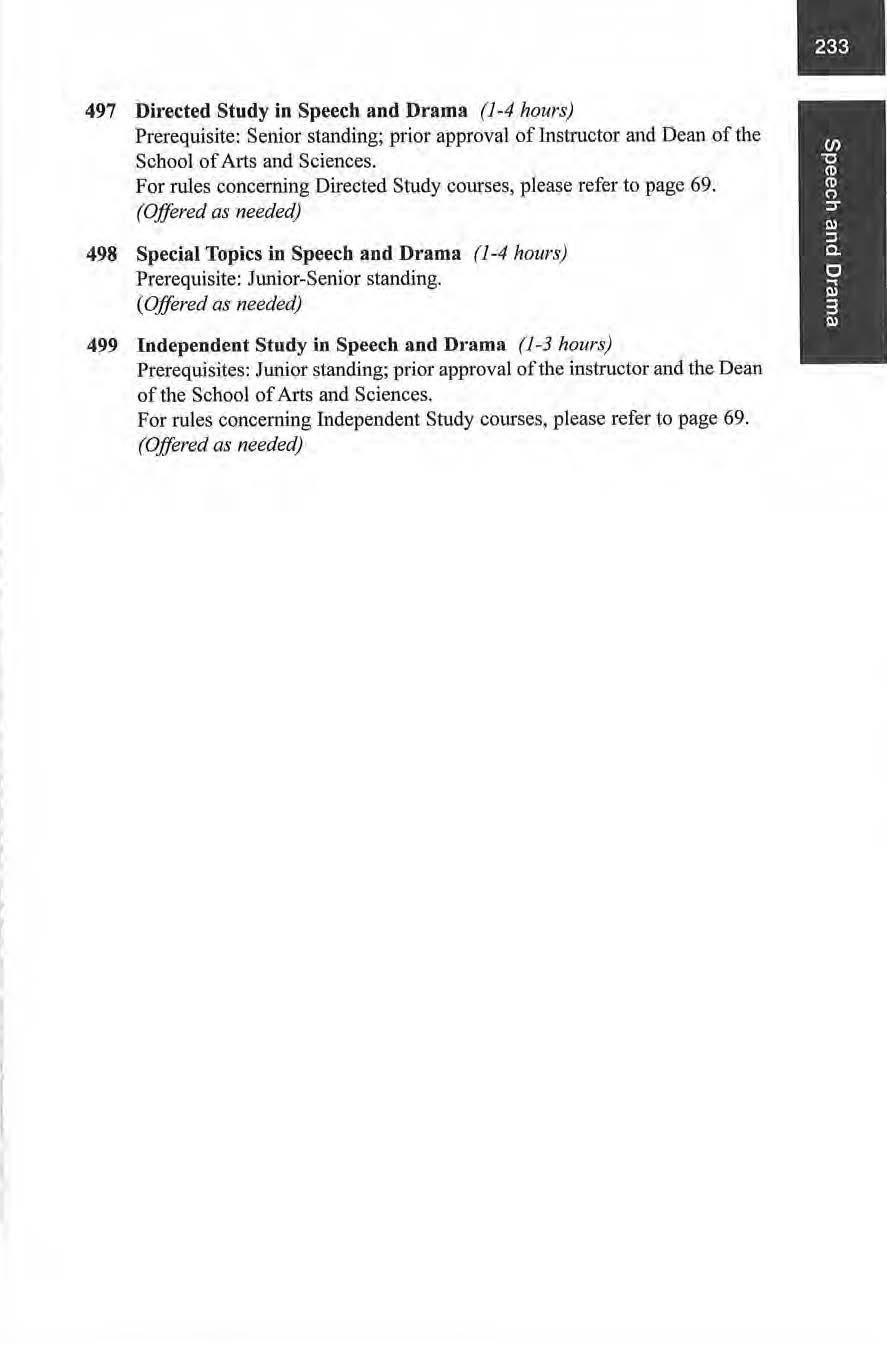
Prerequisites: Junior standing; pr ior approval of the in structor and the Dean of the School of Arts and Sciences.
For rules concerning Independent Study courses, please refer to page 69. (Offered as needed)
Doug C h ris te nsen , S tate Com missioner of Education ..................... ..... .................................Lincoln
R ichard Ha lbe r t .................... ...... ........................
lls City
Will a Kosman Sc-01:tsbluff
Steve Lewis , Lexington
S heryl Lindnu Wayne
Jeff Ren ner Bellevue
Larry Tea hon Chadron
Stan Carpe nte,; Executive Di recto r
Clyde Barrett (I 965 -1 993)
Russell B eldin ( 1970-1998)
Faye :Sra ndt (1959-1985)
E vere tt Browning ( I 969-1986)
Est her Di vney (1975 -1990)
Royal Eckert ( 1975-1994)
,John Ha hn ( 1968-1993)
Jack Flamilton ( 1972-200 1)
Wreathcu Hi cks ( 1968-1985)
Don Jacobs ( 1980-1994)
De e Jan,is (1948-1978)
Harold Joh nson ( 1951-1982)
Pa ul K ruse (1969- 1994)
Robert Lewellen (1972-1998)
Ke lly Liewer ( l 968- I 997)
Lyle McKerche r ( 1959-1990)
David Pippert (1977- 1999)
Lester Ru sse ll (1956- 1995)
Le land S herwood (1963-1993)
Gilbert Wilson (1957-1982)
Mary R uth Wil so n (! 966- 1982)
Professor Emeiitus of English
Assistant Professor Emeritus of Bus[hess
Professor Emeritus of Library Science
Professor Emeritus of Journ alism
Professor Emeritus of Education
Professor E meritus of Spe-echffheatre
Profe.ssor Emeritus of Political Science
Assistant Professor Emeritus of Business
Professor Emeritus of Englis h
Professor E meritus of Bus iness
Professor Emeritus of l.ndustria l Arts
Professor Emeritus of Education
Assistant Professor Emeritus of Library Science
Assistant Professor 'Emeri tus of Business
Registrar Emeritus
Professor Emeritus of Mathematics
Professor Emerin1s ofNatural Science
Profe~sor Emeritus of lhdustria l Techno logy
Professor Emeritus of Art
Professor Eme ritus of Music
Professor Emeritus of Engli sh
(Da te indicates year in which service at Peru State began.)
Mary Ada ms (200 1)
Assistant Professor o/Englisli

B.A., M A. , University ofLouisian~-Monroe; Ph .D., University of Oklahoma
Kenn eth A nd e rson ( 1984) Pmfe.1·.~or ofAri
B.G.S. , B.F.A. , M.F.A., University of Nebraska-Omaha
Kelly As mu ssen (I 994)
Associate Professor a/Criminal Justice/ Departme/II I-lead - Psychology, Criminal Justice
B.S., University of Nebraska-Lincoln; M,~d Colorado State; Ph. D .• University ofNebrMka-Lincoln
Mic hael Barger (2001)
Assis/ant Profe,t~·or of Biology
8.S., M.S .. Un ivers ity ofNebraska-1.,i ncoJn; Ph.D., Wake forest Unive rsity
Bruce l3atterson (2000)
B.A. , Ripon CoUege; J.D., University of Minnesota Law Schoo l
Assis/on/ Professor ofBusineJs
M.:1rk Beischel (2000) Associate Professor ofPsychnlog;,
B.A., Un iversity of Dayton; 8.A., Catholic University of Amer ica; M.A., University of Detroit;
Ed.D Indiana University
Eric Brown (2000) instructor of Computer Science
B.F.A., B.G.A., University of Nebraska-Omaha
Ant hony Citrin ( 1986) Professor of Ed11catio11/Deparlme11/ Head - Teac/1er Ed,1cali o1,
B.A., M.A., University ofKent uc!c:y; EcLS., Central Michigan Un iversi ty; Ed,D., Western Mionigan University
William Clemente ( 1993) Professor of English/ Depwtmenl Head - Uteralure
B.A., San Diego Stale University; M.A., Ph.D ., University of Oregon
Richard Cloptou ( 1995) Associate Professor ofBiology/Departmenl Head -Natural Science
B.S., M.S., Ph.D., University ofNebraska-Lincoln
San Crook ( 1993) Associate Professor of llis/o,J, B.S , M.A., Ph.D., University of Nebraska-Lincoln
Spencer Davis ( 1983) Professor of Hi,,10,y/ Depnnmenl Head - Sooial Science
B A., Brown University; M.A., University of Nebraska-Lincoln; Ph.D. , Unive rsity of Toronto
Orunnn Domangu e (2001) As,rfata11/ Professor ofEng/ish
B.A ., No rtheast Louisiana University; M.A ., Uni versity of Southwestern Lou isiana; Ph.D., Uni ve rsity of Louisiana-Lafayette
T h omas Edi ger ( 1979) Pmfessor of 1\fusie: Director of Chore;/ Act iv/lies
A.B., University of Nebraska -Lincoln: MA., D.A ., Un iversity of Northern Colorado
David Ed ris (1974) Professor ofMusiclDeparlr11cnl Hec1d - Pc,forming Arts, Fine Arts
B.M,E., M.M., University ofTulsu; D.M.A Un iversity of Missouri-Kansas City
Kelly Gntew oo d (2002) Assi.stcmr Professor of&lucatio11
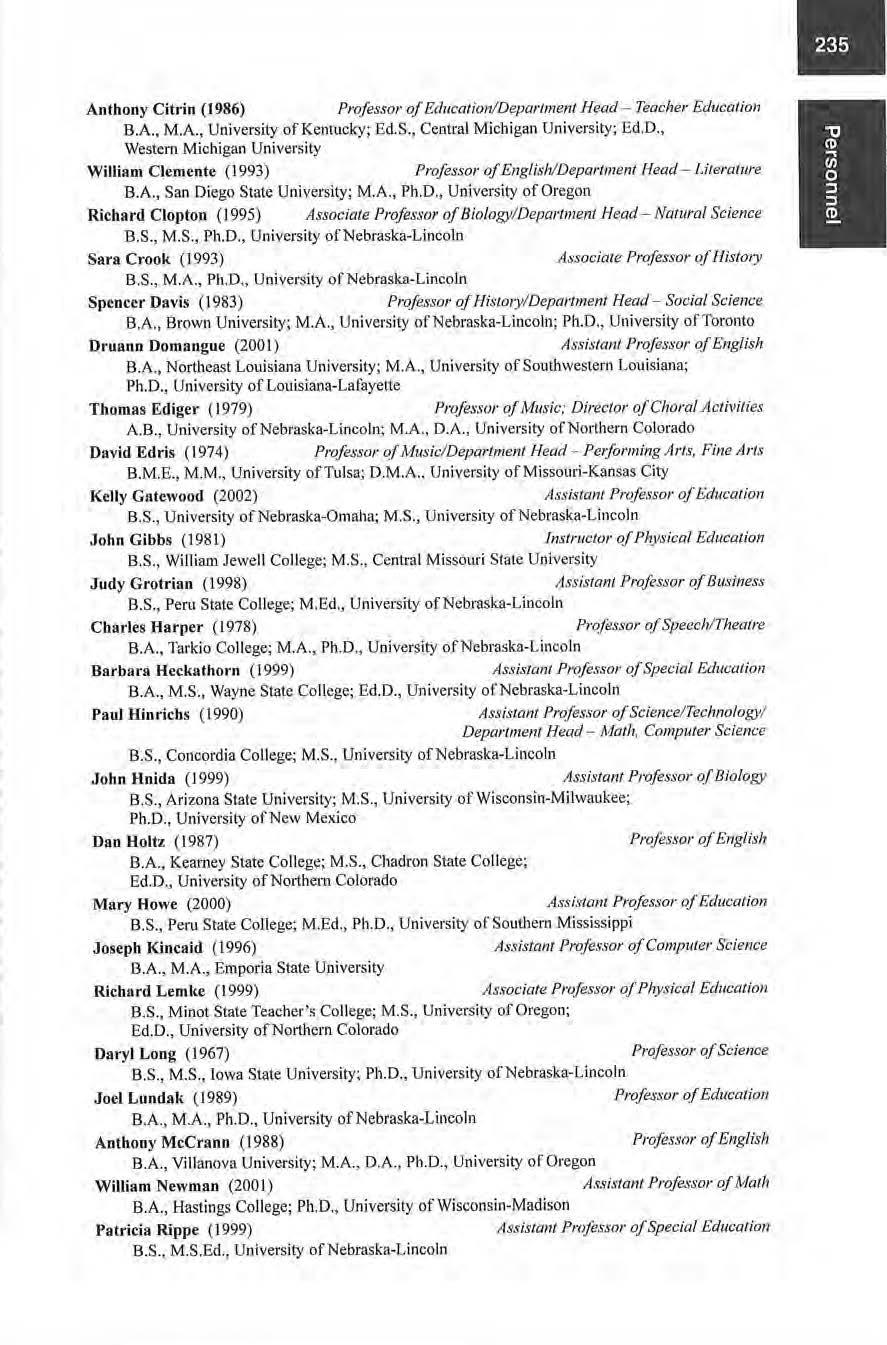
B.S., U niv ers ity ofNebraska-Omaha; M,S., Un iversity ofNeb(ask,a-Lincoln
,John G ibbs (1981) /nslructor ofPhysical Educa/ion
B.S., William Jewell College; M.S. , Ce ntral Missouri Stale Un iversity
Judy Grotrian ( 1998) Ass istant Professor of 8usi11ess
B.S., Peru State Co llege; M.Ed _, University of Nebraska-Lincol n
C harles Oarper (1978) Proji!ssor ofSpeech/[heafre
8.A Tarkio College; M.A., Ph D., University ofNcbraska-Linoo ln
Barbara Hecka thorn ( 1999) Assistant Pm.lessor ofSpecial &111catio11
8.A., M.S., Wayne State College; Ed D , University ot'Ncbraska-Lincolri
Paul Hinrich s ( t 990) Assistant Professor ofScienee! Tec/1110/ogy/ Department Head - Motl, , Computer Science
B.S., Conoordia College; M.S., University ofNebraska-Linco ln
,John Hnidn (J 999) Assisla11/ Professor of Biology
B,S., Arizona Stale Un iversity; M.S., University of Wisconsin-Milwaukee; Ph.D. , University ofNew Mexico
Dan Holtz (1987) Professo1· ofEnglish
B.A.. Kearney Slate Colleg~; M.S., Chadron State College; Ed.D,, Univers ity of'Nmihern Colorado
Mnry 1-{owe (2000) Assi.l'ID/11 Professor of Education
B.S., Peru State College; M.Ed., Ph.D., University of Soutliern Mississippi
Josep h Kincaid (l 996) Assistam Professor of Computer Science
B.A., M A., Emporia State University
Richnrd Lemke ( l 999) As.we/ate Profeswr of' Phys/col Edlication
B S., Minot State Teacher 's Co llege; M.S., University of Oregon; Ed.D , University ofNorthcrn Colm·ddo
Daryl Lo ng (1967) Professo,. ofScience
B,S , M.S. , Iowa Slate University; Ph.D., Univers ity ofNebraska-Llnco ln
Joel Lundak t 1989) Profes~ur ofEd11catiou
B.A., M.A., Ph.D ., University of Nebraska-Lincoln
Ant hony McCra nn (1988) Professor ofEnglish
B.A., Villanova University; M.A., D.A., Ph.D., Un iversity or Oregon
William Newman (200 I) A.~.~ista11t Professor ofMarh
B.A., Hastings Co llege; Ph.D., University of Wisconsin -Madison
Patricia Rippe (1999) Assista/1/ Pmfcssor ofSpecial Education
B S , M. S.Ed , University of Nebraska-L inco ln
W illiam S n yd e r ( 1979) Pn:ifessor ofBusiness
B.S., M.Ed., Ed.D., University ofNebrnska,Lincol n
J a mes Thom as ( 1985) Professor ofB11siness/Depar1men1 Head- Business
B.S. , Wayne State University; M A , Ph.D., M ic higan Slate Un iversity
Oen11i s L. Voko le k ( 1999) A,isociote Professor ofPhysic:ol Eduao1ionl Departme111 Head Physian/ Education 011d Grodua/e Studies
B.S., Un iversity of rowa; M.S., Ed.S., Ph.D., Unive(sity ofNebraska -l,incoln
Randy L. Waln (2002} Professor ofArt
B.F.A., M.F.A., University of Wyoming
IJ cb We it zen ku m p (1997) lmtructor ofEducational Technology
13.S., M.S., University of Nebraska-Lincoln
D enni s We ls h (200 l) A.ssisla/11 Professor of Chemistry
B.A., Bened ic tine College; Ph.D., University of Notre Dame
Di ck Wied e rh o ld (2002) Assistant Proje.w1r of Ed11co/ion
B.A., St. Benedict's College; M.S. , (Jn1versity of Nebraska -Omaha; Ph.D. , Iowa State University
L , Pat ric k W ray (2002) Jnsrrncror of B11si11ess
8.8.A., M.B.A. , Univcr,-ity ofTowa; CPA

To dd O rew ( 1999) Dean o.fProfessio11al St11dies/Assistam Professor of Business
B.S., B.A., M.B.A., O hio State University; M.Ed., Univers ity of Maine
Ca rl O E llis (2000) Associc1te Vice P,·esident.for Technology and Extended Campus
B.A., Univers ity of Puget Souod; M.A., Pacific Lutheran University; Ed D , Nova Southeastern Uni versity
Tuel L. Hars hbarge r ( 1989) Vice Presidenl ofS1ude111 Se1,>ice.t and E11rollme111 Ma11agemem
B.S., Pe1u State College; M.Ed., University of Nebraska-Lincoln
Lin d3 C. J acob se n ( 1996 ) Vire Preside111 Jar Administration and Fina11ce
B.A., M.A., Chadron State College
Be n £. Johnso n ( 1999) President
B.R.E~ Wl lliam Tyndale College; M .A.Ed., M.A., Easte.m Michigan University; Ph.D , University of South Florida
J ero me V. M art in (1998) Vice President ofAcademicAfloirs
B.S., United States A i r Force Academy; M.S., Troy State University; Ph.D Oh io State University
K en t Pro pst ( 1983) Vice Pres idem,?[ College Adva11ce111e11/ and l111>'fi/11/io110/ Relations
8.S,. Peru State College
Ste phen G. Sylvester (2 00 2) lnlerim De.au ofArts and Sciences(Pro.fessor ofHislo,y
B.A .. New Mexico State University, M.A., D.A., University of North Dako ta
K o rinn e Tande (2000) Deon of Ed11cotion 011d Gradua/e Studies/ Professor ofEducation
B.S., M Ed., Ed.D., U ni versity of Montana
Professional Staff
.Jason Ad a ms (200 I)
B.A., Un iversity ofNe braska-Li11colo
Residence Holl Director
F red A ubu c h on (2001) Head /lolleyho/1 Coachll111ramura/ Director
B.A., M.A., Siena Heights College
Lisa Ba h c nsky (200 I) /111ma11 Resources Direclor
i\.A.S., Central Comm unity Col lege-Columbus
Mark Bi1yliss (1997) Head Baseball Caach/A1hletic Ad111inislrnttve Assistant
B.A., M.A., Siena Heights College
Kurt Be hrho rst (2 002 ) Athletic Trainer
B.S., Kansas State University; M.A.T., University of West Alabama
Barb Bender (1988) Assista11t to the Associate llice P resident fo r Tech110/ogy
B.S., Kent State Univer$ity and Extended Campus
Pat Beu ( 1997) St11de11t Support Services Director
B.S., M.Ed., Brigham Young University; Ph .D.. Montana State University
Jerry Brenzile ( I 996)
B.S., Peru State Co llege
NBDC Director
Jennifer Burns Distancl! learning Coordinator - Ojfult AFB
B A. , Utah Stnte U ni versity
Ren ee C hurch {1997) Business Manager
B.A., Mount Marty Co llege; CPA
Terry Clark (2002) Head Football Coach/Jnstmator
B.S., University of Mary
Delyn C lifton ( 1993) Network Specialisl
B.S. , Peru State Co llege
Jerre Col e (2001) Sports Jnformatio11 Directorllnterim Read Jv/en.'s Basketball Coach
A.A., Highland Comm unity College; B.S., Missouri Valley College; M S , Emporia Stale University
Pa ula Czirr (200 I ) Residence }fall Director
B.S .• Pem State College
Sa raDct h Donovan (200 I) Pl anned Giving Qfficer- PSC Fo11ndatio11
B.S., Peru Stale Coll ege; J.D., University of Nebraska-Lin coln
DiAnna Loy Eason (2000) Director ofRetJords and Institutional Research
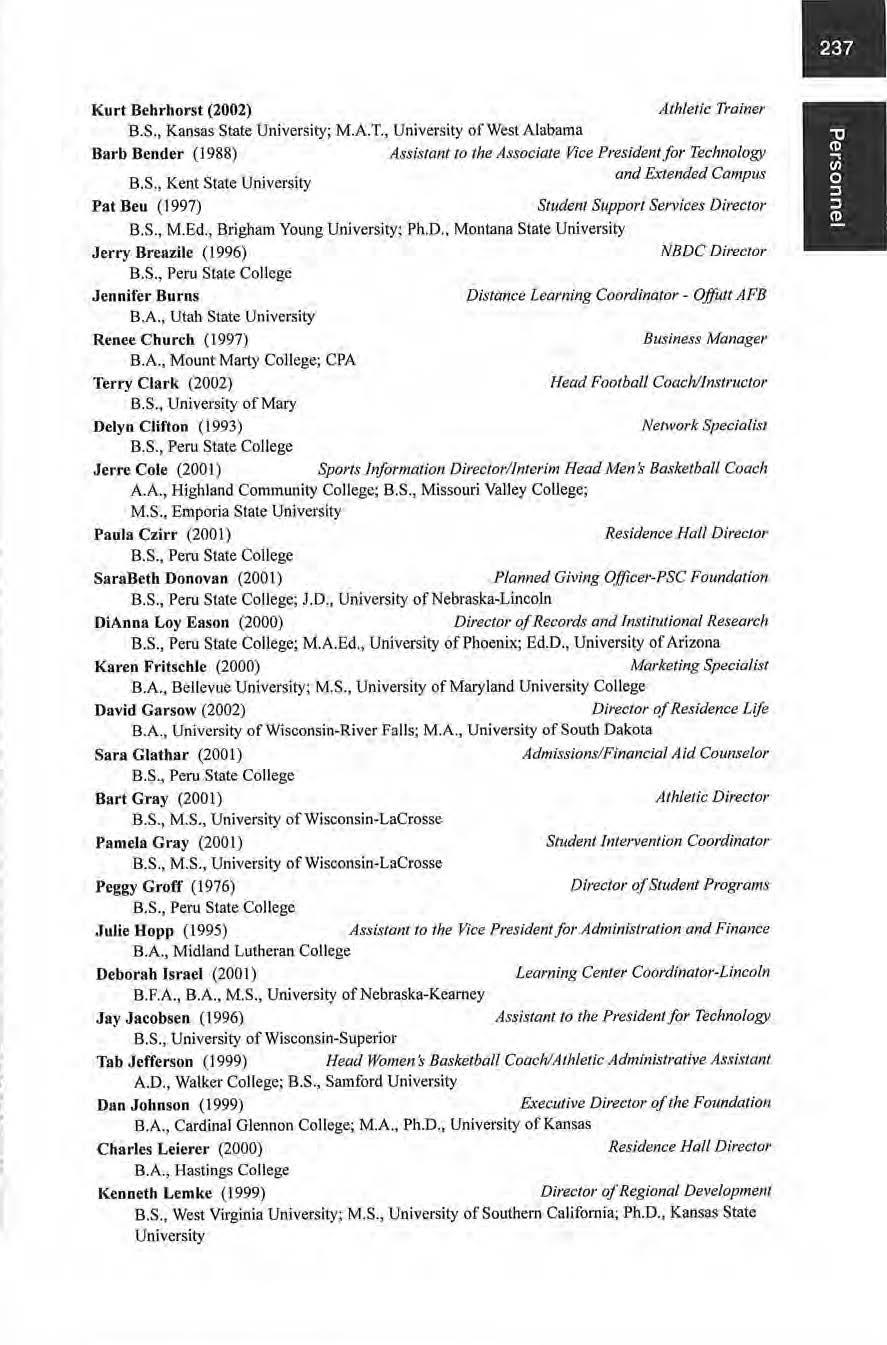
B.S., Peru S tate College; M A.Ed ,, University of{'hoenix; Ed.D , Univers ity of Arizona
Karen Fritschle (2000) Marketing Specialist
B.A., Bellevl!e University: M.S., University of Maryland U ni versity College
David Gnrsow (2002) Direc1or ofRes(denceLife
8 .A., U nive rsity ofWisconsin-River Falls; M.A ., University of South Dakota
S ara Glatha r (200 1) Admissions!Fina11clal Aid Co unselor
B.S~ Peru Stale Coll ege
Bart Gray (200 1) Athletic Director
13.S., M.S., U niversity of Wisconsi n-LaCrosse
Pa m el a Gra y (200 I) St11de11t l11Jerve11tio11 Coordinator
B .S , M.S., Un iversity of Wiscons in-LaCrosse
Peggy G roff ( I 976) {)/rector ofStudent Programs
B.S., Peru State College
,Julie H o11 p ( 1995) Assistom Jo rhe Vice President for Administration and Finance
B.A .• M id land Lutheran. Co llege
Deborah Israel (2001) Learning Center Coordinator-Lincoln
B.P.A., B.A.. M.S., University ofNebraska-Keamey
Jay Jacobsen ( 1996) Assistant to the President/of Technology
B.S., University of Wisconsin-Superior
Tab Jefferson ( 1999) lfead Wame11 s Basketball Coach/ A /1,/etic Admfnistralive Assist ant
A.D., Walker College; B.S., Samford University
Dan John so n ( 1999) Executive Director of tire Foundatioit
B.A.. , Cardinal Glennon College; M.A., Ph.D., Univ ersity of Kansas
Charles Leiercr (2000) Residence Hall Director
B.A. , Hastings Coll ege
Kenneth Lemke (1999) Director of Regional Development
B.S., West Virginia Univer sity: M.S., U ni versity of Southern California; Ph.D., Kari.S8$ State University
Diana Lind ( 1999)
B.S., Peru State College
1\-Ja~ k Math ews (1993)
B.A., Hastings College
Financial Aid Director Athletic Fields Manager/Head Softball Cooch
J ane Ue M'orau (2001) Interim Director of Recrui/menl and Admissions
B.S., Peru State College
Krbti Nies (200 I) Tutorial Coordinator
B.A., Millikin University; M.S., University ofTllinois,Urbana/Cbampaign
Ma rgaret Deluney O 'Rourkc (1999) library Directm•
Ed.B., Rhode Island College; B.A., Mansfield State College; M.S., Western Reserve University
Michael Otto (2000) Sy$/e111s A11al;ysl
B.S., Kearney State College
Paul Pate (2000) Director ofCampr,s Ser11ices
A.A., Los Angeles Metropolitan College; A.A.S ., Community College of th e Air Force;
B.S., Wayland Bapt ist University; M.A Univer sity of Phoenix
No ncy Reeves ( 1974) Insli111tional Research Specialist/B11dgel
Laura Ro b e rts (1999) Director ofOfjiltt Program
A.O., Metropoli t an Commun.ity Col.lege; B,A ,, University of Colorado;
M .S., University of Oklahoma
Patricia Si m s (1997) Programmer/Analyst
A.A., B.S. Peru State College
Steve S ims ( ! 998) Systems-Analyst

A.A., Valparaiso Technical Institute; B.S., Peru State College
Regina Tom a n (2001) learning Center Coordinator-Omaha
B.A., Nebraska Wesleyan U niversity; M.S., Syracuse University
Susa n Un ruh (2000) Accou11ta111
B.S., Peru State College
Janice Volke r ( 1996)
B.S., Peru State College
Mic h;tela Willis (2000)
B.A. , Doane College
Suppo rt Sta ff
Phyllis Adams
Chris tine A lberts
Eddi e Albrecht
Jack All en
Ca ro l yn Allgood
Alma A nth ony
S ue Badbcrg
Don Ba.llu e
Deb Breazile
Ca rolyn Brtdcmeier
Yvonne Chandler
Arden Chapin
Beth C hevalie r
TraceyConz
William Coulter
Dana C umm ins
Assis/an/ Director ofFinancial Aid
interim Coordinator ofAdmi,i~ions
Director ofRecords and Instilutianol Research Office
Business Office
Campw.· Services
Campus Services
Library
School ofArts and Sciences Office
Student Support Services
Campus Sec1111ty
Campus Services
PSC Foundation Office
Computer Cell/er
Admissions Office
Campus Services
Mail Clerk/Switchboard Operator
Campus Services
Campus Services
Al Dalbec
Phyllis Davis
Jarred Decker
Malinda Edri!
Janice Ellner
Ral Eltiste
Sa ndy Fisher
Ke ll y Furnas
Barb George
Terry H11ger
Jan et Hawley
Nan cy Hawley
Kalina Hill
Robert Hin es
Linda Hinri chse n
Misti Jamison
Teresa Jen sen
JoAnn John son
Conni e Kearn ey
Kimberly Keenan
E ldon Kistne r
Roger Kopf
Brad M arion
Gayle Ma rtin
Nancy Me rl
Co1rn ie MoQ dy
Lind a Mood y
Debra Morris
Lisu Parriott
Bea Patterson
Darrin Reeves
James Reynolds
Jim Robbin s
Donn a She pherd
Dee S imonto n
Antoniu S pa ngle r
Lind a Staples-
William S ton ebarger
Kurt Stuth ei t
Dixie Te ten
Kathy Tynon
Mark Volkm er
J acki e Williams
Kristu William s
Campus Services
Director ofRecords and Institutional Research Offioe
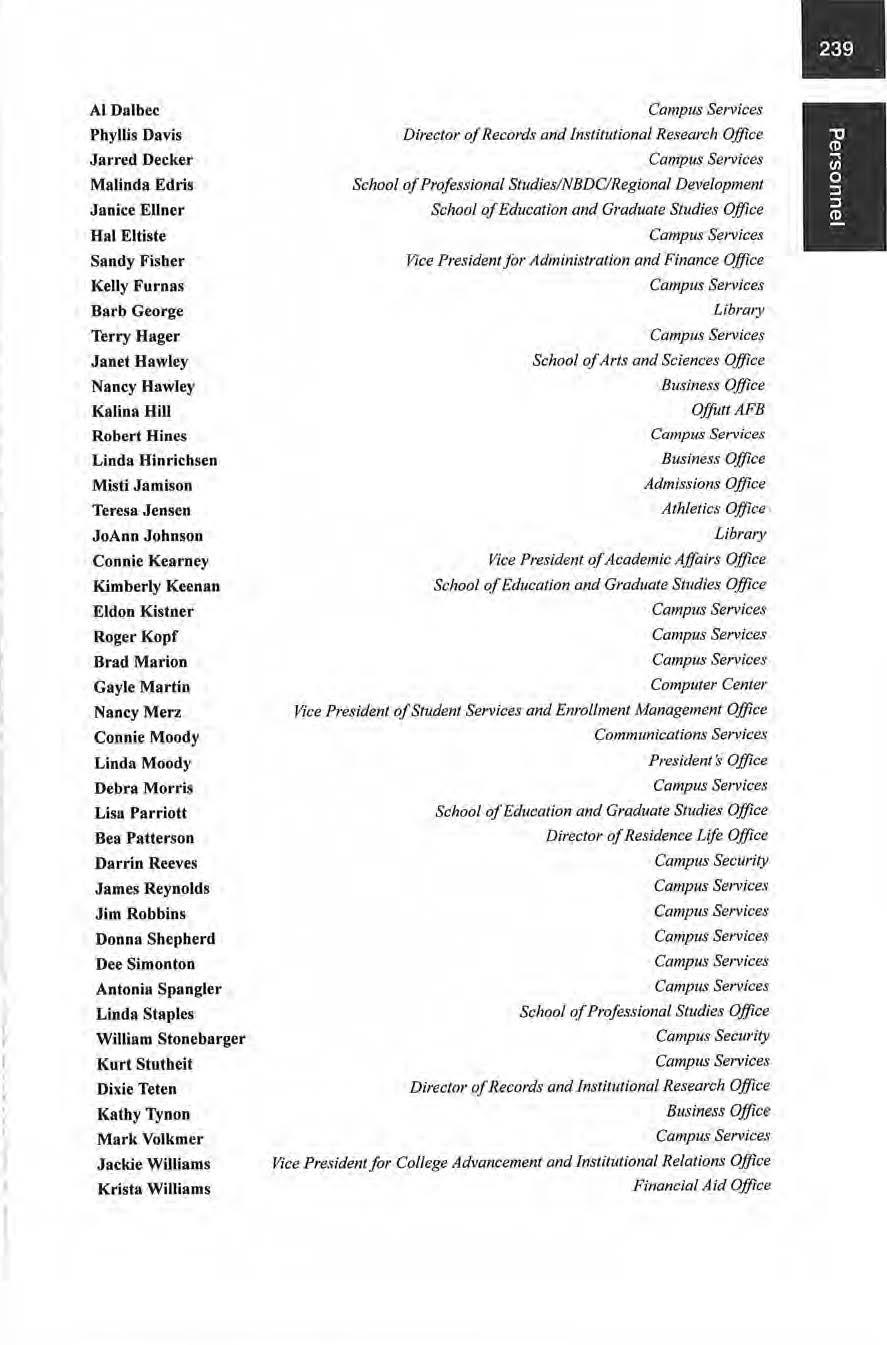
Campus Se,..,ices
School of Professional Studies/NBDC/Regional Development
School ofEducation and Graduate Studies Office
Camp11s Services
Vice President for Ailmini,1·tmtion and Finance Office
Campus Se1,,Jces
ltbrary
Camplls Sen,ices
School ofArl f and Sciences Office
Business Office
Ofji111AFB
Campus Sen•ice,s
Business O.tficc
Admissions Office
Athletics Office
Libra,y
Vice Preside/It ofAcade1nic Affairs Office
School ofEd11cation 011d Graduate Studies Office
Campus Services
Campus Services
Campus Services
Computer Center
Vice President of Studen/ Services and Enrollment Management Office
Communications Services
President'$ Office
Campus Services
School of £d11cation and Graduate Studies Office
Direclor ofResidence Life Office
Campus Secllrity
Campus Sen1ice ~
Campus Services
Campus Services
Camp11s Services
Campus Services
School ofProfessional St11dies Office
Campus Sec11rily
Camp11s Se,..,ices
Director ofRecords and institutional Research Office
Business Office
Campus Services
Vice President/or College Advancemem and Institutional Relatio,is Office
Financial Aid Office
